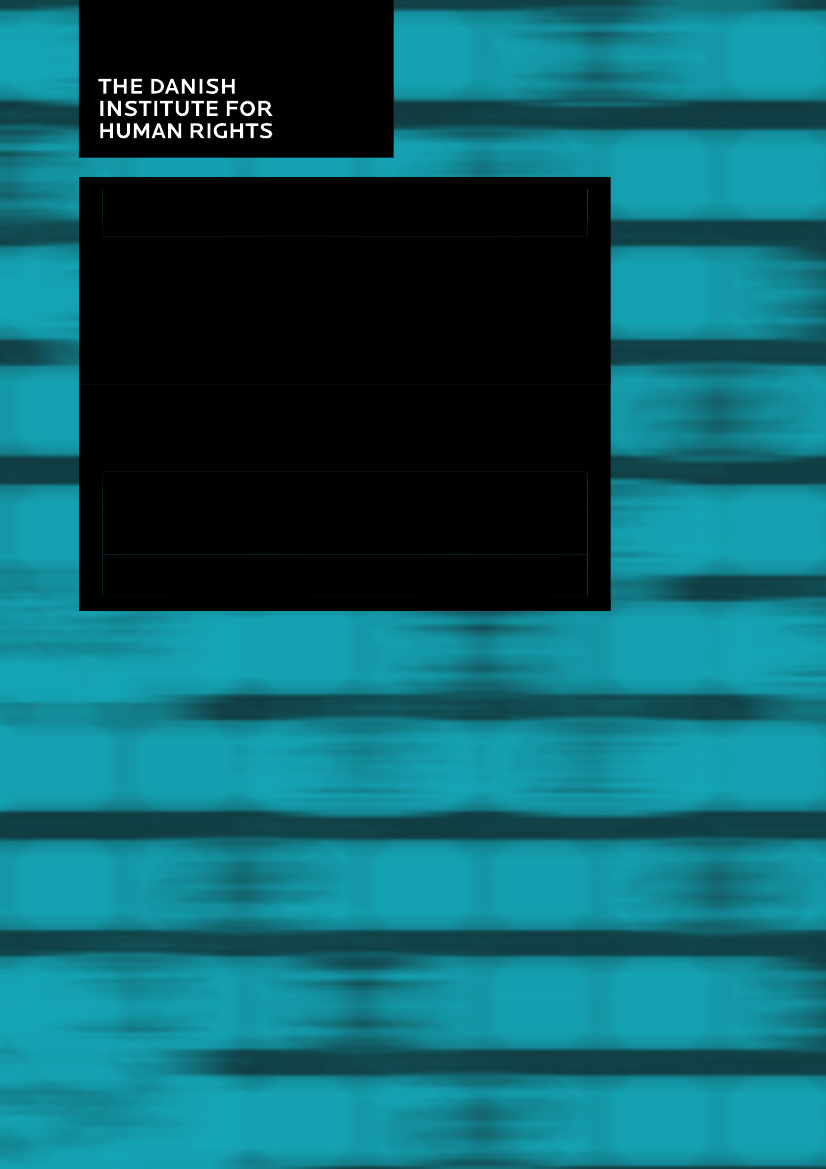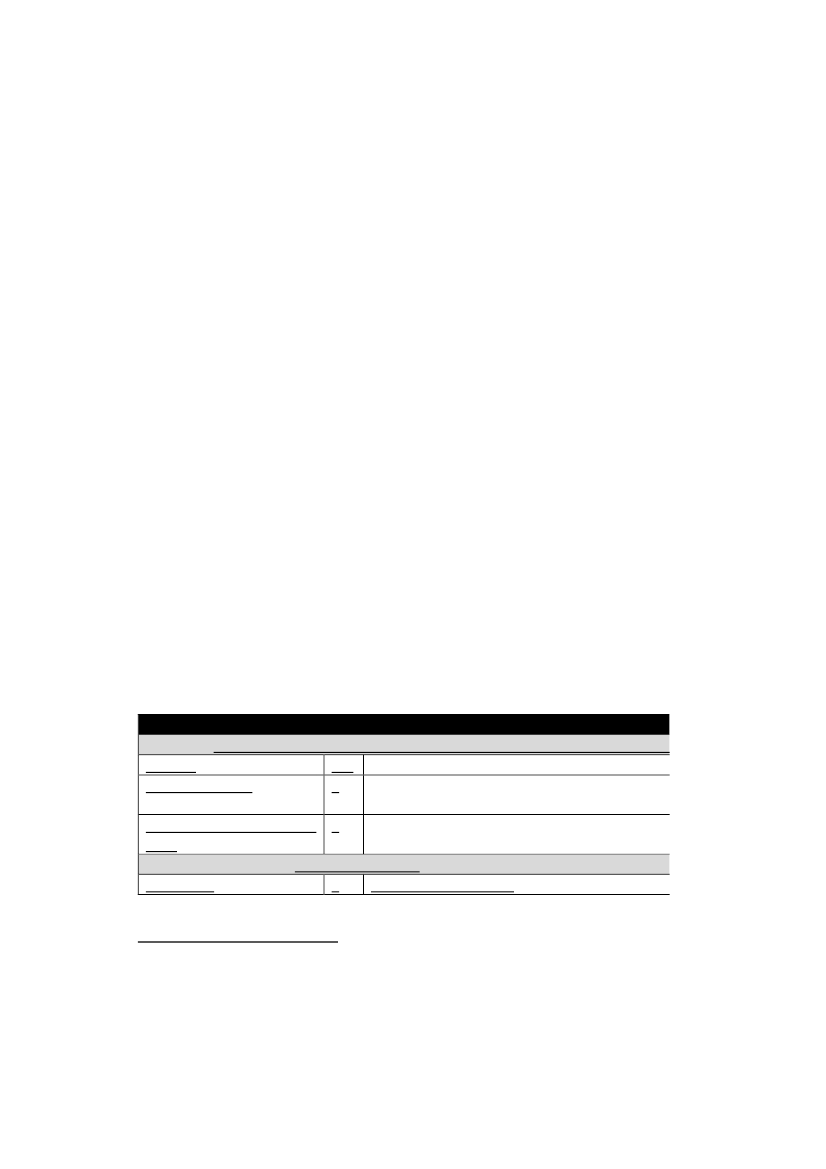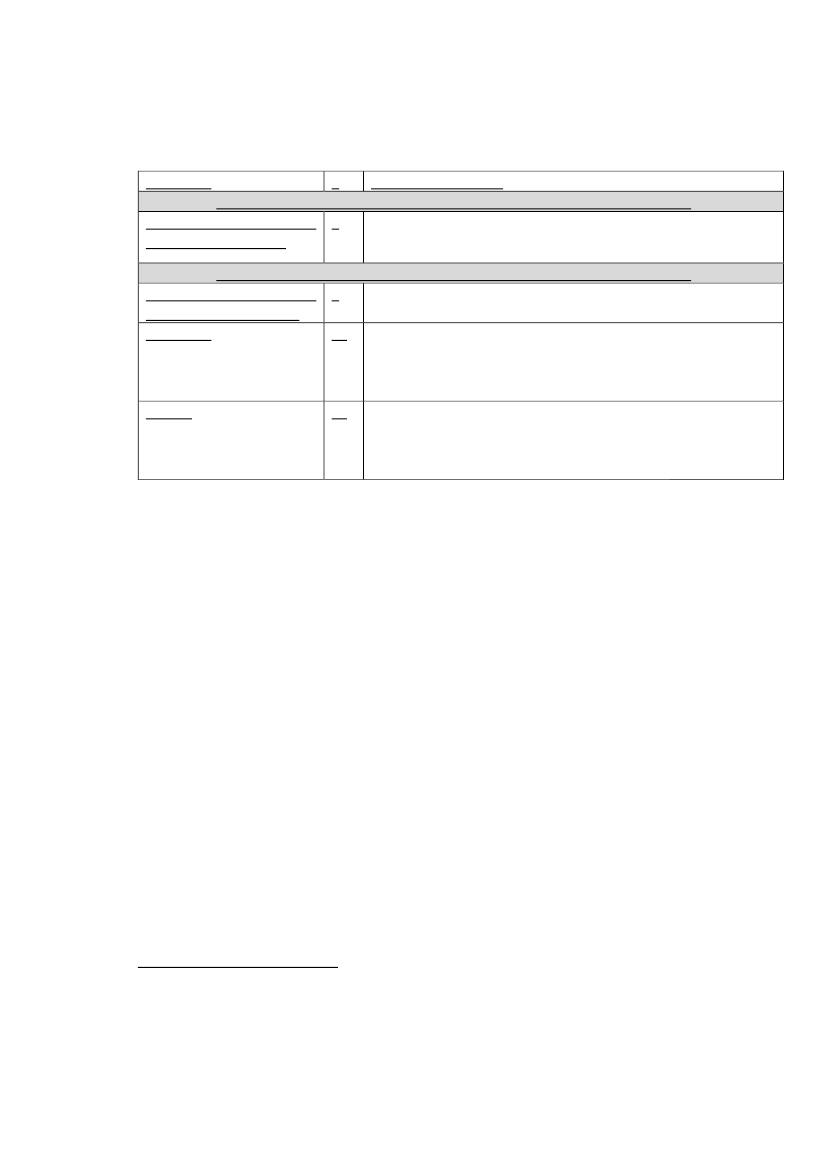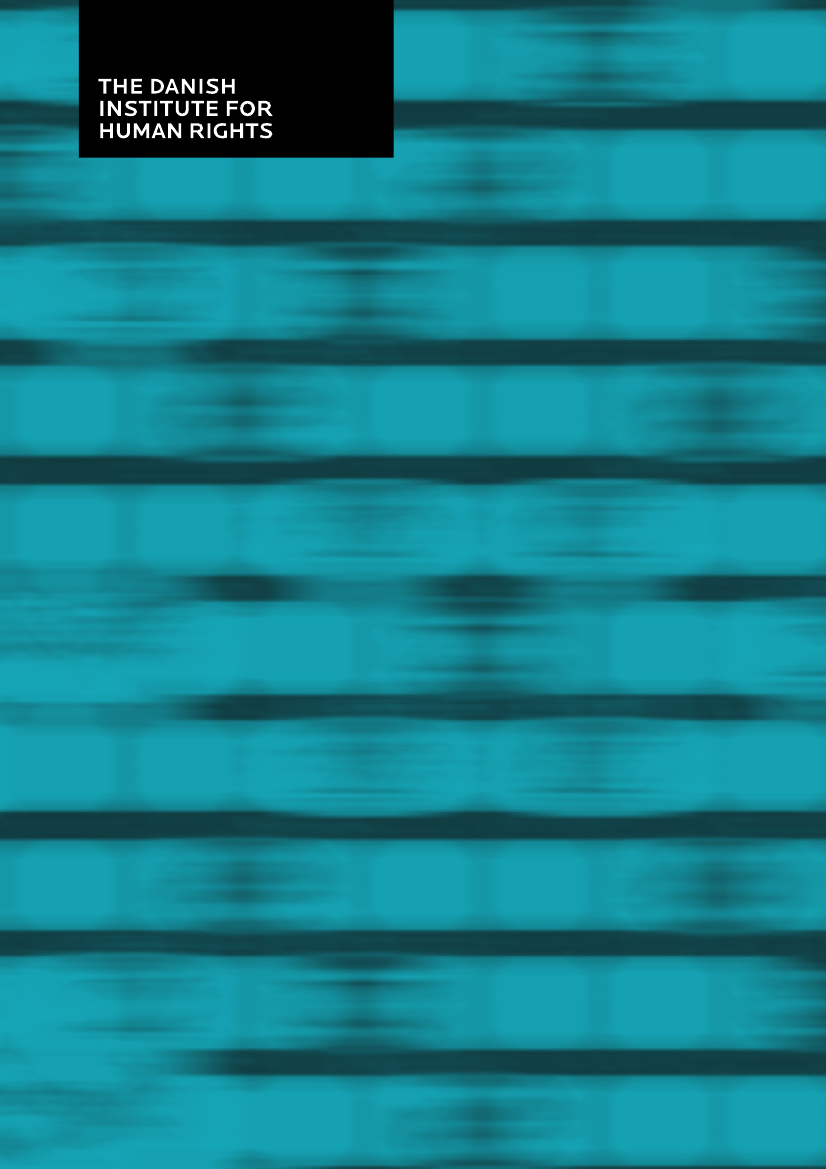Udenrigsudvalget 2012-13, Ligestillingsudvalget 2012-13
URU Alm.del Bilag 200, LIU Alm.del Bilag 74
Offentligt
GETTING TO RIGHTS
THE RIGHTS OF LESBIAN, GAY,BISEXUAL, TRANSGENDER ANDINTERSEX PERSONS IN AFRICA
GETTING TO RIGHTSTHE RIGHTS OF LESBIAN, GAY, BISEXUAL, TRANSGENDER AND INTERSEXPERSONS IN AFRICAAuthor: Fergus KerriganThis study was commissioned and financed by the Danish Ministry of ForeignAffairs. The Ministry is not responsible for the content of the study. Thanks goespecially to my colleague at the Danish Institute, Mr. Ulrik Spliid, who providedinsights throughout the process, commented on several drafts and organizedand jointly conducted the mission to South Africa. In Burkina Faso, M. CyrilleCompaore facilitated the mission and provided knowledge and insight from morethan a decade of research, teaching and activism on HIV / AIDS. In Kenya, MrDavid Kuria Mbote made extremely valuable contributions in terms ofknowledge, insights and contacts. Dr. Lillian Tibatemwa Ekirikubinza providedlegal knowledge and comments on an early draft.Suggested citation: Kerrigan, Getting To Rights: The Human Rights of Lesbian,Gay, Bisexual, Transgenderand Intersex Persons in Africa, Danish Institute forHuman Rights, 2013.� 2013 The Danish Institute for Human RightsDenmark’s National Human Rights InstitutionWilders Plads 8KDK - 1403 København KPhone +45 3269 8888www.humanrights.dkThis publication, or parts of it, may be reproduced if author and source arequoted.At DIHR we aim to make our publications as accessible as possible. We use largefont size, short (hyphen-free) lines, left-aligned text and strong contrast formaximum legibility. We are seeking to increase the number of accessible pdfs onour website, as well as to provide easy-to-read summaries for selectedpublications.
SIDE HOVE
CONTENTS
ABBREVIATIONSINTRODUCTIONEXECUTIVE SUMMARY1HUMAN RIGHTS AND SOCIAL & BIOLOGICAL PERSPECTIVES ONSEXUALITY1.1 Sexual orientation and gender identity1.2 “Essentialist” approaches: biological evidence in brain anatomy andfunctioning1.3 Social constructionist approaches1.3.1“Naturalness”1.3.2Western biases in terminology, and their consequences1.4 Nurture, social environment and sexual behaviour1.4.1Effects of growing up in an LGBTI positive environment1.4.2the fear of Cycles of child sexual abuse1.4.3Research on transgender issues and populations2AFRICAN SOCIAL AND CULTURAL DIMENSIONS2.1 the family and the construction of identity2.2 Social sanctions2.3 Changing social contexts2.4 Fertility2.5 Situational bisexuality2.5.1Histories of Same sex relations2.5.2Situational same-sex behaviour and hierarchical socialrelationships2.5.3Alternative gender identities2.6 Contemporary attitudes2.7 Homophobia and transphobia2.7.1Honour, shame and the fear of loss of status2.7.2Disgust2.7.3Ignorance2.8 The alleged “recruitment” of children2.8.1Fear of “promotion” of homosexuality2.9 Behaviour and identity, private and public spheres2.9.1Sexuality, the private sphere and the uses of deniability
8101120212224262730303233353536373839404042424344464747485050
The importance of symbols and resistance to sexuality intothe public sphere2.9.3Threats to the moral universe2.9.4Northern public debates and same-sex marriage2.9.5African custom2.10 Media: views of key interlocutors on visibility and publicsensitization2.10.1 Government officials2.10.2 Journalists2.10.3 LGBTI activists2.10.4 A film director2.10.5 Health and HIV / AIDS workers2.10.6 The business sector3THE RELIGIOUS SPHERE3.1 Christianity3.1.1Catholicism3.1.2Evangelicalism3.2 The Christian Churches since independence: A snapshot3.2 Biblical condemnation of homosexuality?3.3 Anglicanism3.3.1Scriptural literalism and the debate on homosexuality withinAfrican Anglicanism3.3.2Lessons learned from the Anglican split?3.3.3Proponents and sources of a more accepting view of LGBTIwithin anglicanism3.3.4Anglican position on criminalization / decriminalization3.4 Catholicism3.4.1CATHOLIC DOCTRINAL VIEW3.4.2Catholic View on criminalization3.5 Other churches3.6 CASE STUDY: RELIGIOUS GROUPS AND THE AHB IN UGANDA3.6.1African and US Evangelicals3.7 The Churches and dangerous rhetoric3.8 Islam3.8.1Liberal and progressive interpreters3.9 Conclusions: Positions on criminalization and possible waysforward3.9.1Religion and the Secular State3.9.2Protection of the family4POLITICS4.1 First tendency: moderate political realism4.2 Second tendency: political mobilization of homophobia
2.9.2
51515253555555565657586060616163646566686870707172747476797980828384858586
SIDE HOVE
4.34.44.54.6
4.7
4.8
4.955.15.25.3
5.45.55.6
5.766.1
6.26.3
Third tendency: the politicization of religion4.3.1Religion, purity and national identityFourth tendency: weak or opportunistic liberal commitmentFifth tendency: genuine commitment?Human rights priorities4.6.1Responses of African leaders to international pressure forLGBTI rights4.6.2Threats to impose conditionality4.6.3Positive and negative effects of international pressure inUgandaPublic criticism4.7.1US Policy and conditionality in Malawi4.7.2US Policy and confusion in LiberiaAnalysis – the pros and cons of western voices in African socialdebates4.8.1some key points for western representatives4.8.2considerations of timing and strategy4.8.3Public gesturesCombating political hate speech and promoting toleranceLAW, JUSTICE AND THE CRIMINALIZATION OF SAME-SEX RELATIONSSin and Crime5.1.1Legal / philosophical arguments for decriminalizationdecriminalization through Legislative processesJudicial routes to equality / decriminalization – domestic andinternational5.3.1The UN Human Rights CommitteeDecriminalization through constitutional processesExecutive action and exercise of prosecutorial public interestdiscretionLegislative prohibition of “unnatural acts”5.6.1“Indecency” type provisions5.6.2Unconstitutionality because of vagueness?Some immediate effects of criminalizationTHE HUMAN RIGHTS FRAMEWORK AND SYSTEMSThe obligations to respect, protect and fulfil and the Human RightsBased Approach6.1.1The obligation to respect the rights of LGBTI persons6.1.2The obligation to protect LGBTI persons: equal protection6.1.3Special protection6.1.4The obligation to fulfilMajor human rights issues facing LGBTI persons in AfricaLife, liberty and security of the person and bodily integrity
8889919292939394959596979899100100101101103104105107108110111111113113115115115116117117118119
6.3.1
6.4
6.5
6.66.76.8
6.96.10
6.116.126.136.146.156.16
The obligation to respect the right to life and the deathpenalty6.3.2The obligation to protect: murder of LGBTI persons andactivists6.3.3Murders of LGBTI generallyNon-lethal violence6.4.1The role of human rights defenders6.4.2Gender based violence and LGBTI persons6.4.3Hate Crimes6.4.4Mob violence, police protection and impunityLiberty and security of the person -freedom from arbitrary arrestand detention6.5.1Targeting of LGBTI human rights defenders by lawenforcementTorture and CIDTPBlackmail / extortionFreedoms of expression, association and assembly6.8.1Freedom of expression6.8.2Freedom of Association and participation: “nothing for uswithout us”6.8.3Freedom of assembly and public events6.8.4Legal protection against hate speechEqual treatment and non-discriminationRight to the highest attainable standard of health and HIV / AIDS6.10.1 Gender aspects of HIV / AIDS6.10.2 MSM and HIV / AIDS6.10.3 Religious and pragmatic approaches - Uganda6.10.4 Beyond Uganda6.10.5 Health services: mainstreaming and / or stand-alone clinics?6.10.6 Beyond HIV /AIDS6.10.7 Rights and research on HIV / AIDSRights to education, housing and employmentThe right to privacy and to a family lifeRights especially relevant to transgender personsNational Human Rights Institutions (NHRIs)Other national agencies with specialized mandates, includinggender equality institutionsThe rights of LGBTI persons and the politics of the UN human rightssystem6.16.1 Positions taken in the UN on the subject of decriminalization6.16.2 Work of charter based mechanisms / special procedures6.16.3 The Universal Periodic Review
119120121121121122124126127128128129130130131134136136137138139141144144144145145146146147150150151153153
SIDE HOVE
6.17 The African Human Rights System6.17.1 Rapporteurs and Special Mechanisms6.17.2 Civil Society Participation6.18 Regional Economic Communities (“RECs”)6.19 The Commonwealth7ENTRY POINTS IN DEVELOPMENT PROGRAMMING7.1 Strategic and policy frameworks7.2 Beginning the work of mainstreaming LGBTI issues7.3 Civil society based efforts7.3.1Civil society partnership approaches: channelling donorsupport through LGBTI specific organizations andnetworks7.3.2Generalized public calls for proposals in target countries7.3.3The importance of participation7.3.4Offensive and defensive litigation strategies7.3.5More or less visibility, and kinds of visibility7.3.6Issues of personal safety and security7.3.7Alliances, support networks and engagement by mainstreamHR organizations7.3.8Women’s organizations and their support for lesbian,bisexual and transgender persons7.4 Attempts to build regional and sub-regional networks7.4.1Southern Africa7.4.2Research
153155155157157158158159160
161162162163163165165166167167168
ABBREVIATIONS
ACHPRAGAHBAIAICAIDSETIAUCALCEDAWCHRAJCHRICIDTPCSWCONTRALESACORMSADOJCDEUESCFGMHSRCHRWHIV / AIDSHRCSLGALAGALCKGALZIASC
African Commission on Human and People’s RightsAttorney GeneralAnti-Homosexuality Bill (Uganda, 2009/ 2012)Amnesty InternationalAfrican Initiated ChurchAIDS Empowerment and Treatment InternationalAfrican UnionCoalition of African LesbiansConvention on the Elimination of Discrimination against WomenCommission on Human Rights and Administrative Justice (Ghana)Commonwealth Human Rights InitiativeCruel, Inhuman and Degrading Treatment or PunishmentCommercial Sex Worker(s)Congress of Traditional Leaders of South AfricaConsortium for Refugees and Migrants in South AfricaDepartment of Justice and Constitutional Affairs (South Africa)European UnionEconomic, Social and Cultural (rights)Female Genital MutilationHuman Sciences Research Council (South Africa)Human Rights WatchHuman Immunodeficiency Virus / Acquired Immune Deficiency SyndromeHuman Rights Commission of Sierra LeoneGay and Lesbian Memory in Action (South Africa)Gay and Lesbian Coalition of KenyaGays and Lesbians of Zimbabwe(UN) Inter Agency Standing Committee
8
ICJICCPRKHRCKNCHRMARPMBDHPMSMNASCOPNANHRINGLHRCPAMACPEPFARSAHRCSAPSSGBVSIPDSOGISR ESAESR VAWSSATEASMUGUHRCUNHCHRUNHCRUNFPAURCBWGADWSWZHRC
International Commission of JuristsInternational Covenant on Civil and Political RightsKenya Human Rights CommissionKenya National Commission on Human RightsMost at Risk PopulationMouvement Burkinabe des Droits de l’Homme et des PeuplesMen who have sex with menNational Aids and STI Control Programme (Kenya)Network of African National Human Rights InstitutionsNational Gay and Lesbian Human Rights Commission (Kenya)Programme d’Appui au Monde Associatif et Communautaire de LutteContre le VIH / SIDA, la Tuberculose et le Paludisme (Burkina Faso)President’s Emergency Plan for Aids Relief (USA)South African Human Rights CommissionSouth Africa Police ServiceSexual or Gender Based ViolenceSupport Initiative for Persons with Atypical Sex Development (Uganda)Sexual Orientation and Gender Identity(UN) Special Rapporteur on Extrajudicial, Summary and ArbitraryExecutions(UN) Special Rapporteur on Violence against WomenSame Sex AttractionTransgender Education and Action (Kenya)Sexual Minorities UgandaUganda Human Rights CommissionUN High Commissioner for Human RightsUN High Commissioner for RefugeesUN Population FundUnion des Religieux et Coutumiers du Burkina Faso pour leDéveloppement et la Santé(UN) Working Group on Arbitrary DetentionWomen who have sex with WomenZambia Human Rights Commission
9
INTRODUCTIONThis study takes its point of departure in human rights, equality and personal freedom,including support for the rights of LGBTI persons. Its intention is to combine theseprinciples with respect for African communities, cultures, and the fortitude with whichAfricans face many challenges.Human rights law demands that people be protected against human rights violationscommitted by private actors. The Human Rights Based Approach to Development(HRBA) looks at the potential of non-state actors as partners. In contexts where manypublic services are delivered by non-state actors, many areas of family and private laware governed by customary or religious institutions and norms, and where the outreachof the state is limited, examining the roles of non-state actors takes on a particularurgency. Thus, this study devotes as much or more attention to structures and normsbased in religion and society as in the state. In practice, these various norm sets are veryoften mixed together with one another.Some may argue that African societies are not yet ready to take on the challenges of adebate on issues such as sexual orientation and gender identity. There are manyresponses to this. Most obviously, African societies are taking on this challenge, eitheron their own account or as a consequence of living in our globalized world. AfricanLGBTI persons and activists, like those in other parts of the world, are not waiting for adate in the future to start challenging prejudice. Neither are their opponents. All sectorsof society, including media, politics, religion and the education and health sectors areincreasingly addressing these issues. Representatives of all of these sectors testify to thepublic’s thirst for knowledge, as well as for a firm moral foundation on whichcommunities can live together. African societies and the deeply human values theyembody contain resources to face challenges, including in this sensitive domain.
10
EXECUTIVE SUMMARY1. Current scientific knowledge on sexual orientation, gender identity and sexualprejudiceThe study of sexuality helps in providing foundations for advocacy for rights in relationto sexual orientation and gender identity. Scientific research in this field can be broadlydivided into two areas. One is biological, the other social and psychological. These twoare sometimes classified as “essentialist” and “social constructionist” perspectives. Eachprovides valuable perspectives for a greater understanding of these issues. Each can beused and abused in social, legal and political debates.Psychotherapeutic attempts to change sexual orientation have fallen into disfavour withleading psychological bodies on both scientific and value-based grounds. Adherents ofsome religious faiths promote the idea that sexual orientation can be changed throughprayer. Instances of “situational” same-sex relations are observable in almost all culturesand historical periods, and some research does suggest that the social environment canplay a role.The current revisions to the American DSM (DSM V/5) will mean thatTransgenderconditions will no longer be considered a “mental disorder”. While a (new) diagnosis of“gender dysphoria” will be relevant for qualification for gender reassignment treatment,gender dysphoria is an indication of the difficulties that individuals face in relation tosociety and the difficulties caused to transgender individuals of not having their genderidentities confirmed in social life. This is consistent with Principle 18 of the YogyakartaPrinciples.Scientific knowledge in this field is not sufficiently well-known among many Africanmedical and psychological professionals. While knowledge still leaves room fornormative and scientific disagreements, it is important that this is addressed.HomophobiaSexual prejudice / homophobia is widespread in human culture, perhaps especiallyamong males. The role of feelings of disgust at some physical functions and fear, both ofone’s own unexamined or unrevealed feelings, and of loss of status and identity areoften discussed among researchers and can be empirically observed in campaignsagainst LGBTI persons. Sexual acts are often overly emphasized, and emotional andother aspects of same-sex relationships omitted. The biological imperative ofreproduction and an inherent fragility of socially constructed male identity are relevant.It is still fairly rare for gender related development programming in African contexts toaddress masculinity (or masculinities).
11
The slur of “recruitment” by homosexuals:In some highly politicized contexts, includingUganda, the allegation that gays and lesbians are attempting to “recruit” children areoften made. No evidence has been produced. Numerous studies show that LGBTIpersons are no more likely than other people to commit pedophilia. The allegation of“recruitment” may be (deliberately or not) confused with “promotion”, which can meaneither the exercise of rights of freedom of association, assembly and expression byLGBTI persons, or the production of advocacy or public information material that tries toencourage understanding and tolerance. Sex-education material targeted at youngpeople is especially sensitive in these contexts.Especially among men, same sex relationships, like those between people of oppositesex, have often reflected inequalities of power in social and economic relations,including those based on age. In some contexts, homosexuality might be understood asimplying pederasty. There is historical and social evidence that this was socially acceptedin some contexts in Africa, as in other parts of the world. This happened in socialcontexts that also tolerated arranged marriages of child or adolescent girls.2. African social and cultural dimensions and the rights of LGBTI personsThe centrality of the family and clan influences many aspects of the lives and rights ofLGBTI persons in Africa. Economic and social protection, status, identity and socialprestige are bound up with the completion of family obligations including marriage andreproduction. This is caught up with African ideas of “Ubuntu” and identity and the selfbeing developed through social relations rather than individual consciousness.Fears related to the family:Fears that homosexuality poses a threat to the continuationand survival of the family and tribe, or even of the nation as a whole, are often raised inAfrican debates.Most adult gay and lesbian Africans (both male and female) are in heterosexualmarriages. Many can conduct same-sex affairs with relative freedom as long as theycomply with outward social obligations of marriage and reproduction. Thus “situationalbisexuality” is widespread. Especially in the case of homosexual men, this hasconsequences for patterns of HIV transmission and may endanger wives. In some casesthe spouse knows of the transgender or same sex orientation and conduct, and mayeven assist (for example, in helping to cross-dress). Where the same-sex conduct is notknown to the spouse or family, the risk of exposure creates a risk of extortion blackmail(see below).“Coming out” in the western sense places many gay and lesbian Africans at risk of beingcut off by families and incurring severe social isolation with consequences far moresevere than would be the case in individualized western society. Likewise, a gay orlesbian African must consider that going public about their sexual orientation or genderidentity may have serious consequences for members of their family, and not only forthemselves. LGBTI people may to some extent be able to mitigate these problems by
12
attempting to show that they are good members of the family and of societyirrespective of their sexual orientation or gender identity.Althoughsame sex marriageis neither demanded by international human rights law orby the vast majority of LGBTI activists in Africa (except in South Africa, where it is legal),it is often brought up in debates by opponents of decriminalization. Rumours and scaresabout same-sex marriages have been behind a surprising number of incidents of mobviolence and increased repressionBehaviour and identityConcepts of sexual orientation and gender identity contain cultural specificities that maynot be applicable in all situations. Human rights law places the foundation of non-discrimination on the idea of a fixed identity that is based on the gender of the personthat one is attracted to. Scholars point out that constructions like this can “constitute”identity rather than simply reflecting it. It may displace other ideas of identity that arebased in local culture.In order to avoid the label of “homosexual” which many African men who engage insame-sex behaviour are not willing to take on, the phrase “men who have sex withmen”, or “MSM” has been coined in the context of public health work and especially HIV/ AIDS. This is an attempt to describe behaviour as opposed to identity. Likewise, theterm WSW is now also used. In many African social contexts, a distinction is madebetween the partners in MSM relationships, with different roles and words beingassigned to the two, and shame being attached mostly to the receptive person. A fewexamples can be found in anthropological literature of gender identity being based onwork and social (rather than sexual) roles, though these do not appear to have beenwidespread in Africa.African societies do not generally encourage public displays of affection even amongheterosexual couples. Thus, any hope of greater toleration of same-sex behaviour orattraction, if achieved, may look rather different in Africa than it does in westerncountries. Some political and social leaders evoke this by admitting that same sexbehaviour may have existed in traditional African society, but that it should not bedisplayed publicly.The experience of HIV / AIDS organizations working at community level is among themost valuable in gauging social attitudes and how to navigate them. Bringing theseexperiences into dialogue with human rights activism can give a basis for ways forwardthat can be productive. Dialogue of this kind is important in finding ways to solve one ofthe dilemmas that most concerns governments: how to square the exercise of rights offreedom of expression, association and assembly with the maintenance of peace andpublic order. Since human rights work is often state-centered rather than being stronglyanchored in society, it needs to take these voices into account.
13
The media are often an unpredictable joker on this question. Popular television andespecially radio have played an inflammatory role in many of the flare-ups of mobviolence and political campaigns against LGBTI. On the other hand can media play amuch more positive role in creating debate, increasing knowledge etc.3. The Religious SphereChristian congregations or groupings that do not interpret the bible as condemninghomosexuality are in a tiny minority in Africa. While the two traditionally largestChristian denominations, Anglicanism and Catholicism, both present serious oppositionto a wide acceptance of the rights of LGBTI persons, there are important needs andopportunities for advocacy in relation to both of these churches. In respect of each ofthem, the African branches belong to the doctrinally conservative wing on this issue.Representatives of Evangelicalism or Pentecostalism (for present purposes the two aretreated together here), the third important branch of Christianity in Africa, are generallyamong the leaders of Christian opposition to any liberalization of laws or socialattitudes.Anglicanismsuffered a serious divide on the issue of homosexuality (the ordination ofgay bishops) in the early 2000s, with almost all African churches taking the conservativeside against liberal North American and to some extent British, Australian and NewZealand churches. Most senior Anglicans in Africa support continued criminalization ofsame-sex conduct, and some have led the way in advocating even stricter laws. SouthAfrica is an exception.Nevertheless, Anglican resolutions on the issue (agreed to by the African churches) leaveroom for dialogue that should be explored. In most African Anglican churches, moretolerant voices are to be found. They coherently present a different interpretation ofbiblical scriptures and the Christian message that is too little heard. These groups areworking and organizing to propagate a voice of tolerance of sexual diversity withinAnglican Christianity in Africa that is based on Christian teaching. They maintain links topersons and organizations abroad as well as to some members of their own churches inAfrica. Their message is extremely important not only for many LGBTI people but inorder to counter a general impression that religious condemnation is universal. Groupslike these have received some external support. This needs to be continued and builtupon.Catholicism,based on a more centralized hierarchy and doctrine, shows fewer signs ofopen disagreement on the issue than the Anglican one. Advocacy in relation to theCatholic Church could usefully focus on the official position of the Catholic Church,voiced on several occasions by the Holy See, that criminal penalties are not anappropriate way of dealing with homosexual conduct. The Catholic Archbishop ofKampala in a 2009 statement was almost alone among major Christian leaders inopposing the Anti-Homosexuality Bill. Catholic leaders in other countries do not always
14
respect this position. Catholic organizations are important providers of care and supportin relation to HIV / AIDS.Evangelical and Pentecostal churches(some of them linked to similar bodies in the USA)are among the fiercest opponents of the rights of LGBTI persons in Africa. Theirconservative agenda also opposes many aspects of women’s reproductive rights,especially abortion. Representatives of some USA based religious conservatism /fundamentalism have combated attempts at decriminalization and spread highlydubious information such as the unfounded allegation that LGBTI people aredeliberately “recruiting” children. Nevertheless, it would be a mistake to be blind to theagency of African actors in this regard.By appealing to homophobia, prejudice and nationalistic sentiment, these groups havetapped into the discourse that homosexuality is “unAfrican” and being promoted bywestern (especially northern European) NGOs and governments. Showing the Africanpublic and leadership that this is not the case will require determination, long term workand considerable skill. It is important not to fall into the trap of appearing to beneocolonialist. Some African and US based organizations attempt to track the activitiesof these groups and to expose the “neocolonial” aspects of their own messages andtactics.IslamIt has been noted that prior to the modern era, out of the three Abrahamic religions,Islamic societies were historically the most tolerant of same-sex behaviour. In recenttimes, this tolerance has been eclipsed by the growth of more conservative andfundamentalist tendencies. Moderate forms of Sufi Islam that were widespread in WestAfrica have faced competition from more conservative and some extreme tendencies inrecent decades. The popularity of the latter has to some extent been linked to economiccrises and state failures.Compared to Christian churches, fewer Islamic religious groupings find a base fortolerance of gender and sexual diversity in religious scripture. Nevertheless, these doexist and are working in some contexts. As is the case with Christianity, there are manyexamples of religion being mobilized for homophobic purposes, or of particularrepresentatives of Islam using homophobia to mobilize popular action.There are examples of Muslim and Christian community leaders allying with one anotherto drive out or intimidate homosexuals. This happened in Mtwapa in Kenya in 2010.Among those promoting tolerance however, there is also cooperation between Muslimsand Christians. Organizations such as “Other Sheep” in Kenya cooperate with “InnerCircle”, a Cape Town based Muslim organization. In Burkina Faso, a quasi-public bodythat unites representatives of various faiths, as well as traditional leaders, appears to bea relatively moderate (if not obviously tolerant) voice.
15
4. PoliticsThe study identifies six tendencies in African politics on issues of sexual orientation andgender identity.i)Caution of moderates
Some moderate African leaders privately point out that LGBTI persons are not undulyharassed by state agents (few or no prosecutions), and that public opinion will notpermit decriminalization. In these circumstances, and in order to avoid threats to socialpeace and public order they argue, it is best to “let sleeping dogs lie”. For activists, animportant question is whether this pragmatic approach will allow HIV / AIDS outreachand public advocacy for change. A further question is whether conservative forces willrefrain from campaigning for increased repression.ii)The mobilization of homophobia for political purposes
Since the early 1990s, homophobia has been mobilized for political purposes. The initialinstances of politically motivated homophobia were all made by political leaders whohad personally fought against white racial domination. Later, the rhetoric was picked upby other politicians, often with an anti-western echo. Homophobia can be mobilized toportray political opponents as weak or as stooges of western interests. It can also beused as a political distraction or as part of a more general campaign to limit civilliberties.iii)The politicization of religion
Religion is often useful to African political leaders to create a feeling of national unity ina context where people are not united by language or ethnicity and where the credibilityof secular state institutions and projects has suffered. The post-1994 South Africanstate, founded on an explicitly civic compact that recognizes diversity, is a political rarity,contrasting with for example the constitutional designation of Zambia as a “Christiannation.” A more extreme politicization of religion is found among the Evangelicalpromoters of the Anti-Homosexuality Bill in Uganda. Many of these are linked tofundamentalist Christian movements in the USA who dream of Christian “dominionism”,where all important areas of society are governed according to Christian ideas. Forthese, homosexuality plays a symbolic role as a visible face of modern westernliberalism. Ugandan President Museveni seems to have moderated his position andmoved away from the promoters of these tendencies.iv)Weak or opportunistic liberal commitment
There are some similarities between this tendency and the first one. Here, moderatepolitical leaders up against hardliners are often forced to make gestures of supporttowards western liberal values because they are in need of western economic or
16
political support or media goodwill. Their relative liberalism in relation to LGBTI issues isusually not insincere, but is shallow and soon dropped after obtaining power becausethey know it remains unpopular at home. Moreover, reform in this area is a low priorityin comparison with other pressing issues.v)Genuine commitment
There have recently been a few examples of political figures or candidates who voice agenuine commitment to the rights of LGBTI persons. They remain in a small minority.Some former leaders who no longer hold political office are prepared to speak out onthe damaging effects of criminalization, especially on the combat against HIV / AIDS.Political and human rights prioritiesCrude political conditionality on the sole issue of the rights of LGBTI persons hasgenerally not been a success. It has caused misunderstandings and has usually arisen outof media statements rather than fully developed policies or strategies. There arenevertheless examples of conditionality and arm-twisting that have achieved results inextreme situations. Such strong-arm tactics come at a price, however, and are likely toprovoke cynicism among African publics.Short of outright conditionality and threats, western leaders and officials can make theirmessage heard in a number of ways. They should continue to do so.5. Justice SystemsThe principles of separation of Church and State, and the differences between crime andsin, are insufficiently understood and too little heard in the public debate in Africa. Thepost-colonial states inherited from British colonialism are a particular focus in thisregard. Unlike the former French colonies where republican secularism prevailed, Britishcolonial legal systems did not make a clear distinction between law based on secularhumanist principles as opposed to religious ones.In much of the world, the struggle to decriminalize same-sex acts between consentingadults has taken place in the context of legal systems on the British common law model.Decriminalization has been based on two main legal planks. One is the right of privacy,the other is the notion of equality and non-discrimination. The second of these two ismore far reaching. Where it has occurred, decriminalization has come about throughjudicial, legislative and constitutional processes. The pros and cons of these differentavenues are discussed in the report. Too great a focus on judicial and internationalmechanisms is likely to be divisive. The international human rights framework could beused somewhat more in relation to African states where homosexual acts arecriminalized, but its limitations (non-binding decisions and a lack of enforcementmeasures) should not be forgotten. Litigation and legislative efforts do not necessarily
17
have to tackle decriminalization first. In some contexts, there may be good reasons andbetter chances of success through taking on other issues as a first step.6. Human Rights Standards and SystemsThe human rights based approach (HRBA) and the respect, protect, fulfill frameworkshould be combined as an analytical and programmatic framework to address theseissues. This entails a focus on state as well as non-state actors. Some prioritization ofhuman rights issues is acceptable based on a calculation of the severity of violations, thenumber of victims and the criterion of vulnerability. Rights to life, personal integrity(including protection from violence) and liberty and security of the person are a priority.Non-discrimination in relation to health services and HIV / AIDS should be combinedwith public health approaches. Especially at community level, it is important to be awareof the need to build further on the progress that has been made in reaching out tocommunities and to be sensitive to social attitudes.Violence against LGBTI persons takes various forms and demands appropriateresponses. Mob violence, individualized hate crimes and state abuses are present. Inpractice, impunity often reigns for incitement to violence against LGBTI persons.Increased visibility of LGBTI persons, organizations and issues has led to or beenassociated with higher levels of insecurity and violence, and programmatic approachesto the rights of LGBTI persons should plan to meet challenges in this area. A key point inthis regard is the strengthening of links between mainstream human rights organizationsand protection mechanisms and defenders of the rights of LGBTI persons.Analysis and programming on sexual and gender based violence (SGBV) generally doesnot include violence against LGBTI, although there are some exceptions. Blackmail andextortion takes place both within the LGBTI community (especially among MSM) andwith the collusion of corrupt police. Strategies to combat this have been developed, butrequire capacity building to be applied.Discrimination against LGBTI persons takes place mostly in the social sphere rather thanthrough the state, but there are few examples of anti-discrimination legislation ormechanisms being applied to LGBTI persons.Freedoms of association, expression and assembly for LGBTI persons are a particularbattleground, both at national and international levels. Some mechanisms of the UNhuman rights system have addressed these questions. National laws on freedom ofassociation are generally not respected when it comes to LGBTI persons andorganizations, but there is at the same time a significant increase in associational life.Paradoxically, this is more evident in many Anglophone countries where same-sex actsremain criminalized.
18
Mechanisms such as the UPR and the examination of state reports by UN treaty bodieshave widely taken on LGBTI questions. The potentials of further progress in the UN,including voting patterns in UN bodies, are analyzed.The African human rights system is, despite its challenges, an important forum fordiscussion of this issue. The NGO forum, held in connection with the sessions of theAfrican Commission on Human and Peoples’ Rights, in particular has been a centre ofdevelopment of African human rights thinking, advocacy and action. Mainstream Africanhuman rights NGOs have gradually become more open to LGBTI issues through thisforum, and some members of the African Commission have also been supportiveNational human rights institutions (NHRIs) have begun to consider LGBTI issues. Thereare examples of courageous work (Kenya), standing up for principle in difficultcircumstances (Uganda) and valuable research and advocacy (South Africa). Others havebeen more circumspect, and some have been negative. There is an unexplored potentialfor NHRIs to be convenors of national dialogues on these issues. As well as institutionalwill, this would in many cases require capacity building7. Policies and Entry Points in Development ProgrammingGuidelines developed by a number of western countries on programming in relation toLGBTI issues are examined. Programme staff in the field are often challenged inimplementing these policies because of taboos, lack of knowledge and the perceptionthat this issue is a low priority. There is some potential to discuss LGBTI in genderoriented policies, but it may be easier to approach this through opening a discussion onmasculinities than through moving directly to LGBTI questions.Norway, the Netherlands, Sweden and Canada have been leading state actors in civilsociety support to LGBTI causes and organizations. A number of private organizationsand funds are also important actors. LGBTI organizations and supporters based in SouthAfrica and western countries have been successful in partnering with organizations atnational level. The building of civil society organizations, networks and capacities is likelyto remain the largest and most viable avenue in the coming years. An importantcomponent of this is to enable outreach and linkages to mainstream human rightsorganizations.
19
CHAPTER 11HUMAN RIGHTS AND SOCIAL & BIOLOGICALPERSPECTIVES ON SEXUALITY
Some initial reservations and observations are necessary. The authors are not qualifiedprofessionals in the area of studies on sexuality, and this section does not purport to bemore than a layperson’s attempt to summarize current knowledge and discussion.Research and debate on sexual orientation and gender identity often takes place in astrongly politicized atmosphere. In the USA, two clearly identifiable sides in a “culturewar” have battled for the past few decades. Prominent debaters have sometimesexperienced prejudice and discrimination or feel that their deeply cherished moral andsocial order is threatened.The research related to brain structure and neurological responses described below is atmost two decades old. Its implications remain tentative, and much still needs to belearnt. Homosexual men have probably been the object of most medical studies,followed by homosexual women. The approach of the medical and psychologicalprofessions to transgender conditions has remained controversial among somemembers of transgender communities. One does not have to go far back in time to findexamples of treatment and approaches that appear seriously misguided today, basedmore on social prejudices than on the innate well-being of the persons concerned.While some African societies escaped the prejudices found in the West on these issues,they are hampered in developing and articulating their own perspectives by a lack ofresources for research. It is difficult to discuss issues such as transphobia andhomophobia without addressing the cultural and cross-cultural aspects of transgender,intersexuality and homosexuality themselves, but achieving a truly cross-culturalperspective is no easy matter.1American political and social debates spill over intoAnglophone Africa in particular, which also has its own set of issues. This chapterreflects this politicization. The prioritization of issues may not necessarily reflect those ofgreatest concern to LGBTI persons, but rather those that are often heard in social andpolitical discussions. Thus, this study addresses some prejudices (for example in relationto child sexual abuse) because myths are better addressed than allowed to thrive insilence. The same is true of some social and historical truths about same-sex practices.
11
Epprecht, Marc, Understanding homophobia in Africa today in Perspectives, 4.10, Heinrich Böll Stiftung, 2010
20
1.1 SEXUAL ORIENTATION AND GENDER IDENTITY
“Sexualorientation is understood to refer to each person’s capacity for profoundemotional, affectional and sexual attraction to, and intimate and sexual relations with,individuals of a different gender or the same gender or more than one gender.”“Gender identity is understood to refer to each person’s deeply felt internal andindividual experience of gender, which may or may not correspond with the sex assignedat birth, including the personal sense of the body (which may involve, if freely chosen,modification of bodily appearance or function by medical, surgical or other means) andother expressions of gender, including dress, speech and mannerisms.”Yogyakarta Principles, introductionWhile the foundations of sexual attraction or orientation, whether homosexual, bisexualor heterosexual remain uncertain, it seems clear that they have no single “cause”.Approaches to studying sexuality are sometimes classified as either “essentialist” or“social constructionist” depending on whether they take their outset in biology or socialscience and psychology. Science and politics are intertwined in these discussions.Natural science or biological approaches include genetic, endocrine, evolutionarypsychology and brain research (Delamater and Hyde, 1998). Critics of these approacheshave categorized them as “essentialist,” especially when they unquestioninglyreproduce currently dominant social understandings. For some, these ways ofaddressing gender and sexuality may hark back to the days when homosexuality orgender non-conformity were pathologized as illness, or evoke a world of rigid genderroles that are discredited today. Fears have occasionally been expressed of developmentof medical procedures that might attempt to eliminate purported “gay genes”, or tomanipulate the biochemical balance in a mother’s womb. Nevertheless, a more modernschool of natural scientists does not come to the biological approach with the baggageof outmoded ideas about gender binaries. On the contrary, it tends to illustrate themany nuances that exist along various scales. Work for the legal recognition of the rightsof LGBTI persons, especially in North America, has often emphasized biologicalexplanations of homosexuality that most clearly deny an element of choice.2Social constructionism, on the other hand, refers to the social and cultural context inwhich commonly used concepts and categories are developed and used. It tends toshow that these concepts are “contingent” and to some extent arbitrary rather thanuniversally valid. As with biological approaches, this thinking can be exercised in anopen-minded or repressive manner. It can allow us to lift the veil of assumptions thatturn out to be no more than prejudices - for example that women are poor drivers orthat a particular race or nationality is lazy or dishonest. Viewing assumptions orstatements of this kind with suspicion has been of vital importance in overcomingdiscrimination and racial conflict, and in making progress towards women’s liberation.2
President Obama stated his belief in 2010 that discrimination against LGBTI people was wrong because sexualorientation is innate. http://edition.cnn.com/2010/POLITICS/10/14/obama.homosexuality/index.html
21
On the other hand, some opponents of SOGI liberalization have often favoured socialand psychological explanations of homosexuality that suppose a degree of choice andmalleability. They struggle to maintain the social and legal repression of homosexualityand gender non-conformity, sometimes believing that sexuality is chosen, that choicescan be changed, that homosexuality can be eliminated or radically limited in society, oron the other hand, that it will run rampant and cause evil if allowed to come to thesurface.Thus, it would be wrong to say that essentialism or social constructivism unequivocallysupports liberalization while the other opposes it. Strict binary divisions (i.e. between“heterosexuals” and “homosexuals” regarding SOGI have been rejected by sexualityresearch ever since Kinsey’s scale in 1948. It may be equally incorrect to impose a clearbinary division between biological and social influences on sexuality, or between“constitutional” and “situational” homosexuals. Evidence in recent decades of biologicalcorrelates for same sex-attraction (SSA) do not exclude “nurture” and socialenvironment as influences. Most leading researchers fully recognize that many factorsplay a role. Enlightened use of a variety of approaches is possible and necessary.
1.2
“ESSENTIALIST” APPROACHES: BIOLOGICAL EVIDENCE INBRAIN ANATOMY AND FUNCTIONING
The past two decades have seen a strengthening of biological research on sexualorientation and gender identity. It is recognized that early gender non-conformity inchildhood is the most reliable predictor of adult homosexuality. Studies have shown thatup to 75% of gender non-conforming children (usually identifiable as such by the age of3) grow up to be gay or lesbian.3Far from all lesbian or gay adults showed this tendencyas children, and some heterosexual adults also recall engaging in gender non-conforming behaviour.Medical research appears to show observable anatomical differences in the brains ofgay and straight men. Le Vay (1991) found that certain nuclei in the hypothalamus of thebrains of homosexual men had a size more typical of brains of females. Witelson (2008)found that the corpus callosum that links the two halves of the brain was larger ingroups of both females and gay men than in groups of straight men, suggesting greatersymmetry between the two sides of the brain. Brain scans carried out by Swedishresearchers Savic and Lindstrom (2008) showed average right and left brain sizes insamples of homosexual men and women that appeared to show similarity to thosetypical of the opposite sex, as well as gay men and women appearing more likely toshow more balance in right and left brain functions than straight men and (to someextent) lesbians, who are more likely to show a dominance of functions typical of theright brain. Differences in the amygdala favoured more emotional responses to certain3
Bailey J. M., Zucker K. J. (1995). "Childhood sex-typed behavior and sexual orientation: A conceptual analysis andquantitative review". Developmental Psychology31:43–55.doi:10.1037/0012-1649.31.1.43.
22
situations by gay men and straight women, whereas the responses of straight men andlesbians were more likely to be of the “fight or flight” type.2007 research by Ponseti also found differences between lesbians and heterosexualwomen in an area of the brain concerned with the olfactory sense (smell). Research ontask performance by the groups of heterosexual and homosexual men and womenstudied appeared to show that gay men and straight women have similar profiles,performing better than straight men and lesbian women at a number of verbal andmemory tasks, while gay women showed resemblance to many straight men inperforming generally better at spatial tasks. Lesbian women studied also appeared onaverage to resemble men and differ from most heterosexual women in their responsesto startling noises and index to ring finger ratio. (The latter is a well-known differencebetween men and women generally (and a marker of pre-natal testosterone exposure.)It goes without saying that these differences are extremely unlikely to have any otherorigin than a strictly biological one.4The Stockholm researchers have also shown thatresponses to testosterone and estrogen derived compounds (which may bepheromones) appear to differ according to the sexual orientation of the subject.5Thisappears to be further evidence that sexual responses are autonomic, and not chosen.In German and Swedish research, transgender people also appear to show differences inbrain anatomy, though there are differences in this regard between androphilic andgynephilic transsexuals, with the latter not exhibiting signs of brain structure typical offemales, but also differing from most heterosexual males. Androphilic transsexuals(male to female, or transwomen) displayed sex-atypical brain anatomy and responses toerotic material that were more characteristic of females.6Gynephilic transmen (femaleto male) showed some cerebral patterns more typical of men. Generally, these resultswere evident even where the people involved were not taking hormone treatment,which can influence brain anatomy.7A large study conducted on twins in Sweden indicated that “the environment shared bytwins (including familial and societal attitudes) explained 0-17% of the choice of sexualpartner, genetic factors 18-39% and the unique environment 61-66%. The individual'sunique environment includes, for example, circumstances during pregnancy andchildbirth, physical and psychological trauma (e.g., accidents, violence, and disease),peer groups, and sexual experiences. “
Much of this research can be seen in an excellent online video presentation by leading academic Prof. Glenn D. Wilsonat: http://blip.tv/greshamcollege/born-gay-the-origins-of-sexual-orientation-professor-glenn-d-wilson-gresham-college-lecture-45613085http://www.pnas.org/content/102/20/7356.abstract6See Gizewski, E. R., Krause, E., Schlamann, M., Happich, F., Ladd, M. E., Forsting, M., & Senf, W. (2009). Specific cerebralactivation due to visual erotic stimuli in male-to-female transsexuals compared with male and female controls: An fMRIstudy.Journal of Sexual Medicine, 6,440–448.7Rametti, G., Carrillo, B., Gómez-Gil, E., Junque, C., Zubiarre-Elorza, L., Segovia, S., Gomez, Á, & Guillamon, A. (2011).White matter microstructure in female to male transsexuals before cross-sex hormonal treatment. A diffusion tensorimaging study.Journal of Psychiatric Research, 45,199-204.doi:10.1016/j.jpsychires.2010.05.006
4
23
Evidence from natural science points at a number of factors, both genetic and hormonal.Studies show a disproportionately high rate of concordance of sexual orientation amongmonozygotic twins. Scientists such as Dean Hamer have pointed to some genes on the Xchromosome, though it seems very clear that there is no single “gay gene”. Pre-natalexposure and responsiveness to testosterone (with epigenetic “switches” beingsignificant) may play an important role, and “causality” may vary significantly from oneperson to another. Qazi Rahman, a leading UK based scientist researching in this areaattributes roughly 30% of the influence on sexual orientation to genetic factors.8Someresearch has focused on fraternal birth order with increasing incidence of homosexualorientation in males depending on the number of older biological brothers.9The effect isnot present in regard to non-biological brothers, thus discounting rearing or familycircumstances as a cause. Neither is this effect present in girls, which tends to reinforcethe hypothesis that the increase is due to an immune system reaction to male hormonesin the mother’s womb.The results of the biological research seem convincing, but not all experts find them tobe completely so, pointing out potential problems with sample types and sizes.10Somepoint out that this science is in its infancy and that results show correlation rather thancause. Some argue that future research may show that differences and responses of thekinds described above can be a consequence of conditioning and behaviour, and notsimply a cause.
1.3 SOCIAL CONSTRUCTIONIST APPROACHESHumanity does not possess terms to describe sexuality that fully transcend cultural andtemporal boundaries. Language – the use of particular terms and concepts - is a culturalprocess that is tied to particular times, places and forms of social order, including powerrelations. Michel Foucault wrote of “sexuality” as a field of enquiry that is linked to thehistorical rise of the bourgeoisie and their exercise of power. Cultural structures,assumptions and biases of time and place reproduce themselves in psychological,political and social discourses that contain an exercise of power in how the terms ofdebates, contests and self-understandings are set. Social constructionists examinelanguage and culture, on the premise that reality is constructed by societies rather thanbeing founded only in objective “truth”. They are wary of “essentialists” uncritical use ofterms that reproduce dominant understandings, and the repressive elements that thesemay contain. Thus words or categories like “heterosexual”, and “homosexual” should besubject to critical analysis, as implying a binary understanding that confirms thenormative status and dominant position of “heterosexual”, including the implicationthat those experiencing same-sex attraction will always be in a small minority, andperhaps even that they are to be considered “abnormal”.
89
http://www.qmul.ac.uk/research/mind_society/mind_society_stories/65407.htmlhttp://www.ncbi.nlm.nih.gov/pmc/articles/PMC1626369/10See Osmundsson, http://isites.harvard.edu/icb/icb.do?keyword=k78405&pageid=icb.page414413
24
The term “homosexual” was first used in Western Europe about 140 years ago11,gradually becoming current in the succeeding decades. The words “lesbian”, “gay”,“bisexual,” ““transgender”, “gender identity” and “sexual orientation” all have ratherrecent western linguistic and cultural origins, and the understandings that they evokeare most often of social relations found in modern or postmodern societies. Whetherthey can accurately describe same-sex relationships, attractions and behaviour, ornotions of a “third gender” in other cultures is open to question. As one study noted, thephrase “sexual orientation” assumes that “thegender of the sexual partner is the crucialissue in sexuality, and that individuals link their (different or same) sex practice in aconsistent way to their affections and their public identity. Yet many women and men donot organise their lives in this manner, yet engage in same and different sex partnerbehaviour”.In some contexts, people might not make the currently orthodox neatseparations between sexual orientation and gender identity. Feminist thought has shedlight on the arbitrariness of gender categories that were previously assumed to be“natural” or God-given. As the US scholar Alice Miller has written:“much legal work and advocacy on sexuality draws on older, perhaps more comfortablethinking that assumes most people across the world “naturally” have settled identities.The modern, apparently progressive version of this naturalised story is that some peopleare just ‘born gay’, as some are just ‘born straight’, and that women’s sexuality is fusedwith their reproductive capacity. “Natural” models of this sort tend to assume that allhuman bodies simply produce sex and gender expression; that same sex behaviourautomatically equates with a gay identity; that same sex and heterosexual identities andbehaviours are clearly distinct (or even that these terms are equally intelligible ormeaningful in different local frameworks); and that male and female bodies areorganised in a rigid binary system as a matter of biology.”Moreover, “heterosexuality”is left untouched, as if it were a single set of practices andbeliefs”.12Thus, the idea of sexual attraction being used to identify of a person is modern andwestern in origin. Michel Foucault thought that defining or identifying people accordingto their desires and fantasies risked placing unduly heavy burdens upon them.13Manyprominent Africans reject the public expression of identity based on sexuality assomething foreign.It should be emphasised again that the social constructivist approach is not analternative to a biological one. “Socialconstructionism does not offer alternative
11
The term was first used in 1869 in two pamphlets written and published anonymously byKároly Mária Kertbeny, anAustro-Hungarian man of letters. See http://www.glbtq.com/social-sciences/kertbeny_km.html
1213
See Miller, Sexuality and Human Rights, International Council on Human Rights Policy, 2009, p.18.See e.g. http://www.lrb.co.uk/v03/n09/michel-foucault/sexuality-and-solitude
25
answers to questions posed by essentialism: it raises a wholly different set of questions.”As such, “itcan never be rendered incompatible with the essentialist project”.14Socialconstructionists point out that essentialist approaches rely on positivist, empiricalscientific method and an outset in individualism.15Many social constructionists acceptthat these paradigms have been useful in achieving results in the political and legalspheres, especially where it has been necessary to contradict arguments based onsinfulness and choice.
“For psychologists wanting to change the world, positivist rhetoric offers legitimation,and in rejecting it, critical psychologists are, in effect, undermining their own position asauthorities. … critical psychologists lose the power to intervene effectively in real worldpolitics: they cannot issue authoritative statements (backed up by `science`) on mattersof public policy; they don`t make credible expert witnesses in court; they become (oftenquite literally) unintelligible.”16While the weakness of “essentialism” may be a temptation to reduce, that of “socialconstructionism” may be the criticism that is frequently levelled at postmodernism:endless and ever more abstract and unintelligible speculation, and sometimes anunproductive denial of the possibility of truth.The importance of arguments based on biology maybe diminishing in the western world.More recent case law on equal treatment from the USA is showing signs of a move awayfrom reliance on biological immutability. Recent jurisprudence tends towards the viewthat it would be wholly unreasonable to expect a person to attempt to change such animportant part of their identity, and that psychological evidence shows this to beimpossible in any case.17This reasoning draws an analogy to religious belief which,though generally considered to be a matter of choice, is a prohibited ground ofdiscrimination. In previous times, it was thought that “race” had a basis in naturalscience. This assumption is generally considered dubious today.181.3.1 “NATURALNESS”Western discourses on the supposed “unnaturalness” of homosexuality often derivefrom Thomist (see Chapter Three) ideas of natural law rather than from what does ordoes not occur in nature, or mix these two elements together in the discussion ofnaturalness. Some anthropologists acknowledge that fears regarding survival and ideasof naturalness can stand in the way of accepting homosexual relationships.19(Particularly) male homosexual activity is sometimes condemned as “unnatural”, andthis language is frequently found in the colonial era laws discussed below. Scientists and14
Kitzinger, Social Constructionism: Implications for Lesbian and Gay Psychology, in d’Augelli and Patterson, Lesbian, Gay,and Bisexual Identities over the Lifespan, 1995.15Sheila Kitzinger, Annual Review of Critical Psychology, 1999,Vol. 1, pp. 50-6616Ibid.17Osmundsson, op cit, referring to the case of Perry v Schwarzenegger, 2010.18Jorde, Lynne B., and Stephen P. Wooding. 2004. Genetic variation, classification and “race.” Nature Genetics 36(11Suppl): S28-3319http://76crimes.com/2012/05/08/traditional-african-homosexuality-has-learned-from-west/
26
LGBTI activists refute this claim by pointing to the frequent instances of same sexactivity, pairing or occasionally bonding in the animal kingdom.20“Unnaturalness” arguments are sometimes made on Darwinian grounds, and there is agenuine research question concerning the survival of SSA in human beings in spite of theobvious genetic disadvantage – non-procreation in homosexual relationships and gaypeople having fewer children (before the advent of IV fertilization21). Differenthypotheses have been advanced to try to explain the survival of SSA, including variousbenefits that might be conferred on the relatives of gay people, such as increasedfertility among the female relatives of gay men. Some anthropologists point to thecontribution of gender “non-conforming”Fa’afafinein Samoa22to the care and rearingof members of the extended family.Some arguments against homosexuality are based on assertions that practices of analsex are physically harmful and involve a greater risk of disease than vaginal intercourse.Anal intercourse between heterosexuals is formally banned by sodomy laws in manycountries. In practice though, there are almost no calls for investigation or prosecutionof heterosexual conduct. Moreover, other sexual practices (oral sex for example) thatwould be legal if carried out between people of different sexes are likely to beinterpreted as illegal when done by members of the same sex. (On the vagueness ofindecency laws, see below, Chapter five.) It is also undeniable that MSM aredisproportionately represented in HIV / AIDS statistics, but it is also true thatdecriminalization, combating stigmatization and prevention campaigns can significantlylessen this vulnerability. Health based arguments sometimes equate homosexualpractice with promiscuity. These arguments are weakened: i) where there is acommitted exclusive relationship, ii) where the comparison is made to promiscuousheterosexuals, or iii) where lesbians, rather than gay men are involved.1.3.2 WESTERN BIASES IN T ERMINOLOGY, AND THEIR CONSEQUENCESThe present study is unlikely to be free of cultural bias or assumptions founded inwestern thought and society, especially as it uses words such as “homosexual” or“homosexuality” to include same sex relations in African contexts. African researchersand activists often try to use terms from their own cultural contexts (Hungochani inShona, Kuchu in Swahili) or rehabilitating terms seen as abusive (like “Moffie” in SouthAfrica). While the term “intersex” describes sets of physical characteristics in the humanbody that are not culture-specific, it too, may imply ways of thinking about thesecharacteristics that arose in one cultural context and that carry normative assumptionsthat may carry risks.2021
http://phys.org/news164376975.htmlAs seen in this study, it is the sociocultural advent of exclusively homosexual persons that is relatively new and western.Most persons with homosexual tendencies have in the past also had heterosexual relationships involving childbirth andrearing.
22
Birth Order and Avuncular Tendencies in Samoan Men and Fa'afafine. Vanderlaan DP, Vasey PL. Arch Sex Behav.2012 Dec 15; . Epub 2012 Dec 15.
27
As scholars point out though, the language and mechanisms of the international humanrights system do not float in a neutral space above local culture. They are “constitutive”,in that they create incentives for people to formulate their claims - and their identities -in particular ways: as rights holders, as defenders, as victims, or as being a person with a“sexualorientation”or “genderidentity”,that isassumed to be settled and fixed.Thus, law, including human rights law, is intertwined with culture, modifying andcreating it. Modern legal systems use positivist and empirical methods of argumentationand determination of facts. As such they favour views and understandings that arethemselves positivistic. That these terms have a western or positivistic origin is not todeny all validity to them in non-western contexts. To do so would be to engage incultural “essentialism”. Both human rights as a normative framework and the medicaland social sciences as methods, while acknowledging the importance and particularitiesof culture and social context, attempt to achieve a validity that transcends thesespecificities. Today, both social and natural science and the international human rightssystem are global, rather than specifically western forums. They are porous, proactivelycurious and generally remain open to critical examination and discourse. Theweaknesses they have are a reason to keep an open mind, not to dismiss them asuseless.In an African context, discussions about these perspectives need to be brought down toearth. In heated political discussions, Christian religious conservatives reject theinnateness argument as a lie propagated by liberals promoting a “gay agenda”. Instead,they focus mostly on male homosexuality – specifically on “sodomy” - positing thatsame-sex conduct is a choice, or a sinful bad habit that people have been drawn into andcan be cured of. Several interlocutors interviewed for the study, including governmentand UN officials, discussed sexual orientation in terms of a “choice”. This often appearedto be a simple assumption rather than the expression of a strong conviction. There wasvery little knowledge of transgender issues.Views and debates on the causes of SSA have real consequences for people’s daily lives.Altogether apart from legal issues, LGBTI youth may be subjected to “psychotherapy” ofvery dubious value by families who believe that this can change sexual orientation orgender identity. Families may resort to intense prayer activities (often costing money) ortraditional healing practices in the belief that this will create character change. Familiesmay take these steps out of feelings of guilt at their own perceived “failings”. In the past,state authorities subjected LGBTI persons to forced “aversion treatment”, as happenedin apartheid South Africa as late as the 1980s. These issues are discussed in laterchapters.The possibility of changing sexual orientation through psychotherapeutic treatment hasbeen increasingly rejected by professionals. In a 2009 review, the AmericanPsychological Association concluded that: “theresults of scientifically valid researchindicate that it is unlikely that individuals will be able to reduce same sex attractions or
28
increase other-sex sexual attractions through SOCE”(sexual orientation change efforts).The review found some evidence of harm resulting from treatments of this kind,23though the more harmful kinds of treatment are far rarer in western countries todaythan they were a few decades ago.This research is not particularly well-known even in western countries, and far less so inAfrica. GALA in South Africa has researched and advocated for greater visibility of sexualminorities in education curricula at various levels.24The role of ignorance in anti-LGBTIprejudice is illustrated in the documentary film “TheKuchus of Uganda”which featuresscenes of SMUG activists visiting the Makerere University Medical School. A medicalschool staff member purporting to be “an authority” on the subject of homosexualitypresents a caricature of outdated Freudianism to students as an explanation ofhomosexuality. Somewhat more optimism can be gained from the reported support byUgandan medical professionals for the inclusion of MSM in the national HIV / AIDSstrategy.25All medical personnel interviewed for this study were clear on the need forpragmatic approaches on these lines as the only effective strategy against the disease.Not a single African interviewed for this study questioned that homosexuality existed inpre-colonial Africa (though it has to be admitted that most interviewees were educatedand relatively sympathetic). Medical professionals emphasized that culture may containand reproduce views based on ignorance. Unfortunately, they, like justice professionals,are not in themselves a constituency that can produce such a significant change inpolicy. This illustrates that the battle is not always between western and African culture,but sometimes between different versions of modernism, post-modernism etc, wheredifferent understandings are instrumentalized by one side and the other in defence ofpositions that their proponents are unwilling to critically examine.The Psychological Society of South Africa (PSSA) issued a statement in 2010 stronglycriticizing the Anti-Homosexuality Bill (hereinafter the AHB) in Uganda, noting that“psychiatry,psychology and sociology, do not consider homosexual orientation to be adisorder, but rather view it as a naturally occurring variation of normal humansexuality”,and that the discriminatory measures the Bill proposed would “resultinprofound physical and psychological harms to the already vulnerable lesbian, gay andbisexual youth in the very population the legislation claims to protect”.26The PSSA has made some attempts to promote contemporary understandings of SOGIamong professional bodies at the continental level. There can be a lot of resistanceamong psychiatrists and psychologists. The Chief Psychiatrist of Ghana was recently
23
APA Task Force on Appropriate Therapeutic Responses to Sexual Orientation. (2009).Report of the Task Force onAppropriateTherapeutic Responses to Sexual Orientation.Washington, DC: American Psychological Association.24Notes on interview with Mr. Gabriel Hoosain Khan, GALA, Johannesburg, South Africa, 7 Feb. 2013.25http://archive.globalgayz.com/africa/uganda/ugandas-health-professionals-finally-recognise-need-for-lgbti-inclusion-in-hiv-programmes/26An Open Statement from the Psychological Society of South Africa to the People and Leaders of Uganda Concerning TheAnti-Homosexuality Bill 2009, http://www.psyssa.com/documents/Open%20Statement%20from%20PsySSA%2023-02-10.pdf
29
quoted by Ghanaian media as saying that “gays were freaks of nature” that should notbe accepted as normal.27
1.4 NURTURE, SOCIAL ENVIRONMENT AND SEXUAL BEHAVIOUR28Persons opposed to homosexuality may fear that greater tolerance will “lead to morehomosexuality”. This fear seems to ignore the experience of most societies – thathomosexuality seems to be immune to all attempts to repress it. At first sight,homosexuality happens in spite of, rather than because of social influences. Until veryrecently in western countries, “coming out” demanded the will and strength towithstand strong pressure to conform to heterosexual norms. This remains the case formost people and societies in the world today. On the other hand, there are manyexamples of “situational homosexuality” - social environments in which people whomight normally prefer opposite sex partners nevertheless engage in same -sex sexualbehaviour, without necessarily taking on a homosexual identity. Well-known examplesinclude enforced same-sex environments in prisons, boarding schools or where (as inancient Greece) women were sequestered until marriage age or unavailable to menbecause of polygamy, or onerous bride price arrangements. In these contexts, malesame-sex relations were sometimes age-structured (and sometimes pederastic) ordependent on social status. Pederasty as a social practice is discussed below. Same-sexintimacy between women was frequently ignored in anthropological research.1.4.1 EFFECTS OF GROWING UP IN AN LGBTI POSITIVE ENVIRONMENTOne question is whether people who grow up in an environment that is tolerant ofLGBTI identities and practice are more likely to thrive as human beings. The AmericanPsychological Association states that:“Onthe basis of a remarkably consistent body of research on lesbian and gay parentsand their children, lesbian and gay parents are as likely as heterosexual parents toprovide supportive and healthy environments for their children. ..” the adjustment,development and psychological well-being of children are unrelated to parental sexualorientation and that the children of lesbian and gay parents are as likely as those ofheterosexual parents to flourish.”Further, adolescents reared in lesbian families were also less likely than their peers to bevictimized by a parent or other caregiver. US conservatives have attempted to contestfindings of this kind, as seen in a 2012 study by the Texas based Christian academic MarkRegnerus, but its methods and validity were heavily criticized.29Unfortunately,
2728
http://www.ghanaweb.com/GhanaHomePage/NewsArchive/artikel.php?ID=276181,accessed 7.6.2013“Environment” in this study is most often used to describe only post-natal environment.29http://www.nytimes.com/2012/10/13/us/mark-regnerus-and-the-role-of-faith-in-academics.html?_r=0A catch-all approach was used that compared persons whose parents’ marriages had broken up because of a singleincident of same-sex infidelity to those in “intact, biological families”, and could not thus function as a study of long-term
30
controversies of this kind simply illustrate the tendency to conduct highly tendentiousresearch that is skewed to produce the desired result in a debate culture that seems toowe more to heated courtroom battles than to scientific enquiry.Greater openness to same-sex attraction and behaviour?African leaders may also want to know whether growing up in an environment tolerantof LGBTI people will make people more likely to engage in same sex behaviours. It is noteasy to find a fully neutral overview. Some research advanced by conservatives is ratherblatantly partisan and subject to methodological problems.30Some liberal researchersacknowledge a tendency to de-emphasise data showing a greater likelihood on the partof the children of gay and lesbian parents to experiment with same-sex relationships.31This tendency is understandable due to persistent prejudice and discrimination, butscientifically regrettable.Some research findings do point to the children of lesbian couples – particularlydaughters - reporting higher rates of self-identification as other than heterosexual, ashaving experienced SSA or having had a homoerotic relationship.The 2001 Biblarz and Stacey review of a number of studies cites a 1997 UK (Tasker andGolombok) study as support for a significantly higher number of young adults raised bylesbian mothers reporting having had a homoerotic relationship (24%), as well as beingopen to the possibility of having one. The sample size was however rather small.3213%of 17-year-olds in the US National Longitudinal Lesbian Family Study self-identified inthe LGB spectrum, with the remainder considering themselves predominantly toexclusively heterosexual.33This can be compared with the 1996 US National LongitudinalSurvey of Adolescent Health, where 6% reported having experienced same sexattraction. (While it is true that experience of SSA and sexual orientation identificationare not identical categories, the former is a wider, rather than a narrower category.) A2006 Dutch study also found lower levels of heterosexual identity among daughters oflesbian mothers than among children of heterosexual couples, though it is pointed outthat this needs to be controlled for the effects of the gender, as opposed to sexualorientation of caregivers.A meta-study carried out by researchers from the University ofBergen in Norway on the other hand found no significant differences between childrenraised by lesbian or gay parents on a range of parameters, including sexual orientation.34There is apparently some indication that women’s sexuality may be more susceptible tosame sex relationships. The same methodology applied to breakup of heterosexual relationships would also yieldtroubling statistics.30Studies by Cameron (2006) and to a lesser extent Schumm (2010) have been criticized in this regard.31(How) Does the Sexual Orientation of Parents Matter? Judith Stacey; Timothy J. Biblarz, American Sociological Review,Vol. 66, No. 2. (Apr., 2001), pp. 159-18332
Arch Sex Behav.2011 Dec;40(6):1199-209. doi: 10.1007/s10508-010-9692-2. Epub 2010 Nov 6.
3334
Journal of Homosexuality,59:1211–1229, 2012Anderssen N, Amlie C, Ytterøy EA.Outcomes for children with lesbian or gay parents. A review of studies from 1978 to2000.Scand J Psychol.2002 Sep;43(4):335-51.
31
influence by parenting, and / or more fluid generally. Biblarz and Stacey (2010) notethat lesbian parenting did not diminish heterosexual desires in sons. This supports athesis of greater fixity in male and fluidity in female sexual desires over the life coursethat has been posited by other researchers (Diamond, 200835). As pointed out in ChapterTwo below though, males may be subject to greater pressure to conform than females.
1.4.2 THE FEAR OF CYCLES OF CHILD SEXUAL ABUSESomewhat related to the above is the assumption of cycles of sexual abuse of children,where victims become perpetrators. It is necessary to discuss this because of fears andaccusations in some African (and other) countries that associate homosexuality withpedophilia. However unfounded these accusations are against homosexuals in general,they are a central part of the popular discussion in some African debates.There is no doubt about the harmful effects of child sexual abuse. For present purposes,the question is whether it leads victims into homosexual behaviour or child sexualabuse. A 2001 British study observed that there was comparatively little empiricalevidence for the widely held view that perpetrators of child abuse had themselves beenvictims. The study’s own figures showed that a minority - 35% - of male perpetrators ofchild sexual abuse (pedophilia and incest) had themselves been victims. The highestcorrelation between perpetration and victimization was found to be among those menwho had been sexually abused by females. Of 24 men (a rather small sample) who hadsuffered child sexual abuse by women, 19 (79%) became perpetrators of abuse (seven ofthese had also been abused by men). There is little evidence of a cycle of this kind inrelation to female perpetrators.The study’s authors concluded that “thedata do not provide strong support for a cycle ofsexual abuse encompassing a substantial proportion of male perpetrators, priorvictimisation may have some effect in a minority of perpetrators, and can be viewed asone mediating factor which enhances the probability of subsequent perpetratorbehaviour.”This study, like others in the area, cautioned against drawing over-generalizedconclusions from particular sample groups. They wrote that “whenseeking causal links,the focus should be on multifactorial origins, but with the expectation that some factorswill be more powerful than others.”They point to “ahost of other contributory factors…including physical abuse leading to family separation or disintegration; dysfunctionalfamily relationships; and parental psychiatric illness.”36A separate question is whether victims of child sexual abuse have a greater likelihood ofbecoming homosexual (rather than child abusers). A prospective study was published in3536
L. Diamond, Sexual Fluidity: Understanding Women's Love and Desire, Harvard University Press, 2008.http://bjp.rcpsych.org/content/179/6/482.full
32
the USA in 2009 where the child sex abuse survivors surveyed had an average age of 6.3years at the time of the abuse.37This study did provide “tentativeevidence of a linkbetween childhood sexual abuse and same-sex sexual partnerships among men,although further research is needed to explore this relationship and to examine potentialunderlying mechanisms.”Thus, “menwith histories of childhood sexual abuse weresignificantly more likely than controls to report same-sex sexual partners”.There was noevidence of a similar influence on women. While there are few studies of this kind fromAfrican countries, there are social situations (among street children for example), wheresame sex sexual abuse is found.1.4.3 RESEARCH ON TRANSGENDER ISSUES AND POPULATIONSThe American Psychological Association notes that “transgenderis an umbrella term forpersons whose gender identity, gender expression, or behavior does not conform to thattypically associated with the sex to which they were assigned at birth. Gender identityrefers to a person’s internal sense of being male, female, or something else; genderexpression refers to the way a person communicates gender identity to others throughbehavior, clothing, hairstyles, voice, or body characteristics. Not everyone whoseappearance or behavior is gender-nonconforming will identify as a transgender person.”As also noted by the APA, difficulties of definition mean that there are very fewestimates of the transgendered population. Estimates are much lower than those forgays and lesbians. Official figures from the USA estimated that one in 30,000 biologicalmales and one in 100,000 biological females undergo sex reassignment surgery. Thisfigure is strongly contested by some transgender advocates and researchers, who arguefor a far higher prevalence.38In December 2012, the American Psychiatric Association approved changes to theDiagnostic and Statistical Manual of Mental Disorders (for what will become the DSM V /DSM -5) to the effect that there will no longer be a diagnosis of “Gender IdentityDisorder”. Instead, the new classification of “Gender Dysphoria” will acknowledge theemotional distress that can arise from incongruence between the gender identity that aperson experiences and expresses, and the one assigned to them (usually since birth).This will still permit recommendations of sexual reassignment surgery and othertreatment while avoiding the stigma of mental disorder, which is sometimes used in aderogatory way against transgender persons. The World Health Organization (WHO), inits International Statistical Classification of Diseases and Related Health Problems (thecurrent version is known as the ICD-10) still classifies transsexualism among Genderidentity Disorders, under mental and behavioural disorders. The ICD is due to be revised
37
Wilson HW, Widom CS. “Doesphysical abuse, sexual abuse, or neglect in childhood increase the likelihood of same-sexsexual relationships and cohabitation? A prospective 30-year follow-up.“ Arch Sex Behav. 2010 Feb;39(1):63-74. doi:10.1007/s10508-008-9449-3. Epub 2009 Jan 7.See http://ai.eecs.umich.edu/people/conway/TS/TSprevalence.html
38
33
in 2015. Amnesty International supports the reclassification of gender identities so as toremove stigmatizing elements.39The change in the DSM is seen as an important victory and a milestone in theunderstanding of transgender persons. LGBTI activists note however that “ex-gay”religious ministries arose after the removal of homosexuality as a mental disorder.These religious approaches are often criticized for tending to respond to the worries offamilies and parents of LGBTI persons rather than being based on the informed consentof the LGBTI person.
See for example AI’s statement of 20.11.12, “Europe has still a long way to go to combat violence against transgenderpeople”.
39
34
CHAPTER 22 AFRICAN SOCIAL AND CULTURALDIMENSIONS
2.1 THE FAMILY AND THE CONSTRUCTION OF IDENTITYThe centrality of the family, and the relative unimportance of the state are of keyimportance in understanding the challenges facing LGBTI persons in Africa. Attitudes tosexual orientation or unconventional gender identity may be more fully understood inthe light of social constraints that exist generally for all or most members of society, butthat affect LGBTI persons in a particular way. It is often said that in Africa, marriage andprocreation are not seen as individual choices, but social obligations. Marriage istraditionally conceived of as a union between two families more than between twoindividuals. This view of marriage and family aligns with the idea of “Ubuntu”, whereidentity – the self - is conceived as being formed and maintained socially rather thanonly through individual consciousness or attributes. Engelke discusses theinterpretations and meanings given to the concept of “human” (the word “unhu” inShona) in Zimbabwe, referring to a general idea that personhood is “acquired” throughsocial relationships like marriage and parenthood, rather than being obtained by themere fact of birth.40This is a two-way process - individuals gain social identity, status (asan adult or a community elder) and protection in return for fulfilling predeterminedroles and functions that contribute to communal goals. Social status remains largelydependent on fulfilment of these obligations.41Africans make sacrifices for families andcommunity members in ways that have fallen away in western capitalist and welfaresocieties.“Marriageis a tool in service of purposes much broader than the immediate interests ofthe couple.”Gender and sexuality are subordinate to marriage, procreation and familylife rather than being elements of individual identity. Adopting a non-conforming sexualorientation or gender identity, may appear alien and selfish. As Marc Epprecht notes,“Sexualitywas thus not regarded as an individual choice or orientation but in a sensebelonged to the wider community.”
40
Matthew Engelke, ‘We Wondered what Human Rights He Was Talking About’ Human rights, homosexuality and theZimbabwe International Book Fair, University of Virginia, Critique of Anthropology, Vol 19(3) 289–314 , 1999Nhlapo, Third World Legal Studies, Vol. 13, Article 3 (1995). Indigenous Law and Gender in South Africa: Taking HumanRights and Cultural Diversity Seriously.
41
35
Traditional reverence towards ancestors extends this sense beyond the present, so thatthe social domain merges with the spiritual: “Socialobligations to marry and havechildren even extended beyond the grave. Ancestors required abundant offspring tomaintain their memory and power as benevolent spirits down through the generations.”1When people in Africa reject “a right to be homosexual”, or to practice homosexual sex,they may be doing so from a sense of a far narrower range of choice for individualhuman beings than westerners are accustomed to thinking of. They may inwardlyacknowledge that feelings of emotional and sexual attraction cannot be changed, butthat the acknowledgment of those feelings, and acting upon them is anathema to theirvalues. To heed inner feelings over responsibilities and social expectations is in this viewthe exercise of a “choice” that many people do not have. To western human rightsactivists, the lack of choice about sexual orientation has often been a central plank ofarguments for equality for sexual and gender minorities. This argument has somewhatless force where much of the population accepts marriage and reproduction – andperhaps a particular marital partner - as the fulfillment of obligations to family. This is amoderate conservative version of the discussion regarding choice. More extremeversions posit the deliberate adoption of sinful ways of life that require punishment.There are many similarities between social and religious discourses. The Catholic Churchacknowledges that some individuals have very deep seated homosexual feelings, butteaches that these feelings should be repressed rather than acted upon.
2.2 SOCIAL SANCTIONSParticipants in focus groups in Burkina Faso (both women and men)42said that exclusionor ostracism by the family is among the worst fears of African LGBTI persons – oftenworse than any risk of state sanctions or even violence. While physical violence is oftenshort lived, exclusion and ostracism may endure for a lifetime. For a married personcarrying on a same-sex relationship, discovery can even mean being deprived of accessto their home and children by the extended family. Especially in patrilineal societies,women are likely to be far more vulnerable than men in this regard. It is unsurprisingthat (as in western countries), LGBTI people often gravitate towards urban areas wherethere is a money economy, the possibility of personal autonomy and more socialanonymity.43Successful LGBTI persons interviewed for the study tended to emphasisethe link between economic autonomy (and even the ability to provide for families) andfreedom to express their sexuality.Further, an LGBTI person may be prepared to face social prejudice and evendiscrimination on a personal level, but may be more reluctant to subject her or hisfamily to social opprobrium. Social disapproval of an LGBTI person may affect thereputation not only of the individual person, but of his or her family. Thus, the aunt of aUgandan man who was arrested and held on sodomy charges fears that this will becomepart of the communal history of the village, so that the family will be held in disapproval4243
The groups also included transgender persons.Field notes, February 2013.Notes on meeting withGabrielHoosain Khan, GALA, Johannesburg, 7.02.13
36
for generations because of it.44This can affect the standing of the family in relation tomany aspects of social and economic life in a village setting, including things like beingnominated as a village elder, or even allocation of land, and may induce the family todisown an LGBTI person. One activist in Kenya (who was otherwise grateful for hissupportive family) explained the gratitude of members of his family when he publiclystated that his homosexuality was his personal business, and had nothing to do with hisfamily.45
2.3 CHANGING SOCIAL CONTEXTSTraditional ideas and patterns of life coexist with social changes that may make parentsfeel insecure about the safety of their children and the stability of their families. Childmarriage has declined in most of Africa. This seems to correlate with an increase inpremarital sex that is linked to economic development, higher rates of education,literacy, and wage earning. The independence that wage earning brings enables a freerchoice of marital partners by young Africans (i.e. a move away from arrangedmarriages). Young urban men can finance bride price themselves, and parents fear thatgreater choice on the part of their daughters is associated with more “experimentation”– premarital sex. Thus a perceived loss of parental control over teenagers’ sexualconduct may provoke a conservative backlash. In urban areas, there may be a ratherextreme generation gap between teenagers and their parents. The former have grownup in an era of rapid economic growth and change, including access to the internet,social media and pop culture that provocatively promotes and uses sexuality. Ugandanprint media (particularly Red Pepper and the now defunct Rolling Stone use(d) graphiclanguage to describe gay sex that would not be found in newspapers in westerncountries and would be likely to shock a more prudish older generation.46MSM in Ouagadougou confirmed that social media are often used to establish contacts.GALA in South Africa stressed the importance of social media as a space where membersof sexual minority communities can provide each other with mutual support and advice,as well as to organize campaigns, particularly where transport funds and physicalmeeting spaces may be unavailable.Changing social contexts have seen a marked success for Evangelical or PentecostalChristianity in Christian societies and of a strengthened piety in Muslim ones. Newreligious movements have done well in the urban environments dominated by youngpeople, using media and popular messages that connect with the younger generation.For some young people, homosexuality may function effectively as an evil “other.”Rejecting it may be a way of signalling that, while they are no longer as bound as their
4445
See the UK Channel Four documentary programme “Africa’s Taboo”, concerning the 2009 case of Frederick Wasukira.Personal interview with the author, February 2013.46See http://economist.com/node/18111806
37
parents were by traditional ways of life, they nevertheless remain true to Biblicalmorality.Some researchers examining patterns in parts of Africa point to the phenomenon ofmen having concurrent long-term sexual partnerships, interpreted as a modern carry-over from traditions of polygamy. They emphasise the importance of understandingthese patterns to the fight against AIDS.47Evangelical Churches promote a culture that isin some views progressive as compared to these traditions of adeuxième bureau.Theyemphasise monogamy, marital fidelity, respect for women and the nuclear family.Unsurprisingly, this message often has a strong appeal for wives and mothers.
2.4 FERTILITY"Who's going to occupy Uganda 20 years from now if we all becomehomosexuals? We know that homosexuals don't reproduce.”48African societies have not had long to adapt to the change from very high historical ratesof infant mortality to the vastly improved nutrition, health and medical care of the pastfifty years. High birth rates and lower infant mortality have allowed high populationgrowth. Social attitudes may view a high birth rate as a sign of national well-being of thekind that GDP and employment does in the media in western countries. Argumentsabout social change and population growth may not overturn visceral attitudes, at leastin the short term.Concerns about the relative position and power of an ethnic group within a modernstate may also be relevant. Kristen Cheney notes that “Withthe third highest totalfertility rate in the world (Ugandan women give birth to an average 6.77 children),Ugandans take fertility very seriously. During 2009 fieldwork for a study on orphans, Iwas repeatedly struck by the recurring theme of fertility as a barometer of socialstability, by the nation and individuals.”49As Cheney notes, in this context, homosexuality is often perceived as a threat toreproduction: several informants mentioned a threat to the continuation of the family,clan, tribe or even the human species that might be posed by non-procreatinghomosexuals.50The fear that decriminalization will lead to mass conversion to same-sex
47
An article by Helen Epstein in the NY Review of Books provides the following references:Hudson, "AIDS in Rural Africa:A Paradigm for HIV-1 Prevention,"International Journal of STD & AIDS,Vol. 7, No. 4 (1996), pp. 236–243; Morris andKretzschmar, "Concurrent Partnerships and the Spread of HIV,"AIDS,Vol. 11, No. 5 (1997), pp. 681–683; and Halperin andHelen Epstein, "Concurrent Sexual Partnerships Help to Explain Africa's High HIV Prevalence: Implications for Prevention,"The Lancet,July 3, 2004, pp. 4–6.48(FormerUgandan Minister for Ethics, James Nsaba Buturo, Oct. 2008 Reported by Agence France Presse:http://afp.google.com/article/ALeqM5i_Vvh-afaH30C28nlscaqqI8RtnAThe Ghana Constitutional Review Commissionreport the same arguments in submissions to it.49 Kristen Cheney,African Studies Reviewvolume 55, issue 2 pp 77-95, Jan. 2012.50
Notes from field studies, Feb. 2013.
38
intercourse is easily rebutted. Advocates can point to a steady growth in the populationof France for example for 150 years after same sex relations were decriminalized.
2.5 SITUATIONAL BISEXUALITYMurray (1998: 273) observes that in contrast to the homophobia Western homosexualsconfront, the social pressure on Africans who desire same-sex relations is not concernedwith their masculinity or femininity, their mental health, their sexual object preferenceand its causes, or the moral status of their sexual preference – butprimarily with theirproduction of children,especially eligible heirs – and the maintenance of a conventionalimage of married life”.Interviews with male and female LGBTI informants confirmed the vital importance ofsocial expectations in regard to procreation. Tolerance of same-sex relationships isgreater if it happens on the margins of life where social norms of marriage andreproduction are outwardly complied with.51Many MSM in a survey in Senegal (seebelow) reported seeing their own sexual behaviour as “temporary”, and saying theyexpected to renounce it later in their lives. Eighty per cent of MSM interviewed reportedhaving had sex with a woman, 25% had children and 15% were (heterosexually) marriedat the time they were interviewed.52Similar figures are reported throughout Sub-Saharan Africa53and confirmed in interviews and focus group discussions for the presentstudy. Both MSM and WSW were very often married in heterosexual relationships andwere the biological parents of children.54Particularly for the female partners of MSM,this pattern poses challenges in relation to state obligations and efforts to secure humanrights in the area of health. There are no signs that this pattern is significantly differentin countries where same-sex behaviour is or is not criminalized, except perhaps amongsome sectors in South Africa and among a small number of urbanites.Advocacy for greater acceptance of LGBTI persons could use persons who exemplify thesocial and economic contributions made by LGBTI people although they forego thestatus and power attained through procreation. A gay community leader in Burkina Fasoemphasized this point in a focus group meeting, arguing persuasively that the best wayforward towards acceptance was to have success and win respect in the widercommunity.
51
Interview notes with Minority Women in Action, Kenya and focus group in Burkina Faso, Feb.- March 2013. The CraneSurvey in Uganda showed that 38% of MSM interviewed were living with women. http://www.aidstar-one.com/sites/default/files/day_2-28_hladik%20(1).pdf52Niang, Niang et al, 2002. Op cit.53See UNAIDS, Global Report on Prevention, 2010, Chapter Five.54Focus group sessions in Burkina Faso, and interviews in Kenya, February 2013.
39
2.5.1 HISTORIES OF SAME SEX RELATIONSOne anthropologist doing work among the Hausa in Northern Nigeria found localmasculine identified MSM (known asmasu harka)who were astonished to hear thatwhite men also engaged in sex with other men.55Ward writes that“silence in African history on the matter of same-sex desire can be readas indicating absence, or unspoken tolerance”and that“various forms of same-sexrelations have always been part of various African societies, though usually defined interms of behaviour or stage in life, rather than seen as a stable individual identity on themodel of Northern gay or lesbian identities today”.56Murray quips that “Absenceof evidence, particularly an absence proclaimed in officialideology, should not be taken as evidence of absence”.He notes that the lack of awritten record prior to colonialism in most of Africa means that the main observationsaccessible are those written by colonial anthropologists who were part of the colonialsystem.57A number of researchers, many of them non-Africans, have in recent yearsmined material such as court records and the reports of colonial administrators forinformation on sexual practices, including same sex relations. As more anthropologicaland linguistic work has taken place on this theme, the very idea that there is a lack ofevidence of same-sex relations in African culture is shown to be false.Research on these topics needs of course to be carried forward by African researcherswho can bring greater understandings of the social, linguistic and cultural backgroundsto these questions. They can also be instrumental in bringing these understandings fromthe narrow academic sphere into wider African public debate. As pointed out by theCoalition of African Lesbians and a representative of Minority Women in Action inKenya58, the case for discussion of women’s sexuality as a development issue needs tobe backed by research and data. The work of scholars such as Sylvia Tamale in Ugandaon these issues needs to be supported and carried forward. At present, there are toofew resources available for this work.
2.5.2 SITUATIONAL SAME-SEX BEHAVIOUR AND HIERARCHICAL SOCIALRELATIONSHIPSExamples of this include miners in Mpondo, South Africa, where same-sex marriageswere known and accepted59, as well as among the Mossi of Burkina Faso, the Azande ofEastern and Central Africa and Nubian peoples of the Sudan. In other contexts,marriages between women were described by anthropologists. These took placebetween wealthy women in need of offspring who obeyed social conventions such as
5556
Rudolf Pell Gaudio,Allah Made Us,Wiley Blackwell 2009.Kevin Ward, Same-Sex Relations in Africa and the Debate on Homosexuality in East AfricanAnglicanism. AnglicanTheological Review, 2002 (Winter)57Op cit.58Interview notes from meetings in Johannesburg and Nairobi, February 2013.59Murray, text to footnotes 67 et seq.
40
paying bride price to obtain a fertile wife.60Information is not available as to whetherthese relationships involved sexual intimacy. Colonial era anthropologists were mostlymales who had little access to female environments. Not for the first time, femalesexuality was neglected.In Africa, as in other parts of the world, situational same sex conduct has sometimesincluded socially tolerated pederasty (age structured male same sex relationships wherethe junior partner is generally an adolescent, and not considered an adult). For presentpurposes, the issue of pederasty is important because it may be the default image thatmany people have of homosexuality. The role of pederasty in the early story of Ugandancolonization (the Kabaka of Buganda and the Uganda Martyrs – see Chapter Four) iswell-known in East Africa. It is invoked both by LGBTI activists to show that homosexualbehaviour existed prior to European influence, and by (mainly Christian) opponents toassociate it with child abuse. In view of the frequent scaremongering about“recruitment” of children, it is important to be aware of this context.While modern mores and law often do not make distinctions, it is necessary todistinguish pederasty from pedophilia (a sexual attraction to pre-pubesecent children61).Acceptance of pederasty was not equivalent to acceptance of pedophilia in the diversesocieties that tolerated pederastic relationships.62It should also be recalled that the ageat which such same sex relationships were accepted or tolerated often paralleled thosefor heterosexual sex or marriage, and that the same societies permitted age disparitiesand arranged marriages without considering the consent of the bride. Early marriagesremain a problem that most African governments are committed to combating.Condemnation of historical pederasty that fails to account for this context risks beingseriously misleading. Equating historical pederasty with modern pedophilia is even moreunfounded.Anthropological writings describe same sex marriage among young adult Azande menand younger adolescents that included the payment of the equivalent of bride wealthand even the possibility lawsuits for adultery in the case of infidelity. The “boys” marriedwere socially regarded as women for the duration of the marriage, which lasted until thehusband could afford to marry a female.63The male “wife” would then join the band ofwarriors and take a boy wife of his own.Azande interviewed by anthropologists attributed these arrangements to the shortageof available women. Here, there are some similarities to cultural practices among theSee Herskovits,A Note on 'Woman Marriage'in Dahomey: Journal of the International African Institute Vol. 10, No. 3(Jul., 1937), pp. 335-34161See http://www.ncbi.nlm.nih.gov/pubmed/1868602662These distinctions were discussed in evidence given by the American philosopher Martha Nussbaum in a case beforethe Colorado District Court in the USA. See: Clark, Randall Baldwin (2000) "Platonic Love in a Colorado Courtroom: MarthaNussbaum, John Finnis, and Plato's Laws in Evans v. Romer,"Yale Journal of Law & the Humanities:Vol. 12: Iss. 1, Article1. Available at: http://digitalcommons.law.yale.edu/yjlh/vol12/iss1/163Seehttp://www2.hu-berlin.de/sexology/GESUND/ARCHIV/GUS/ZANDE.HTMor E. Evans Pritchard, Sexual InversionAmong the Azande, American Anthropologist, New Series, Vo. 72, no. 6, 1972.60
41
ancient Greeks and Japanese Samurai, where the pederastic relationship extendedbeyond sex. These cultural settings did not accept same-sex partnerships between adultmales or of the sexual abuse of pre-pubescent children. Anthropological writing on theAzande also described how large polygamous households and the unavailability of maleattention led some women to practice lesbian sex, though this tended to be carried onin the secrecy of family compounds. The overt Azande pederastic practices disappearedin the first half of the twentieth century under the influence of Christian missionariesand the decline of polygamy. While these practices were perhaps especiallyinstitutionalized and well-documented among the Azande, they are known to havetaken place among many peoples in Africa. Far from being exceptional in sexualexpression, African cultures exhibit patterns that are familiarly human.
2.5.3 ALTERNATIVE GENDER IDENTITIESIn non-western societies where gender non-conformity is accepted, (such as with the“Fa’afafine” in Samoa), the feminine gender identity is acknowledged long beforeadolescence and overtly sexual behaviour. It arises out of an observed preference forlabour and household tasks that are more typically feminine rather than out of sexualpreference.64The great diversity of African traditional cultures also provides examples of same-sexconduct that appears to be based on sexual orientation or gender identification. Murraymentions examples frominter alia,Ethiopia, Kenya and Sudan. “Ibbis” in Senegal mayoccupy positions of high regard in certain circles. For example,Ibbisoften have closerelationships with women who have political or economic power, for whom they carryout important social ceremonies and functions. In several neighbourhoods,Ibbisenjoythe protection of the entire community. In other contexts, same-sex experimentationamong adolescent males appears to have been tolerated with amusement. In still otherexamples, male priests of female deities habitually don female attire, though apparentlywithout engaging in same-sex acts.65As discussed elsewhere in this study (ChapterFour), these cultural and historical antecedents are sometimes acknowledged even byfierce opponents of liberalization.
2.6 CONTEMPORARY ATTITUDESAs for attitudes today, few African voices are raised in favour of the rights of LGBTIpersons. Peer pressure probably plays a role in preventing more tolerant voices frombeing heard. Nevertheless, even surveys where people respond anonymously show lowacceptance of homosexuality in Africa:Attitudes64
toSouth Africa
28%
See Redefining Fa'afafine: Western Discourses and the Construction of Transgenderism in Samoaintersections.anu.edu.au/issue6/schmidt.html65Essien and Aderinto, op cit. p.126.
42
homosexuality.
Côte d’IvoireGhanaResponses to questions Kenya, Tanzania, Ugandashould homosexuality be Senegalaccepted?66EthiopiaNigeriaMaliFor Sweden and the USA, the figures were 86% and 49% respectively.
11%4%3%3%2%2%1%
The West African network QAYN conducted a study on knowledge and attitudes ofuniversity students to SOGI issues in Burkina Faso.67A number of interesting findingsemerged. About half of the students were familiar with the terms “sexual orientation”and “gender identity” (58% of women and 50% of men). Most of those respondingpositively to this question attempted to define the phrases in terms of a “choice” madeby sexual minorities. About 40% of both men and women had previously discussed thetopic of homosexuality in the framework of school. 69% of men and 46% of women hadfollowed public debates on this question, mostly in relation to other countries.62% of women thought that homosexuality was a bad thing, whereas 7% saw it as aquestion of personal liberty. 7% condemned it as “an abomination”. Interestingly, only4% of women and 9% of men thought that homosexuality was a western invention.About 9% of men and women thought that homosexuality had a place in African culture.64% of men thought it was a bad thing to be eradicated, an abomination, unnatural etc.29% of males thought it should be banned by law and 4% considered it to be a matter ofpersonal freedom. 75% of women and 71% of men accepted that homosexuality existedin Burkina Faso. Levels of tolerance were somewhat contradictory. 36% of women and38% of men said that they would be able to live or work in the same place as ahomosexual person, but 72% of women and 84% of men were in favour of the lawsagainst homosexuality that exist in other African countries.In South Africa, the Human Sciences Research Council (HSRC) has undertaken surveys todocument homophobia in public institutions. The Department of Home Affairs (includingthe police) has had challenges with high rates of homophobia.68
2.7HOMOPHOBIA AND TRANSPHOBIAMany experts agree that the term “homophobia” is actually a misnomer, as what isencountered often has the character of prejudice rather than fear as such, and some ofthe fears that lead people to prejudice may not be of homosexuality as such, but of6667
Pew Global Attitudes study, 2007. Accessed at: http://pewglobal.org/files/pdf/258.pdfHOMOSEXUALITÉ, QU’EN PENSES-TU? Un Sondage d’opinion en milieu universitaire de Ouagadougou, Burkina Faso,
68
QAYN, 2013, http://www.qayn-center.org/Interview with Mr. Gabriel Hoosain Khan, GALA, Johannesburg 7.2.2013.
43
being labeled as gay. Thus, some leading experts (such as Gregory Herek) sometimes useterms such as “sexual prejudice” rather than homophobia, or use the term“homophobia” with reservations.Prejudice - against sexual or gender difference maycover a variety of emotional reactions. Fear and disgust are often prominent amongthese.2.7.1 HONOUR, SHAME AND THE FEAR OF LOSS OF STATUSOne hypothesis for homophobia among adult men, associates being sexually penetratedwith submissiveness, which is deemed inconsistent with the qualities of manlinessdemanded of a warrior who can assist in protecting the group.69The writer here was notreferring specifically to Africa, but to males more generally. The association of shamewith a man adopting what is perceived to be the female role is of course not unique toAfrica, nor is the idea that it is only the passive, recipient party who is homosexual.70AsLawrence Thomas observes “forhuman beings, (sexual) penetration is fraught withsymbolic significance, not least of which is that penetration is done by persons in power,whatever the power configuration might be. Women do not penetrate with their bodies,and so in the minds of some men the bodies of women do not raise the issue of power insexual intercourse. … With men, by contrast, the issue of loss of power immediatelypresents itself; male heterosexuality is as much defined in terms of penetration as it is interms of anything else.”Many instances of male situational homosexuality reflect hierarchical social structuresand reproduce “heteronormative” roles. Where power relations between men andwomen are highly unequal, it is shameful for a man to be given the status of a woman.Society and culture may thus attribute no shame to the supposedly dominant, insertiveor “penetrating” party, (including not seeing him as homosexual) and give differentnames to the two persons involved in the sexual act (putatively one involving analintercourse).A survey in Senegal revealed that at least three different Wolof words were in use tolabel men who have sex with men (MSM), among fishermen at sea.71The commonlyused word “Gorjigeen”is not used by the MSM community and is perceived by them aspejorative and even threatening. The wordYoosmay be used describe the moredominant, sometimes older and more socially senior partner, who may also be theinsertive partner during anal sex. The wordIbbion the other hand describes those who“aremore likely to adopt feminine mannerisms and be less dominant in sexualinteractions”.According to the survey,Yoosdo not consider themselves to be69
http://www.fordham.edu/halsall/med/thorp.asp.Admittedly, this reference is to Aristotelian Greece rather thanmodern Africa, but the difficulties of overtly masculine environments in accepting homosexuality are well known in manycultures.70See for example Mc Kee Irwin, Mexican Masculinities, University of Minnesota Press, 2003.71Niang, Niang, Moreau, Gomis, Diouf Seck, Wade Tapsoba & Castle, 2002: Meeting the Sexual Health Needs of MenWho Have Sex With Men in Senegal, Institute of Evnironmental Sciences, Cheikh Anta Diop University, Senegal NationalAIDS Control Council (CNLS), Horizons Program
44
homosexuals. As with heterosexual relationships, there is often a relationship ofunequal power between the parties, with one (typically theYoosin the above context)being older, more powerful and / or wealthier, providing financial inducements orbenefits. Beyond these broad categories, there are additional subcategories based onage, status, and type of relationship. These categories can risk overemphasizing one kindof sexual behaviour between MSM and playing into a mobilization of disgust.72Patterns of this kind show similarities to those found on the Swahili coast of Kenya andTanzania, where the less dominant, perhaps receptive partner is referred to as ashoga,the insertive as abasha.The same pattern is found among Hausa in Northern Nigeria,wheremasu harkatake on the masculine role in relation to typically effeminate “yandaudu.”As the Senegal report points out, identification with a particular group is not agood predictor of individual sexual practices. Some may preserve the appearance of onlybeingYoos,while occasionally adopting the role of anIbbiin secret.Ibbismay have ajunior partner with whom they adopt the senior, dominant role of aYoos.Thomas observes that male identity is inherently more fragile than female. He positsthat female identity is defined above all else not by the receptive role in intercourse, butpregnancy and childbirth. A man who is not interested in penetrating, or opts for beingpenetrated, rejects male identity by rejecting “theonly thing that is truly definitive ofmanhood.”There is no shame for the male who penetrates another male while in prisonbecause he is doing his best under the circumstances. Shaming persons merely onaccount of their belonging to a certain group typically bespeaks a fear of losing what onetakes to be a defining feature of one’s self-identity. A further hypothesis is thathomophobia is explained by fear on the part of the homophobic person of his or herown homophilic feelings. As noted by researchers since Kinsey, these exist to a greateror lesser extent in most human beings.73Shaming that is based on a fear of being perceived by others as gay may be particularlydangerous, as it has the potential to give rise to “witch-hunts” and violence are used todemonstrate or perform group identity. US research confirms that some men usehostility and violence to homosexuals to reassure themselves about their ownsexuality.74In the context of South Africa, psychologist and researcher Kgamadi Kometsiexplored masculinities and their links to power, violence, HIV / AIDS sexual promiscuityand self-esteem for South African men.75Homophobia or sexual prejudices are not confined to heterosexuals. They are alsomanifested internally in LGBTI persons. The scholar and activist Gregory Herek foundthat fewer lesbians (in the USA) suffered from internalized negative feelings regarding7273
http://www.good.is/posts/gay-sex-is-not-anal-sexOne example cited recently is the controversy surrounding UK Cardinal O’Brien’s alleged sexual advances towardsyoung priests and his admissions of impropriety has been contrasted with his record of strong condemnations ofhomosexuality. This is consistent with particular condemnation of what are felt to be the vices that are most temptingand threatening.74http://www.nytimes.com/1990/07/10/science/homophobia-scientists-find-clues-to-its-roots.html?pagewanted=print&src=pm75
(Un)Real, University of Pretoria, AIDS review 2004.
45
their sexual orientation than gay men. This is consistent with the greater importanceattached to identity by men and Thomas’s observations as to the fragility of masculineidentity. Despite the close relationship between conceptions of masculinity andprejudice and even violence against LGBTI persons, much gender programming does notyet address masculinity (masculinities). This is discussed in Chapters Six and Sevenbelow.Researchers and traditional leaders interviewed in Burkina Faso also mentioned otherfears. Among uneducated people in some communities there were sometimes fears ofanyone who appears different, such as albinos or twins. LGBTI persons might also befeared in this way, leading to stigma that could sometimes lead to violence. The fearthat homosexuals may be responsible for child sexual abuse is discussed below.
2.7.2 DISGUSTThe American philosopher Martha Nussbaum has written about “the Politics of Disgust”in anti-homosexual movements in the USA. Mobilization of feelings of disgust is evidentin the wildly exaggerated focus on sex of pastors such as Martin Ssempa in Uganda, whodeliberately associaties homosexuality with excretion in a way that is calculated toprovoke disgust.76Some conservative thinkers77have even posited that a dislike of (male) homosexualsmay be evolutionary, linked to risks of disease associated with homosexual promiscuityor anal penetrative sex.78Such speculations can be rejected as unverifiable “just so”stories or discussed as hypotheses. In theory, they might not necessarily be anexpression of prejudice. In practice, they are likely to be used that way, and there is nodoubting the power of this emotion. Nussbaum points out that disgust at male-male sexis not universal in human beings, and can be overcome. She sees the mobilization ofdisgust as a denial of truths about the human condition, and dangerous because itblocks the possibility of empathy for other persons, denying their humanity.79Lesbianism does not seem capable of provoking the same level of antipathy. Facilitationof calm discussion of physical, bodily realities may thus be a powerful antidote toattempts to mobilize disgust. In previous times, emotions were raised against the idea ofinterracial marriage or sexual relations.80Although HIV / AIDS has generally not been seen mainly as a disease of gay men inAfrica, this association is not completely absent. LGBTI organizations are aware thatMSM projects targeting male sex workers may lead to homosexuality being associated76
The scenes of this pastor displaying homosexual hard pornography to an Evangelical Congregation (including children)in Kampala became an infamous “viral” hit on youtube.77See Thomas and Levin, Sexual Orientation and Human Rights, 1999, Rowman and Littlefield.78On disgust at fa http://www.bbc.co.uk/science/humanbody/mind/articles/emotions/disgust.shtml79This recalls the notorious statement of Zimbabwean President Mugabe about homosexuals being “worse than pigs anddogs” that has been repeated and echoed by numerous other political leaders. See Chapter four below.80See e.g. http://www.ohs.org/education/oregonhistory/historical_records/dspDocument.cfm?doc_ID=16C5ABED-9813-9D2E-ED436C14E69E026B
46
with promiscuity and disease. There is a vicious circle of MSM and transwomen beingstigmatized, circulating in urban underground environments and being pushed bypoverty and the temptation of easy money or gifts into sex work. It is in theseenvironments that blackmail and extortion also typically arise. Some aspects of HIV /AIDS programming are discussed in the final two chapters of this study.
2.7.3 IGNORANCEDuring the country visits, many experts, especially those working with health, stressedwidespread popular ignorance of many aspects of sexuality and sexual health. In somecontexts, even some health workers might not understand how HIV is or is nottransmitted. A lack of visibility of LGBTI persons, itself partly the result of legalprohibitions and social taboos, perpetuates ignorance and makes proactive attempts tocombat fear more difficult. Turning these negative cycles into positive ones is thegreatest single challenge to progress on LGBTI rights.81A great many unsubstantiatedrumours, half-truths and outright lies are allowed to flourish in conditions of poorunderstanding and a lack of information about sexuality in general and SOGI issues inparticular. Even well-educated Ugandans spoken to repeat urban legends put about bysensationalist media or fundamentalist pastors as truths (that most gay men have towear diapers, that LGBTI organizations are “recruiting” children that levels ofhomosexuality are increasing dramatically etc).
2.8 THE ALLEGED “RECRUITMENT” OF CHILDRENThe problem of “defilement” of underage girls is a serious and well-known problem inmany African countries. Ugandan parents faced with the threat of “defilement” ofchildren (forced or statutory rape) may be fearful of other real or perceived threats totheir children. Failing to recognize these fears would be a mistake. There is nodisagreement that the acts of pedophiles who try to tempt minors into giving sexualservices in return for goods, services favours etc should be investigated and severelypunished.Pedophiles often do abuse children of their own (most often male) sex. This is oftenmisinterpreted to imply that persons who practice adult consenting homosexuality arelikely to abuse minors. In other parts of the world, research has disproved any allegationthat homosexuals are any more likely to target minors than heterosexuals are.82The slurthat homosexuals are engaged in campaigns to “recruit” children originated in the USAin the 1970s.83Unfortunately, in the early 1990s, the international movement for LGBTIrights was set back by the failure of the ILGA to act in time to exclude an organization8182
Interview with Mr. Modeste Yaméogo, UNICEF Burkina Faso, 31.1.2013.McConaghy, N. (1998). Paedophilia: A review of the evidence.Australian and New Zealand Journal of Psychiatry, 32(2),252-265.83The first use of this term seems to have been by the born again Christian singer and political activist Anita Bryant in1977 in Florida. See: Gay Rights and Moral Panic: The Origins of America’s Debate on Homosexuality. Fred Fejes, PalgraveMacMillan New York, 2008.
47
advocating pedophilia from its membership. This cost ILGA its observer status at the UN,which was not regained until 2006.84The “recruitment” allegation was repeated in Uganda in connection with the visit by USEvangelists in 2009. In some contexts, public statements of this kind would fall foul ofanti-hate speech legislation.85In Uganda unfortunately, they are part and parcel ofpublic debate. Pastor Martin Ssempa publicly used this allegation in a press conference,the notorious Rolling Stone newspaper wrote about it in articles calculated to whip upfear. Unfortunately even the Church of Uganda statement on the AHB referred explicitlyto “recruitment”, and President Museveni did the same in a BBC interview.86Opponentshave repeatedly challenged religious fundamentalists in Uganda to produce evidence ofrecruitment. They have never been able to do so. SMUG and defenders of LGBTI rights –in Uganda as elsewhere in the region - make their condemnation of pedophilia clear onall possible occasions, but others shout louder.In 2012, the Uganda Human Rights Commission (UHRC) considered carrying out a studyinto these allegations. This would require a calm and highly professional approach toresearch methods and public communication to avoid contributing to myths andmisperceptions. (I.e. it would have to be careful to avoid misrepresentation byextremists.) It would have to clearly define what is meant by “recruitment”,distinguishing it from the provision of information, facilitation of discussion or advocacyfor tolerance. It would have to live up to high standards of rigour in evidence gathering,consultation and assessment, and it would demand that the Commission carefullymanage communication with the public during and after the study. Under the rightconditions, it could potentially lead to a clearing of the air. In the wrong ones, it couldbecome extremely difficult to remain objective and calm.
2.8.1
FEAR OF “PROMOTION” OF HOMOSEXUALITY
When does providing information to young people who think that they may be gay ortransgender become “promotion”?The danger of setbacks and backlashes is particularly large in regard to informationtargeting young people. Some Evangelicals and anti-LGBTI campaigners sometimesconfuse “recruitment,” “promotion” and advocacy and outreach activities, particularlythose intended to reach young people. Some religious conservatives may view anytolerance of homosexuality – especially among young people - as “promotion” or even“recruitment” - luring children into sexual abuse. Extremists deliberately play on thisconfusion. A religious conservative may be unlikely to accept that an organization thatprovides supportive counselling to teenagers to accept their own sexuality or to come8485
http://www.un.org/News/Press/docs/2006/ecosoc6242.doc.htmI.e. Canada: see http://www.scc-csc.gc.ca/case-dossier/cms-sgd/sum-som-eng.aspx?cas=3367686http://www.bbc.co.uk/programmes/p00nw591
48
out has not “recruited” a child into homosexuality. SMUG Uganda representatives toldhow fears like these make it almost impossible for them to have cooperation with anyNGOs that work with young people. Workers at Ishtar, a Kenyan NGO working againstHIV / AIDS said that they were able to get permission to sensitise students at universitylevel, but not in schools.87Development partner organizations are likely to be included among those accused of“promoting” homosexuality, as happened in statements like this one by proponents ofthe Anti-Homosexuality Bill in Uganda: “Inthe early months of 2009, information cameto light that our children were being molested and recruited into gay activities(homosexuality and lesbianism). This was being carried out by well-organized and well-trained homosexual groups operating in our schools and institutions of higher learningwith funding and backing from some Western governments and internationalorganizations.”88One example of a programme where development organizations were brought into thefray was the UNICEF supported handbook for teenagers in Uganda. UNICEF sponsoredthe production and distribution of a “Teenagers’ Toolkit” in Uganda. This was criticizedby conservatives, including the Minister for Ethics, because of its supportive tone andmessage in relation to young people who experience same-sex attraction.89(The sectiondealing with same-sex attraction was short and by no means overemphasised in thepublication.) Battles such as this concerning sex education closely mirror similarstruggles in the USA. One of the critics of the publication was Steven Langa, a closeassociate of the US preacher Scott Lively in connection with the March 2009 Kampalaconference that led to the drafting of the Anti-Homosexuality Bill (see below).It is obvious that work with schools or young people in this area is sensitive, anddepending on the context, risks being misinterpreted. Sequencing of programmatic anddevelopment initiatives is important, so that any such activities are preceded bydialogue and the reaching of certain understandings among parents and communityleaders. Especially for hierarchical structures, dialogue in local settings needs to belinked to or preceded by national dialogue, and this needs to occur outside the glare ofmedia where people defensively maintain their positions and try to gain support.Nevertheless, certain risks have to be taken. As a representative of UNICEF in BurkinaFaso pointed out, discussion of FGM was taboo not long ago, and this has been brokenlargely as a result of development programming that recognized and took advantage ofthe high levels of tolerance in the country, bringing religious leaders into thediscussion.90
8788
Notes on interview with Peter Njane and Jeffrey Walimbwa, Ishtar, Nairobi, 20.2.2013http://sebaspace.wordpress.com/2012/11/09/a-freshly-rejuvenated-uganda-homophobic-lobby-goes-to-work/89http://www.newvision.co.ug/D/8/12/67693990Interview with Mr. Modeste Yaméogo, UNICEF, Burkina Faso, 31.1.2013.
49
2.9 BEHAVIOUR AND IDENTITY, PRIVATE AND PUBLIC SPHERES
2.9.1 SEXUALITY, THE PRIVATE SPHERE AND THE USES OF DENIABILITYIt is probably exaggerated to claim widespread acceptance of sexual and gender non-conformity in pre-colonial African societies. As shown below, Ethiopia, which was notgreatly touched by colonialism, shows only 2% of the population being accepting ofhomosexuality (though Ethiopia has very old Christian and Muslim traditions). Membersof some African societies appear at times to be more open and frank than some westernsocieties on discussions of bodily functions, including sexuality. Descriptive opennessmay not amount to normative acceptance. While the (European imported) law andmorality typically punishes behaviour rather than identity, traditional African attitudesmay often require conformity on the levels of norms and identity and be more tolerantin relation to behaviour, particularly of those in positions of power.91“Don’t ask don’ttell” has been practiced for a long time in Africa.A Botswanan man is cited as saying that: “Whata man does, what he wants to do, whathis self-concept is and the way he leads his life are four different but related things.”92Likewise, a medical doctor interviewed in Burkina Faso pointed out that very few peopleare very open about matters of sexuality: “Eventhe most honest person in the world willnot tell you the truth when it comes to sex”.Families and communities may often bewilling to turn a blind eye to discreet marital infidelity, whether heterosexual orhomosexual, particularly by persons enjoying high status, as long as family obligationsare met. One key informant in Burkina Faso said that poor people often viewhomosexuality as “an illness of the rich”.93The misuse of sodomy legislation in order toblackmail suspects for money reflects the concern with identity and reputation (seeChapter Six).While divergences between behaviour and public admission may be seen as hypocritical,they serve the social purpose of maintaining peace and accommodating contradictoryimpulses. A reduction of the space for “hypocrisy” may force people to take definitivepositions where they might have preferred to maintain some space for creativeflexibility. HIV / AIDS workers are well-aware of the importance of the behaviour /identity distinction in their attempts to combat infections. The phrase “menwho havesex with men”was coined by them to describe same sex behaviour, as opposed to gayidentity.
9192
See Epprecht, 1998, Journal of Southern African Studies.Dunston and Palmberg 199693Interview with Mr. Modeste Yaméogo, UNICEF, Burkina Faso, 30.1.2013
50
2.9.2 THE IMPORTANCE OF SYMBOLS AND RESI ST ANCE TO SEXUALITYINTO THE PUBLIC SPHEREThe open proclamation of sexuality – even of the heterosexual kind – may be whatparticularly strikes people as culturally foreign. The open display of sexuality that manypeople associate the LGBTI rights movement are easily linked to the overt sexuality ofwestern commercial culture. Both are lumped together as a threat to the family and toAfrican values. HIV / AIDS workers in Burkina Faso said that LGBTI people sometimesoffend sensibilities through public acts, such as acting in a gender non-conformingmanner, making sexual gestures or showing affection in ways that even mostheterosexuals would not. President Museveni of Uganda’s invocation of this argument isdiscussed in Chapter Four. According to informants, public displays of affection inWemtenga in Ouagadougou in 2012, led local residents to force a group of MSM out oftheir house and neighbourhood. The implications that this may have for the strategies ofLGBTI organizations are discussed in Chapters Seven and Eight. It is possible thatassurances to the authorities that such overt displays will not take place can ease theway to official acceptance.The HIV / AIDS workers in Burkina Faso thought that words (a person saying that he orshe is LGBTI) might be less risky than gestures. Nevertheless, even certain words,without any overt behaviour, may violate cultural norms. Some scholars emphasise thestrongly oral element of African cultures.94Verbalization can represent a shift from thesphere of (deniable) private behaviour to public discourse and identity. Activists andforeign well-wishers need to navigate these waters with great sensitivity. The battleconcerning decriminalization is highly symbolic. Decriminalization is understood astantamount to social acceptance. It is interesting to observe that Danish lawmakers inthe 1930s had the exact opposite understanding, but also wanted to avoid publicityregarding same sex behaviour.95Open toleration of homosexuality is used as a symbol of succumbing to licentious,decadent western culture, an abandonment of all self-restraint in sexuality. In this vein asenior Ugandan official wrote that “thisalleged right is pure sexual hedonism or therelentless pursuit of sexual pleasure for its own sake”.96As described in Chapter Fourbelow, Ugandan President Yoweri Museveni also evoked the Uganda martyrs in a speechin 2010 as the polar opposite of licentious homosexuality.
2.9.3 THREATS TO THE MOR AL UNIVERSEAs well as posing threats to social status, homosexuality and gender non-conformity canthreaten the moral universe. The monotheistic religions provide a framework for theunderstanding of life and the world, in which gender plays an important part (“male andfemale he created them” Genesis 5:2). According to the anthropologist Constance9495
Engelke 1999, op cit.See infra, Chapter 5.96J.s. Mayanja-Nkangi, Kampala (Chairperson of the National Land Commission)New Vision (Kampala) OPINION 16 December 2007,
51
Sullivan-Blum, “TheGenesis narrative presents gender as one of the primary ways bywhich God orders creation. As such, the possibility that Christianity might embrace same-sex marriage is profoundly destabilizing to the Evangelical worldview.”97The role ofreligion is explored below.The problem of violence against LGBTI, and particularly lesbians in South Africa, thoughits perpetrators are seldom religious, would seem to exemplify these two tendencies.The perpetrators of the rather offensively named “corrective rape” are, according tosome studies, often either young black men in townships whose social and economicstatus is threatened and who are unable to fulfil cultural requirements of masculinity.98Some rapists come from the families of lesbian women, feeling that her identityexpression and conduct affront their expectations of her.99More overtly masculinelesbians100and more effeminate men are said to be at greater risk.1012.9.4 NORTHERN PUBLIC DEBATES AND SAME-SEX MARRIAGE“Inthe end, you’ll succeed in imposing this on us too”Health official involved in HIV / AIDS programmes, Burkina Faso102International human rights law currently contains no state obligation to make same sexmarriage available.103There is thus no obstacle to assuring African governments and thepublic that decriminalization is not tantamount to permitting same sex marriage.Fear of destruction of the family is invoked in both Northern and Southern countries asan argument against same-sex marriage. Few African LGBTI activists or human rightscampaigners outside of South Africa make same sex marriage an issue, let alone apriority. Legal recognition of same-sex marriage is a distant prospect for most Africansocieties. Nevertheless, globalization has brought North American and Europeandebates on same-sex marriage into the everyday consciousness of the urban andeducated Africans who have most power in society. Thus, in almost every recentconstitution making exercise in Africa, same-sex marriage has been addressed and inseveral cases excluded.104In Ghana and Kenya, two countries that have seen significantHassett, 2009, makes this citation from a conference paper with the folowing reference: Sullivan-Blum, Constance R.2002 “The Two Shall Become One Flesh”: Why Same-Sex Marriage Threatens Evangelical Christians. Paper presented atthe Biennial Meeting of the Society for the Anthropology of Religion, Providence, RI, April 200298Thanks go to Mr. Pierre Brouard, Centre for the Study of AIDS, University of Pretoria, South Africa, for these and otherinsights.99http://www.consultancyafrica.com/index.php?option=com_content&view=article&id=749:perpetrators-of-corrective-rape-uncertainty-and-gender-in-the-21st-century-&catid=59:gender-issues-discussion-papers&Itemid=267100HRW 2011, p.12.101Interview with Mr. Lee Mondri and Mr. Jon Campbell, HIVOS, Johannesburg, 7.2.3013.102Personal interview, Ouagadougou, Feb. 2013.103UN Human Rights Committee: Ms. Juliet Joslin et al. v. New Zealand, Communication No. 902/1999,U.N. Doc. A/57/40 at 214 (2002), ECHR caselaw, includng Schalk and Kopf v Austria (2010), Gas and Dubois v France(2012).104Examples include: Report of Ghana’s Constitution Review Commission, December 2011 and Government White Paper,June 2012 (W.P. No. 1/2012), Kenya (2010), Zambia (2009 – 2013), Zimbabwe (2013), COPAC, Final draft of 31.12013,,Malawi, Report of the Law Commission (No. 8), Aug. 2007 (p.32). Uganda revised its constitution in 2006 to make same-sex marriages illegal. The draft of Burkina Faso’s new constitution reportedly also excludes same-sex marriage.97
52
constitutional development and democratic progress, formulations were adopted thatneither recognize same sex marriage, nor definitively close the door on it. Thus the 2010Kenyan Constitution provides (Art. 45 (2) that “Everyadult has the right to marry aperson of the opposite sex, based on the free consent of the parties.”Scholars such asMakau Mutua argue that this, taken together with the interpretation of other parts ofthe Constitution’s Bill of Rights, could permit recognition of same sex marriage.105Those opposing decriminalization often equate decriminalization with same-sexmarriage in public debates. At times this appears to be a deliberate obfuscation. SheikhMohammed Dor, the Secretary General of Kenya’s Council of Imams, opposing theKNCHR’s recommendation to decriminalize homosexual acts, said that the country’sConstitution does not permit same sex marriages.106During the 2009 – 2010 UPR reviewof Kenya, several countries made recommendations to Kenya to decriminalize same-sexsexual relations. None of them specifically called for recognition of same-sex marriages.Nevertheless, the Government of Kenya’s response was that same sex unions wereculturally unacceptable in the country.107The word “union” is sufficiently broad andambiguous to cover both sexual liaisons, civil partnerships and marriage, making ituseful for purposes of obfuscation.It is probably true that activists will demand same sex marriage in their campaigns forequality in the longer term if they are successful with more immediate aims.Nevertheless, since many gay and lesbian people in Africa are likely to be inheterosexual marriages, even a hypothetical legalizing of same sex marriage would beunlikely to lead to many actual marriages at present. While it may be true that a morepermissive social environment generally will correlate with a loosening of marital bonds,there are few credible grounds for a direct link between same-sex marriage and aweakening of conventional marriage. However, demonstrating that such fears arebaseless is often less a matter of rational proof than of allaying fears.
2.9.5 AFRICAN CUSTOMDiscussion of same-sex marriage, if it takes place, will, at least for some, likely take placeaccording to an African cultural and social template of what marriage means, ratherthan a contemporary western one. Thus, as discussed above, even if fewer Africanmarriages are of this type today than in the past, marriage is often the outcome of anegotiation between families, sometimes takes place between an older man and ayounger woman, where gender roles of the two are clearly understood.To illustrate this slightly crudely, consider how the debate on same-sex marriage wouldhave a different character if we were discussing the giving away of a teenage boy to anadult man, negotiated by the parents of the two parties, where the agreement is sealed105106
Daily Nation, May 12 2012.http://en.radiovaticana.va/in2/articolo.asp?c=586472107UNGA Document A/HRC/15/8
53
by the payment of money or cattle to the “bride’s” family, where the two parties haveunequal rights in the relationship, including the possibility that more wives might bebrought into the family. When the cultural expectation of a man is that he be strong,forthright and capable of providing sustenance and offspring, it is not surprising thatemotional reactions to the idea of a male wife are often strongly negative.Conversely, African customary law is noted for its flexibility and adaptability. Customaryauthorities in recent times have been reported as hostile to homosexuality and gendernon-conformity.108(See Chapter Six). Especially in the democratic conditions of SouthAfrica, minorities are combining democracy and human rights with custom and cultureto challenge the monopoly of traditional leaders on the interpretation of custom. Aninteresting example of this was seen when a marriage recently took place between twoyoung Zulu men in South Africa, using customary ceremonies to invoke the protection ofancestors.109Other Zulus have entered into marriages where gender roles prevailing inthe society generally are reproduced – thus with one party adopting the role of atraditional wife - and customary rites and beliefs maintained.110Even if same-sex marriage remains off the agenda for most African LGBTI and humanrights organizations, (usually sensationalist) media reports of same sex marriageceremonies have often been the spark that set off controversy as seen in Nigeria in the1990s, Malawi in 2010, Uganda as early as 1999 and Zambia in 2013. On someoccasions, these reports have led to serious violence, as in Senegal in 2008 and Mtwapain Kenya in 2010.111Based on discussions during the missions, most representatives of LGBTI organizationsare unlikely to advocate public displays of sexuality or public announcements of same-sex marriage ceremonies that have been conducted. As discussed above, it is generallynot LGBTI organizations that link decriminalization to same-sex marriage in Africa, buttheir opponents. Sometimes individual LGBTI people do flaunt sexuality or gender non-conforming behaviour. Whether this provokes amused toleration or hostility andoutrage depends on context. At times, these displays may be a step on the way togreater acceptance. In other contexts, they can lead to violent reactions, as seen above.The question of public events is discussed in Chapter Six.
http://gbcghana.com/new_site/index.php?id=1.483553http://www.youtube.com/watch?v=jH-D0Pk_3Ws110Stephanie RUDWICK, Nordic Journal of African Studies 20(2): 90–111 (2011), Defying a Myth: A Gay Sub-Culture inContemporary South Africa, University of KwaZulu-Natal, South Africa109111
108
Senegal:http://www.huffingtonpost.com/2010/04/12/gay-mens-bodies-desecrate_n_533916.html,Uganda:http://news.bbc.co.uk/2/hi/africa/460893.stm,Kenya:http://www.nation.co.ke/News/-/1056/860810/-/vqhvrh/-/index.html,Zambia:http://www.zambianwatchdog.com/pf-govt-orders-arrest-of-same-sex-marriage-couples-in-zambia/,and Malawi: http://www.nytimes.com/2010/02/14/world/africa/14malawi.html
54
2.10 MEDIA: VIEWS OF KEY INTERLOCUTORS ON VISIBILITY ANDPUBLIC SENSITIZATION
2.10.1 GOVERNMENT OFFICIALSA government Minister interviewed in Burkina Faso felt that in the current context in thecountry it was best to start by sensitising particular groups – mostly by state agents -rather than the public at large, which might give negative reactions. The wish tomaintain state control seemed to be symptomatic of a certain lack of trust between thegovernment and non-governmental actors, also seen in the reluctance to permit LGBTIidentified NGOs to register (see Chapter Six). In accordance with this, officials had attimes blocked television and radio programmes on the subject directed at the generalpublic. The recent arrest of a Zambian HIV / AIDS activist who called fordecriminalization is discussed in Chapter Six. Print media has faced fewer constraints.
2.10.2 JOURNALIST SWithin the state electronic media, journalists were at times directly forbidden by theirsuperiors from addressing these issues, more often a culture of self-censorshipprevailed, particularly at senior levels. Self-censorship and taboos make it hard toseparate risks for interviewers, interviewees, politicians and public order. Each of theseconcerns might have more or less validity, but as long as they are joined together andnot examined individually, progress in media will be difficult. A journalist interviewedsuggested that in Burkina’s context, radio would be less risky for interviewees.Most often, sober and responsible discussion – especially in print media - has not led todisturbances, whereas “yellow journalism” with sensationalist reports of gay weddingsand “increases in homosexuality” has. Irresponsible and sensationalist radioprogrammes led to serious violence in Mtwapa in Kenya in February 2010.112Sensationalist and misleading articles concerning a party that had taken two yearspreviously caused a wave of violence and repression in Senegal in 2008.113Even fairlyneutral reporting can nevertheless lead to serious consequences for activists.Representatives of LGBTI organizations in Sierra Leone were forced out of their homesby family after a radio appearance.114In Kenya, the media have become more mature intheir dealing with these issues. One journalist familiar with these questions recountedhow radio staff in 2000 were physically frightened of a transgender person who wasinterviewed, and comparing this to the situation today.115On themes like this however,media are very dependent on funding. Much of the increased openness came fromfunding of HIV / AIDS related programming.
112113
See infra, Chapter Six.See Chapter Six.114See references to prideequality.org in footnotes to Chapter Six below.115Notes on interview with Mr. Patrick Rukwaro, Internews, Kenya.
55
2.10.3 LGBTI ACTIVISTSFrom the point of view of LGBTI activists, media exposure is a double-edged sword thatrequires skill in choosing which journalists are sober and reflective enough – even if notsympathetic - to handle this subject, as well as in responding to questions and explainingissues. Experience shows positive and negative examples of media appearances andreporting. A spokesperson for the country’s NHRI on the programme did not seem tohave been adequately prepared for the complexity and sensitivity of this question.116More positive examples are the 2011 interview with the Malawian CEDEP activist GiftTrapence117, the Ugandan activist Pepe Onziema118or the 2012 TV interview withKenyan activist David Kuria Mbote119, who despite difficult questioning, were able torespond well and counter many accusations and misperceptions.120GALA in South Africastressed the importance of organization and visibility for accessing funding opportunitiesand public spaces.It has been remarked by observers in a number of countries121that even predominantlynegative media discussion can open up public discussion and break taboos. Commercialmedia organizations, in Africa as elsewhere, are aware that this controversial subject cansell newspapers and attract viewers. Essien and Aderinto found that: the Ghanaian press“…by capturing the voices of both support and dissent, and making such viewsaccessible to a wider public… created a platform for Ghanaians and the rest of the worldto express opposing views and to engage verbally with each other.”
2.10.4 A FILM DIRECTORMme. Fanta Regina Nacro, well-known film director in Burkina Faso, who has beenpraised for her work in sensitizing the public towards a greater understanding ofcontroversial issues including HIV / AIDS, marital rape, domestic violence and theposition of women in society provided valuable insights. Her view was that there is toomuch emphasis on the sexual aspect of LGBTI issues.122Film and drama can show thecomplexity of the issue, showing that relationships of LGBTI people may be just as muchabout love, affection and intimacy on a number of levels. While one film will not changeeverything, a story that touches people can make a valuable contribution. Further workmust take its outset in people’s tolerance and their wish to understand more. Even theSee Chapter Six on the HRCSL under NHRIs.http://www.youtube.com/watch?v=sXqpv6g6xeQ118http://www.youtube.com/watch?v=LKP-PUAI96U119http://www.youtube.com/watch?v=Tmh8jGw1Q_c120http://www.youtube.com/watch?v=sXqpv6g6xeQ,accessed 29.5.2013121Uganda: notes on discussion with Frank Mugisha of SMUG, Copenhagen, October 2012. Zimbabwe: Dunton andPalmberg (1996, op cit) and Ghana: Essien and Aderinto, “Cutting the Head of the Roaring Monster”: Homosexuality andRepression in Africa, African Study Monographs, 30(3): 121-135, September 2009 121.122LGBTI activists in all three countries visited were of the same view. CEDEP in Malawi has stressed relationships andcommitment in its public advocacy. (Meeting with IGLHRC, Johannesburg, 5.2.2013).117116
56
Minister did recognize that people have an intense curiosity about this taboo subject.She noted that when she had made one remark about this issue in a wide ranging publictalk, all of the public responses and questions had been about this question.
2.10.5 HEALTH AND HIV / AIDS WORKER S“Youcan’t enjoy the fruits of the (human rights) tree unless you have the roots”–HIV / AIDS activist in Burkina Faso.123Members of the Burkina Faso AIDSETI network, who have worked with public health andHIV / AIDS prevention for a decade or so, agreed that greater understanding is a key totolerance, both in relation to HIV / AIDS and MSM. Activists have achieved a significantsuccess in gaining public support for clinics in the communities where they work, andthe inclusion of MSM as a MARP in the national HIV / AIDS strategy shows how far theyhave come. In Burkina Faso, as in some other countries, traditional leaders might doubleas mayors or members of parliament. The signal given by the Head of State that MSMneed to be included as a MARP in the national HIV / AIDS strategy is an importantachievement. Local officials and NGO activists are able to use it as a reference point.Government and donors had recognized the key contribution of CSOs, including religiousand customary authorities, through the PAMAC programme.HIV / AIDS activists said that members of local communities often know or suspect thata person is involved in same sex activities. They will often be relatively tolerant aboutthis as long as it remains unspoken. People often have incorrect ideas about LGBTIpersons. If they are properly informed, members of the public can accept LGBTI personsas ordinary people like everyone else. They said that in promoting understanding, it isvery important to proceed carefully and with sensitivity. An approach that is too blunt ortoo hurried can be counterproductive, provoking negative reactions. Outreachassociations and public officials in Burkina Faso feared that violence of the kind thaterupted in Senegal in 2008 could damage the progress made. Violence or threats maymake it impossible for community outreach centres to operate, driving MSMunderground, putting HIV / AIDS outreach work in jeopardy and increasing risks forMSM, their wives and partners.In the experience of these organizations, community HIV / AIDS outreach centres oftensucceed best if they can attract a cross-section of the community to their activities. Inthe experience of the outreach workers, most MSM appreciate this way of doing things.If an outreach centre becomes “an identity centre” (i.e. associated with a gay identity),many MSM will not want to attend it, for risk of being labelled as homosexual. As long asit attracts a broad public, going to the centre is not synonymous with being gay. Staff atcentres had to be trained and aware that they should never do anything that wouldpublicly identify people as “MSM” or gay. These outreach workers thus generally advise123
Notes from focus group meeting, February 2013.
57
MSM to be careful about how they present themselves. If outreach centres become toonarrowly identified with MSM, or if MSM come to public information events dressedflamboyantly as women for example, the risk may increase. Activities, clients and NGOstaff could all be put at risk if they are not careful. Although this was slightly less of anissue in urban Nairobi, where clients of one centre visited were predominantly male sex-workers, the issue of good relations to neighbours and local police was never far away.During periods of heightened tension (such as election times), it was often wise to keepa low profile.These activists agreed that once a platform has been built in terms of communityoutreach, taking the next step and addressing SOGI issues might become more possible.They emphasised the need for care and patience so as not to lose the progress that hasbeen made. Activists in Burkina Faso were relatively unfamiliar with a human rightsbased approach where expression, the formation of associations and holding ofassemblies based on gender identity and sexual orientation, are human rights that thestate and society are obliged to respect. They did not oppose the creation oforganizations based on LGBTI identity, but neither were they unreservedly in favour. Thecommunity activists found these approaches intriguing, but thought that they dependedultimately on community acceptance to succeed. They emphasised that formalpermissions will not mean much on the ground without the cooperation of local leaders,whether formal (such as a neighbourhoodchef du quartier)or informal ones such asreligious figures or traditional leaders.Leaders of the PAMAC programme agreed that a Human Rights Based Approach, and thepublic health approach that has delivered results in terms of community outreach andgains in public tolerance, must complement each other. There is a need to proceedprudently. In Senegal, setbacks had been encountered because of public attitudes. InAfrican states, where police and other public authorities, even assuming fullcommitment to protecting rights in this area, might lack the resources to do soeffectively, they felt that some concessions must be made to the realities of ignoranceand social prejudice. Open discussion of homosexuality that is not carefully thought outwill provoke reactions by religious leaders, and public opinion can easily becomeinflamed. Religious leaders had so far been a partner to some extent in combating HIV /AIDS. The existence of a national structure where representatives of different religiousand customary groups met and discussed positions (including with staterepresentatives)- the URCB – was seen by some as a moderating influence.
2.10.6 THE BUSINESS SECTORThe scope of this study did not permit an analysis to be undertaken of the businesssector in relation to the rights of LGBTI persons. Some observations on employment lawand non-discrimination provisions are made in Chapter Six. Some internationalbusinesses operating in Africa have adopted strong non-discrimination and pro-inclusioncorporate policies at an international level. Some corporations were lobbied by western
58
NGOs and social movements to make their position known to the Government ofUganda in relation to the AHB.124The passing of such legislation – especially itsprovisions on the obligation to report on suspected homosexuals – would putcorporations and their employees in an extremely difficult situation. Barclay’s bankissued a statement saying that they had made their views on the proposed legislationknown to the Government.125Beyond steps of this kind though, businesses may be unwilling to rock the boat by goingagainst strongly held views and powerful lobbies. Western banks may not always bewilling to take on LGBTI organizations as customers or to employ qualified LGBTIpersons.126
124125126
http://www.change.org/petitions/citibank-and-barclays-condemn-uganda-s-kill-the-gays-billhttp://www.pinknews.co.uk/2012/12/03/barclays-discusses-anti-gay-bill-with-ugandan-officials/Discussions with activists in Kenya, Feb. 2013.
59
CHAPTER 33 THE RELIGIOUS SPHEREReligious organizations exert substantial control over the framing of issues concerningsexuality and morality and play a central role in debates on legislation and policy. Themobilization of homophobia in Africa that began in the 1990s did not originate amongreligious leaders, but political ones (see next chapter), but many religious leaders haveadopted it in one way or another. Religious leaders have been closely associated withcampaigns of increased repression of LGBTI persons, and occasionally with violentincidents.LGBTI persons and activists in African countries are likely to be as religious as most ofthe population. It is more likely that the struggle to win respect for LGBTI rights in manypredominantly Christian African countries will, at least for the foreseeable future, bewon or lost within an overall framework of Christianity than in any large scale adoptionof a more secular philosophy of life. Even in South Africa, the Constitutional Court heardarguments based on Christian theology that were favourable towards LGBTI rights whendeciding a case on same sex marriage.127Opposition to consenting adult male homosexuality in the world today comes mostlyfrom cultures dominated by two of the three Abrahamic religions, Christianity and Islam.These religious traditions derive prohibitions on male homosexual sex from stories andsayings found in the Hebrew Scriptures, known to Christians as the Old Testament.128Traditionally, these religious creeds ignored female sexuality: same-sex relations amongwomen escaped condemnation. African traditional religions are not considered in thissection. Neither is Hinduism, which is found among people of Indian background living inAfrica.3.1 CHRISTIANITY
127
Minister of Home Affairs and Another v Fourie and Another (CCT 60/04) [2005] ZACC 19; 2006 (3) BCLR 355 (CC); 2006(1) SA 524 (CC) (1 December 2005)128As Judaism is scarcely present in Africa compared to the other two religions, it is not considered here. Like Christians,Jews are divided on the issue, with Orthodox Jews opposing homosexuality and Reform and some Conservative Jewstolerating it, all based on their understanding of scriptures. The American Jewish World Service has provided support toAfrican LGBTI organizations.http://ajws.org/who_we_are/news/archives/features/supporting_lgbti_rights_in_the_developing_world.html
60
This section deals primarily with Anglicanism, Catholicism, and the more diffuseEvangelicalism. For purposes of convenience (rather than strict accuracy), Evangelicalismwill be treated as a single third category comprising many AICs as well as Evangelical andPentecostal Churches headquartered in the USA or Europe. Occasional reference willalso be made to Christian churches outside of these three.AnglicanismAnglicanism emphasises reason and church tradition alongside Scripture as pillars offaith. This incorporates the learning of Christian scholars through the centuries whohave used their knowledge and reason to arrive at what they consider to be a correctunderstanding of Christianity. It allows for dynamism, as well as some diversity ininterpretation. Thus, both very liberal and rather conservative trends of thought onissues such as homosexuality are found within Anglicanism.The Anglican Communion comprises over 40 separate churches and some 80 millionmembers from New Zealand to Nigeria. Over half of all Anglicans live in Africa. TheNigerian Anglican Church is the largest, with 18 million members. Next largest is theChurch of Uganda, with 10 million, making these two Churches powerful forces withinworld Anglicanism.129In contrast to the centrally governed and hierarchical RomanCatholic Church, Anglicanism has until recently combined a degree of unity throughcommon beliefs and principles with decentralized decision making and a great diversityof contexts. As discussed below, the past decades have seen this unity challenged, notleast by the issue of homosexuality.
3.1.1 CATHOLICISMThe Catholic Church in Africa, though challenged by Evangelicals, continues to grow inmembership. According to the Vatican, there are about 180 million Catholics in Africa –about 15 - 16% of the total population of the continent.130Both in doctrine andstructure, the Catholic Church is centralized and hierarchical. The Vatican plays a role inthe appointment of all bishops, and Cardinals are chosen by the Pope. Religious doctrineis set out in Canon Law and in authoritative statements by the Pope. Representatives ofthe Vatican are present in countries having a national church. Thus, the Catholic positionon issues such as homosexuality is in principle the same all over the world.
3.1.2 EVANGELICALISMBecause of the thousands of different Evangelical Churches in Africa it is difficult toestimate the number of Evangelical Christians on the continent. Many AfricanIndependent Churches (AICs) today can be identified as Evangelical and/or Pentecostal.The Association of Evangelicals in Africa claims a membership of 100 million.131Otherestimates put the figure more than twice as high. Irrespective of numbers, there is129130
http://www.pewforum.org/Christian/Global-Anglicanism-at-a-Crossroads.aspxhttp://www.economist.com/news/middle-east-and-africa/21573599-vatican-franchise-going-strong-despite-fierce-competition-boomtown-church,or http://www.bbc.co.uk/news/world-21443313131http://www.aeafrica.org/aboutus/history.htm
61
agreement that the number of Evangelicals on the continent has grown dramatically inrecent decades.Evangelicalism has historically included movements both within and outside theAnglican Church. It includes Baptists and Methodists. Whereas Anglicanism andCatholicism emphasise tradition and reason as pillars of faith alongside Scripture,Evangelicalism has emphasised Scripture alone as the main source of doctrine.Missionary work has historically been a strong component of Evangelical life. In the early20thCentury, Evangelicalism came to be dominated by fundamentalist tendencies thatrejected modern, liberal understandings of Biblical texts informed by studies ofliterature, history and culture. It insisted instead on the literal truth of Scripture, both infactual and normative senses. While Evangelicalism and fundamentalism cannot beequated with one another, both are theologically and socially conservative.Pentecostalism is generally considered a form of Evangelical Christianity thatemphasises Scripture and the Holy Spirit and is also identified with social conservatism.While some churches can be identified as specifically Pentecostal, Pentecostalism hasalso had influence within Catholicism and Anglicanism. Pentecostalism in Africa presentsfeatures that are very modern as well as others that are rooted in African tradition andculture. Faith healing and speaking in tongues are for Pentecostals a sign of thepresence of the Holy Spirit. Some see a continuity between African traditional religionand these aspects of Pentecostalism.132Some highly successful Pentecostal churches areorganized as or like firms under the control of their leaders.133Larger churches are oftenled by university graduates, using modern marketing strategies, spreading their messagethrough television and the internet and the sale of books and DVDs. Followers of thesechurches are reportedly not limited strictly to their actual membership, but includemany (especially younger) members of more established churches, but who like theentertainment, drama and powerful delivery offered by the Evangelicals orPentecostals.134They often spread a message of individual success based on hard work,piety and self-discipline that is in tune with the demands of a modern society. The lackof hierarchical structures and entry barriers (anyone displaying initiative and faith canfound a Pentecostal church) make them adapted to urban environments and moderneconomic conditions.Unlike some Protestant and especially Catholic organizations, Evangelicals were notinitially greatly involved in the provision of health care and services in relation to HIV /AIDS. Some of their organizations increased their involvement when they benefittedfrom funding under the Bush administration’s PEPFAR programme. Health andprosperity are often central parts of the message promoted by the Pentecostals.The centrality of the literal word of the Bible (see below) by Evangelicals make themamong the most resolute and visible opponents of homosexuality. Evangelicals play132133
See generally Wikipedia entries on Evangelicalism and Pentecostalism.Asonzeh Ukah, Working Paper Nr. 79, African Christianities: Features, Promises and Problems. Institut für Ethnologieund Afrikastudien, Johannes Gutenberg-Universität, 2007, p.15134See e.g. http://www.ft.com/cms/s/0/6f9793aa-a22f-11dd-a32f-000077b07658.html#axzz2BIFv0vY6
62
active roles in opposing any form of liberalization regarding homosexuality. Just asliberal human rights activists do, African Evangelicals seek alliances and support for theirviews and causes in the west. While the influence of US based Evangelicals has beenrightly emphasised, this does not necessarily mean that African churches are not agentsin their own right. African pastors often play a key role in ensuring that politicians areforced to take a stance and praising those that do.135Evangelicals publicly protested arecent EU call for proposals on LGBTI rights in Zambia136and law reform in Ghana, callingon Christians to vote against politicians “who promote and support homosexuality”.137It should be remembered that Pentecostalism is not by definition conservative or evenanti-LGBTI. Pentecostal churches in the USA were among the first to be raciallyintegrated. In Brazil138, North America and South Africa139there are LGBTI friendlyPentecostal churches.
3.2 THE CHRISTIAN CHURCHES SINCE INDEPENDENCE: ASNAPSHOTIn the post-colonial period, the Europe-based mainstream churches realignedthemselves to an increasing African leadership. In some cases, this happened veryquickly, as when foreign Catholic missionaries were expelled from Nigeria in the 1970safter the Biafran War, leaving space for African leadership. Some northern Europeanchurch based organizations focused increasingly on general development questionsrather than only on Christian proselytizing. US Evangelical movements continued old-style missionizing. The Southern Baptist Convention sends some 5,000 missionariesabroad every year, establishing churches and baptizing converts.140Generally aligned tothe American political right, these movements provided ideological support in the anti-communist struggle. Some leading US evangelists supported the apartheid governmentagainst the ANC almost until its final fall.141After the fall of the Amin regime in 1979, US Evangelicals began working in Uganda,cooperating not only with independent fellow Evangelicals, but with the mainstreamAnglican Church of Uganda.142Since the fall of the Berlin Wall and of Africa’s socialistand one party states, missionary activities increased. The US-African conservativeChristian alliance was strengthened in the late 1990s as US evangelical Christians,disaffected by the liberalizing trend of the American Episcopal Church, made commoncause with conservative African Anglicans.143A further boost came with the BushPresidency, and its financing of faith based organizations, together with increased UShttp://www.guardian.co.uk/world/2013/may/01/zambian-vicepresident-south-africans-backwardhttp://www.zambianwatchdog.com/church-body-preaches-to-european-union-on-gay-support/137The undated statement is available on the CCG website: http://www.christiancouncilofghana.org/138http://www.globalpost.com/dispatches/globalpost-blogs/belief/lgbt-inclusive-pentecostal-churches-growing-brazil139http://www.gaychurch.org/Find_a_Church/foriegn_nations/africa_middle_east.htm140http://www.sbc.net/missionswork.asp141See for example: http://www.nytimes.com/1988/02/13/us/robertson-comments-on-south-africa-unrest.html142See Gifford, African Christianity, its Public Role, Hurst. London, 1998.143This is documented by Hassett (2009). Further trends in this direction, this time including conservative Catholics andEvangelicals, are examined by Kaoma (2009 and 2012).136135
63
funding to combat HIV / AIDS. Free of centralized and hierarchical structures, manyEvangelical pastors are quite free to build their own congregations and adapt theirmessages and styles to local circumstances. Some become very successful, using radioand television to expound their message. On the other hand, the lack of a hierarchy,specific educational requirements and a larger organizational structure can mean overdependence on the abilities, charisma and networks of a single leader, as well asvulnerability to personal weaknesses and scandals. Of course not all Evangelicals areone-man operations. Many are substantially supported by or dependent for survival onUS Evangelicals. Competition for church members in Africa is often fierce. Churches maybe subject to the same dynamic as politicians, where perceived “softness” onhomosexuality may be associated with a fear of loss of membership to advocates ofmore hardline positions. It is perhaps not coincidental that it is the two strongest AfricanAnglican Churches that have been strongest in opposing homosexuality.
3.2
BIBLICAL CONDEMNATION OF HOMOSEXUALITY?
The Book of Leviticus (chapters 17 – 27) prohibits acts seen as impure. These concerndiet, speech sexuality and other conduct. The text sets out penalties that are extreme bytoday’s standards. Translations of chapter 18:22 use the word “an abomination”144to“liewith mankind, as with womankind”. Chapter20, verse 13 calls for both parties to theact to be put to death. There are also Biblical prohibitions on what we would today calltransvestism. (Deuteronomy 22 verse 5.) No specific punishment is prescribed.In Genesis 19 God tells Abraham of his intention to destroy the towns of Sodom andGomorrah for their immorality. God and Abraham negotiate about acceptable levels of“collateral damgage” in God’s planned punitive action against the cities. Abraham showscourage and compassion, pleading with God to save the cities if righteous men can befound. He succeeds in bargaining God down from fifty righteous men to as few as ten.God sends two angels, who stay in the house of Lot. A crowd of inhabitants demand sexwith the two attractive males staying with Lot. Lot refuses to hand the two over toviolent rape, eventually even offering his virgin daughters to the crowd in their place. Aspunishment, God rains fire and sulphur upon the cities, killing the inhabitants. Lot andhis daughters escape to safety. The American philosopher Susan Neiman writes of thesignificance of this story in showing that in the Hebrew conception, morality shouldcome not only from God, but from within human beings, who have a duty to stand upfor justice and to bring a better world into being. This is an interesting contrast to thesimplistic view of a righteous, all knowing God and an obedient humanity often found inChristian fundamentalism. Others point out that this is a story about a threat of violent
20:18 calls for ostracization or banishment of the couple engaging in sex during menstruation, 20: 9 death for cursingone’s father or mother and 20:10 death for adultery. Verse 27 of the same chapter, calls for the death penalty by stoningfor those practicing wizardry or having a “familiar spirit”. Elsewhere in the same book, prohibitions that seem remote toChristians today are encountered, such as against eating shellfish and wearing cloth of mixed fabrics.
144
64
rape, having nothing to say about loving and committed relationships.The Christian New Testament does not record Jesus as having said anything at all aboutsame sex relations, still less about homosexuality as we understand it today. The lettersof St. Paul on the other hand do contain condemnations of male same sex relations.145The use of particular interpretations of Christian doctrine as a basis for law is discussedin chapter five below.Critics point out that the Bible is seldom invoked to demand draconian punishment foradultery or disrespect towards parents, although these are also called for by the Bible.These arguments have so far not had a great impact however, and literal interpretationsof Biblical pronouncements and stories remain important reference points in debates.Thus, a recent study by the US based group Political Research Associates cites aparamount Chief in Malawi referring to the destruction of Sodom and Gomorrah “Aschiefs we will not allow such acts to continue in our country. It is an abomination.”TheChief, like so many others, linked decriminalization to same-sex marriage:“We will notaccept this. It is better to remain poor than to accept same sex marriage.”
3.3 ANGLICANISMIn the USA, Canada, Australia and New Zealand, Anglican churches generally belongamong the most liberal of religious organizations on issues of sexuality and women’srights. The Bible is seen as embodying spiritual truths interpreted by church members -most western members doing so in the light of modern scientific knowledge, includingDarwinism and modern insights on Biblical literary criticism and history. Because of theoverall leadership of the Archbishop of Canterbury and the need to preserve worldwideunity, English Anglicanism tends to be less progressive than its North American cousin.The damage to Anglican unity caused by disagreements over homosexuality have beenextensively reported on and researched. They emerged fully at the 1998 13thLambethBishops Conference. The Conference146rejected homosexual practice as incompatiblewith scripture, noting that same sex unions or the ordination of persons involved inthem could not be legitimised. Some balancing language condemned irrational fear ofhomosexuals, committed participating bishops to openness to the experience ofhomosexual persons, assuring them that they are members of the Church.182 bishops – mostly from Western countries, but including representatives from Braziland South Africa who had opposed parts of the resolution, issued an apology to gay andlesbian Anglicans. The rift widened with acts by both sides. In 2003, an openly gaybishop was ordained in the USA147and the Church in Canada adopted a rite of blessingSee esp. Romans, 1: 26 – 27, 1 Corinthians 6, 9 – 10 and 1 Timothy 1, 9-10. While there are interpretations of thesetexts that do not see them as condemning homosexual conduct as such, these tend to be modern, minority views. Seehttp://en.wikipedia.org/wiki/Homosexuality_in_the_New_Testament#Romans_1:26-27.For the purpose of the presentstudy, it is not necessary to discuss the various interpretations.146Resolution 1.10. Seehttp://www.anglicancommunion.org/windsor2004/appendix/p3.6.cfm.Anglican Churchresolutions are apparently not seen as strictly binding on members.147Gene Robinson, in New Hampshire.145
65
for same sex unions. The Archbishop of Canterbury tried to moderate, engineering thewithdrawal of the candidacy for bishop of a priest in a long term same sex relationship.Some Anglican churches in the South declared a state of “impaired communion” withAnglican churches in the north.The split worsened in 2008, when, drawing attention away from the 14thLambethConference, several hundred bishops from the South attended a rival “Global AnglicanFutures” conference held in Jerusalem (GAFCON). The Anglican Communion has sincegone through a so-called “realignment”, with some African branches of the Anglicanismdeclaring themselves in communion with a newly formed conservative “Anglican Churchin North America” (ACNA), rather than with the older Episcopal (US Anglican) Church.Some North American churches have placed themselves under the authority of theNigerian Anglican Church, while the Anglican Church in Tanzania has stopped receivingcontributions or assistance from the Episcopal Church. The USA has seen a number oflawsuits where church real and personal property has been in dispute betweenindividual churches seeking to break away and the overall Episcopal Church. A similardispute has arisen in Zimbabwe. There it took on a political dimension linked to tensionsbetween President Mugabe and British institutions generally. In 2007 the Archbishop ofHarare broke away to establish his own Anglican church, allegedly due to the pro-gaystance of the worldwide Anglican church, but kept control of all church property whilepledging his allegiance to President Mugabe. The law suits were finally decided by theZimbabwe Supreme Court in 2012 in favour of the original Anglican church.Trying to avert new unilateral and controversial moves, church leadership promoted anAnglican Covenant that aimed to introduce disciplinary measures against non-conforming provinces. In 2012, this Covenant was rejected by individual dioceses inEngland. Some have predicted that this will lead to the gradual dissolution of the globalAnglican Communion.148Others are less pessimistic, welcoming a more open debatewithin Anglicanism and the finding of a voice by African churches within a churchformerly dominated by the wealthy, powerful and knowledgeable North.149
3.3.1 SCRIPTURAL LITERALISM AND THE DEBATE ON HOMOSEXUALITYWITHIN AFRICAN ANGLICANISMThe fear referred that toleration of homosexuality will bring divine punishment uponsociety, and not merely on individual homosexuals, is not confined to the fringes ofsociety, but voiced at high levels of the Anglican Church. Archbishop Peter Akinola,(Anglican) Primate of All Nigeria in a statement supporting criminalization of same sexmarriage, echoed the same threat of divine destruction: ”Thisbill therefore seeks toshield Nigeria from the complete annihilation that will follow the wrath of God shouldthis practice be accepted as normal in this land”.150Akinola’s dire warnings of divine
http://www.guardian.co.uk/commentisfree/andrewbrown/2012/mar/26/anglican-communion-schismHassett, 2009, op cit.150Then head of the Anglican Church of Nigeria, whose membership is estimated by the Church to be 18 million. Kaoma(2012) cites the former head of the Liberian Truth and Reconciliation Commission for similar statements.149
148
66
retribution were echoed by a Muslim scholar and have also been voiced by Evangelicalsin other contexts.151Informants were asked if they though Akinola and others genuinely believed thesethreats. Akinola’s Biblical literalism brings him closer to the Evangelicals than toAnglicanism’s reliance on tradition and reason as well as Scripture. The fear he evokesmay seem very remote to secular liberals, but it is also found among Evangelicals andfundamentalists in western countries.152One key informant from an Anglican religiousbackground said that statements of this kind reflected a limited theologicalunderstanding. Some people had reached positions of leadership in their churchesthrough force of character, charisma and hard work, but this did not always go togetherwith deep theological understanding. Too many Anglican leaders lacked a thoroughgrounding in theology, he felt. It should be noted that criticisms of this kind are oftenheard from African Anglicans, but there can be great sensitivity when they are voiced bywesterners.153Some of the strongest Anglican condemnation of homosexuality comes from theChurches of Nigeria and Uganda, two of the numerically strongest and most politicallypowerful Anglican Churches in Africa. Some point to African Anglicans throwing off thecolonial inheritance – Anglican tradition may be too muchEnglishtradition to meanmuch in Africa. The more liberal Archbishop Ndungane of Cape Town considered thatscriptural literalism is alien to Africa, and that African tradition could contribute to aproper understanding of African Christianity just as English tradition had done for theEnglish.154Commentators have described the activism and efforts of conservative US basedEvangelicals in Africa as an attempt to consolidate a conservative alternative to theliberal trend in Anglicanism. Whether in religion or politics, the issue of homosexualityhas a special power to divide. It is hard not to conclude that efforts by some of the moreextreme US-based religious figures deliberately mobilized this power.However nefarious, the role of American conservatives and even extremists should notobscure African agency. Some AICs have today become global enterprises.155Many arepowerful organizations led by highly competent and dynamic persons, and a number ofAfrican prelates are senior figures within mainstream churches. Religious revivalism withpuritanical strains has a long history in East Africa. Movements such as theBalokolein
http://dailytimes.com.ng/article/islamic-scholar-seeks-death-penalty-homosexuals&date=2011-12-05See statementby Christian Council of Ghana, op cit.152Representatives of the more extreme branches of all three major monotheist faiths in the US blamed Hurricane Katrinaon a failure to obey God. See http://en.wikipedia.org/wiki/Hurricane_Katrina_as_divine_retribution153Statements on superstition in African Christianity made by US Bishop Spong at the 1998 Lambeth Conference were acase in point.154See Rubenstein, Anglicans in the Postcolony: On Sex and the Limits of Communion,Telos143 (Summer 2008): 133–60155A frequently cited example is the Nigeria based Redeemed Christian Church of God, which claims to have 2000parishes in Nigeria, as well as in eleven other African countries, and in England, France, Germany and the USA.
151
67
Uganda placed a strong emphasis on the confession of sins – particularly those of asexual nature. The movement was highly critical of many aspects of local Africanculture.156To people steeped in evangelical Christianity, evidence of homosexuality inpre-colonial Africa may be initially resisted, and even if conceded, may not be verypersuasive.3.3.2 LESSONS LEARNED FR OM THE ANGLICAN SPLIT?Some observers feel that the damage to Anglican unity may not be as great as feared,and that these difficult debates have to some extent furthered a process of north-southdialogue and coming together on a basis of greater equality than before. To someextent, a process of African self-assertion – as the largest geographical grouping withinthe Anglican Communion – is a positive step.The experience of international Anglicanism may call for a degree of patience andcaution about attempting to put international human rights pressure on Africangovernments. International debates and forums on human rights are no less politicalthan those in the Anglican Communion. Overly aggressive stances - by eitherconservatives or liberals - in those forums may prove just as divisive to the human rightsmovement as they have been to Anglicanism. It may be that it is necessary to do a greatdeal more work on the domestic front in many African countries before real change canresult from resolutions at the UN. On the other hand, continued discussion and debatein these forums is both useful and necessary. Neither does this mean that there is notroom for some human rights issues to be taken up in UN forums.
3.3.3 PROPONENTS AND SOURCES OF A MORE AC CEPTING VIEW OFLGBTI WITHIN ANGLICANISMNot all Christians, either in Africa or elsewhere, necessarily reject the sexuality andgender identity of LGBTI persons as sinful. Many of the proponents of a different viewcome from the Anglican tradition. They may rely on the person of Jesus and thecommand to love one’s neighbour as oneself for the message of tolerance forcommitted same sex relationships. The sins of Sodom and Gomorrah were, according tothis view, gluttony, idolatry, inhospitality and sexual violence. Holders of this view maypoint to the Gospels of Matthew and Luke where Jesus is recorded as emphasising thefailure to extend hospitality and accept the message of love.157In this view, many of theapparent condemnations of homosexual conduct are concerned with practices such astemple prostitution, found in Eastern Mediterranean religions of the time.158Theuniversality of the Christian message is emphasised,159whereby all are welcome.
156
A brief online history of the Balokole revival by the historian of East African Christianity Kevin Ward can be found at:http://www.dacb.org/history/uganda-balokole.htmlSee also: Studies in World Christianity. Volume 18, Page 254-268 DOI10.3366/swc.2012.0024, ISSN 1354-9901157Matthew 10:14-15 and Luke 10:7-16158For these interpretations, see for example: http://whosoever.org/bible/conclude.shtml159Galatians 3:28 that emphasises the unity of all Christians is often cited.
68
Likewise, the Christian emphasis on love, acceptance, forgiveness towards others, “notcasting the first stone” are central. Some interpreters of the bible point to other storiesof the Old Testament for more positive views of same sex love, including therelationships between the figures of David and Jonathan160and those of Ruth andNaomi.161Needless to say, these last interpretations are rejected by conservative andeven most mainstream Christians, as well as by official theologies.Anglicanism in Africa today contains strains of evangelical literalism as well as of a viewmore informed by reason and tradition. The latter are more likely to evolve towardstolerance of LGBTI expression or behaviour. Many of the LGBTI positive Christianmovements come from within the Anglican family. There are several such churches andorganizations in a number of African countries. “Other Sheep” East Africa is part of aninternational ecumenical organization that conducts advocacy and training throughoutEastern and Southern Africa. The House of Rainbow Metropolitan Church in Lagos,Nigeria has operated despite physical attacks on its members in 2008.Anglican and other churches are often strictly hierarchical organizations that demandstrict discipline and obedience towards superiors. Priests and bishops who step out ofline on the issue of homosexuality risk losing their positions and their livelihoods. BishopSsenyonjo’s involvement (in the 1990s) with Integrity Uganda, an Anglican group thatprovided religious counselling to LGBTI persons led Archbishop Orombi to accuse him ofdoing this for the money and to ban him from preaching.162He was reportedly seen bymany Ugandans as having been “bought” by westerners in favour of lesbian and gayrights. Bishop Ssenyonjo was reportedly denied a pension despite having served theCOU for 50 years.163The harsh treatment given to Ssenyonjo and other dissenting clericsmay actually mean that the appearance of a unified anti-LGBTI front is more apparentthan real. Other sympathetic clergy may be present in the churches, but feel unable tospeak out because of the consequences. For programmatic purposes, this means thatindividual priests would not be able to participate in dialogue processes on this issuewithout the permission of a bishop. It is thus necessary to open doors at the senior level.Some Anglican groups that do not have a specific LGBTI constituency have neverthelessbeen supportive. Anglican Bishops of Southern Africa issued a statement condemningthe AHB in Uganda.164Many of the foremost and most courageous advocates oftolerance in Africa today are religious figures, including prominent ones such asUgandan Bishop Christopher Ssenyonjo, Archbishop Desmond Tutu, as well as authorsand campaigners such as Fr. Kapya Kaoma, who recommends that:“Religious-basedhuman rights groups and leaders can play a vital role in defendingsexual minorities and women by locating their commitments in sacred scriptures. Secularadvocates should take care not to degrade the Bible, the Quran, or faith traditions moregenerally when challenging religious justifications for denying human rights.“ Kaoma160
Biblical scholar Susan Ackerman is cited for this view. SeeWhen Heroes Love: The Ambiguity of Eros in the Stories ofGilgamesh and David(Columbia University Press, 2005)161See Rebecca Alpert in Reading Ruthcontemporary women reclaim a sacred story,1st ed. Ballantine, New York, 1994.162http://listserv.virtueonline.org/pipermail/virtueonline_listserv.virtueonline.org/2004-December/007527.html163http://www.churchtimes.co.uk/articles/2006/31-march/news/ssenyonjo-banned164http://archbishop.anglicanchurchsa.org/2010/02/statement-on-ugandan-homosexuality.html
69
also recommends making the actions of US religious fundamentalists more visible.Gender aspectswithin Anglicanism provide an extra footnote to this account. EnglishAnglicanism failed to legislate for female Bishops whereas North American Episcopaliansand Antipodean Anglicans have welcomed them since the late 1980s or early 1990s. InAfrica, Southern African Anglicans have accepted women bishops, electing the first onein 2012. The Church of Uganda has no principled objection to women bishops, but hasso far not elected one, whereas Nigerian Anglicanism does not authorize females to bepriests or bishops.165Overall, Anglicanism in Africa remains very male dominated. Oneauthor notes that the Anglican Women’s Network – representing the same geographicaldiversity as Anglicanism generally – has consistently opposed the split on the issue ofhomosexuality, rightly insisting that there has been far too great a focus on this divisiveissue by male church leaders, to the detriment of issues like hunger and the health andeducation of children.166Thus it is possible in this case that greater empowerment ofwomen within Anglicanism will lead to a moderation of positions (though any womenelected as Bishops would of course have to contend with conservative constituencies, asdo moderate male bishops).
3.3.4 ANGLICAN POSITION ON CRIMINALIZATION /DECRIMINALIZATIONFor present purposes, what is important is not whether Anglicans accept homosexualpastors or bishops, or bless committed same-sex relationships. The key issue is whetherAnglican churches in Africa will continue to demand and support criminal penalties forsame sex sexual acts between consenting adults. It is hard to see how this is compatiblewith the 1998 Lambeth Declaration. Unfortunately, Anglicanism has not had a separatereasoned debate on the specific issue of the morality or advisability (from the Church’spoint of view) of criminalization, or the separation of sin from crime. In the West, it is anon-issue and in Anglophone Africa, criminalization is taken for granted as the statusquo. African Anglicanism is in need of a reasoned debate on the specific issue of itssupport for criminalization. Many Anglican leaders, like Catholic, Evangelical and Muslimones, typically invoke threats to the family and the morality of society as reasons tooppose decriminalization. The question of how to begin addressing these fears isdiscussed at the end of this chapter.
3.4 CATHOLICISMThe Catholic Church in Africa has so far more or less escaped the scandals of child abusethat damaged its reputation in western countries such asinter alia,the USA, Mexico andIreland. The highly centralized making of doctrinal rules and leadership structure of theRoman Catholic Church ensures greater consistency than is the case with Anglicanism.See:http://en.wikipedia.org/wiki/Ordination_of_women_in_the_Anglican_Communion#First_woman_bishop_and_primate,http://www.rawstory.com/rs/2012/11/19/anglicans-ordain-africas-first-woman-bishop/166See Rubenstein, op cit. Statement From the Anglican Women gathered at the 51st of the United Nations Commissionon the Status of Women,” March 3, 2007, available at the International Anglican Women’s Network website,http://www.iawn.org/2007From_the_Anglican_Women_gathered_at_the_51st_UNCSW.htm.165
70
As shown below however, Catholicism does allow leeway to its leaders when itnavigating national social and political contexts.
3.4.1 CATHOLIC DOCTRINAL VIEWThe Catholic view of homosexuality is linked to conservative views on social and sexualissues such as abortion, contraception and divorce. Saint Paul indicates that celibacy isgenerally to be preferred for all men.167Official Catholic thinking in this regard is stilllargely based on the blending of natural law and Christian theology in the ideas ofthirteenth century Italian philosopher Thomas Aquinas, according to which the essentialpurpose or “nature” of sex is not only reproduction, but the creation of new eternalsouls.168It is from this point of view that sex acts that are not of a generative type areconsidered by Catholics to be “unnatural”, and a union that does not unite thesymbolical opposites of male and female to be “disordered”.169Many arguments can bemade against this natural law view, including the obvious one that sex serves manyother good human purposes than reproduction. Both Aquinas and Saint Augustine,while condemning prostitution as sinful, argued that it should be legal.170The Catholic Church rejects a concept of human identity that is based on sexuality,whether hetero- or homosexual, but it nevertheless acknowledges the deep-seatednessof sexuality, speaking of “homosexual persons”.171Homosexuality is viewed as atendencythat, even if inborn, should be resisted, including with the help of spiritualcounselling. Homosexuals are officially accepted as persons deserving of profoundrespect, while considering homosexual acts to be gravely sinful and unacceptable.172According to the official Catholic view, persons with homosexual tendencies should, likeall unmarried people, abstain from sexual relations.The Catholic Church is a leading provider of care for persons living with HIV and orsuffering from AIDS in Africa.173In an interview given in 2010, Pope Benedict XVI statedthat the use of condoms by sex workers to prevent HIV infection could be a first step inthe direction of a moral life. This did not amount to a change in the policy of the Churchto favour distribution of condoms through its clinics. At the operational level, Catholicorganizations are among the most experienced and dedicated in providing health care
1 Corinthians 7.For a concise account, See Janet E. Smith, The Thomistic Natural Law Understanding of Homosexuality,http://www.archdioceseofdetroit.org/aodonline-sqlimages/shms/faculty/SmithJanet/Publications/MoralPhilosophy/ThomisticNaturalLaw.pdf169See also Stanford Encyclopedia of Philosophy : http://plato.stanford.edu/entries/homosexuality/#NatLaw170http://www.illinoismedieval.org/ems/VOL13/13ch4.html171http://www.vatican.va/roman_curia/congregations/cfaith/documents/rc_con_cfaith_doc_19861001_homosexual-persons_en.html,Para. 16.172Catechism of the Catholic Church, editio typica1997, no. 2358, says that: A not-negligible number of men and womenpresent deeply rooted homosexual tendencies. This objectively disordered inclination is for most of them an ordeal. Theymust therefore be accepted with respect, compassion, delicacy. Any sign of unjust discrimination towards them is to beavoided.173A study commissioned by the Gates Foundation cites estimates that between 25 and 70% of health serviceinfrastructure in Africa is owned by or health services are provided by FBOs, with the Catholic Church being the largestprovider. Schmid B, Thomas E, Olivier J and Cochrane JR. 2008. The contribution of religious entities to health in sub-Saharan Africa. Study commissioned by B & M Gates Foundation. Unpublished report. ARHAP168
167
71
and social services to the victims of HIV / AIDS and their families. They have worked toreduce the stigma attached to HIV / AIDS. Structures like CARITAS, or the CatholicCommissions on Justice and Peace, while usually working under the authority ofparticular bishops at diocese level, are also a part of the international policy discussion.CARITAS has concluded a MOU with UNAIDS that includes advocacy and consultationson combating stigma and discrimination.174Representatives of these organizations maybe able to introduce a perspective anchored in the declared position of the Holy Seerather than in that of national prelates and political and social attitudes. This is discussedunder the right to health in Chapter Seven.
3.4.2 CATHOLIC VIEW ON C RIMINALIZATIONIn connection with the December 2008 session of the UN General Assembly (63rdsession), and the Declaration on Human Rights, Sexual Orientation and Gender Identity,the Holy See did not support the resolution itself because of its disagreement with thecategories of ‘sexual orientation’ and ‘gender identity’, used in the text. In what hasbecome a familiar line of argument, It said that these “findno recognition or clear andagreed definition in international law. If they had to be taken into consideration in theproclaiming and implementing of fundamental rights, these would create seriousuncertainty in the law as well as undermine the ability of States to enter into and enforcenew and existing human rights conventions and standards.”Those who disagree with the Holy See point to the decisions, General Comments andresolutions of organs of the UN human rights system, as well as the jurisprudence of theEuropean Court of Human Rights.On the other hand, the Holy See175stated that it “appreciatesthe attempts made tocondemn all forms of violence against homosexual persons as well as urge States to takenecessary measures to put an end to all criminal penalties against them.”[Emphasisadded.] Further, the Holy See “continuesto advocate that every sign of unjustdiscrimination towards homosexual persons should be avoided and urges States to doaway with criminal penalties against them.”It is unclear if the Catholic position actually endorses a human right to privacy thatincludes homosexual conduct between consenting adults or whether it advocatesdecriminalization for other reasons. An official position from 1986 speaks of “behaviortowhich no one has any conceivable right”.While this is unsatisfactory from the point ofview of Danish policy and human rights law, the Holy See’s statement provides anopportunity for a consensus on a vast improvement of the legal situation in manyAfrican countries. With close to 180 million members in Africa, many in the countrieswhere homosexuality is criminalized, its support for decriminalization is an evidentavenue to explore.
174175
http://www.caritas.org/upload/aid/aids-ing.qxd.pdf18 December 2008.
72
Catholic support for decriminalization seems to be lukewarm at best in many countries.Thus, Catholic leaders in the Central American country of Belize actively opposeddecriminalization.176They reportedly feared it would lead to adoption by same sexcouples and gay marriage. Similarly, in 2012,Cardinal John Njue, Archbishop of Nairobiandthe leader of the Catholic Church in Kenya, went against the Vatican position. Heopposed the Kenyan National Commission on Human Rights recommendation todecriminalize homosexual relations, saying that this would be “atotal destruction of thefamily.” The Cardinal urged parliament to assist the Church campaign againstdecriminalization. His stance wasbacked by the Muslim Council of Imams and Preachersof Kenya (CIPK), an organization whose head has previously stated that homosexualsdeserve the death penalty.177Rhetoric used by the Catholic Archbishop of Yaounde inCameroon is discussed below. The Nigerian Bishops Conference praised the country’sSenate and strongly supported the prohibition of “same-sex unions”.178A senior Catholicofficial in Malawi on the other hand seemed to be following the Vatican position in astatement to the media in 2011, saying “wecannot punish those caught in the act butGod will”.179The position of the Holy See is not the whole picture in relation to Catholic involvementin conservative causes in Africa. Kaoma (2012) notes the influence of US basedconservative Catholic organizations such as Human Life International that campaignagainst contraception and abortion. The Nigerian Branch of this organization has activelysupported the criminalization of same sex marriage in Nigeria.180There are limits to the usefulness of the Holy See’s position in advocating fordecriminalization. The Catholic Church will not work with LGBTI organizations unlessthey recognize that homosexuality is immoral.181Nevertheless, there are opportunitiesfor human rights activists to proactively use the Holy See’s position on decriminalization,including where local Catholic Church leaders do not fall into line. LGBTI and humanrights advocates could usefully confront the Cardinal and the Catholic Church in Kenyaand other countries, asking the Church to distinguish between the personal opinions ofparticular leaders and the official position of the Catholic Church, and whether theCatholic Church wishes to be associated with extremism in the name of morality.Pointing out these inconsistencies may have greater impact in international forums thanin local ones in Kenya, as many conservatives on the national level might be inclined toapplaud the hardline stance of local clergy.
176177
The UNIBAM case.http://www.bbc.co.uk/news/10320057178http://en.radiovaticana.va/news/2011/12/16/nigeria:_bishops_on_the_situation_in_the_country/en3-546889179http://www.nyasatimes.com/national/malawi-religious-leaders-resolute-against-gay-sex.html,accessed onhttp://www.boxturtlebulletin.com/tag/malawi180Letter to the Nigerian Senate dated 27.10.2011 from HLI Nigeria President Chizoba Nnagboh.http://www.hliworldwatch.org/wp-content/uploads/2011/11/HLI-Nigeria-Letter-to-Senate.pdf181http://www.vatican.va/roman_curia/congregations/cfaith/documents/rc_con_cfaith_doc_19861001_homosexual-persons_en.html,Para. 15
73
3.5 OTHER CHURCHESIn a parallel to tensions in the Anglican Communion, the Evangelical Lutheran Church ofTanzania criticized the Swedish Lutheran Church for having conducted a same sexmarriage.182A number of LGBTI friendly churches exist in South Africa. The DutchReforming Church (a breakaway from the more conservative Dutch Reformed Church)played an important role in advocating for the rights of LGBTI persons (especially for theAfrikaner community) in the country. Support to religious groups such as these has beenprovided by western organizations. Working with groups of this kind is an importantelement of any longer term campaign for change.
3.6 CASE STUDY: RELIGIOUS GROUPS AND THE AHB IN UGANDAThe Catholic Church initially took the most unequivocal position of all the Churchesagainst the AHB in Uganda. Archbishop Lwanga unequivocally condemned the Bill in his2009 Christmas broadcast:183“The… Bill does not pass a test of a Christian caring approach... The targeting of thesinner, not the sin, is the core flaw ... The death penalty and imprisonment … targetspeople rather than seeking to counsel and to reach out in compassion to those who needconversion, repentance, support and hope. The bible says in Luke 6:36-37 “Be mercifuljust as your Father is merciful. Do not judge and you will not be judged. Do not condemnand you will not be condemned. Forgive and you will be forgiven.”… the Proposal to prosecute those who fail to disclose information regarding homosexualacts puts at risk of the breach of confidentiality and professional ethics of persons suchas Parents, Priests, Counselors, Teachers, Doctors and Leaders, at a time when they offersupport and advise for rehabilitation of homosexuals. The … Bill does not contain clausesencouraging homosexuals to be rehabilitated. As a Catholic Church, we have a mission toreach out to all of the people of God as Christ showed no one is beyond God’s mercy andlove”...The criminalizing of such reaching out is at odds with the core values of theChristian faith.”More recently however, the Catholic Archbishop of Uganda is reported as having backedaway from open criticism of the Bill, with his seeming endorsement in June 2012 of ajoint statement by the Uganda Joint Christian Council (UJCC).184Archbishop Orombi of
http://thecitizen.co.tz/component/content/article/37-tanzania-top-news-story/1109-elct-voices-a-big-no-to-same-sex-marriages.html183The source is the Archbishop’s 2009 Christmas message. Media recordings of the speech are available on the internet.See: http://www.boxturtlebulletin.com/2009/12/24/18804184http://www.monitor.co.ug/News/National/Bishops+want+shelved+anti+gay+Bill+dusted/-/688334/1424158/-/lec25uz/-/index.html
182
74
the (Anglican) Church of Uganda (COU) has been a leading conservative withinAnglicanism, even inviting conservative US clergy to place themselves under his spiritualguidance rather than that of their own church. The COU is the second largest religiousdenomination in the country after Catholicism, but has traditionally been closer topolitical power in Uganda, providing all of the country’s Heads of State except Amin.185President Museveni regularly attends Anglican events such as the investiture of Bishops.In contrast to the Catholic Archbishop, the COU supported the AHB, though it seemed atleast to oppose the death penalty by calling for amendments of existing law rather thana new bill.186In early 2010, Archbishop Orombi issued a letter187expressing “particularappreciation”of the objectives of the Bill, including penalizing homosexuality,prohibiting licensing of any organizations “promoting homosexuality” and opposingaccession to any international agreements having the contrary effect. The letter alsosupported the need for criminalization of lesbianism (not covered by current law).The COU advocated legal protection of confidentiality for “medical, pastoral andcounselling relationships that disclose homosexual practice”, but did not seem to seeany difficulty in compelling family members, teachers or ordinary people to reportsuspected homosexuals to the police. It recommended insertion of language in the lawto ”prohibitprocurement of material and promotion of homosexuality as normal or as analternative lifestyle”and to ensure that ”homosexualpractice or the promotion ofhomosexual relations is not adopted as a human right”.Opposition to homosexuality has become a cause that unifies diverse groups ofChristians, as well as bringing Muslims and Christians together. The Uganda MuslimSupreme Council gave its clear support to the Bill.188In June 2012, the UJCC, anecumenical body bringing Catholic, Anglican and Orthodox churches in Uganda togetheradopted a set of resolutions seemingly taking a hard line on homosexuality. Theresolution does not endorse decriminalization, but is somewhat equivocal. On the onehand, it:“Reiterates … total rejection and condemnation of the phenomena ofhomosexuality, lesbianism and other forms of sexual perversion.”At the same time itappeals to the faithful toreach out in love to those who are associated withthesephenomena. The resolution then asks the UJCC Committees on Gender and FamilyDevelopment and on Human Rights and Good Governance to“engage Parliament on theissue of Anti-Homosexuality Bill which is before the 9th Parliament.”The resolutions do not make it clear what position its two committees should take inrelation to the various human rights problems presented by the bill. Ugandan mediainterpreted the resolutions as reflecting possible support by the Catholic archbishop foran amended version, with some of the most extreme provisions removed.Gifford, African Christianity, Hurst and Co., London, 1998, p.139 The COU’s membership is estimated at over 9 million,or ??% of Ugandans.186Archbishop Orombi has also stated that “violence against homosexuals is wrong”- seehttp://churchofuganda.org/faq/faq-about-church-of-uganda-gafcon-and-the-anglican-communion187http://churchofuganda.org/wp-content/uploads/2010/02/COU-official-position-on-the-Anti-Homosexuality-Bill-2009..pdf188http://www.newvision.co.ug/D/8/13/699520185
75
3.6.1 AFRICAN AND US EVA NGELICALSThe most extreme expressions of anti-gay sentiment, and strongest support for the AHBcame from popular urban Pentecostal or Evangelical churches, several of which havestrong links to American Evangelicals. These churches adopt the lively preaching styles,aggressive media and political strategies that are familiar from the American context.Some have a blatant emphasis on money raising and crowd-pleasing messages of“prosperity gospel.” The US links are well-described in other studies (Kaoma, 2012).Some Pentecostal churches appear to deliberately seize on homosexuality as an emotiveissue in order to gain attention and mobilize support. Within Ugandan Evangelicalism,competition for adherents is intense and occasionally vicious. Preachers such as MosesMale and Martin Ssempa publicly attacked the “Miracle Centre” Cathedral, accusing itsleader Kayanja of sodomy against young men.189The accusers were convicted ofconspiring to tarnish Kayanja’s reputation in October 2012.190Prominent religious promoters of anti-gay sentiment in Uganda, including MartinSsempa, had close and well documented links to the influential American preacher RickWarren’s Saddleback Church. Steven Langa was associated with the notorious ScottLively, and a number of other American conservative evangelicals have fanned the firesof anti-gay sentiment in Uganda. Other evangelical preachers associated with the Anti-Homosexuality Bill include Joseph Mulinde and Julius Oyet, who were associated withthe American Lou Engle’s visit to Uganda and anti-gay preaching. Nevertheless, it wouldbe overly simplistic to see African Christian conservatives as merely the instrument ofwealthy American evangelicals. The relationship goes both ways.The US Evangelicals have not confined their attentions to religious partnerships inUganda, but sought contact to political leaders. During the Bush Presidency, theserelationships flourished. Some Ugandan leaders may have seen right-wing Christianityas a way of gaining access to powerful circles in Washington. As described in ChapterSeven, Groups and individuals sponsored by the Ugandan First Lady that promotehomophobic agendas and policies received US government funding during the BushPresidency, while the Ugandan President adopted stances against condoms that werepopular among US religious conservatives.191A Wikileaks cable quoted a senior adviserto the Ugandan President as saying that the First Lady was “ultimately behind” the Anti-Homosexuality Bill.192David Bahati, First Lady Janet Museveni, and via her, President Museveni himself, as well
http://ssempanews.blogspot.dk/2009/05/pastor-ssempas-response-on-sodomy-and.htmlhttp://www.monitor.co.ug/News/National/Six--Pastor-Kayanja-accusers-convicted-/-/688334/1523898/-/lbfpab/-/index.html191Joseph Tumushabe, United NationsResearch Institutefor Social Development, Social Policy and DevelopmentProgramme Paper Number 28 August 2006192http://dazzlepod.com/cable/09KAMPALA1409/190
189
76
as former ethics minister Buturo were reported to be members of the politicallyinfluential and shadowy US group “The Family193”, with Buturo as organizer of aUgandan version of the group’s US “National Prayer Breakfast”.194US Presidents sinceEisenhower, including President Obama, have spoken at the US national prayerbreakfast. In 2010, Obama used his speech at the event to describe the AHB in Ugandaas “odious”.For US Christian conservatives, opposition to gay rights does not stand alone. As withthe Catholic Church, Evangelical Christians strongly promote sexual abstinence. Theyfound political support in the USA during the presidency of George W. Bush. US fundingfor combating HIV / AIDS increased significantly under the PEPFAR programme,simultaneously with increased support to faith based organizations that promoted thesevalues and a US legislative requirement earmarking one third of the HIV / AIDS funds to“abstinence only” programmes.195The role of conservative Christian movements inmobilizing against homosexuality, abortion and contraception in Africa has beendocumented in a number of studies.196The influential US Pastor, Rick Warren is quoted as having declared during a visit topolitical leaders in Rwanda that “Homosexualityis not a natural way of life and thus nota human right”.197The main sponsor of the AHB in the Ugandan parliament, DavidBahati is on record as saying that the idea for the Bill first sprang from a conversationwith members of the US group “The Fellowship”, in 2008, because “itwas too late topropose such legislation in America”.The former president of the Fellowship has deniedthat the organization took an “officialposition”on the legislation.198The Bill followedsoon after a notorious conference in March 2009 in Kampala entitled “ExposingtheTruth behind Homosexuality and the Homosexual Agenda.”This event was organized byStephen Langa’s Family Life Network.199The American preacher and lawyer Scott Livelyseparately addressed the conference and Parliamentarians and the Minister for Ethicsand held a lengthy meeting with Ugandan Christian activists immediately following theconference. Prominent in these discussions was the subject of legislation and what thespeakers saw as “promotion” of homosexuality. A few weeks later, Ethics MinisterButuro reportedly promised “stern action” by the government against homosexuality.
Also known as ”The Fellowship”. See Sharlet, 2009 The Family: The Secret Fundamentalism at the Heart of AmericanPower.” Harper194http://www.npr.org/templates/transcript/transcript.php?storyId=120746516195http://www.carnegiecouncil.org/publications/journal/21_3/essay/001.html196Kaoma, 2010 and 2012.197http://www.ipsnews.net/2012/07/film-murder-and-threats-cant-stop-fight-for-gay-rights-in-uganda/198http://www.nytimes.com/2012/02/29/world/africa/ugandan-lawmakers-push-anti-homosexuality-bill-again.html?pagewanted=all&_r=2&199http://www.nytimes.com/2010/01/04/world/africa/04uganda.html?_r=0;http://www.defendthefamily.com/pfrc/archives.php?id=2345952;http://www.boxturtlebulletin.com/slouching-toward-kampala#2009.03.04
193
77
The first proposals for the AHB were made the following month.200Some Uganda-linked US conservatives may have been naïve about the fire that theywere playing with in Uganda and surprised by the severity of the AHB. Some moved tolimit the damage that the AHB could do to them at home in the USA. Rick Warren issueda statement after the AHB became news saying that he had broken off his contacts withPastor Ssempa.201Scott Lively’s statements about how to address homosexuality prior to2009 - however distasteful and conspiratorial they may appear - do not show advocacyof extreme punishments.202Nevertheless, Lively continued to voice support for the AHBas late as December 2012.203He sees his struggle in the warlike, even apocalyptic termsadopted by some American fundamentalist Christians, using phrases like putting a“nuclearbomb against the gay agenda”and combating a “globalnetwork of sexualrevolutionaries bent on remaking the entire world in their own perverted image”.204Other US (neo)Pentecostalists – so-called “dominionists” are animated by an idea ofsociety where all important spheres of social life are governed by Christian leadershipand doctrine.205Like many westerners before them, these Evangelicals nourisheddreams of cultivating their ideal society in fertile Ugandan soils.Some American religious extremists have gone even further than the notorious AHB. Aperson associated with an extreme anti-abortion movement that attacked abortionclinics in the USA206moved to Kenya and established a website called “ProjectSee”displaying pictures of Kenyan LGBTII activists with messages threatening death - inKiswahili - drawn from biblical texts and the text “Not Wanted”. Personal details such astelephone numbers and email addresses were publicized. In a context where violentattacks against LGBTII activists have taken place in the region, hate speech of this kind isof great concern and would seem to warrant investigation by the police.207That religiousextremists from the USA feel entitled to pronounce on who is or is not wanted in Africancountries shows an astonishing and dangerous degree of self-righteousness. It is ameasure of the imbalance in the “neo-colonialism” discourse that they can take actionssuch as these without being accused of “neo-colonialism”. Similarly, althoughconservatives within the Anglican church and other churches have received largeamounts of money from US Evangelicals since the 1980s, their institutional power andthe popularity of their position has so far kept them largely immune to the charge ofbeing “bought” with western money.An American struggle over values is being played out partly on African soil, just as theEast-West cold war was often fought with proxies in developing countries. Battle lines inthe US have long since been drawn and a familiar set of rhetorical and public relations200
References and links for the chain of events surrounding the conference and the AHB can be found at:http://www.boxturtlebulletin.com/slouching-toward-kampala#2009.03.13a201http://wthrockmorton.com/2009/10/rick-and-kay-warren-issue-statement-regarding-martin-ssempas-activities-in-uganda/202See Lively’s 2007 letter to the Russian people at http://www.defendthefamily.com/pfrc/archives.php?id=5225300203http://www.wnd.com/2012/12/support-ugandas-revised-anti-gay-bill/204http://www.defendthefamily.com/pfrc/newsarchives.php?id=5422609205See Kaoma, 2012, Colonizing African Values, Political Research Associates.206The “Army of God”.207Note for example the brutal murder of Tanzanian activist Maurice Mjomba.
78
positions are staked out before the opposition can claim them. A (putative) Africansense of what belongs in the private sphere and is passed over in silence is translatedinto a more typically American puritanical abhorrence of “sin”.
3.7 THE CHURCHES AND DANGEROUS RHETORICWhile only a small minority of religious people actively expresses hatred of sexualminorities, fear, ignorance and the religious rhetoric of sin are widespread, without acorresponding recognition of the separation of church and state, or sin and crime.Churches need to do more to combat the misuse and misunderstanding of religion thatfurther hate by politicians and media. In the 2013 Kenyan Vice Presidential debate, Mr.Ruto, now Vice President, used the Bible to compare homosexuals to dogs.208The seniorAnglican Church hosts and Catholic hierarchy attending the debate do not seem to havedisavowed this dangerous and dehumanizing rhetoric. Given Kenya’s experiences ofmass violence, statements of this kind should not pass without criticism.The Catholic Archbishop of Yaounde, Tonye Bakot, has contributed to a climate of fiercestate repression of LGBTI persons. In December 2012, the Archbishop used rhetoriccalling same-sex marriage a “crime against humanity”.209In the context of imprisonmentof adults for alleged consenting same-sex behaviour, shockingly unfair trials andviolence and threats against LGBTI persons, their families and even their lawyers210,indulgence in inflammatory and overblown rhetoric of this kind instead of standing upfor human rights is extremely disappointing from a senior Catholic figure.Christian leaders – like anyone else - should be called to account for slanders that LGBTIsexually abuse children or for highly tendentious references to the Bible thatdehumanize LGBTIs. They should be engaged in dialogue about the dangers of highlyselective and misleading use of fragments of religious scripture. Nevertheless, strategieswould do well to distinguish between actual hate speech and sincerely felt religious fear.Characterizing religious fears and taboos as hatred is only likely to increase polemics andwill make it more difficult to identify and combat “genuine” hate speech. In this regard,care needs to be taken in using western standards and concepts to judge Africancontexts.3.8ISLAM
As with Christianity, scriptural and doctrinal texts contain passages used to condemnhomosexual activity. The Quran (7:80) also refers to the story of Lot (or Lut), but does
208209
http://www.kenyan-post.com/2013/02/william-ruto-in-trouble-from-gays-and.html,last accessed 15.5.2013http://www.reuters.com/article/2012/12/25/us-cameroon-homosexuality-idUSBRE8BO05O20121225,accessed15.5.2013210See: Guilty by Association, Human Rights Violations in the Enforcement of Cameroon’s Anti-Homosexuality Law, HRW,Alternatives-Cameroun, ADEFHO, CAMFAIDS,March 2013
79
not explicitly outlaw or prescribe punishment for what might today be calledhomosexual conduct or identity. A few reformist Islamic scholars in recent years havequestioned simplistic conventional interpretations of the Lut story, saying that what itcondemns is the abuse of power – male rape- against peaceful strangers rather thanhomosexuality as such.211Indeed, given the lack of other provisions such as thosereferred to in the Hebrew Old Testament, the Quran provides even less of a foundationthan Christianity or Judaism for an explicit condemnation of same sex relations. Somestudies point to a greater historical tolerance in Islam.212As with Christianity, the Lutstory in the Quran is still a central reference point. In Sudan, the word “luti” isreportedly used to describe MSM.213Renowned Sunni scholars (Islam Malik) declared that Islam prescribed capitalpunishment for homosexuality. In Africa, this position is followed as a matter of statelaw by Mauritania, Sudan, some states of Northern Nigeria and parts of Somalia. BeyondAfrica, it is also found in Saudi Arabia, Yemen and Iran (though with Shia sources).Support for these extreme penalties can be heard even in countries such as Malawi,where the Secretary General of the Muslim Association of Malawi (MAM) was reportedas saying that “Homosexualityis sin and is punishable by beheading. The Holy Koranclearly states that any community which indulges in these acts is calling for calamitieslike those that happened to Sodom and Gomorrah.”
3.8.1 LIBERAL AND PROGRESSI VE INTERPRETERSLike the reformist Christian scholars who favour interpretations of the Lot story thatfocus on other offences (inhospitability, other sexual offences, rejection of a prophet),Muslim LGBTI activists point at other interpretations of religious texts. They point outthat Islamic prohibitions and penalties come rather from the secondary source of thehadith (recorded sayings of the Prophet) and Islamic learning, rather than from theQuran itself. Different collections of hadith and the work of various ancient religiousscholars contain sayings that can be used in support of conservative positions or moremoderate ones. Other scholars point out and question the cultural, social and historicalcontext within which the conventional Islamic understanding of the “Lut” story arose.214As with Evangelical Christians, the lack of a single seat of Islamic authority means thatthere is no single source that can be referred to for an authoritative position. IslamicScripture – the Quran – is often seen as being less open to interpretation based onreason and tradition than Anglican or Catholic Christianity. Some progressive Muslimscholars point to the general uncertainties surrounding Hadith, noting how the first
211
See Muhsin Hendricks, “Islam and Homosexuality”, ILGA preconference on religions, 2007 Accessed at:http://doc.ilga.org/content/download/4522/27322/version/1/file/ILGA-July06-Religions.pdf.212See International Commission of Jurists, Practitioners Guide No. 4 on Sexual Orientation and Gender Identity.213http://www.ilgrandecolibri.com/2013/01/gay-rights-sudan.html214See works such as Habib,Islam and Homosexuality,Praeger, 2009. The SAFRA website contains a number of usefulpapers on these subjects: http://www.safraproject.org/bibliography_sgib.htm
80
initiative to write them down occurred a century or so after the death of the ProphetMuhammad.215Muhsin Hendricks, an Imam from Cape Town in South Africa, notes that“Hadithcontain many inconsistencies, contradictions and distortions of facts. Asdefinitive and reliable sources of Islamic law they are deeply problematic. It is no surprisethat hate crimes against homosexuals, including the justification for their execution,stems largely from the hadith.”216Hendricks also refers to other Hadith that indicatetolerance shown by the Prophet Muhammad towards effeminate, often cross-dressingmales who were nevertheless Muslim believers, refusing the exhortation of followersaround him to kill one of them.217The alternative viewpoint is smaller and organizationally weaker in Islam than withinChristianity. Voices such as that of Hendricks are in a tiny minority among AfricanMuslims and are not often heard. Hendricks’ Inner Circle Movement, like the LGBTIpositive Christian groups, has benefitted from financial support from US and Europeanbased funders, but this funding is minuscule in comparison to the funding ofconservative Islam that comes from other sources.International political representation of views attributed to Muslims is seen in thepositions taken by the Organization of the Islamic Conference (OIC), although strictlyspeaking this is a political rather than a religious body. In 2012, the OIC took a positionsimilar in on respect to that of the Holy see in that it referred to sexual orientation andgender identity as “controversial notions” thus not accepting their validity ininternational human rights law. The OIC thus opposed the consideration of these issuesin the Human Rights Council, and notified the President of the Council that the OICwould not accept the recommendations of the Panel established under Resolution17/19 on Discrimination and Violence based on Sexual Orientation and Gender Identity.The OIC position is a far more complete rejection of the HRCs work in this area than theHoly See’s. While the latter may question “sexual orientation” as a notion ininternational law, it nevertheless refers to “homosexual persons”, condemning violenceagainst them and calling for decriminalization, the OIC speaks only of their “abnormalbehaviour”. Predominantly Muslim African countries supported the OIC statement.African voting on UN resolutions is discussed in more detail in Chapter Six.Just as a large variety of Christian sects promote their various views of Christianity, sohave Saudi Arabia, Libya and Iran promoted their own particular religious views in Africawith money, exchange visits and education and social programmes. Somecommentators have observed that the promotion of conservative Wahhabism throughwealthy Saudi Arabian and Gulf State financed organizations218has diluted the influenceof the more moderate Sufi Islam that traditionally predominated in parts of Africa. AsThe initiative was by Ummayad Caliph Umar ibn Abd al-Aziz, in order to preserve this wisdom and/ or to guard againstgreater uncertainty.216Islamic Texts: A Source for Acceptance of Queer Individuals into Mainstream Muslim Society, Muhsin Hendricks,http://www.safraproject.org/downloads/MushinHendricks.pdf217Sunan Abu Daawud, Book 41, No. 4910.218Organizations such as the World Muslim League, World Assembly of Muslim Youth have reportedly disbursed largesums since the 1970s to build mosques, train religious officials, and fund religious and humanitarian activities. The WMLhas offices in 16 countries in Sub-Saharan Africa, covering all regions of the continent. The same can be said of thepromotion of Shia Islam by Iran or the pre-2011 financing of activities by Col. Ghadaffi’s “World Islamic Call Society”.215
81
with Christianity though, it would be a mistake to see the increased conservatism only asan expression of foreign influence. African social and cultural trends are important ontheir own account. HIV / AIDS has also strengthened the conservatism of recentdecades. Since the 1970s, Islam in Nigeria has gained adherents due to its opposition tocorruption and “immorality” in the face of a loss of credibility by government.Opposition to liberal acceptance of homosexuality fits in with this general conservatismof the movement.As with Christianity, conservative movements should bedistinguished from extremist ones, such as the murderous Boko Haram organization.A more tolerant approach to same sex relations can be found in practice. Thus Dakar,which was reportedly well-known as the “gay capital” of West Africa until recent timeshas become noticeably more conservative. Written reports referring to “goorjigeen” or“gordigen” (now considered to be a pejorative word) in Dakar go back to early colonialtimes, with writings by French authors on the subject. European observers writing in the1930s reported a lack of social consequences for homosexual activity, though notingreligious sanctions in the form of the refusal of Muslim burial. Male prostitution seemsto have been common. Very high levels of tolerance, and even a high percentage of bothmales and females admitting to having had same sex experiences was noted in ascientific study in the 1970s. Likewise, there are well-documented accounts of toleranceof same-sex subcultures among Hausa men in Northern Nigeria. Reports say that thetolerant attitudes began to disappear in the past decade with the growth in power andinfluence of religious fundamentalism.219 220A number of factors have contributed tothis, possibly including the more visible and explicit international activism for LGBTIrights that arose in the same period.221The same pattern was seen in Sudan, whereolder people report a significant tolerance of LGBTI people until the introduction of strictIslamic government in the 1980s.Senegal’s law against homosexuality (forbidding immodest acts with individuals of thesame sex with a penalty of up to five years imprisonment) dates from the post-independence period, and not to the Islamic revivalism of recent decades. Nevertheless,both politicians and fundamentalist Islamic clerics were quick to invoke Islamic valuesand the threat posed to them by a supposed incursion of western decadence. The lawforbidding homosexual acts was thus apparently unused and almost forgotten untilrecent years. Activists in Kenya noted that rights work among LGBTI is more difficult inMuslim dominated coastal areas than in Nairobi. This cannot be attributed solely toreligious factors, as Nairobi is a cosmopolitan city. It is perhaps to be expected thatpeople will continue to turn primarily to religion as a source of authority and law for aslong as states fail to establish credibility. Nevertheless, religious people should also beaware of the dangers of a crude politicization of their faith and a mobilization of it in theservice of prejudice, and even hatred.
3.9 CONCLUSIONS: POSITIONS ON CRIMINALIZATION AND219220
Dakar from Africa's gay capital to centre of homophobia” http://www.afrol.com/features/36319Pell Gaudio, 2009, op cit.221See infra, Chapter two on the uses of hypocrisy.
82
POSSIBLE WAYS FORWARDIt is important that other voices and interpretations within the Islamic schools begin tobe heard, though there is no doubt that, as with Christianity, this is a long termproject.222While there thus are particular differences of doctrine and of the origin of the actorspromoting religious conservatism, there are more similarities than differences betweenChristian and Muslim contexts in dealing with the issue of sexual minorities in Africa.There are similar issues of competition at stake, with a fear that “softness” will see theemergence of others ready to take up more extreme positions and recruit members. It isnot only in UN meetings and resolutions that a rare Christian –Muslim unity emerges onthis issue, but in national statements like those referred to in Kenya, Nigeria andUganda, as well as in bursts of local rage like that described below in Mtwapa in Kenya.
3.9.1 RELIGION AND THE SECULAR STATEIn some contexts religious leaders can argue – often quite correctly – that the rights ofLGBTI persons is far from the most urgent of human rights issues in Africa. Wherematters are brought to a head as in Uganda, mainstream religious organizations willhave to make their positions clear on criminalization. That they, with the exception ofthe Catholic Archbishop, failed to address the clear dangers posed by the AHB contains aclear warning. It points to a serious need to engage African religious leaders on therelationship between faiths and the secular state. Religions benefit from the Bills ofRights contained in most African constitutions. There is a danger that they see thefreedom of religion only as guaranteeing some form of fairness among differentreligions, and not as imposing a responsibility on all of them to refrain from persecutingthe dissenters that are rejected by most of them.Fundamentally, this would involve the construction of the state on non-religious values,where faith is a choice like many others – albeit one of absolute importance for people -rather than an indispensable pillar of the nation. While Islamic doctrine does notprovide a clear basis for the separation of religion and state, the scholar Abdullahi AnNa’im has urged Muslims to accept that the secular state is in the interest of believers,so that faith is based on sincere conviction rather than compulsion.223Unlike manystates in the Middle East, most predominantly Muslim African countries are secularrepublics rather than states founded explicitly on Islam. This important difference is avital plank for dialogue. Beyond Africa, Turkey and Indonesia are leading examples.Christians in Anglophone Africa – politicians as well as religious leaders - need to fullyabsorb and defend this principle. In predominantly Christian countries, quotations fromthe words of Jesus in the Bible give support to this separation.224“
222
See Safra website, and sources there. Western based Islamic scholars who challenge traditional interpretations includeScott Siraj al-Haqq Kugle and Kecia Ali.223http://www.law.emory.edu/aannaim/pdfiles/heresy.pdf224See for example John 18:36 “My Kingdom is not of this world”, or Matthew 22:21 “Render unto Cæsar the things thatare Cæsar’s and unto God the things that are God’s”.
83
3.9.2 PROTECTION OF THE FAMILYWhat unites most Anglicans, Evangelicals and Muslims, and perhaps many Catholics aswell (explaining their lukewarm commitment to the Vatican position ondecriminalization) is that they see decriminalization as the first step down a slipperyslope that will inevitably be followed by increased visibility and acceptability of LGBTI,and then by ever expanding demands for equal treatment, leading to same-sex marriageand a kind of modern moral neutrality exemplified by liberalism.A key point of dialogue with mainstream religious people in Africa must take place onthe issue of protection of the family. In order to create a middle ground where dialogueis possible, LGBTI and human rights activists, as well as western donors who providefunding and support, must work to strengthen dialogue on the protection of the family.Thus, convincing arguments - and people who can deliver them – to the effect thatdecriminalization will not lead to a weakening or destruction of the family are perhapsthe most important that can be made on this issue in Africa. Arguments imported fromthe West will be of only limited use. African political and social dialogues on these issues– with broad participation -- are a necessity. Nevertheless, the threat to the familyposed by homosexuality or transgender persons may be more symbolic than real. Inmost African countries (with the exception of Uganda and perhaps Cameroon),mainstream religious communities do not call for active legal repression of homosexualbehaviour. They are more concerned with the symbolic value of the law and to denyLGBTI people the freedom to organize that would come with decriminalization. LGBTIactivists and those committed to a secular state must challenge religious leaders tostand on their faith and not rely on the criminal law to impose their values on society.African LGBTI people can rightly show themselves as upholders of the family in manycases. They can also argue that criminalization is doing more harm than good tofamilies.Human rights principles demand that a measure that limits important freedoms must besubject to tests of necessity and proportionality. Limits on the freedom of consentingadults – especially in such a private and important area as sexuality – should berigorously scrutinized. Proponents should be asked to show that criminalization achievesan alleged goal of protecting (a particular model of) the family, and that it is necessaryand proportionate to this end. As discussed in Chapters 6 and 7, criminalization hasalready failed this test at the UN Human Rights Committee, but African societies willneed to have this discussion for themselves.
84
CHAPTER 44 POLITICSThis chapter distinguishes a number of tendencies to be found in African politics on SOGIissues and the law and on the responses to these contexts by a number of westerndonor countries. The main focus is on countries where laws criminalizing same-sex actsare in place. Policies on HIV / AIDS are discussed in chapter six.It is important to remember that many African countries where same sex acts are illegalwere not themselves the architects of sodomy legislation, and that securing majoritiesto change the law is no easy matter. We need also to remember that internationally,social change on this issue has not been led by politicians (South Africa is an exception).Where it has occurred, change has most often come through activism, culture and socialinfluences, only later leading to changes in the law. In many cases, it makes no moresense to “blame” politicians than other members of society for the existence of sodomylaws.
4.1 FIRST TENDENCY: MODERATE POLITICAL REALISMTo support LGBTI rights is a dangerous political stance. In private, many moderateAfrican leaders (and western diplomats) are realists, acknowledging thatdecriminalization and removal of the colonial anti-sodomy laws is unlikely to win eitherpopular or parliamentary support.225There may also be a worry that the country is notready for a civil public debate on this issue, and that attempts to open one up will leadto disorder. They thus argue that the best strategy is to keep this question out of thepublic space while making no particular effort either to enforce the laws or to expendpolitical capital for their gradual repeal. Political realism makes open support for therights of LGBTI people unlikely. Candidates taking such a position can expect to seepopular prejudice on this issue being used against them by opponents. Within thisposition, the most important question for LGBTI and human rights activists is whetherthere is room for civil society activism to work for gradual change. A further question iswhether conservative and religious forces will also refrain from pressing for repressionof homosexuality.
225
Notes from meeting with senior representatives of the Ministry for Foreign Affairs of an African country, Copenhagen2011. Names and country withheld but in the possession of the author.
85
4.2 SECOND TENDENCY: POLITICAL MOBILIZATION OFHOMOPHOBIAThe mobilization of anti-gay sentiment for the assertion of national identity or as a waytowards political popularity or to weaken opponents at home or abroad is by now awell-worn political tactic in Anglophone countries in Africa. It may correlate with apersonal dislike of homosexuality. It is instructive to look closely at the genealogy of thepolitical discourse on “unAfricanness” that has arisen in the past two decades. One ofthe early manifestations of this trend took place at the 1991 trial for assault of WinnieMandela. Her defence involved a portrayal of a (white) Methodist Minister with whomblack township youths were staying as homosexual. The Minister was accused ofsexually abusing black youths and Ms Mandela’s supporters outside the courtroominvoked homophobic stereotypes, mixing these with South Africa’s ugly racial politics.The Minister was cleared of any suspicion on these charges.226President Mugabe ofZimbabwe picked up on this mixture of race, homophobia and politics in 1995,infamously referring to gays as “worse than pigs”.227Apparently well-founded chargesrelating to rape of male employees were brought against former Zimbabwean presidentand potential political rival to Mugabe, Canaan Banana. His conviction andimprisonment ended his political career.Mugabe’s use of anti-gay sentiment as distance himself from the “decadent” west wasquickly followed by President Nujoma of Namibia. It is striking that in all three of theseearly instances, homophobia was invoked by leaders who had directly participated inarmed struggles against racist government. Mugabe’s explicit denial of rights (“I don’tbelieve they have any rights at all”) gained currency among homophobic politicians in anumber of countries. The trend was described by HRW and IGLHRC in 2003228. The samehomophobic rhetoric was adopted by others including Presidents Museveni of Uganda,Mutharika of Malawi and Jammeh of the Gambia. These are by no means the onlyexamples. The President of newly independent South Sudan made a similar statementin 2011.229Anti-gay statements are unfortunately a staple feature of many political campaigns inAnglophone Africa, particularly presidential ones, where “softness” on homosexuality isused in attempts to portray the opposing candidate as suspect or a tool of the west.230In
226
Rachel Holmes,De-segregating sexualities: sex, race, and the politics of the 1991 Winnie Mandela trial,Evanston,IL: Program of African Studies, Northwestern University, no. 5, pp. 10, 12-14, 1993
227228
http://www.irinnews.org/report/62628/zimbabwe-homophobia-raises-hiv-risk-for-gaysHRW (in cooperation with IGLHRC), 2003,More than a Name”.Available at www.hrw.org229http://www.ipsnews.net/2011/08/executed-for-being-gay/230In the contest between Zanu PF and the MDC in Zimbabwe, each party accused the other of being sympathetic tohomosexuals See:http://www.guardian.co.uk/commentisfree/2010/mar/23/homophobia-africa-gay-rights. See:http://www.zambianwatchdog.com/?p=54744&cpage=1
86
the 2011 Zambian presidential campaign, the outgoing President’s website duringelection campaign posted a news item suggesting that his rival (now President) Satasupported gay rights. A journalist making this claim was sued by the (later victorious)opposition PF party. The efforts of politicians in Zambia to tarnish each other withaccusations of “gay friendliness” continue in everyday politics.231The logic of this kind ofpolitics is that even moderate leaders may sometimes feel compelled to make hostilesounding statements or gestures to prevent opponents from opening up a front on thisissue.232It is not only governments with conservative philosophies that are opposed toLGBTI rights. In revolutionary Mozambique, a government inspired by Marxist ideologypropagated the myth that homosexuality was a symptom of capitalist decadence.233However repugnant, some of these statements are made opportunistically in the heat ofpolitical campaigns and should be seen as a symptom of general prejudice rather than acampaign of persecution. Sometimes though, they are part of a gathering fire ofprejudice fed by sensationalist media and hotheaded religious leaders.234It is importantto distinguish between statements that most often do not translate into tougherlegislation or policy measures against LGBTI, and those where state machinery is beingmobilized, in the form of tightened laws, increased prosecution or police harassment, orwhere there is a danger of mob violence.Sexual minorities may be used as scapegoats when other serious problems confrontsociety. Activists in Namibia associated homophobic rhetoric with political efforts todivert attention from the failure to deliver prosperity in the mid-1990s.235Tightening ofanti-homosexual laws is often symptomatic of increasing political repression moregenerally. This has been the case in Zimbabwe, Malawi under Mutharika, Uganda,Cameroon and The Gambia. HRW pointed out how gays were the first to feel the bite ofrepression that later affected others (white farmers, MDC activists, foreign journalistsand NGO workers).236The use of emotive “culture war” issues (including homosexuality)can be a convenient distraction from other pressing issues.237Nigerian Nobel prizewinner Wole Soyinka noted how political focus on combating same sex marriagescoincided with the unpopular removal of subsidies on oil in his country in 2012.238Linksare also made between increased application of anti-gay laws and a general climate ofeconomic and social uncertainty.239Politicians in western countries are not immune from using the issue of LGBTI rights(particularly in faraway African countries) to portray themselves in a progressivespotlight, concerned with human rights on the international stage, sometimes as adistraction from difficult issues closer to home. This kind of involvement is not cost-freehttp://www.lusakatimes.com/2012/03/01/constitution-committee-include-gay-rightshh/,accessed 29.5.13See Chapter Six below, and the arrest of HIV / AIDS activist Kasonkomona.233Steven O. Murray, Homosexuality in “Traditional” Sub-Saharan Africa and Contemporary SouthAfrica,1998.234HRW, Senegal 2010. See below in Chapter Six.235http://www.washingtonpost.com/wp-dyn/content/article/2005/10/23/AR2005102301163_3.html236HRW 2003, p.277.237(http://www.boxturtlebulletin.com/tag/yoweri-museveni)238http://www.ynaija.com/wole-soyinka-gays-lesbians-and-legislative-zealotry/239WLUML text on Senegal. Find reference.232231
87
and may sometimes be counterproductive. If the intention is really to contribute tolasting change, there is a need for a good understanding of domestic politics in thecountry concerned. This is discussed below.
4.3 THIRD TENDENCY: THE POLITICIZATION OF RELIGIONThere are more and less dangerous versions of the third tendency, which is a politicalmobilization of a crude version of the Christian religion. The AHB, representing the moredangerous version, was the most visible and extreme example of state repressionagainst LGBTI people that included new legislation in Malawi, Burundi and Nigeria,campaigns of repression in Cameroon, Uganda and Zimbabwe and proposed bills in theDRC240and a number of other countries.241The politicization of homosexuality inUganda, together with repression of activists for the rights of LGBT persons began longbefore the AHB. Broadcasters and organizations that raised these issues were thetargets of government repression in 2004 and 2005.242The provisions of the AHB inUganda go further than conservatism, threatening a witch-hunt that would engulf largesectors of society and subject LGBTI people to draconian punishments.For a number of reasons, Uganda presented ideal conditions for a moral panic to thrive.These included the war and displacement of the 1970s and 1980s that resulted in manysocial upheavals, the strength of and competition among religious organizations, the HIV/ AIDS crisis and the funding it produced, and new possibilities for democratic, populistpolitics and human rights activism. Some politicians and religious figures tend to lumpsex education, contraception, abortion and activism for the rights of LGBTI peopletogether with commercial phenomena such as pornography and the sexualisation of popculture. For some, these are all symptoms of a godless liberalism promoted bygovernments, human rights organizations and UN agencies. Conservative forces havemobilized and created alliances at home and abroad, and homosexuality serves asymbolic purpose as the visible face of the enemy.Nevertheless, as elsewhere different political tendencies on these issues exist side byside in Uganda. The politics surrounding the AHB in Uganda shows elements of politicalopportunism, as well as of more repressive government policies generally. Individualpoliticians have used this issue to gain prominence, both within and outside of PresidentMuseveni’s NRM. Uganda also shows exemplary mobilization of opposition to the Billamong a broad coalition of civil society activists (see below), while most mainstreamChurches failed to criticize this dangerous mixing of religion and politics. The question ofan incomplete or poorly understood separation between Church and State is discussedin Chapter Five. The role of HIV / AIDS funding in strengthening conservative positions inUganda is discussed in Chapter six.
240241
http://ilga.org/ilga/en/article/mHeu4Tr1PsSee Kaoma, 2012.242See HRW’s reporting from 2005 (http://www.hrw.org/reports/2005/uganda0305/uganda0305.pdf) , letter to PresidentMuseveni in 2007: http://www.hrw.org/news/2007/08/21/letter-ugandan-president-regarding-homophobia-and-hiv
88
4.3.1 RELIGION, PURITY AND NATIONAL IDENTITYIn addition to the behaviour- identity distinction (see Chapter Two), national identityalso plays a role where real or perceived western influence is present. Hassett (2009)found that:“even the Ugandans who believe that there has always been somehomosexuality in Africa share the perception that there is growing pressure from theglobal North to spread the view of homosexuality as an acceptable alternativelifestyle.”243The massive influence of western commercial culture cannot be discounted. Much of itconforms to materialistic, individualistic and semi-pornographic stereotypes. As long asthe West is seen as pushing LGBTI rights agendas, resistance is easily portrayed as anti-western, and hence “African”. Religion, political identity and culture are mixed withnational identity in complex ways. South Africa and Uganda present interestingcontrasts. How South Africa’s post -1994 dispensation came to be built on civic ratherthan cultural values is discussed in Chapter Five.In Uganda, the story of the Uganda Martyrs has in some respects attained the status of afoundational national myth. Martyr’s Day (on the 3rdof June) is a national holiday. In themost commonly told narrative, young male Christian converts refused the BugandaKabaka Mwanga II’s homosexual demands and were put to death for doing so. Rejectionof sinful (and abusive) homosexuality led to martyrdom, out of which a new identity aspure and holy Christians was born. The story contains dimensions of identity that are toonumerous and complex to be explored in detail here. Simply put, the converts, asindividual souls, choose loyalty to a transcendent creator rather than to the earthlyrepresentative of their spiritual ancestors. The social loyalty due to the Kabaka wasweakened. Ultimately though, the Baganda and most other Ugandan Kingdomsembraced Christianity, so as to remove any contradiction between Christian loyalties onthe one hand and loyalties to clan and kingdom on the other. The notion of citizenshipbased on equality was more or less absent.President Museveni invoked the narrative of Christian purity in a speech in 2010: “Theseyoung men (martyrs) stood for cleanliness, truth and righteousness... “I hear there washomosexuality in Mwanga’s palace. This was not part of our culture. I hear he learnt itfrom the Arabs. But the martyrs refused these falsehoods and went for the truth, whichis why we are honouring them today.”Museveni further commended the martyrs forrejecting the “dehumanisationof people through homosexuality”and advised gay rights
243
Miranda K. Hassett, Anglican Communion in Crisis: How Episcopal Dissidents and Their African Allies Are Reshaping
Anglicanism, Princeton University Press, 2009
89
activists that Africa’s resistance against homosexuality is historical.244The same rhetoric ofdehumanizationhad already been used by the ZANU PF alignedWomen’s League in Zimbabwe in 1995.245From this viewpoint, it is human rightsgroups’ promotion of liberalism that “dehumanize[s] us to the status of beasts.”246Aselsewhere in the world, homosexuality is portrayed by Museveni as a vice of the other,of foreigners corrupting pure national society.247While not always stated explicitly,homosexual practice may be seen by many nationalists as the personal weakness thatled to the effective downfall of the Kabaka and the loss of sovereignty to the British.Some historians, both Ugandan and foreign – not necessarily supporters of LGBTIs - mayhave a different understanding of the Uganda Martyrs, acknowledging a far largercontext than one of homosexual acts. Many Ugandan nationalists see the events and theMartyrs in a somewhat dubious light for having gone against their tradition and ruler. Itis thus only in relatively recent times that the pederastic element has been stressed tosuch a degree.248Not all African countries have such traumatic cultural myths at the centre of theirmodern identities. Nevertheless, the comparatively recent adoption of Christianity inmany predominantly Christian African countries means that the break with the pre-Christian past is still fresh in the cultural and historical memory. The need of Africanleaders for unifying ideologies that transcend linguistic and ethnic diversity can makepolitical mobilization of religion very tempting. Zambia’s former President Chiluba, whocame to power in 1991, declared the country to be a Christian Nation, and had thiswritten in to the country’s constitution.249The declaration has entered into popularparlance in the country. It is often evoked in debates, particularly by its Evangelicalsupporters. Not all churches in Zambia were positive about this. The Jesuit Centre forTheological Reflection in Zambia called for the removal of this declaration, calling itdiscriminatory.250 251The use of religion as an explicit base for political unity contrasts with post-apartheidSouth Africa, where equality within diversity is perhaps the fundamental value of anexplicitlypoliticalcommunity (as opposed to a religiously identified one). In countrieswhere national unity is founded on religion, history or language (even a non-indigenousone) more than constitutional politics, it may be more difficult for equality to serve asThe New Vision Online : Museveni warns on dangers of sodomy http://www.newvision.co.ug/PA/8/12/721699See also Engelke, 1999. Op cit.246Mugabe, 1995, quoted in HRW, 2003.247Murray notes how homosexuality is almost universally portrayed (by its opponents) as alien. An interesting example ofthis is seen even within Nigeria, where Northern and Southern interviewees each attributed it to the other group. See:Cesnabmihilo Dorothy Aken 'Ova, Preliminary Survey of Homosexuality in Nigeria, presentation at “Obstacles toOrganizing for Sexual Rights” panel at the Commission of the Status of Women, March 7, 2000.248Hassett, 2009, op cit, cites a number of authors on this. Kevin Ward, 2002 Same-Sex Relations in Africa and the Debate245244
on Homosexuality in East African Anglicanism. Anglican Theological ReviewVol. 84, No.12491996 Constitution, Preamble.250See Gifford, op cit. P.198 et seq, showing how the Catholic Church and the Christian Council were not consulted, andhow Danish apostolic missionaries may have played a role in the move.251http://www.lusakatimes.com/2012/08/22/catholic-bishops-oppose-inclusion-christian-nation-clause-draft-constitution/
90
the basis for national identity. Francophone states in West Africa, with their republicanand secular traditions, have to some extent avoided the temptation to use religion forpolitical purposes.The principle of human rights limitations on the power of majorities, sometimes alsodifficult to swallow even in western countries, may be incompletely understood andaccepted in these young democracies. In this regard, there are similarities to issues ofwomen’s rights where conservative coalitions can defeat “progressive” HR friendlylegislative change. In 2011 – 2012 for example, progressive and egalitarian changes tothe Family Code in Mali, though supported by the government, were defeated inParliament.
4.4 FOURTH TENDENCY: WEAK OR OPPORTUNISTIC LIBERALCOMMITMENTA fourth tendency is a lukewarm openness towards recognition of the rights of LGBTIpersons. This may be superficial and perhaps opportunistic. At times the commitment ofpolitical leaders who express moderate positions (especially to western media) crumblesin the face of political realities. In 2010, Prime Minister Morgan Tsvangirai in Zimbabwesaid that gay rights were not up for discussion.252In a BBC interview in 2011, heexpressed hope that the constitution would respect freedom in respect of sexualorientation that did not interfere with others, saying that this was a human right.253Thus, it was ZANU PF, and not the MDC that pressed for a ban on same-sex marriage inthe new constitution.254In statements made to a home audience in 2013, Tsvangiraiagain made remarks critical of homosexuals.255Likewise Malawian President Bandapromised urgent law reform for LGBTI in 2012. Without guessing at her intentions, it isunquestionable that she did so at a time when she urgently needed internationalsupport. As described below, there is now little or no political momentum for this inParliament or in her government.Before criticizing African leaders unduly for opportunism, it is well to remember thatwestern leaders are no more immune to it than African ones. This is seen in relation tothe discussion on reactions to African laws later in this chapter. For better or worse,western aid and support is a factor in African politics. Western politicians andorganizations that want to see results from moderate African leaders need tounderstand their dilemmas on this issue rather than simply trying to trap them intolosing positions. A commitment to moderate respect for human rights that can be thebasis for further work by civil society is worth more than an unrealistic promise.
http://www.rnw.nl/africa/article/tsvangirai-backs-mugabe-gay-rights-issue,last accessed 26.5.2013http://www.bbc.co.uk/news/world-africa-15431142,last accessed 26.5.2013254Report of the Constitution Parliamentary Select Committee (Copac) , presented to Parliament on 7 February, 2013,available at: http://www.copac.org.zw/255http://www.herald.co.zw/index.php?option=com_content&view=article&id=69703:tsvangirai-denounces-homosexuality&catid=37:top-stories&Itemid=130253
252
91
4.5 FIFTH TENDENCY: GENUINE COMMITMENT?It is probably too early to speak of a genuine commitment to LGBTI as a firm tendency inAfrican political life, but there are some hopeful signs. In Kenya in 2012, David KuriaMbote, former general manager of GALCK, ran for office in the Kenyan Senate, openlydeclaring his sexuality. Nana Oye Lithur, a Ghanaian human rights defender whorecently (2013) became Minister for Gender, Children and Social Protection in hercountry, did not disavow her position of support for the constitutional rights of allpersons, including LGBTI, at the time of her confirmation by Parliament, though shedeclared that she would not “promote homosexuality”.256These examples mayrepresent the outer limit of what is currently possible outside South Africa.In calibrating political approaches to the criminalization of homosexual conduct or LGBTIactivism in Africa, it is important that the distinctions between these tendencies are keptin mind. Public international pressure has arguably been necessary as a last resort in theUgandan case. In most other circumstances, national actors must take the lead. Many inthe West will have sympathy with the argument that African societies and leaders needtime to deal with this issue. This argument will be more credible if African politiciansrefrain from fanning the flames of hatred and disgust in Africa, and if their westerncounterparts refrain from simplistic characterizations of Africa.
4.6 HUMAN RIGHTS PRIORITIESOn one hand, African leaders cannot be surprised if aid is called into question whenrecipient countries do not respect western values. This is discussed below. On the otherhand, it is important to understand a certain cynicism among Africans about the choiceof which human rights issues gain the attention of western media, political leaders andhuman rights organizations.Dr. Kizza Besigye, Ugandan Opposition leader, who opposed the AHB in 2011nevertheless criticized some westerners for their failure to pay attention to other issuesin Uganda, including the firing on peaceful civilian demonstrators.257“Thereare moreobvious, more prevalent and harmful violations of human rights that are glossed over,…their zeal over this matter makes us look at them with cynicism to say the least”.258Besigye is far from alone in this. The scholar Sally Engle Merry, (2006)259observed thatthe“…contemporary human rights projects take place in an ever-increasing situation ofglobal inequality. This inequality determines which countries can pressure which otherones to change, where the funding for Non-Governmental Organization (NGO) activism
http://graphic.com.gh/General-News/i-will-not-promote-homosexuality-in-ghana-nana-oye-lithur.htmlReligiousgroups criticized her nomination.257http://www.amnesty.org/en/news-and-updates/uganda-urged-halt-police-attacks-peaceful-protesters-2011-04-21258http://www.nytimes.com/2012/02/29/world/africa/ugandan-lawmakers-push-anti-homosexuality-bill-again.html?pagewanted=all&_r=0259Human Rights And Transnational Culture: Regulating Gender Violence Through Global Law, Osgoode Hall Law Journal,Vol. 44, No. 1, (2006)
256
92
comes from and who receives it, and which offences are foregrounded and whichignored.”Even some leading LGBTI activists make the same point. Representatives of the Coalitionof African Lesbians saw lesbian rights primarily as a feminist issue, emphasizing the linkbetween sexuality and poverty, patriarchal societal structures and the political andeconomic context of relations between the global north and south.260
4.6.1 RESPONSES OF AFRIC AN LEADERS TO INTERNATIONAL PRESSUREFOR LGBTI RIGHTSThere is no simple answer to whether international pressure for more respect for therights of LGBTI “works”. Most international political attention has been in the nature offirefighting rather than long term strategy. Pertinent questions might be for what orwhom such pressure works. Is the purpose to limit damage in the short term or to trulyachieve change in the target country? To satisfy a domestic audience? Does it have ashort term or a lasting effect in the target country? Are there side effects?
4.6.2 THREATS TO IMPOSE CONDITIONALITYIn October 2011, some few months after the historic adoption of Resolution 17/19 bythe UN Human Rights Council, British PM Cameron stated at the Commonwealth Headsof Government Meeting that the UK would condition budget support to a number ofAfrican countries on adherence to human rights, including those of LGBTI. Cameron’spromise of greater engagement with LGBTI rights was initially praised by some LGBTIactivists at home, but his threat of conditionality quickly ran into trouble internationally.President Mugabe of Zimbabwe was characteristically brusque in his response toCameron, describing the suggestion as “satanic” and “diabolical” and that Cameroncould go “to hell”. Moderate figures, such as President Mills of Ghana, came out againstCameron, and may have hardened his position against homosexuality, declaring that hewould never make any move to legalize homosexuality in Ghana.261The Government ofSouth Africa, which had provided important support to the resolution, was not happywith the suggestions of conditionality.262Kretz, 2012 lists some of the principal criticisms of this UK approach to conditionality:i)Selectivity: the policy seemingly applied only to African aid recipients. Nosanctions were suggested towards countries like Saudi Arabia, which appliesthe death penalty for homosexual acts.The lack of specific guidelines;The threat backfired, prompting some African governments to push aheadwith repressive measures or say they would do without aid;Representatives of some countries whose aid was cut for other reasons
ii)iii)iv)260261
Interview with CAL representatives, Johannesburg, Feb. 2013.http://www.dailyguideghana.com/?p=43822262Notes from meeting with Department of International Relations and Cooperation, Pretoria, 8.2.2013.
93
v)vi)vii)viii)
(Malawi) blamed LGBTI advocates for the cut;The policy did not win the support of LGBTI organizations, especially in theSouth; There was no consultation with these prior to its adoption;The greatest victims of the policy would be ordinary poor Africans.Much more sophisticated policy measures were available;Change in this area cannot be won through a quick fix. Homophobia is notsimply government policy, but reflects social attitudes that have becomeingrained, partly through the experience of British colonialism.263
While the main criticism of the UK in this regard related to the Commonwealth, someactivists in South Africa (including LGBTI activists) questioned the aggressive stance ofthe USA and France in UN forums on this issue, some seeing it as a way of appearingprogressive without probing deeper issues.264CAL and IGLHRC, while recognizing theneed for work at the international level, considered that the greatest area for supportshould be at the national level. IGLHRC thought that some international statements thatwere not accompanied by work on the ground had been damaging.265
4.6.3 POSITIVE AND NEGATIVE EFFECTS OF INTERNATIONAL PRESSUREIN UGANDAThere can be little doubt that the sustained international pressure on Uganda since 2009has been a key factor preventing adoption of the Anti-Homosexuality Bill, though therole of national activism should not be discounted. President Museveni halted debate onthe Bill by saying that it was a matter of foreign policy.266If one compares the UgandanPresident’s recent statements to those made in 2010, or in 1999, where the Presidentcalled for homosexuals to be locked up267, there is evidence of a difficult, but positiveevolution. In 2009, at the time of the publication of the AHB, he gave support to the“recruitment by Europeans” slur.268In 2012, Museveni stated in a BBC interview – thistime primarily to a British and international audience - that homosexuals were acceptedby society, but that this way of life was not “promoted”.269Recently (in 2013), Museveniused an argument frequently heard from others for this study: that even heterosexualdisplays of public affection are relatively unknown and frowned upon in African society.There is some indication that Museveni may be attempting to accustom the Ugandanpublic to the idea that consenting sex between adults in private is not a matter for thestate: “Youhave a lot of room in your house, why don’t you go there. Sex is a bilateralissue, not a multilateral one”.270One can only speculate as to how much these newsignals are a response to the new winds blowing from Washington D.C. and are capable
263
Kretz, Adam,Is Aid Conditionality the Answer to Antigay Legislation? An Analysis of British and AmericanForeign Aid Policies Designed to Protect Sexual Minorities,Vienna Journal of International Constitutional Law, Vol. 7, 2013264Notes on meetings with CAL and government officials in South Africa.265Notes from meeting with Ms. Kate Muwoki, IGLHRC Johannesburg, 5.2.2013.266http://www.irinnews.org/Report/87728/UGANDA-Museveni-distances-himself-from-cruel-anti-gay-bill267http://news.bbc.co.uk/2/hi/africa/460893.stm268Wall Street Journal, Dec. 2009 “U.S. Assails Uganda Plan to Toughen Antigay Law”,http://online.wsj.com/article/SB126110531128296635.html269http://www.presidentmuseveni.com/Media/News/HardtalkInterview.aspx270http://www.newvision.co.ug/news/640814-museveni-speaks-out-on-homosexuality.html
94
of surviving a more conservative shift there.
4.7 PUBLIC CRITICISMThere is a constant risk that discussion both in the west and in Africa on this sensitiveissue will be dominated by a set of well-established stereotypes. Canada’s ForeignMinister seemed to have a genuine concern to promote the rights of LGBTI peoplearound the world.271However, his public criticism of the Ugandan Speaker of Parliamentat the IPU meeting in Canada in October 2012 seemed to be an illustration of how not toproceed. The sight of a male western host of an international meeting publicly attackinghis female African guest – the neutral speaker of Parliament, for a private member’s billthat enjoys wide public support in Uganda - sent mixed signals at best. Baird’s speechalso linked the murder of David Kato to the publication of Kato’s name and photographby the Ugandan Rolling Stone paper272, not mentioning the confession, conviction andsentencing of a male prostitute whom Kato had allowed into his house on the day of themurder. In the eyes of some, this implicit casting of suspicion on the result arrived at bythe Ugandan justice system fit into unfortunate western stereotypes. Speaker Kadagareturned to a heroine’s welcome in Uganda and resolved to speed up the handling ofthe Anti-Homosexuality Bill in Parliament, although she had not previously been amongits main promoters.273Her defence of her country even earned praise from LGBTIcommentators in Uganda.274
4.7.1 US POLICY AND CONDI TIONALITY IN MALAWIIn Malawi, the effect of international influence is also very clear. In 2010, a couple (atranswoman and a man) that had been convicted after undergoing a “same sex”marriage ceremony was pardoned and released from prison following the appeal by UNSecretary General Ban Ki Moon to then Malawian President Mutharika. In early 2011,President Mutharika signed into law an amendment to the Penal Code that criminalizedsexual relations between women.Although there has been a marked difference between the prominence given to thisissue under the Obama / Clinton foreign policy and the support given to religiousagendas under the Bush administration, reporting on LGBT issues by the US Departmentof State in its annual human rights country reports began in 2005. In December 2011, USPresident Obama issued a memorandum instructing US foreign aid officials to take theprotection of LGBTI rights into account when making decisions on foreign aid. Secretaryof State Clinton made a well-publicized speech on the subject on international humanrights day in the same month. (According to news reports, the US was then giving about$200m annually to Malawi, the UK £19m.)
271272
http://news.nationalpost.com/2012/01/23/john-baird-points-finger-at-gay-rights-abuses-in-african-caribbeanhttp://www.international.gc.ca/media/aff/speeches-discours/2012/10/22a.aspx273See http://sebaspace.wordpress.com/2012/10/30/canadas-baird-gives-ssempa-and-bahati-a-new-lease-on-life/274See Uganda 3: Canada 0 at: http://sebaspace.wordpress.com/2012/10/25/kadaga-uganda-3-baird-canada-0/
95
Days after the US announcement and speech, Malawi’s justice minister announced thatthe relevant laws would be “reviewed”. The US White House also made it clear that thenew US policy did not specifically tie US assistance to this issue, and that anti-LGBTI lawswould not result in cutting off of aid.275Kaoma (2012) reports that Malawi again shelvedits legislative review after this clarification was made.After Mutharika’s sudden death in 2012, newly appointed President Banda announcedthat the laws against unnatural acts and indecency would be reviewed as a matter ofurgency. In its response to the UN Human Rights Committee’s call for decriminalization,the Government of Malawi stated that the matter had been referred to the LawCommission.276However, a report by the IBAHRI issued in August 2012 found that noreview of these laws was being carried out by the Malawi Law Commission or hadindeed been requested.The Attorney General was quoted in news reports as having stated that there would bea moratorium on application of the relevant laws, saying that police had been orderednot to arrest or prosecute homosexuals until parliament had debated the issue. For this,he was criticized by the Law Society, which maintained that a Government Minister hadno authority to suspend the application of national laws, fearing that this precedent wasdamaging to the rule of law in the country. The Law Society said that the only optionsopen to the Government were a judicial challenge to the law or resubmission of it toParliament. The Attorney General was then reported as having denied suspending thelaw. A week later, the Malawi Council of Churches277issued a communique of Nov. 162012 in which it opposed legalizing “homosexuality” (although “homosexuality” is notillegal – same sex acts are). The Catholic Church in Malawi did not explicitly give itssupport to this statement, but it has not publicly thrown its weight behinddecriminalization either, despite the Vatican position described in Chapter Three.
4.7.2 US POLICY AND CONFUSION IN LIBERIAWhile Secretary of State Clinton did not direct her remarks at Liberia (or any particularcountry), her speech on the issue coincided in time with the award of the Nobel PeacePrize to President Sirleaf Johnson and with Clinton’s attendance at Johnson’s secondterm inauguration. LGBTI activists in Liberia took the initiative to press for removal oflegal sanctions against homosexual behaviour (as a misdemeanour, with relatively mildpenalties compared to other countries). There had been no reports of prosecutions orconvictions of homosexuals for a number of years.Media reports in Liberia talked of a threat to cut American aid to the country if it did notchange its laws on homosexuality, although the US had issued no such threat. PresidentSirleaf Johnson clearly stated that she would veto any attempt to legalize homosexualacts. After media attention to the issue there were attacks on the gay activists that hadhttp://www.voanews.com/content/us-policy-on-gays-draws-strong-mixed-reactions-135348253/149357.htmlUN Doc. CCPR/C/MWI/CO/1277The MCC groups the country’s main protestant churches, with over 8 million members. About four million Catholicsmake up about one third of Malawi’s 12 million Christians. (Kaoma, 2012).276275
96
advocated greater respect for LGBTI rights and new legislation was proposed to increasepenalties for homosexual acts from one to ten years in prison.278
4.8 ANALYSIS – THE PROS AND CONS OF WESTERN VOICES INAFRICAN SOCIAL DEBATESLiberia shows the risk of misunderstandings and harmful effects arising from westernstatements that take place without a policy and communication strategy. Short termpolitical attention and media storms are unlikely to yield a positive result. They can justas easily result in increased penalties, more prosecutions or an increase in privateviolence.279There may in some circumstances be strong arguments for “letting sleepingdogs lie”, at least until a proper strategy and the means to implement it are in place.Danish and European officials and leaders need to be well-informed as to the wishes andintentions of African political leaders. It is necessary to try to make allies of progressiveAfrican leaders on this issue, to support them in taking steps that are politically feasiblerather than placing them in a position where their political credibility depends ondenouncing western attempts to “impose” homosexuality. Where public andparliamentary opinion are clearly opposed to decriminalization, statements by westernleaders that sound like imperial demands are unlikely to yield positive long term resultsand may be counterproductive. The positive steps taken by Mozambique and Botswana(discussed elsewhere in this study) in forbidding employment discrimination based onsexual orientation were taken relatively quietly and not in response to internationalpressure.The intervention by UN Secretary General Ban Ki Moon in Zambia in favour ofdecriminalization was not taken up by any well-known figures in Zambia. A governmentspokesman rejected the recommendation, and evangelical Christian leaders seemed tofan the flames of opposition280Nevertheless, it may be that as part of a long-termstrategy, these statements help to open up a discussion that would otherwise not takeplace, and create space for diverging points of view.New repressive legislation deserves a different response than colonial laws that arepolitically hard to get rid of. The Ugandan case, where few options remained, moreobviously required international pressure than most others. While Uganda and Malawiare examples of a positive effect, many nationals of these countries will view them asshowing a depressing subservience to foreign pressure. In Uganda, internationalpressure has (at least at times), been coordinated with an impressive campaign byUgandan civil society organizations. The challenge though, is how to avoid more“Ugandas” from arising rather than to use Uganda as a model for internationalengagement. As the Malawi case may illustrate, positive measures taken as a result offoreign pressure risk being superficial, dropped again as soon as is politically convenient.278279
http://www.siecus.org/index.cfm?fuseaction=Feature.showFeature&featureID=2126This danger exists beyond Africa. AI point out how a Sri Lankan bill in 1995 that aimed at decriminalization actuallyresulted in criminalization being extended to lesbians.280http://www.publiceye.org/magazine/v27n3/Culture_Wars.html
97
A lack of realism about the limited possibilities for manoeuvre of African leaders on thissubject will make western politicians, eager to please constituencies at home,vulnerable to an unproductive cycle of pressure followed only by backlashes or theachievement of results that are rarely more than superficial.Foreign pressure is a poor substitute for a real debate at home. For most people,western political pressure confirms that LGBTI rights are a foreign imposed agenda. Thisprovides ammunition for a backlash, where opposition to liberalization is a badge ofAfrican identity, an almost perfect political weapon to portray opponents as westernstooges.Western countries have rightly spent large sums of money on trying to consolidatedemocracy in Africa’s fragile and difficult conditions. Short-circuiting national democracythrough crude conditionality does little to demonstrate Western respect for Africandemocracy, or the real needs of the African poor. Western publics and politicians needto get used to African countries being democracies subject to the rough and tumble ofelectoral politics and parliamentary manoeuvring. The subject of LGBTI rights and ofsexuality in the modern world has been hotly debated in western countries for decades.We cannot expect that it will not also be in African ones.Without stepping into stereotyped roles that religious fundamentalists and nationalistswould have them play (including crude conditionality), African leaders and publics cannevertheless usefully be told that there are limits to what Danish or European publicswill allow their aid to be used for; that aid is the subject of public and political debate ina democratic framework, that precisely the sections of public opinion that supportforeign aid are often also those who deplore human rights violations against LGBTIpersons, and that it is hardly surprising that aid will be brought into question ifdraconian laws against LGBTI persons are adopted or enforced.
4.8.1 SOME KEY POINTS FOR WESTERN REPRESEN TATIVESWestern experts and representatives can nuance positions and greater understanding ofSOGI issues, and what human rights law actually demands. This is discussed in ChapterSix, but in many public debates, a few key points are all that is required:i)ii)Human rights law demands decriminalization, but not same sex marriage;Freedoms of expression, association and assembly can allow for someaccommodation of community standards (even rather conservative ones),but not incitement to violence or hatred.Human rights law does not demand that people, communities or cultures“like” homosexuality, but merely that they do not imprison or persecutehomosexuals or deny them their rights.Religions are free to continue to advocate personal and social discipline inthe area of sexuality and even to express their own disapproval ofhomosexuality or non-conforming gender identities.All persons, including members of sexual minorities, have legal rights that
iii)
iv)
v)
98
protect them against abuse and discrimination in the public and privatespheres.Western officials addressing African publics or gatherings could do well to make adistinction between “therights of gays”and “gayrights”.The subtle but importantdifferences between these two provide a dividing line between the above five points,which concern the rights of all human beings and to which LGBTI people are alsoentitled, and legal developments in western countries that provide rights to marriage,adoption etc. It is important to make it clear that no international bodies are demandingthat African countries take any of these steps.In many sections of the public, many people may not know that international humanrights bodies and even many churches have called for decriminalization. The challengefor western leaders is to communicate with African audiences on how to square respectfor parliamentary decision making with the exercise of restraint and respect for therights of unpopular minorities. Parliamentarians should be reminded of the separationof church and state as a key element of the rule of law and democracy and asked tothink its consequences through. Loud” and quiet diplomacy are not alternatives. Theyare both necessary and appropriate in the right circumstances. The question is of gettingdifferent kinds of statements, demarches and quiet discussions to work in harmony withone another. It is trite to say that statements need to be based on a clear understandingof domestic political contexts. It is important to analyse who is using this issue in thenational political context and for what purpose (Kaoma: 2012)281
4.8.2 CONSIDERATIONS OF TIMING AND STRATEGYThe timing of going public on the rights of LGBTI persons is not for western donors ororganizations to decide, but for national activists. The issue may become public in amore or less deliberate and planned manner (as in Zimbabwe in the early 1990s) or itmay flare up rather haphazardly as happened in Senegal in response to a magazinearticle. Denmark should thus be prepared for the situation of defending human rightsdefenders who incur risks when the issue does arise. Where intervention in nationaldebates is more likely to strengthen stereotypes about western agendas (or “gayagendas”, “neo-colonialism” etc), and even to produce backlashes, silence maysometimes be the better course, while giving and showing support to African leadershipon this issue. On the other hand, silence should not amount to complicity. Whereserious protection issues arise, there may be a role for diplomatic demarches. This isdiscussed in relation to human rights protection below, though statements andinterventions should be coordinated with national activists.In annual bilateral meetings and other occasional discussions, concerns can be raisedmore openly, though of course always with respect for differences of opinion as well aspolitical realities. Here, there should be a particular focus on any patterns of violation of
281
http://www.publiceye.org/magazine/v27n3/Culture_Wars.html
99
the rights of LGBTI persons or organizations, whether those concerned with physicalsafety and security or with rights in the areas of free expression, association andassembly.
4.8.3 PUBLIC GESTURESMany embassies exert influence informally through (for example) establishing contactsto national LGBTI leaders, accepting invitations to participate in their events, or invitingthem to public functions at embassies, where they meet senior officials of their owncountry and break down barriers. Diplomats and political leaders can, where they judgeit to be useful, make public statements. Where national officials are slow to respect thelegal rights of LGBTI activists ( to register their NGOs for example), this is a matter thatcan be raised by western diplomats. Grant making, study tours and dialogue forums,whether local or through mechanisms in the donor’s home country are discussed later inthis study.
4.9 COMBATING POLITICAL HATE SPEECH AND PROMOTINGTOLERANCESouth Africa initially hesitated to give international support to the position espoused byits own constitution before finally and emphatically doing so in 2010 / 2011. IndividualAfrican leaders have spoken out against prejudice – most often after leaving office. Theelevated status of Nelson Mandela and Desmond Tutu allows them to defy receivednorms. Both have forthrightly supported LGBTI rights across the continent. FormerPresident Thabo Mbeki publicly criticized the AHB in Uganda.282Former BotswananPresident Festus Mogae (now a member of the International Aids Law Commission)favours decriminalization, though freely admitting that he did not support this while inoffice because of the high political cost.283(He did work vigorously to combat HIV / AIDSin other ways.) Influential outsiders such as these might sometimes be able to convincethe opposing sides in a political campaign to refrain from engaging in damaging rhetoricon this issue. In the recent Kenyan electoral campaign, the African Union called onleaders of political parties to urge their supporters to avoid resorting to hate speech,and to media outlets to avoid being used to propagate it.284
http://www.thepost.co.za/mbeki-slams-uganda-s-anti-gay-bill-1.1218973#.UaIeJBjU9johttp://www.weekendpost.co.bw/index.php?option=com_content&view=article&id=830:mogae-unmoved-on-homosexuality-prostitution284African Union, PRESS RELEASE , The Africa Union Election Observation Mission applauds preparation towards theRepublic of Kenya’s 4 March 2013 General Elections283
282
100
CHAPTER 5
5 LAW, JUSTICE AND THECRIMINALIZATION OF SAME-SEXRELATIONSInternationally, legal doctrines and philosophies continue to play a vital role in effortstowards decriminalization of homosexual sex. Meanwhile, some of the (natural law)arguments that criminalization was partly based on are poorly known and understood,so that they are seldom even evoked for the purpose of legal argument. There is a keydistinction to be made between law on the one hand as an instrument to promotehuman well-being as defined on the basis of laws democratically made by human beings,and on the other, as an instrument to uphold putative divine principles for the religioussalvation of individuals or society. In the latter view, the state should protect societyagainst sin and moral contamination as defined by religion.
5.1 SIN AND CRIMEThe prohibition of sex acts between consenting adults of the same sex can be seen asone of the few survivors in western legal systems of a legal order built on explicitlyreligious notions. Thecriminalization of homosexuality in English statutory law is tracedto the “Buggery Statute” of the reformation period, in 1533 under the reign of HenryVIII. Under this and various succeeding statues, the death penalty was prescribed for theoffence until 1861. The older legislation was brought to the English colonies in America.There was a gradual lessening of penalties in the nineteenth century in American states,led by Pennsylvania. English law was substantially amended in 1861 when the penaltyfor sodomy was changed to life imprisonment. Subsequent changes in 1885 broadenedthe reach of the law from sodomy (anal intercourse) to acts of “gross indecency”.285Versions of the post-1861 English legislation were laid down in the Indian Penal Code
285
In connection with the codification of its criminal law in 2006, Zimbabwe extended the criminal prohibition fromsodomy to cover, as well as anal intercourse, “anyact involving physical contact other than anal sexual intercourse thatwould be regarded by a reasonable person to be an indecent act”.
101
and later in British colonies in Africa, Asia, the Pacific and the Caribbean.286The legal systems of western countries today universally subscribe to a separation ofchurch and state (though with degrees of completeness). A deep cultural acceptance ofthis principle is a foundation for legal tolerance of difference as a fundamental socialvalue. Legalization of homosexual acts in western Europe is historically linked to anincreasing separation of church from state. The UK was far slower than its continentalneighbours in accepting this principle, which remains far from absolute in NorthernEurope today (including Denmark).When religion has served as an important national unifier, it is more difficult to insist ona secular state. The symbolic importance of the law, as a visible marker of approval ordisapproval, is tremendously important in many African countries. In public discussionsin Africa, the very fact of criminalization is often invoked in a circular argument as areason for why homosexuality is wrong. While most African states seem to be secularcreations, confusion between the moral sphere of sin and righteousness on the onehand and crime and justice on the other is often apparent. No distinction is madebetween sin and crime. A long tradition in the English common law supported theenforcement of morality through the criminal law until quite recently.287Mention has already been made of the declaration of Zambia as a Christian nation, whilea former Catholic priest serving as Minister for Ethics in Uganda threatened to banactivities contrary to “the morals of the country” and to ban short skirts.288 289This is anecho of similar laws and patriarchal attitudes in Malawi under its first President, KamuzuBanda. State initiated and supported faith based organizations promoting sexualabstinence campaigns in Uganda (this time promoted by a modern woman rather thanan old fashioned patriarch) further blurred this picture.290Enlightenment figures such as Montesquieu and Beccaria warned of the difficulties ofproof of homosexual acts and the danger of abusive accusations by tyrants, whileVoltaire was one of the first to argue explicitly for decriminalization of homosexualconduct on the grounds that non-parties were not harmed by it.291Revolutionary Franceabolished the prohibition against homosexual sex. Many Latin American countries tooktheir inspiration from these French republican principles, abolishing criminal penalties inthe 1800s. Nineteenth century French colonialism did not export criminalization ofhomosexuality.West African francophone states have insisted more on secularism thanAnglophone Eastern and Southern ones.Penalization of homosexual acts in formerFrench colonies in Africa, where it exists, dates from the post-independence period. In
286
In Denmark, the “Danske Lov” of 1683 likewise prescribed the death penalty by burning for “intercourse againstnature” Danske lov af 1683 6-13-15:”Omgængelse, som er imod Naturen, straffis med Baal og Brand.”
287288289
http://www.irinnews.org/Report/95844/UGANDA-New-LGBTI-clinic-faces-fierce-government-criticismhttp://www.bbc.co.uk/news/world-africa-22375730290The Ugandan First Lady’s ”Youth Forum” is discussed in Chapter Seven.291See generally Crompton, Homosexuals and the Death Penalty in Colonial America, , University of Nebraska – Lincoln,1976,Available at http://digitalcommons.unl.edu/englishfacpubs
102
contrast to the older, English inspired laws, penalization in these countries is usuallygender neutral, penalizing same sex conduct by both men and women.292Looking at themap of Africa today, the legality or illegality of homosexual acts is to some extent asarbitrary as driving on the right or left hand side of the road. Unfortunately, this kind ofobservation can be used by conservatives arguing for criminalization, as well as byliberals arguing against it.Mozambique and Angola, former Portuguese colonies, still have colonial era legislationproviding penalties (confinement in a labour camp) for “habitually practicing acts againstthe order of nature”, but they do not specifically mention homosexual sex.Mozambique’s Minister for Justice has categorically stated that homosexuality is notillegal in the country.293
5.1.1 LEGAL / PHILOSOPHICAL ARGUMENTS FOR DECRIMINALIZATIONChapter three mentions some of the weaknesses of the natural law arguments againsthomosexuality that criminalization legislation is based on. Denmark decriminalizedhomosexual acts between consenting adults in 1933, long before the liberalizing trendof the 1960s. Decriminalization in Denmark did not amount to social approval, though itmay have helped it along in the longer run. The preparatory works for the law arguedthat criminalization was unnecessary because men over the age of 21 could be expectedto defend themselves against unwanted advances. They voiced a continuing disapprovalof homosexuality, and wanted to avoid public trials of homosexuals so as not to spreadknowledge and risk the “contamination” that this might bring.294In the Anglophone world, on foundations similar to Voltaire’s, John Stuart Mill’s famousharm principle,according to which the only justification for legally forbidding anyconduct is harm to others, gradually win ground over religious morality as a basis forlaw.295This placed the prohibition of “private immorality” in matters of sex outside thefunction of the law. In Britain and other English speaking countries though, it tookseveral generations before these philosophical principles became law. In the 1960s, therole of morality in law was the subject of a famous debate between the conservativeBritish judge Lord Devlin and the legal philosopher H.L.A. Hart. Hart questioned theassumption that community moral standards were in and of themselves a reliable basisfor law. In some areas, including the prohibition of suicide and drug abuse, morality stillexerts influence over the law. As seen below, the viewpoint of Devlin still holds swayamong many jurists in Anglophone Africa.
See ILGA, State Sponsored Homophobia report 2011. Examples include Benin, 1996, Cameroon, 1967 – 1972, Senegal,1965. Other Francophone countries have adopted more recent legislation.293See Agencia de Informacao de Mocambique (1 March 2011), Praise for Recognition That Gay Sex Not Illegal. See alsoReport of the Working Group on the Universal Periodic Review: Mozambique, March 2011.294Straffelovens § 225 - en overflødig bestemmelse? Speciale fra Københavns Universitet (2005) Michael Bo Hansen, citingU1. motiv. 207295Though some of the northern new England colonies established by religious puritans adopted legal prohibitions takendirectly from the biblical Old Testament.
292
103
As many have pointed out, the human rights system built after World War II initiallypassed over the question of sexual minorities in silence. Activism for the rights of LGBTIpersons did not come from international human rights processes, but from below.Visibility of sexual minorities was a part of the powerful wave of liberalizing socialchange that swept over western countries from the late 1960s to the early years of thenew millennium. Taking inspiration from struggles for the equality of women, and racial,religious and political minorities, sexual minorities came into the open and demandedequal rights and respect. In countries where criminal penalties had already beenremoved, the focus was on non-discrimination and increased visibility. Liberalizationtook place gradually, through internal democratic processes involving a broad societaldiscussion. Greater cultural acceptance went hand in hand with the gradual abolition ofrepressive criminal laws and other public expressions of inequality.
5.2 DECRIMINALIZATION THROUGH LEGISLATIVE PROCESSESThe English-speaking world was rather slow in this regard. The prohibition ofhomosexual conduct was abolished in England and Wales in 1967 (ten years afterdecriminalization of prostitution) based on the recommendations of the Wolfendenreport a decade earlier, which relied on privacy arguments. Britain’s failure to fullyseparate religion from the state was reflected in the legislation it brought to colonies inAfrica. It is conceivable that quicker action on the report – before decolonization – couldhave brought decriminalization to Africa and the Caribbean and thus saved somecountries from this colonial inheritance.At the federal level, the USA took even longer to reach the same result, andcharacteristically did so through the judiciary rather than the legislature. While moreliberal states of the USA had already taken the legislative route to repeal laws penalizinghomosexuality, it took a decision by the federal Supreme Court to declareunconstitutional the prohibitions that more conservative southern states retained orhad enacted as late as the 1970s. A majority of the US Supreme Court finally declaredsodomy laws unconstitutional in 2003, basing itself on the protection of a constitutionalright to engage in non-harmful conduct in private.296For much of the period of liberalism from the 1960s and 1970s, many countries in theglobal South were not governed democratically and popular movements of all kindswere tightly controlled. Homosexual sex was criminalized in China and the former USSRuntil the 1990s, but not in most of Eastern and Central Europe. Democratization ofsocially diverse countries in the global South such as Brazil (where homosexuality hadnot been criminalized) and South Africa (where it was decriminalized after the abolitionof apartheid) made it possible to avail of new freedoms and to begin to speak of a globalcampaign against criminalization of harmless sexual conduct between consenting adults.Some countries have adopted legislation in recent years penalizing same-sex behaviour,providing for harsher criminal penalties for same sex acts, or extending the categories of296 See the Lawrence v Texas decision of 2003,539 U.S. 558(2003).One justice (O’connor) relied on grounds of equalprotection rather than privacy, but this was not adopted by the majority.
104
acts or persons included. These include Burundi, Zimbabwe, Malawi and Nigeria.TheNigerian Bill imposes prison sentences of three years on persons contracting suchunions, and five years on witnesses, as well as outlawing “gay” associations.297Rwandaresisted the trend in 2009 when the country’s Minister for Justice resisted attempts tocriminalize same sex acts.298There do not appear to have been any prosecutions inBurundi as yet, and LGBTI organizations operate in the country.299Apart from SouthAfrica, two states in continental Africa have taken legislative steps to improve the rightsof LGBTI persons. The labour and employment laws of Mozambique300and Botswanaadopt301the principle of non-discrimination based on sexual orientation, as do the islandnations of Cape Verde, Mauritius and the Seychelles. Cape Verde decriminalizedhomosexual acts during a review of its Penal Code in 2004. In the same year, Namibiaadopted a new Labour Act that dropped a requirement of Section 107 of the previousact of 1992 to refrain from discrimination on grounds of sexual orientation.302
5.3 JUDICIAL ROUTES TO EQUALITY / DECRIMINALIZATION –DOMESTIC AND INTERNATIONALIn two cases from Southern Africa, theBananacase from Zimbabwe in 2000303, and theKananecase in Botswana from 2003304higher courts referred explicitly to public opinion(Zimbabwe) and the attitude of society (Botswana) as reasons to declare sodomy lawsconstitutional. The judgments in both of these cases refer to developments in publicopinion over time. TheKananedecision in particular seems to suggest that the court isopen to interpreting the constitution differently if evidence of a change in public opinioncould be shown. As some African legal scholars point out, reasoning like this isproblematic in a number of ways. The law forms public opinion, as well as being led byit. Secondly, the function of judiciaries is not to gauge public opinion (which they arevery poorly equipped to do), but to interpret and apply the law. Thirdly, and perhapsmost importantly, the very purpose of constitutional guarantees of human rights is toshield people – including unpopular minorities – from the whims of public opinion.305In Kenya, there are hopes that the new constitution of 2010 and its extensive bill ofrights will provide a basis for litigation to strike down criminal provisions against same-sex relations. Jurists with experience of strategic litigation were nevertheless of the view
297298
Nigeria, Same Sex Marriage Prohibition Bill (SB 05), sections 4(1) and 4 (2).http://www.newtimes.co.rw/news/index.php?i=14895&a=49882299Interview with Mr. Nyonzima, UNAIDS, Ouagadougou, Jan. 2013.300Adopted by Parliament on 11.5.2007.301Act no. 10 of 2010 amended the Employment Act to prohibit dismissal on account of sexual orientation and HIV status.302ILGA, State Sponsored Homophobia,2012,http://www.ilo.org/dyn/natlex/docs/WEBTEXT/29328/64850/E92NAM01.htm303Banana v The State, 2000, 4 LRC 621 (ZSC)304Utjiwa Kanane v.The State CriminalAppeal No 9 of 2003305See Babafemi Odunsi, in Human Rights Under Threat: Four Perspectives on HIV, AIDS and the Law in Southern Africa,Viljoen and Precious (eds.), Pretoria University Law Press, 2007.
105
that it might be wise to start by litigating some cases in areas that are not quite ascontroversial or high profile, such as equality and non-discrimination in regard toemployment, health services, education or housing. An over-eager rush to take a caseon criminalization could lead to a bad precedent that will be harder to overcome.306Anadditional problem however is that LGBTI organizations will not necessarily have theluxury of waiting for the best case. A foreign national running an orphanage forhandicapped children in Kenya has challenged provisions of the Sexual Offences Actafter being accused of having had sexual relations with young people in his care.307The US example illustrates the use of constitutional or international human rightsguarantees where prospects of legislative reform are weak in domestic contexts (in theUS, the federated states). A weakness of judicial approaches is that change may lack thepopular legitimacy given by legislative and public debate. It is striking that the majorcase law on decriminalization in the European and UN human rights systems comesfrom common law countries (the Dudgeon, Norris and Modino cases in the Europeansystem, the Toonen case from Tasmania). Likewise, the judicial victories of the pastdecade or so in South Africa, the USA, Nepal and India all involve the common lawtradition.The High Court of Delhi invoked a dual reasoning, relying both on considerations ofequalityon one hand, andprivacy and dignityon the other, in striking down colonial eralegislation that criminalized “carnal intercourse against the law of nature”.308The HighCourt referred to recommendations of the Law Reform Commission to repeal section377 of the Penal Code. The decision of the High Court, while not based explicitly on theright to health, makes reference to the right in the UN Covenant on Economic, Socialand Cultural Rights and finds that criminalization of same-sex conduct fails to pass areasonable test as a public health measure. The Supreme Court of Nepal relied on bothequality and privacy guarantees to declare state obligations to protect sexual minoritiesand to recognize a third gender.309Follow-up research among LGBTI people in Delhishows that the LGBTI community has benefitted from the judgment in terms of greatersocial and self-acceptance. This is consistent with findings in other countries.310The European Court of Human Rights, like the USA, invoked privacy grounds, relying onthe protection of the right to privacy and family life in Art. 8 of the European Conventionon Human Rights to find that laws criminalizing adult, consenting homosexual acts werea violation of the convention in Northern Ireland, this was followed by a similar decisionin respect of the Republic of Ireland.311
306
Notes on interview with Ms Monica Mbaru, Nairobi, Feb. 2013. Discussion with Ms Allison Jernow, ICJ Geneva, May2013.307http://www.standardmedia.co.ke/?articleID=2000083271&story_title=australian-wants-homosexuality-legalised-in-kenya&pageNo=1,accessed 12.6.2013308Naz Foundation v. Govt. of NCT of Delhi, 160 Delhi Law Times 277 (Delhi High Court 2009)309Supreme Court of Nepal, Pant v Nepal. Writ No. . 917 of the year 2064 BS (2007 AD)310http://ualr.edu/socialchange/2013/01/13/impact-of-the-decriminalization-of-homosexuality-in-delhi-an-empirical-study/311Dudgeonv. United Kingdom,Appl. No. 7525/76, Council of Europe: European Court of Human Rights, 22 October 1981
106
While the right to privacy has been a key plank in the characterization of criminalizationas a human rights violation, learned commentators note its limitations and potentialdrawbacks. There may sometimes be an implication that LGBTI persons should confineany expression of this aspect of their identity to the private sphere.312This view is seenin the attempts of some countries (notably in Central and Eastern Europe) to ban publicexpressions of homosexuality without criminalizing same-sex behaviour. (See discussionof freedom of expression in the following chapter.) Other grounds than privacy may beless confining.As Murray and Viljoen put it “Invokingthe right to equality as the basisfor recognizing rights related sexual orientation, by contrast, affirms the entitlement of aminority group to full and equal respect.”313
5.3.1 THE UN HUMAN RIGHTS COMMITTEEThe UN Human Rights Committee interpreted “sex” to include “sexual orientation” as aprohibited ground of discrimination in the 1994 Toonen case involving Tasmania(Australia),314thus relying on equality and non-discrimination grounds, in respect of aright to privacy protected by the UN Covenant on Civil and Political Rights. The HumanRights Committee rejected health and public morality as justifications for acriminalization of private homosexual acts. The Committee reasoned that every otherpart of Australia, a multicultural society requiring accommodation of a diversity of moralviewpoints, had abolished criminal penalties. The federal Australian authorities werecritical of Tasmania’s law on the issue. Even Tasmania had not applied them in manyyears, preventing it from arguing that these provisions were “necessary” to upholdpublic morality. Scholars noted that it could not be taken for granted that this reasoningwould be applied universally.315These arguments would be weaker in a context of ahomogeneous culture that disapproved of homosexual conduct, and perhaps more so ina state where laws against homosexual conduct were consistently applied.316On theother hand, human rights developments since 1994 tend towards a less restrictiveinterpretation. The Human Rights Committee has expressed “deep concern” aboutcriminalization in its concluding observations to Cameroon and called for its removal.317The Committee made the same call for decriminalization to countries includingBotswana on its 2008 report318, in Malawi in 2012319and included this question on its listof issues for Kenya to respond to.320
See e.g. Edwin Cameron,Sexual orientation and the Constitution: A Test Case for Human Rights,110 S. Afr. L. J. 450,464 (1993)313Murray and Viljoen 2007. Op cit.314Toonen v. Australia,CCPR/C/50/D/488/1992, UN Human Rights Committee (HRC), 4 April 1994315See e.g. Helfer and Miller, Harvard Human Rights Journal no. 9 (1996).316Frederick Cowell and Angelina Milon, Decriminalisation of Sexual Orientation through the Universal Periodic Review,Human Rights Law Review 12:2 (OUP).317UN Doc. CCPR/C/CMR/CO/4, 4 August 2010.318UN Doc. CCPR/C/BWA/CO/1319UN Doc CCPR/C/MWI/CO/1, 18 June 2012, see also discussion in Chapter Four.320UN Doc. CCPR/C/KEN/Q/3, of 22. 11.2011
312
107
Other parts of the UN human rights system, including the WGAD (see below) have takenToonento mean that criminalization is a violation of human rights per se.Other treatybodies such as the UN Committee on the Elimination of Discrimination against Womenhave also taken up the rights of LGBTI persons in its examination of some countries,including Uganda.321The2011 resolution of the UN Human Rights Council322and thereport subsequently made by the UN High Commissioner with its unequivocal call fordecriminalization323, reinforce the legal basis for considering criminalization a humanrights violation under the ICCPR.This opens the possibility of more complaints based on theToonenprecedent to theUNHRC. Nineteen African states where homosexual sex is penalized324have ratified thefirst Optional Protocol to the ICCPR, permitting individual complaints to be made to theUN Human Rights Committee. These countries are:Algeria, Angola, Benin, Cameroon,The Gambia, Ghana, Guinea, Lesotho, Libya, Malawi, Namibia, Senegal, Seychelles,Sierra Leone, Somalia, Togo, Tunisia, Uganda and Zambia.325This could have value for advocacy purposes, though it should be remembered thatdecisions of the Human Rights Committee are not legally binding on states parties to theICCPR. Depending on the circumstances of the particular country, a decision by theHuman Rights Committee could either contribute to a push for decriminalization orprovoke adverse reactions. For many of the countries above, applicants would have toexhaust domestic remedies. For some, an argument could be made on the basis ofdomestic legal precedents that domestic remedies are unavailable on this issue. Incountries such as Cameroon, where there have been a number of prosecutions andconvictions, the possibility of finding an appropriate case seems even stronger. Apartfrom the clarification referred to above however, new cases would not necessarily addto human rights law.The work of the African Human Rights system has so far not yielded jurisprudence onthe issue of criminalization and is discussed in the following chapter. It is probablethough that in any case brought before the UN HRC, the particularities of African humanrights law – for example on the right to privacy - would be invoked.
5.4 DECRIMINALIZATION THROUGH CONSTITUTIONAL PROCESSESIn South Africa, political advocacy by LGBTI organizations in the constitution-makingprocess set the stage for abolition of criminal penalties by the judiciary and the lateradoption of far reaching legislation providing for the equal rights of sexual minorities. Inhindsight, South Africa could easily have missed this opportunity. The ANC was far fromCEDAW/C/UGA/CO/7. More generally, see: General Comment No. 2 of the Committee against Torture CAT/C/GC/2, atpara. 21; General Comment No. 4 of the Committee on the Rights of the Child, CRC/GC/2003/4, at para.6.322A/HRC/RES/17/19, 14 July 2011.323A/HRC/19/41324IGLHRC, State Sponsored Homophobia, 2012. op cit.325Source: UN Treaty Series: http://treaties.un.org/Pages/ViewDetails.aspx?src=TREATY&mtdsg_no=IV-5&chapter=4&lang=en321
108
unanimous in its support for the rights of LGBTI. Given that global precedents such asToonenhad not been established at the time of inclusion of sexual orientation in 1993,the achievement is all the more remarkable.In the first half of the 1980s, there was no obvious alliance between gay and racialliberation movements in South Africa. Some members and factions of the (then exiled /prohibited) ANC opposed liberalization and adopted the well-known rhetoric of“unAfricanness of homosexuality.”326South African LGBTI organizations were dominatedby white South Africans who did not wholeheartedly support the liberation struggle. Thedivide between these two movements was bridged by the efforts of black LGBTIorganizations such as LAGO and GLOW and activists such as Simon Nkoli who were alsopart of the liberation struggle. Sympathizers abroad also played their part, criticizingstatements by some ANC representatives for failure to live up to principles of equalityshared by most anti-apartheid supporters abroad. Senior ANC leaders such as ThaboMbeki led the way on equality and combating prejudice, also within their own ranks.327By the early 1990s, ANC policy had moved to support for constitutional protectionagainst discrimination on the basis of sexual orientation. Advocacy led to a victory for inthis position, and the 1996 Constitution made South Africa the first country in the worldto constitutionally guarantee equality for sexual minorities, including sexual orientationamong prohibited grounds of discrimination.328Most other political parties alsosupported the provision.329The broad consultation process regarding the draft constitution showed significantsupport for equality for sexual minorities that ultimately outweighed opposition to it.330The broad and popular process of drafting and debating the constitution and the expressprohibition of discrimination against sexual minorities gave the South African judiciaryan incontestable platform for its later decisions on decriminalization and same-sexmarriage. Without this, there can be no certainty that the courts would have felt at easegoing against the strongly conservative sectors of public opinion against homosexuality.It cannot be taken for granted that social acceptance will follow from legislation, andeven less so from a judicial decision, especially one that is based on rather vague andgeneral international standards. Even with the express constitutional backing in SouthAfrica, there arehigh levels of private violence against sexual minorities.331
326327
See http://www.petertatchell.net/LGBTI_rights/history/anc.htmDunton, Palmberg, 1996, p.48.328Section 9 (3).329Notes on interviews with Mr. Pierre Brouard, Centre for the Study of AIDS, Pretoria, South Africa, Feb. 2013. See alsoChristiansen, 32 NYU Journal of International Law & Politics 997 (2000), Ending the Apartheid of the Closet: SexualOrientation in the South African Constitutional Process.330Dunton and Palmberg, p. 48331See: “We’ll Show You You’re a Woman” Violence and Discrimination against Black Lesbians, and Transgender Men inSouth Africa, Human Rights Watch, 2011
109
Even today, support for the rights of sexual minorities cannot be taken for granted athigh levels of the ANC, but legal change appears irreversible, and party discipline isgenerally made to bear on dissenters.332Post-apartheid legislation or jurisprudenceadopted in various fields since 1996 includes same-sex equality in regard to dependants’medical benefits, housing, asylum claims and the adoption of children. Importantly,there was an express recognition that South Africa was apoliticalcommunity of diversesocial, ethnic and religious communities. Semi-mystical notions of the nation as acultural body or a Christian or Muslim nation that have arisen in other contexts333, andthat demand uniformity, and “moral health” would not have sufficed.As discussed, many African countries have undergone processes of constitutional reviewin recent years. Most of them have discussed same-sex marriage, mostly for the purposeof expressly prohibiting it. Ghana’s Constitutional Review Commission reported in 2012that most submissions to the Commission that addressed the issue clearly opposedgiving constitutional recognition to the rights of lesbian and gay persons. Nevertheless,the Commission rejected proposals to explicitly exclude the possibility of same sexmarriage, leaving it to litigation at the Supreme Court to resolve issues of this kind. Theunderstanding of the state as a political, religiously neutral (secular) creation mayultimately be the strongest single argument for decriminalization. It should thus beemphasised in debates.
5.5 EXECUTIVE ACTION AND EXERCISE OF PROSECUTORIAL PUBLICINTEREST DISCRETIONThe declaration by Mozambique’s Minister for Justice that homosexual acts are notillegal in the country is an example of executive action to improve the legal protection ofLGBTI, in the form of an authoritative interpretative declaration on the law. FormerPresident of Botswana Festus Mogae stated during a BBC programme that he instructedpolice not to carry out arrests during his term of office.334A representative of theGovernment of Namibia reportedly made a similar undertaking.335Reference has also been made to the actions of the President and Attorney General ofMalawi, indicating their intention not to prosecute under anti-LGBTI laws. In commonlaw legal systems, Directors of Public Prosecution (DPPs) and State Attorneys often haveconsiderable discretion in deciding whether or not to prosecute cases, based on theirassessment of the public interest, as well as on the sufficiency of evidence. Thisdiscretion could be the basis for a policy of not prosecuting many cases of private andconsenting adult same-sex relations. The Attorney General of Ghana was quoted as
332
President Zuma’s early condemnation of homosexuality was criticized, leading him to issue an apology. Seehttp://news.bbc.co.uk/2/hi/5389378.stmMore recently, he criticized Malawi for arresting gays:http://globalequality.wordpress.com/2010/05/27/zuma-slams-malawi-imprisonment-of-gays/.In 2012, CONTRALESA, theANC affiliated organization of traditional leaders submitted proposals to remove “sexual orientation” as a prohibitedground of discrimination in the constitution, see: http://www.mambaonline.com/article.asp?artid=6912333Dunton and Palmberg, 1996, p.19.334http://www.youtube.com/watch?feature=endscreen&v=iFLc-P4e3Wc&NR=1,at 1:30. Accessed 29.5.2013.335Notes on interview with Mr.Gabriel Hoosain Khan, GALA, Johannesburg, South Africa, 7.2.13.
110
saying that the legal prohibition on homosexual acts did not extend to acts done in theprivacy of the home.336Prosecutorial discretion is often exercised away from the publiceye. It is thus not easy to document on this issue. Executive policies or legalinterpretations like this could usefully be promoted where formal decriminalization isstill some time away.
5.6 LEGISLATIVE PROHIBITION OF “UNNATURAL ACTS”In the light of current scientific knowledge, the word “unnatural” as used in thislegislation cannot be used to mean “not occurring in nature”. As many biologists andnaturalists have pointed out, examples of same sex sexuality in nature are abundant.337As discussed in Chapter three, “natural” and “unnatural” have normative rather thandescriptive meanings based on Christian (Thomist) ideas of natural law. Typically, not alljudges or prosecutors in Africa or elsewhere will be aware of this background.Penalties for so-called “unnatural acts” (meaning anal sex) were increased from 14 yearsto life imprisonment in Uganda through changes to the Penal Code in the early 1990s inthe context of heightened fears concerning HIV / AIDS. This legislation came just sometwo years before the decision of the Human Rights Committee inToonen,whichexplicitly found that the threat of HIV / AIDS did not justify criminalizing homosexualconduct. Section 145 of Uganda’s Penal Code criminalizes both the active and passiveparties to the “unnatural act” of sodomy, but the offence would only appear to becommitted where the penetration is done with the penis. Thus, the act can becommitted between two males or a male and a female, but not between two females.The same is true of section 162 of Kenya’s Penal Code.338Under section 73 ofZimbabwe’s Criminal Code on the other hand, the offence can only be committedbetween two males (“Anymale person who, with the consent of another male person,knowingly performs with that other person anal sexual intercourse”339).Section 174 of the Ghanaian Criminal Code makes it a misdemeanour “to have unnaturalcarnal knowledge” of a person, defined as sexual intercourse in an unnatural manner.340The wording of this section could be interpreted as meaning that it is only the activeparty who is committing a crime, though there is no jurisprudence on this.
5.6.1 “INDECENCY” TYPE PROVISION SLegislation in most of the common law countries prohibits both “unnatural acts” and“indecency” or “gross indecency”, to cover sexual behaviour that does not amount to
336337
http://www.dailyguideghana.com/?p=43822Bailey, N.W. and Zuk, M. 2009. Same-sex sexual behavior and evolution. Trends in Ecology & Evolution 24: 439-446338Laws of Kenya, Cap. 63, Rev. 2009.339Criminal Law (Codification and Reform) Act [Chapter 9:23] Act 23/2004, Sec. 73340Sec. 296 (4) of the Criminal Procedure Code states that misdemeanours are punishable by up to three years in prison.This is significantly milder than provisions found in the laws of Uganda, Zambia, Kenya etc.
111
intercourse / penetration. Sometimes this is a lesser offence. For example, section 156of Malawi’s Penal Code341provides for a penalty of five years imprisonment for thefelony of gross indecency, less than the fourteen years for “carnalknowledge againstthe order of nature”set out in section 153. In the well-publicized case involving a same-sex marriage ofSteven Monjeza and Tiwonge Chimbalanga342, the two were convicted ofboth offences. The Malawian Court used the Oxford Dictionary to legally define indecentas meaning to contravene “accepted standards”.Section 73 of the Zimbabwean Penal Code on the other hand, defines sodomy to include“anyact involving physical contact other than anal sexual intercourse that would beregarded by a reasonable person to be an indecent act.”Some former French colonies that have criminalized same-sex conduct have adoptedsimilarly general language. Article 319.3 of Senegal’s Penal Code prohibits “improperorunnatural acts with a person of the same sex”.In Cameroon, the law prohibiting samesex behaviour is actively enforced, with a number of cases of imprisonment in the pastdecade.343 344Article 347bisof the Penal Code simply prohibits sexual relations betweenpersons of the same sex.The generality of the law’s wording makes it easier for prosecutors and courts toprosecute and convict, sometimes on flimsy evidence such as allegedly having wornwomen’s clothes. Thus, should state authorities be inclined to prosecute, there isprobably a greater danger of successful prosecutions and convictions under “indecencytype” provisions than for “unnatural acts”.345According to the British campaigner PeterTatchell, a wave of moralistic politics under the Conservative government meant thatthere were more successful prosecutions for indecency in the 1980s than there were inthe 1950s.346It is thus important that campaigns for decriminalization do not ignore“indecency” provisions.A recent report by HRW points toward additional problems with both sodomy andindecency provisions. Where prosecution takes place under these provisions, there isoften no complainant. This means that provisions of criminal procedure law that call forthe dropping of a case where a complaint is withdrawn do not apply347. A furtherproblem is that some African countries lack criminal law provisions against same-sexrape. If police prosecute same-sex rape under provisions on homosexual behaviour,there is a conflation of these two entirely different acts, and same-sex rape is treateddifferently than rape of someone of the opposite sex.Even where same-sex sexual behaviour is not criminalized, there are often legal341342
Found online at:http://ppja.org/countries/malawi/Malawi_penal_code_pdf_14611.pdf,See e.g. http://www.amnesty.org/en/news-and-updates/malawian-men-facing-trial-gross-indecency-must-be-released-2010-03-22343http://www.amnestyusa.org/our-work/cases/cameroon-jean-claude-roger-mbede344http://www.bbc.co.uk/news/world-africa-15871386345Both Alan Turing and Oscar Wilde were in their time convicted of gross indecency.346http://www.petertatchell.net/lgbt_rights/criminalisation_of_gays/criminal_injustice.htmThis information has notbeen independently verified for this study.347HRW, Guilt by Association, March 2013. Available at www.hrw.org
112
provisions that could be used against LGBTI persons by police, prosecutors and judges.Thus Article 410 of the Penal Code of Burkina Faso criminalizes acts contrary to morality(bonnesmoeurs)that take place in public or in a private place open to public view. Thecountry mission to Burkina Faso did not uncover reports of LGBTI persons beingprosecuted under this section / article, though all LGBTI and other persons met wereacutely aware of the need for discretion. One interviewee stated that some policeofficers might not be aware that same-sex acts were not criminal. Reference has beenmade to the Nigerian Same Sex Marriage (Prohibition) Bill of 2011 which not onlycriminalizes same-sex marriages, but – in one version - would prohibit the registrationand operation of any gay organization or club in the country.
5.6.2 UNCONSTITUTIONALITY BECAUSE OF VAGUENESS?There are important legal arguments against (especially criminal) legislation containingvague language that calls for subjective assessments of what is “indecent”, “improper”or “unnatural”. It is a long established principle of American constitutional law thatcriminal statutes (and increasingly even civil obligations) must be sufficiently clear as toallow a reasonable person to know with certainty what kinds of conduct are permittedor forbidden. Legislative provisions that are overly broad give unwarranted authority tojudges or government officials, creating the risk of arbitrary prosecutions andconvictions. They thus lack the essential quality of law and are thereforeunconstitutional.348Most newer African constitutions underline the fundamentalprinciple of the rule of law and thus contain a basis for recognition of a rule againstvague criminal legislation. It is up to lawyers and jurists to develop this principle.
5.7 SOME IMMEDIATE EFFECTS OF CRIMINALIZATIONThe country visits and literature review showed that, with the exception of Cameroon,relatively few prosecutions are brought under these laws. Criminalization neverthelesssends a signal to the population that sexual minorities are outlaws. This is often used tojustify violence, social discrimination and the denial of other basic rights. Peopleengaging in homosexual behaviour are made vulnerable to blackmail and extortion.Members of sexual minorities are also deprived of legal protection against privateattacks against them because they fear arrest or prosecution on the basis of theirsexuality.Criminalization is used as an argument against the provision of condoms, whether inconnection with HIV / AIDS programming generally or in particular settings such asprisons (where HIV / AIDS rates are disturbingly high) because to do so would be tofacilitate the commission of a criminal offence. It is common knowledge among lawenforcement and prison personnel that same-sex acts take place in prisons, and the riskof HIV infection is considerable. Despite this, very few countries facilitate or permit thedistribution of condoms in prisons. This is the case even in Burkina Faso, where348
See http://www.law.cornell.edu/wex/vagueness_doctrine
113
homosexual sex is not illegal. According to a USAID AWARE study there, prison officialsprohibit condoms in prisons based on an interpretation of Penal Code provisions thatdeny enjoyment of civil rights – including sexual relations – to prisoners.349In somecontexts, there may be a possibility of carrying out strategic litigation on the issue ofcondom provision in prisons. Given that a great many persons in African prisons are pre-trial detainees, prohibitions on the enjoyment of civil rights may not apply. Anotherapproach could be to try to compel prison systems to comply with a due diligencedemand to protect prison inmates against a demonstrable risk of infection based onnationally or internationally protected health rights.Gay Kenya Trust has engaged in high quality advocacy by producing a publicationoutlining the economic costs of criminalization, especially as regards HIV / AIDS. It makesconvincing arguments to national policymakers on how prevention and treatmentefforts are undermined by criminalization, and show the benefits of engaging MSMcommunities in prevention efforts.350Beyond its immediate effects, criminalization casts a deep shadow over the lives ofLGBTI persons that affects all aspects of their lives and on discussion of this aspect ofsexuality by society more generally. While decriminalization is in no way a panacea inrelation to these problems, it has the potential to alleviate most of them and to permitthe carrying out of vital work towards a more enlightened life in this important area ofhuman life.
349350
Duvall, Beardsley et al, 2012 op cit.See Kuria Mbote, “Breaking the Wall of Criminalization”, Gay Kenya, 2011.
114
CHAPTER 6
6 THE HUMAN RIGHTS FRAMEWORKAND SYSTEMS6.1 THE OBLIGATIONS TO RESPECT, PROTECT AND FULFIL AND THEHUMAN RIGHTS BASED APPROACHState obligations under human rights treaties are of three kinds. The obligation torespect means that States must refrain from interfering with or curtailing the enjoymentof human rights. The obligation to protect requires States to protect individuals andgroups against human rights abuses. The obligation to fulfil means that States must takepositive action to facilitate the enjoyment of basic human rights.351The Human Rights Based Approach to development (HRBA) emphasizes howdevelopment should be explicitly based in international human rights standards, and onvalues including participation, accountability, empowerment, transparency and non-discrimination. These values are interlinked, so that public participation in policyprocesses depends on transparency in state action, decision-making and policydevelopment. The Danish development strategy includes352other actors than states whohave a stake in whether human rights are respected or not, hence the focus on thisstudy on social and religious actors, media, etc.
6.1.1 THE OBLIGATION TO RESPECT THE RIGHTS OF LGBTI PERSONSAs discussed in the previous chapter, the obligation to respect demandsinter alia,decriminalization homosexual acts between consenting adults.353On the surface, thisobligation, being economically “cost-free” is the easiest for state parties to accept and isthus a priority for international advocacy.
351
Office of the High Commissioner for Human Rights. Seehttp://www.ohchr.org/en/professionalinterest/Pages/InternationalLaw.aspcx352The Right to a Better Life, 2012 p.11.http://amg.um.dk/en/~/media/amg/Documents/Overall%20Policies/Strategy%20-%20The%20Right%20to%20a%20Better%20Life/The%20right%20to%20a%20better%20life.jpg353OHCHR, Born Free and Equal, 2012.
115
Criminalization is a key concern, but the obligation to respect does not stop there. Statesare obliged to ensure to LGBTI persons the same rights as other persons, including to befree from discrimination and to freely assemble, associate with others and to expressthemselves. The issue of discrimination is far-reaching in scope. The obligation of thestate to respect equal treatment applies to the state’s dealings with semi-state andprivate bodies that carry out functions on behalf of the state. This may include all kindsof CSOs and firms that provide public services by agreement with the state. Dependingon the nature of such agreements or by-laws, treatment of LGBTI persons may or maynot be indirectly attributable to the state, and may thus fall either within the “respect”or “protect” obligations. Even where homosexual acts remain criminalized, human rightsorganizations should document and campaign against prosecutions and the abuse ofpolice power against suspected members of sexual minorities. Transparency should bedemanded in relation to the use of sodomy laws and other legal provisions as a way tohold authorities to account.354
6.1.2THE OBLIGATION TO PROTECT LGBTI PERSONS: EQUALPROTECTIONMeaningful protection requires prior fulfilment of the obligation to respect. As long asthere is criminalization of consenting adult homosexual conduct, LGBTI persons(especially homosexual men) remain unprotected by the law in important ways.The rights of LGBTI persons ought to be examined in the context of enjoyment of thesame rights by other members of society. Most LGBTI activists in Africa recognize thattheir protection is only one of many human rights issues facing African societies, and notalways the most urgent one. The issue isequal protectionof the rights of LGBTI persons.Because of poverty, challenges of state building and capacity gaps, the unfortunatereality is thatequal protectiondoes not always amount to adequate protection, eitherfor LGBTI or for other members of society. In many areas, LGBTI persons must hope tobenefit from improvements in protection by the justice system rather than specialtreatment, though there are areas where the latter is warranted. In countries such asUganda, the judiciary, the Bar and the Ugandan Human Rights Commission have inrecent years taken steps to defend the rights of LGBTI Ugandans.The problems of African justice systems in ensuring protection to many vulnerablegroups, including poor widows, victims of gender based violence, trafficking and sexuallyabused children are well-known. While protection against these phenomena is, as amatter of international law, supposed to be provided here and now rather than subjectto “progressive realization” (like many economic, social and cultural rights355), the realityis that state resources are limited and subject to budgetary and political prioritization, sosome resort to utilitarian criteria is inevitable, whether acknowledged or not. The mosturgent human rights priorities can be determined according to the seriousness of theviolations, the number of victims and the vulnerability of the groups concerned.
Nevertheless, LGBTI organizations may not think that it makes tactical sense to generate publicity in this regard.Sodomy laws are difficult to enforce because of the privacy surrounding sexual acts, and there are few convictions (seeinfra). Activists with anti-LGBTI agendas may use such statistics as a tool to call for a tightening of laws.355See ICESCR Art. 2.
354
116
Western actors and commentators need to avoid giving the impression that they areseeking a greater use of public resources for LGBTI persons than for other vulnerablegroups. The lack of documentation makes it hard to measure the seriousness of humanrights violations (even those only involving liberty and security of the person) againstLGBTI persons as compared to other sections of society or vulnerable groups. Betterdocumentation of violations can lead to a more qualified discussion in this regard.Naturally, this requires sufficient respect for rights of freedom of association for LGBTIorganizations to operate and document problems. Following on this, it requiresrecognition of these groups in state policies and indicator systems. The issue ofdocumentation is discussed below.
6.1.3 SPECIAL PROTECTIONWhere LGBTI persons are especially vulnerable to certain types of violence ordiscrimination, particular efforts to protect them are required, as is the case for othervulnerable groups. One example of this is protection against hate crimes, homophobicbullying etc. This is discussed below, especially in regard to South Africa. Reports inKenya and elsewhere document how LGBTI people may be vulnerable to discriminationin employment, housing and education. During interviews conducted in Burkina Faso,both gay men and lesbians stated that they had not encountered severe discriminationin employment or housing, but that this was to some extent conditioned on theirremaining discreet about their sexual orientation. People around them might be awareof their sexual orientation, but as long as a “don’t ask don’t tell” code prevailed,discrimination was often absent. One well-known incident in regard to housing inBurkina Faso is mentioned in Chapter Two above. None of these intervieweesmentioned discrimination in education as a problem, though the same code of silenceprevailed. In Kenya, several activists mentioned being forced by landlords to move awayfrom their houses because of their sexual orientation. KHRC reports that there has beenno systematic documentation of this.356Conditioning tolerance on silence is ultimately unsatisfactory, but a gradually increasingopenness accompanied by tolerance is arguably better than forcing an openness thatmay provoke increased intolerance. Assessments of the best way forward in this regardare best made by nationals, on the basis of human rights.
6.1.4 THE OBLIGATION TO FULFILState law and institutions cannot be the only locus of efforts to improve respect for therights of LGBTI. The obligation to “fulfil” the rights of LGBTI persons needs to addresssocial attitudes that enable discrimination. Among the greatest problems for LGBTIpeople in Africa is the risk of social exclusion and ostracism by families. As discussedbelow, African social and economic structures are such that this can enablediscrimination in regard to many social and economic rights. Promotion of greater356
KHRC, The Outlawed Among Us, 2011, p.7.
117
understanding of SOGI issues by NGOs and public bodies is necessary to combat theseproblems. Instruments have been developed and applied to measure stigma in relationto HIV / AIDs, but not specifically to LGBTI persons.The respect, protect and fulfil framework can be applied to any right or category ofrights. In regard to the rights of LGBTI persons, UN resolutions and the UN HighCommissioner place an immediate focus on rights related to physical security. The tablebelow sets out how the respect, protect and fulfil trio can be combined with HRBAprinciples in relation to human rights related to personal liberty and security.Right to liberty and security of the personRespectProtectDocumentation ofDocumentation ofnumbers of arrests,incidents of privateprosecutions andviolence against sexualconvictions forminoritieshomosexual acts;Documentation of abuseState action to punishof police power againstperpetrators of privatesexual minorities andviolence or intimidationaction taken to preventagainst sexualand punish such acts.minoritiesRemoval of Legislationthat makes consentingsame sex acts betweenadults criminal, or thattreats same-sexrelationships more harshlyCombat double-victimization of hate crimevictimsEnsuring that sexualminorities enjoy thesame protection againstviolence as others insocietySpecial attention tocombating any patternsof violence orintimidationICCPR Art. 6 - 13African Charter Art. 4 - 6
Transparency
FulfilGovernment action tofacilitate discussion of theproblem of privateviolence in society.Government action toensure that redressmechanisms are in placein institutions to preventand punish acts of privateviolence or intimidation.Government action toensure that campaignsagainst private violence orintimidation do notexclude sexual minoritiesMostly contained in theabove
Accountability
Non-discrimination
Vulnerablegroups
Internationallyrecognizedrights
6.2 MAJOR HUMAN RIGHTS ISSUES FACING LGBTI PERSONS INAFRICAWhile categories of rights are considered separately in this text, they are closely linkedin practice. As stressed many times herein and elsewhere, criminalization enables
118
discrimination, even if it is not its only cause. Exercise of civil and political rights by LGBTIpersons may be a “downstream” effect of increased organization around issues like HIV/ AIDS. Visibility may lead to an increase in incidents of violence in the short term. In thelonger term, the hope is that increased space for civil society advocacy and the removalof legally mandated prejudice will lessen violence.
6.3 LIFE, LIBERTY AND SECURITY OF THE PERSON AND BODILYINTEGRITY
6.3.1 THE OBLIGATION TO RESPECT THE RIGHT TO LIFE AND THE DEATHPENALTYImposing the death penalty for consenting same sex conduct is a violation ofinternational human rights law on the right to life. The UN General Assembly357, HumanRights Committee, and the Human Rights Commission, have all taken the clear positionthat the ICCPR obligation to apply the death penalty only to the most serious crimesobliges states not to impose the death penalty for homosexual acts, especiallyconsenting homosexual acts between adults.358The UN Special Rapporteur onExtrajudicial, Summary and Arbitrary Executions (SRESAE, or in this section, the SpecialRapporteur) has included consideration of the death penalty under this mandate sinceat least 2000.359The Special Rapporteur recommended that the Nigerian FederalGovernment should reiterate to its federated states that legislation imposing the deathpenalty for same-sex acts is unconstitutional and should undertake a legal challengeagainst this state legislation.360The specific issue of this offence is however part of alarger constitutional difficulty in posed by Sharia criminal law in Nigeria, and there is noimmediate prospect of such a challenge.We have not found precise statistics on application of the death penalty from therelevant African states. These are Mauritania, and Sudan, and parts of Nigeria andSomalia. During the one year period that northern Mali was controlled by Islamists, thedeath penalty was reportedly decreed for homosexual acts. French troops reportedlysaved two men in the town of Gao from execution.361News reports from Somaliaconfirm recent executions,362while a UK newspaper reported in 2012 that no stoningshave taken place for this in Nigeria, although there have been some convictions.363Mauritania reported to the UN Human Rights Council in 2010 that no-one had beenexecuted for any criminal offence since at least 1990. The US Embassy in Mauritania357358
See the 2012 Resolution of the UNGA, A/C.3/67/L.36, para. 5.The 2012 report of the UN Special Rapporteur provides the following references: Human Rights Committee:homosexual acts, (CCPR/C/79/Add.85, para. 8), illicit sex (ibid.), Human Rights Commission: sexual relations betweenconsenting adults (resolution 2005/59 of the Commission on Human Rights, para. 7 (f)).359UN Doc. E/CN.4/2000/3, para. 70.360UN Doc. E/CN.4/2006/53/Add.4, 7 January 2006361http://www.reuters.com/video/2013/02/03/escape-from-execution-in-mali?videoId=240917961&videoChannel=1362http://www.advocate.com/news/world-news/2013/03/20/gay-somali-teen-stoned-death-village-forced-watch363http://www.guardian.co.uk/world/2012/sep/21/nigeria-court-jails-actor-gay-offence
119
reportedly stated in December 2009 that it was not aware of any prosecutions everhaving taken place under Article 308 of the Criminal Code364and that despite the harshlaw, there was a level of social toleration.In Sudan, the death penalty is applicable for a third conviction for sodomy under Article148 of the 1991 Penal Code, introduced after the move to Islamic law in the country.Literature and internet searches did not reveal any reports of executions. The AfricanCommission has recommended to Sudan that it introduce a moratorium and take stepsto abolish the death penalty for all offences.365The proposal to introduce the deathpenalty in the AHB in Uganda for “aggravated homosexuality” does not need detailinghere. Sponsors of the Bill said it would be removed, but – contrary to news reports inNovember 2012 - this had reportedly not been done at the time of its reintroduction inParliament in February 2012.366
6.3.2 THE OBLIGATION TO PROTECT: MURDER OF LGBTI PERSONS ANDACTIVISTSIn a number of reports since 2002, the UN Special Rapporteur on Extrajudicial, Summaryand Arbitrary Executions has paid particular attention to the vulnerability of sexualminorities as a group that is particularly vulnerable to threats to their life because ofstigmatization and prejudice.367The subject of African votes on this issue by the UNGA’sThird Committee is discussed below. As with other killings, human rights law demandsthat states show diligence in preventing, investigating, prosecuting and judging killingsof LGBTI persons. Failure to do so, and particularly any indication that LGBTI who are thevictims of acts or threats do not receive the same protection as others is likely toamount to a violation of international human rights law. (In particular, Article 6 of theICCPR and Article 4 of the African Charter.)368The 2011 murder of David Kato in Uganda received publicity internationally due to hisfame and achievements as an activist, and the threats he had been exposed to becauseof publication of his details by a Ugandan newspaper. No evidence has so far beenproduced to undercut the finding of the Ugandan justice system that he was murderedby a male prostitute in an ordinary crime.The disturbing July 2012 murder of the Tanzanian LGBTI activist and HIV / AIDS workerMaurice Mjomba, for whom no-one has been arrested, illustrates the fear in whichactivists in some countries live. In what appeared to be a hate crime, Mjomba hadreportedly been bound and gagged with tape and savagely beaten in his own home. Themurder does not appear to have been given great attention in the Tanzanian media or364365
http://www.cablegatesearch.net/cable.php?id=09NOUAKCHOTT815http://www.achpr.org/states/sudan/reports/4thand5th-2008-2012/366http://www.boxturtlebulletin.com/2012/11/30/51480367See UN Documents E/CN.4/2002/74.9, E/CN.4/2004/7368See International Commission of Jurists, Sexual Orientation, Gender Identity and International Human Rights Law,Practitioners Guide No. 4, pp. 88 – 90.
120
among Tanzanian human rights organizations. At time of writing, there have been noreports of any arrests for the murder. This unfortunately echoes the course of murdersof activists in other countries, such as Sierra Leone.369
6.3.3 MURDERS OF LGBTI GENERALLYOf the three countries visited for the study (Kenya, Burkina Faso and South Africa) it wasonly in South Africa, the country with the most liberal legislation, that killing of LGBTIpersons – especially lesbians and transmen is a current human rights issue. SouthAfrica’s attempts to tackle hate crimes are discussed below.
6.4 NON-LETHAL VIOLENCEFocus group members and organizations met in Burkina Faso did not mention graveviolence as among their main fears and concerns. The lack of any organizationalstructure and documentation of violations means however that it is possible that thereis underreporting of such problems, even in Burkina Faso. While only anecdotal evidenceis available in most contexts, the reality in the continent generally is probably that smallscale violence of this kind is pervasive and grossly underreported.
6.4.1 THE ROLE OF HUMAN RIGHTS DEFENDERSEven most conservatives who are opposed to decriminalization condemn violence. Theissues of violence by state agents, and private violence with a failure to protect may beone of the best issues on which to make human rights progress for LGBTI people atnational levels as well as forums such as the African Commission on Human and People’sRights. In Kenya, the 2011 report by the KHRC370describes many incidents of violenceagainst LGBTI. The reported incidents involving police include illegal arrest anddetention, extortion and homosexual rape. Non-state perpetrators of violence includethe Mungiki criminal gang, religious leaders (incitement and threats) and others such asnightclub bouncers, as well as ordinary members of the public. The KHRC report is animportant start in the effort to bring the problem of homophobic violence to light,documenting types of violence and its prevalence by region.371SMUG in Uganda has alsobegun to document violations of this kind,372and a recent report by Pride Equality inSierra Leone does the same.373African civil society organizations who are sympathetic to the rights of LGBTI areworking to improve documentation in this area with a view to presenting it at the
369370
http://news.bbc.co.uk/2/hi/africa/3716768.stmThere were reports of an arrest in the case, but no conviction.The Outlawed Among Us, 2011, op cit.371Ibid, p.32.372Conversation with Frank Mugisha, Copenhagen, October 2012.373http://www.prideequality.org/discrimination.pdf
121
African Commission.374Some hope that this may in time lead to a resolution by theAfrican Commission.375Plans in this regard by African civil society are discussed below.Tackling anti-LGBTI violence as a human rights issue is central to the strategy that hasbeen pursued in other contexts, including in Latin America by OAS organs.376From there,the link can be made to a demand to punish perpetrators of such violence and a greaterattention to the issue by law enforcement and justice officials.Despite the very serious problem posed by homophobic violence, it is important toavoid fatalism. While there are many reasons to proceed carefully, there is noinevitability to hate crimes or anti-LGBTI violence. In many historical and contemporarysettings, a lack of full acceptance is not equivalent to a culture of personal violence.Societies where there are reports of high levels of anti-LGBTI violence (for exampleColombia or South Africa) have high rates of violent crime generally and issues ofproblematic masculinities. In these circumstances, LGBTI people are often particularlyvulnerable. In African conditions, with high levels of prejudice against LGBTI and lowcapacity among of state agencies to provide protection and promote tolerance, the riskof violence associated with greater visibility is high. Greater visibility must go hand inhand with plans and mechanisms for legal and physical protection.
6.4.2 GENDER BASED VIOLENCE AND LGBTI PERSONSThe issue of sexual and gender based violence was brought onto the internationalhuman rights agenda in the 1990s as a result of sustained critical analysis and advocacyby women’s rights activists. There are some possibilities that this development canbecome inclusive of LGBTI persons and the human rights violations that they are subjectto. The UN Declaration of the Elimination of Violence Against Women (DEVAW) statesthat:“violence against women means any act of gender-based violence that results in, oris likely to result in, physical, sexual or psychological harm or suffering to women,including threats of such acts, coercion or arbitrary deprivation of liberty, whetheroccurring in public or in private life” (UNGA DEVAW 1993:Art. 1).This definition would strictly speaking only cover lesbians (and perhaps transgenderwomen, if this concept is recognized officially in the country concerned) as survivors /victims. The 2006 report by the UN SG mentioned violence against lesbians as an issueof concern, but not transgender women.377The UN Special Rapporteur on Violenceagainst Women (SR VAW) generally takes up the issue of violence specifically directed at
Interview with Prof. Frans Viljoen, Centre for Human Rights, Pretoria University, Feb. 2013.Notes on interview with Kene Esom, Amsher, Johannesburg, 5.2.2013.376http://www.oas.org/en/iachr/media_center/PReleases/2012/146.asp377Ending violence against women From words to action Study of the Secretary-General, 2006 ISBN-10: 92-1-112703-3,ISBN-13: 978-92-1-112703-4375
374
122
sexual minorities in her country visit reports.378This is however typically one issueamong many of concern and it cannot take centre stage in the work of this mandate.The more recent definition adopted by a technical committee in the UN, the IASC,(2005): defines gender based violence as “anyharmful act that is perpetrated against aperson’s will and that is based on socially ascribed (gender) differences between malesand females”.379Thus the “SGBV” abbreviation is open to inclusion of violence based onsexual orientation or gender identity. International studies of this issue have oftenomitted African countries, principally because of the lack of a legislative and institutionalframework that makes collection of data possible.380CAL has worked for inclusion ofviolence based on SOGI in studies, discussions and programmes on sexual and genderbased violence.381As the table below illustrates, this has hitherto rarely been the case.382Of the multilateral agencies, UNHCR is so far the only one to specifically address LGBTIunder this rubric. UNFPA is reportedly considering doing so in connection with itsdevelopment of a new strategy.383UNFPA and some other agencies have attempted toaddress “masculinities” in their work. UNFPA, the World Bank and UNDP succeeded inbringing LGBTI themes and activists onto the agenda of an African regional consultationon HIV / AIDS and the law in 2009.384There are still few examples of openings like thisfor the “L, B, T and I” minorities. Donor organizations funding and engaging with studiesof this kind need to work with national partners to make sure that violence againstLGBTI persons is considered.There are manifestations of violence, even including murder, that are barely touchedupon in existing literature. KHRC mentions the abandonment or killing of intersexchildren, though without providing figures or referring to research.385CountryBurkina FasoBurkina FasoRwandaOrganizationInteragencyWorking GroupGov.t. / UNFPAUNIFEM / NURTypeBaselinestudySurvey ofschoolsBaselinesurveyYear200820092008Mentionof LGBTINoNoNo
UN Doc. E/CN.4/2005/72, para. 27UN Interagency Standing Committee: Guidelines for Gender Based Violence Interventions in Humanitarian Settings.http://www.humanitarianinfo.org/iasc/documents/subsidi/tf_gender/GBV/GBV%20Guidelines%20Definitions.pdf380Human Rights First, Violence Based on Sexual Orientation and Gender Identity Bias 2008 Hate Crime Survey381Discussion with CAL representatives, Johannesburg, February 2013.382This list is not intended to be exhaustive, but to be sufficiently representative to illustrate a trend. It is confirmed bylarger studies: http://genderjustice.org.za/projects/international-programmes/conflict-a-post-conflict/unfpa-study-on-gbv.html383A 2012 – 2013 UNFPA brochure on GBV”Addressing Gender Based Violence” discusses many relevant issues, includingmen and boys as victims of GBV and notions of masculinity, but there is no mention of LGBTI or SOGI as such. Accordingto a UNFPA interviewee in Burkina Faso, this is expected to change379384
378
http://web.worldbank.org/WBSITE/EXTERNAL/COUNTRIES/AFRICAEXT/EXTAFRHEANUTPOP/EXTAFRREGTOPHIVAIDS/0,,contentMDK:22159598~pagePK:34004173~piPK:34003707~theSitePK:717148,00.html385KHRC The Outlawed Among Us, 2011, p.25, op cit.
123
KenyaKenyaSouth AfricaUgandaUgandaUgandaRegionalRegional
FIDA KenyaACCORDGenderlinksACFODEUWONETNational Bureau ofStatisticsPopulation CouncilRaising Voices / UNHabitat Safer CitiesOxfam Quebec
Survey
2011201020122009201120092008
NoNoYesNoNoNoYesNo
SurveyCapacityAssessmentSituationAnalysisLiteratureReviewOrganizational survey &DialogueSynthesis ofstudies
Regional(Francophone WestAfrica)RegionalWest AfricaGlobalGlobalUSAIDrecipientcountries
2006
No
UNICEF / ActionAid, Plan, Save theChildren (Swe)UNHCRIASCUS DOS
Qualitativestudy ofschoolsStrategy
2010
No
201120052011
Strategy
YesImplicitlyincludedYes
6.4.3 HATE CRIMESHate crimes against LBGTI persons are a particularly serious human rights issue in SouthAfrica, both in terms of the seriousness of the violations and the number of cases.Lesbians and transgender people are particularly at risk of rape and other violence, as anumber of reports have shown.386As the KHRC study showed, gay males may also be thevictims of sexual abuse by other males. Given the extremely high rates of rape in SouthAfrica, the reluctance of victims to reveal their sexual orientation or gender identity topolice and the lack of disaggregated statistics for the sexual minorities most at risk, it isnot possible to provide an authoritative comparison between these and women in thepopulation generally. As an aside, it can also be noted that neither the South AfricanDepartment of Home Affairs nor the NGO Consortium for Refugees and Migrants inSouth Africa have disaggregated statistics showing the numbers of LGBTI asylum seekers
“We’ll Show You You’re a Woman”, HRW 2011, op cit. As regards transgender, see e.g. Trans-hate at the core ofgender based violence? Liesl Theron,http://concernedafricascholars.org/docs/Bulletin83-8theron.pdf.In Sierra Leone,transgender women are also reported to be at greater risk: see Prideequality.org, 2013, op cit.
386
124
in the country. LGBTI asylum seekers report a reluctance to reveal their sexuality inconnection with claims for asylum in South Africa.387Following an outcry concerning hate crimes against lesbians and transgender in SouthAfrica, a civil society working group was set up. Later, a working group with civil societyparticipation was established by the Department of Justice and ConstitutionalDevelopment (DOJCD) in 2011. Amid concerns about the handling of these cases by thejustice system, a study was undertaken to provide a snapshot of the court process inthese cases. This revealed that the particular “hotspots” for these crimes are CapeTown, Gauteng and KwaZulu Natal. Programmatic efforts - including efforts to track thenumbers of cases - have focused especially on these provinces and areas. At the sametime, the Ministry is aware that the lower figures for rural areas could also be due to alack of awareness and legal support from NGOs. Under reporting due to a fear of theconsequences of identifying oneself as LGBTI is also an issue. The South African PoliceService (SAPS) has tried to create victim-friendly rooms at police stations and to trainofficers on equality principles in order to avoid secondary victimization. In relation totransgender, there are issues with case dockets that identify complainants as male orfemale.388Collection of statistics is hampered by the lack of legislation on hate crimesagainst LGBTI. The SAPS would be in favour of legislation of this kind.389AMSHeRcriticized the lack of an LBGTI desk in the SAPS.390One of the aims of hate crimes research is to discover the extent of secondaryvictimization when crimes are reported to the police. While there are occasional reportsof physical abuse by police, secondary victimization in South Africa is more likely to takethe form of prejudice (sometimes gross) insensitivity, a lack of respect for privacy andconfidentiality and failure to investigate the crime.391Importantly, it leads to non-reporting of crime and thus a continuation of a sense of impunity.392The DOJCD has embarked on training of magistrates in order to address the lack ofknowledge of LGBTI issues. 1200 judicial staff have been trained. The SAPSacknowledges the need for training in this area, but has not yet been able to provide it.Similar training has taken place in Kenya, with the blessing of the Chief Justice. TheDOJCD has also engaged in public advocacy, with the Deputy Minister speaking at aPride March and staff having participated in radio programmes on this issue.393Despitegood intentions, progress towards legislation on hate crimes in South African has beenslow. The DOJCD has not made significant progress with its intention to engage civilsociety in its attempts to develop legislation to combat hate crimes. Such legislationInterview with GALA, Johannesburg, 7.2.13.Interview with representatives of the SAPS, Pretoria, 8.2.2013.389Ibid.390Notes on interview with Mr. Kene Esom, IGLHRC, Johannesburg, 5.2.2013.391HRW 2011, We’ll Show You You’re a Woman, pp. 52 – 53, op cit.392Duncan Breen and Juan A. Nel: SOUTH AFRICA – A HOME FOR ALL? The need for hate crime Legislation, SA CrimeQuarterly no 38 December 2011393Interview with Ms. Siphiwe Ntombela, DOJCD Pretoria, 4.2.13. Interview with Ms. Monica Mbaru, High Court, Nairobi.18.2.2013.388387
125
would facilitate the documentation of crimes based specifically on anti-LGBTI prejudice,which is not done at present. As well as legislation and training of personnel, continuingefforts are needed to convince victims that they can feel confident in the police,prosecution and courts.While levels of violence appear to be lower outside of South Africa, the effort to tackleanti-LGBTI prejudice in law enforcement has not begun in most countries. MWA inKenya also mentioned a threat of violence and rape against lesbians by heterosexualmen, especially in poorer urban areas where there is little protection available frompolice.
6.4.4 MOB VIOLENCE, POLICE PROTECTION AND IMPUNITYImpunity often reigns for those inciting and perpetrating mob violence against LGBTIpersons. In February 2010, a campaign called “Operation Gays Out” was reportedlyinitiated by Christian and Muslim religious leaders in Mtwapa in Kenya following a (false)report on a local radio station about a gay marriage at a local hotel. A violent mob of 200– 300 people, some armed, turned against the hotel and a medical research centreworking on HIV / AIDS.394Police did intervene and provide some protection, but alsoarrested the allegedly gay men. No apparent attempt was made by police to arrest theattackers. The life of one alleged LGBTI person was threatened. He was saved by policeintervention.395Local Officials and Chiefs were reportedly involved in the campaign.396As reported, thefacts seem to warrant a police investigation and possible prosecution for incitement toviolence by one or both of the religious leaders involved (one Christian, one Muslim).The two are convincingly reported as having played a role in inciting a mob to attack aKEMRI health centre. Kenyan activists are reluctant to take a complaint against thesefigures for fear of reprisals. The exact reasons why the authorities failed to do so havenot been stated. A lawyer from Mombasa, asked what would happen if policeinvestigation and prosecution were to proceed against these figures said that “thebuilding would be burned down”.That incidents of this kind are allowed to take placewithout legal repercussions are an indication of the fear and reluctance that politiciansand police are subject to, as much as of their own anti-LGBTI prejudices. Similar protestevents have occurred in other countries including Ghana and Sierra Leone. In Ghana, asin Kenya, the protest united Christian and Muslim groups in common opposition topublic or publicized events relating to LGBTI rights.It is important, but difficult to build wide coalitions against violence. A Catholic Churchstatement from 1986 deplored violence: “Itis deplorable that homosexual persons have
394395
http://www.hrw.org/news/2010/02/17/kenya-halt-anti-gay-campaignA People Condemned, The Human Rights Status off Lesbian, Gay, Bisexual, Transgender and Intersex Persons In EastAfrica, UHAI, 2009-2010396http://news.bbc.co.uk/2/hi/africa/8511321.stm
126
been and are the object of violent malice in speech or in action. Such treatment deservescondemnation from the church's pastors”. The statementnevertheless expresses someunderstanding of its occurrence:“when homosexual activity is … condoned, … neitherthe Church nor society at large should be surprised when other distorted notions andpractices gain ground, and irrational and violent reactions increase”397For present purposes it is thus considered a given that visibility will lead to more tensionand the risk of violence. The strategic implications of this for NGOs and others, and theimportance of “doing no harm” are discussed in Chapter Eight. The USA based Kenyanacademic and writer Keguro Macharia points to the flowering of activism among LGBTIactivists in Kenya in recent years as a contributory factor in regard to homophobia andviolence.398The UN SR VAW notes the escalation in such violence in South Africa despiteprogressive legislation.399These risks make it vital that LGBTI leaders make informeddecisions and are well-prepared for the consequences of the approaches they adopt,including insecurity, social isolation and public and private vilification. A few are lucky inhaving supportive relatives. Others may be able to hide their activism from theirfamilies. While human rights makes demands on the authorities for protection and non-discrimination, experienced activists are aware of the limits of what to expect. Buildingof capacities and networks of support are of key importance. This is addressed inChapter Seven.Police and district officials must take proactive steps to be particularly aware of high risktargets, especially in urban areas where latent prejudice can flare up into violence.These should include contingency plans for the protection of outreach centres andsimilar locations. They should engage with religious and traditional leaders to remindthem of their obligations under the law, and with LGBTI leaders to listen to theirconcerns.
6.5 LIBERTY AND SECURITY OF THE PERSON -FREEDOM FROMARBITRARY ARREST AND DETENTIONThe UN Working Group on Arbitrary Detention (WGAD) considers that arrest (of adults,presumably) for homosexual conduct isper searbitrary, and a violation of the right toliberty and security of the person guaranteed by Article 9 of the ICCPR. This appliesirrespective of the legality or illegality of homosexual conduct in national law.400Organizations such as IGLHRC assisted Cameroonian activists to bring a complaint basedon this principle before the WGAD. The Working Group found the complaint to be well-founded, but this did not bring Cameroon to change its practice.397398
1986 Letter to Bishops from the Congregation of the Faith, op cit.See: http://www.guardian.co.uk/commentisfree/2010/may/26/homophobia-africa-not-single-story399UN Doc.A/HRC/20/1400
UN WGAD, Opinion No. 7/2002 U.N. Doc. E/CN.4/2003/8/Add.1 at 68 (2002).
127
Few arrests and prosecutions actually take place on these charges due to the privatenature of the acts concerned and difficulties of proof. This can change with the politicaland social climate, so that LGBTI people face risks and insecurity. Even in countries thatare generally tolerant, arrests and prosecutions do take place.401
6.5.1 TARGETING OF LGBTI HUMAN RIGHTS DEFENDERS BY LAWENFORCEMENTIt is the established practice of the WGAD that arrest for exercise of internationallyprotected human rights is arbitrary and in breach of international standards includingArticle 9 of the ICCPR. Criminalization is the umbrella that allows state agents to repressdefenders of the rights of LGBTI persons. Beyond sodomy and similar laws, a variety oflegal provisions are typically used to harass LGBTI activists.LGBTI organizations and activists are often a particular object of repression under thesame vague laws that can be used against political opponents or government criticsgenerally. GALZ in Zimbabwe and SMUG in Uganda have faced state harassment formany years.402In 2012, GALZ was the object of arrests, seizures of equipment and athreat of prosecution for running an unregistered organization.403This may have beenconnected to GALZ’s use of the constitution drafting process to push for recognition ofthe rights of LGBTI persons.Although mild in comparison to incidents and campaigns elsewhere, a recent incident inZambia illustrates how governments often use law enforcement and vague provisions topunish attempts at public debate. In April 2013, the well-known Zambian HIV / AIDSactivist Paul Kasonkomona was arrested by police immediately after a televisionappearance in which he called for decriminalization of same sex behaviour as anecessary step in combating HIV / AIDS in the country. He was reportedly charged with“inciting the public to take part in indecent activities.” Government statements made itclear that the fear of criticism by religious conservatives drove them into repressivereactions.404As discussed in Chapter Four, it is likely that opposition attempts to portraythe government as “gay friendly” also played a role. Attempts to link SOGI issues to thestruggle against SGBV are discussed below.
6.6 TORTURE AND CIDTP
401
Including Ghana, for example. Seehttp://www.irb-cisr.gc.ca:8080/RIR_RDI/RIR_RDI.aspx?id=454127&l=e.In Kenya,the 2012 KNCHR report on Sexual and Reproductive Rights (op cit) refers to another source (unavailable to the author)citing police statistics that report 198 sodomy cases recorded in 2007.402http://www.hrw.org/news/2012/08/27/zimbabwe-end-attacks-lgbt-people403http://www.gaystarnews.com/article/zimbabwe-shuts-sues-and-persecute-gay-association100912404http://www.amsher.net/news/ViewArticle.aspx?id=1358
128
Accounts of torture against LGBTI persons as such were not directly encountered duringthe country visits to Burkina Faso, South Africa and Kenya carried out for this study.KHRC describes incidents of abuse of police power against gay men in particular, as wellas sexual abuse, and extortion.405NGO representatives considered these incidents to bescattered rather than systematic.406Lesbian women may face fewer difficulties atpresent on this score. MWA representatives mentioned positive interactions with thepolice.407The UN Special Rapporteur on torture has described the risks of torture thatface LGBTI persons under detention or imprisonment, pointing out the particularvulnerability of transgender persons in this regard.408There are many accounts of sexualminorities being subjected to degrading treatment, either in connection with arrest409(treatment such as forced examinations), or sometimes in connection with attempts toaccess health services.410Many studies in connection with HIV / AIDS have emphasisedthe need to educated health workers to respect human rights and professionalstandards of confidentiality and dignity in the provision of health services.
6.7
BLACKMAIL / EXTORTION
The English criminalization of gross indecency in 1885 was famously referred to as “aBlackmailer’s Charter.” The unfortunate truth of this prediction is borne out by theexperiences of LGBTI persons in Africa today. Criminalization is an incentive to extortionand police corruption. IGLHRC has done very valuable work in documenting the problemof extortion against LGBTI persons in a number of African countries and in spreadingknowledge of strategies to combat the problem.411While the problem is probably worstfor men in terms of the number of cases and the potential consequences, the fear ofexposure has crippling consequences for lesbian women too. The problems faced bywomen may differ from those that confront men. They may often involve demands forsexual favours or being held in deeply oppressive patriarchal structures of authority.412For women, blackmail and extortion can often come from friends or family members, aswell as their lesbian partners.Men are more often vulnerable to deliberate schemes of blackmail and extortion, oftencoming from within the LGBTI community, sometimes in collusion with corruptmembers of the police. Most gay men interviewed were familiar with the problem ofextortion. One or two admitted to having engaged in it. The IGLHRC study producedstatistics showing that close to a quarter of extortion attempts were made by MSM
405406
The Outlawed Among Us, KHRC, 2011.Notes on interview with Ishtar representatives, Nairobi, 20.2.2013.407Notes on interview with Ms. Rhoda Awino Odhiambo, 19.2.2013.408See OHCHR, “Born Free and Equal”, 2012.409See HRW, Cameroon 2013, Guilt by Association.410Duvall, Beardsley et al, 2012. Op cit.411See ”Nowhere to Turn”, IGLHRC, 2011. Available at: http://www.iglhrc.org/sites/default/files/484-1.pdf412Ibid, see Unoma Azuah.
129
against other MSM.413Some thought that setups of this kind have become morefrequent due to anonymous dating over the internet.While the IGLHRC study discusses the benefits of publicly acknowledging sexuality as away of rendering oneself “immune” to extortion (which some have called“Outsurance”), Beyrer et al report from a three country study that persons who revealtheir sexual orientation to health care workers, friends and family may be morevulnerable to blackmail. At first sight, this would appear to contradict assumptionsbehind “Outsurance”.414The IGLHRC study also sets out some tactics for dealing with extortion. In Ghana, theLGBTI community has launched a website called Fakers2Go, which posts the photos andtactics used by well-known blackmailers – particularly those who entrap their victims onpopular dating websites – and equips the community to recognize and avoid serialperpetrators. Legal services and advice are very important in assisting victims ofblackmail. This is one of the important services offered by LGBTI organizations to theirmembers in Kenya. Often, victims do choose to pay or comply with blackmailers’demands.
6.8 FREEDOMS OF EXPRESSION, ASSOCIATION AND ASSEMBLYArticle 19 (3) of the ICCPR allows states to place limitations on freedom of expressionthat are provided for by law and necessary for the protection of national security or ofpublic order (ordre public), or of public health or morals. In a 1982 case involvingFinland, the UN Human Rights Committee found that a law providing for imprisonmentfor up to six months for “publiclyencourage[ing] indecent behavior between persons ofthe same sex”was within the public morals exception of this provision and was thus nota violation of the Covenant.415
6.8.1 FREEDOM OF EXPRESSIONThe increased openness of the UN human rights system towards the rights of LGBTIpersons was seen in 2012 with the UN Human Rights Committee’s decision in theFedotovacase.416Effectively overturning its 1982 decision, the Committee found thatthe Russian Federation violated the Covenant’s guarantee of freedom of expression bydiscriminating against homosexual persons. The public morals exception did not apply in413414
Ibid, see statistics on p.98.HIV prevalence risks for HIV infection, and human rights among men who have sex with men(MSM) in Malawi, Namibia, and Botswana,http://www.plosone.org/article/info%3Adoi%2F10.1371%2Fjournal.pone.0004997415Communication No. 61/1979,Hertzberg et al.v.Finland,Views adopted on 2 April 1982.416Fedotova v Russian Federation, Communication No. 1932/2010, views adopted by the Committee at its 106th session(15 October – 2 November 2012)
130
this case, at least partly because a distinction was made between heterosexuals andhomosexuals.No decisions on these issues have been made by the African Commission under theAfrican Charter, though the wording of the rejection of CAL’s application for observerstatus could be taken as indicating that a majority of the Commission’s membersconsidered that the Charter does not cover discrimination based on sexual orientation.Neither does there seem to be much in the way of national jurisprudence from mostAfrican superior courts on this issue, particularly as it relates to LGBTI issues.Criminalization severely limits the possibilities of court action on many rights issues,though legal creativity can still find worthwhile avenues. The African Commission’sspecial rapporteurs on the Freedom of Expression and on Human Rights Defenders couldbe availed of for some of these issues or incidents.The freedom of expression in matters related to SOGI, especially for LGBTI activists issubject to tight controls in many African countries. Vague laws can be used to penalizeattempts to conduct public advocacy. Examples include the conviction of an activist inMalawi in 2010 for putting up posters in support of gay rights,417the closing down of aworkshop by Minister for Ethics Lokodo in Ugandain 2012,418the closing of a play inUganda419, the 2013 arrest of activist Paul Kasonkoma in Zambia following a TVinterview where he advocated decriminalization420, and raids on GALZ offices inZimbabwe.421
6.8.2 FREEDOM OF A SSOCIATION AND PARTICIPATION: “NOTHING FORUS WITHOUT US”Activists met in all three countries were clear and insistent on the need to take the leadthemselves. References are made throughout this study to the vital importance offreedom of association to the development of stronger networking, improved publicdialogue and understanding and protection and promotion of the rights of LGBTIpersons.As described below, governments and even the African Commission on Human andPeople’s Rights are reluctant to give full recognition to these rights. LGBTI organizationsface a number of difficulties, ranging from hindrances in obtaining legal registration ifthey openly declare their purposes and organizational identity to raids and seizure ofequipment. Well-known organizations and networks such as GALZ, SMUG, LEGABIBO,QAYN and others are not officially registered due to the recalcitrance of publicauthorities on this issue. The National Gay and Lesbian Human Rights Commission in
http://edition.cnn.com/2010/WORLD/africa/02/07/malawi.posters/index.htmlhttp://www.bbc.co.uk/news/world-africa-17032804419http://www.scotsman.com/lifestyle/performing-arts/david-cecil-deported-from-uganda-over-gay-play-1-2787190420http://www.bbc.co.uk/news/world-africa-22069904421http://www.crisiszimbabwe.org/index.php?option=com_content&view=article&id=1344%3A22-august-2012-zlhr-condemns-galz-raids-and-state-sponsored-homophobia-against-lgbts&Itemid=205418
417
131
Kenya was refused registration in 2013 with specific reference to the Criminal Code. Thegovernmental NGOs Co-Ordination Board urged that the name of the NGO.422Judicialreview of this decision could be sought.423Where some space has opened up, it may bedependent on organizations adopting neutral sounding names or in avoiding advocacywork to concentrate on service delivery. Organizations working specifically with HIV /AIDS may be forced to choose between refraining from advocacy work or jeopardizingtheir important outreach to vulnerable communities. Paradoxically, LGBTI organizationsappears to be more visible and forthright about their identity in the Anglophonecountries of Eastern and Southern (though especially Eastern) Africa where homosexualbehaviour is criminalized.In Burkina Faso, freedom of association is protected by the admirably clear law onassociations. The requirements for registering an NGO are not onerous in principle. Inpractice however, organizations of LGBTI persons that want to obtain official status arediscouraged from adopting purposes that involve the assertion of an LGBTI identity orfrom trying to promote understanding of SOGI issues as such. The application of oneorganization that would not consent to drop these purposes from its statutes had beenpending for approximately two years at the time of the visit to the country424, whileothers, anxious to conduct their HIV / AIDS outreach work, acceded to official demandsto modify their proposed statutes.425Even the Human Rights Ministry seemed to accept this status quo as a fact rather thanquestioning its legality or propriety in terms of human rights.426The good offices ofembassies could be productive in questioning government officials about failures torespect the law on freedom of association. Diplomatic officials may be able to play aconstructive role in brokering a constructive discussion which may reassure stateofficials that they perhaps do not have so much to fear from complying with the law andallowing organizations to legally register and operate. In these sensitive contexts,mature and responsible leadership from within the LGBTI movement is highly important.As detailed earlier in this study, health (especially HIV / AIDS) workers also needreassurance from LGBTI activists that their painstaking efforts to gain acceptance incommunities will not be jeopardized.The legal right to freedom of association – like those of expression and assembly –requires responsible and sensitive exercise if it is not to lead to harm. In the ICCPR it is,like a number of other rights, subject to a limitations clause that includes public order asa potentially permissible ground to limit the exercise of the right. Any limitations mustbe: i) prescribed by law, ii) be necessary in a democratic society and iii) be demonstrablynecessary to achieve a legitimate public order purpose. This means that any restrictionsmust be shown to benecessary,(i.e. that without them, there will be a risk to public422423
Letter of the NGOs Co-Ordination Board, 25.3.2013, copy in possession of the author.Notes on interviews with Mr. Eric Githari, 18.2.2013,and 14.6.2013, Nairobi.424Notes from interview with Ms. Mariam Armisen, Director, QAYN, Ouagadougou, Jan. 2013.425Notes from interview with an activist from an association in Burkina Faso, Jan. 2013, name and details with the author.426Notes from meeting at the Ministry of Human Rights,
132
order),proportionate(that they do not limit the exercise of the right more than isnecessary to achieve the stated purpose and consistent with the values of a democraticsociety.427For human rights defenders, it should be seen together with the 1998 UNDeclaration on Human Rights Defenders.428The author is unaware of any attempt to invoke public order as a ground for denyingregistration to an LGBTI NGO (this would more typically be invoked in relation toassemblies and other public events). Given the risk of social instability, it is notunthinkable that this could be invoked by a state as a ground. Although not madeexplicit, it seems to lie behind the refusal to register organizations that express an LGBTIidentity in Burkina Faso. The public order issue has not been the object of a decision bythe UN Human Rights Committee. It seems very unlikely that the Committee wouldendorse such a far reaching restriction as the complete refusal of registration. The UNSpecial Rapporteur on Human Rights Defenders has dealt with a refusal by stateauthorities to register LGBT NGOs and has addressed communications to states in thisregard, though apparently to no avail.429If no solution is found at a national level, NGOsshould make use of this mechanism. Donor stances on this issue in cooperationcountries are discussed in Chapter Eight.In Kenya organizations could also face difficulties of these kinds, so several NGOs werenot officially registered, although the country now has an impressive number andgeographical spread of LGBTI NGOs. In Uganda – threats to deregister foreign anddomestic NGOs suspected of promoting homosexuality were made in 2012 by theMinister for Ethics.430In Botswana, the Southern African Litigation Centre is assisting theLGBTI organization LEGABIBO to seek judicial review of the ministerial decision to denyNGO registration.431LGBTI organizations are frequently the victims of what appear to be ordinary crimes,where computers and valuable equipment is stolen. These incidents often appear tocoincide in time with arrests and police action.432The AHB in Uganda and the Same-SexMarriage Bill in Nigeria would go a step further than the above examples by explicitlybanning associations that support the rights of LGBTI persons.433The version of the Billpassed by the country’s House of Representative on 30.5. 2013 appears to be identicalto that passed by the Senate in November 2011.434This prohibits “theregistration of gayclubs, societies and organizations, their sustenance, processions and meetings.”It alsoprohibits “thepublic show of same sex amorous relationship directly or indirectly”.At427
See Generally M. Nowak,CCPR Commentary(N.P.Engel, 2005), p.271-272
428 General Assembly Resolution A/RES/53/144A/HRC/13/22/Add.1, Page 261430http://www.bbc.co.uk/news/world-africa-18531948431http://www.southernafricalitigationcentre.org/cases/ongoing-cases/botswana-high-court-challenge-to-refusal-to-register-lgbt-organisation/429432
http://www.towleroad.com/2012/12/ugandan-gay-groups-office-burgled-as-bishop-claims-they-dont-exist.htmlUganda: see above. Nigeria:http://jurist.org/paperchase/2013/05/nigeria-house-approves-bill-criminalizing-same-sex-marriage.php
433434
133
time of writing, the Bill awaits the signature of the President in order to become law.The Nigerian Commission on Human Rights predicted court challenges to it.435
6.8.3 FREEDOM OF A SSEMB LY AND PUBLIC EVENTSIn Ghana, an international conference that was planned by LGBT activists was banned bythe Government in 2006.436The Kenyan organization National Gay and Lesbian HumanRights Commission achieved a significant success in 2012 with the organization of thefirst “Gay and Lesbian Awards” at City Hall in Nairobi. Activists are optimistic that thiswill be able to continue as an annual event. Ugandan LGBTI organizations held a PrideParade for the first time in 2012 in Entebbe.Some people were arrested by police in connection with the event. Events like this cangive publicity to an LGBTI movement, but can also be an obvious target for opponents.Photographs can also bring unwanted publicity to participants who have not openlydeclared their sexuality. How LGBTI organizations should advise their members inrelation to provocative displays of sexuality in public events is a matter of tactics foractivists and leaders to discuss. In reality, an insistence on rights comes with a price. Inpractice, activists must choose the strategies that are more likely to increase the spacefor the assertion and exercise of their rights. Images of “transgressive” sexuality willtend to confirm stereotypes for some and are likely to make some state officials – evenmoderate ones – nervous about possible backlashes. (This is of course the case farbeyond Africa.) In Zimbabwe, organizations have held other events which are less public,but which have nevertheless become well-known, such as an annual drag show(Jacaranda Queen).In Burkina Faso, some health workers and officials expressed the fear that freedom ofassociation would be, or would be perceived as meaning that events like pride marcheswould be held, provoking negative reactions that jeopardize their HIV / AIDS outreachwork and might strengthen the hand of religious fundamentalists. As mentionedelsewhere, fears like this can best be countered through dialogue and responsibleleadership by CSOs. If LGBTI organizations are brought into the dialogue, they may beable to effectively counter such fears. LGBTI organizations may be able to play a usefulrole in debating strategy and making their own LGBTI communities more aware of whatthey consider to be the most productive ways forward to achieve greater publicacceptance and in avoiding negative reactions. If Governments want to influence publicdiscourse and expression, they must be prepared to enter into dialogue with LGBTIorganizations. Thus freedom of association and a setting aside of personal prejudices onthe part of officials are of key importance.
435436
http://www.theafricareport.com/Soapbox/nigerian-lawmakers-on-traditions-and-human-rights.htmlC:\Users\User\Documents\183304 LGBT Udredning Afrika\Activities and additional material\Countries -Africa\Ghana\BBC NEWS World Africa Ghanaian gay conference banned.mht
134
135
6.8.4 LEGAL PROTECTION AGAINST HATE SPEECHIn South Africa, statements of this kind fall foul of national law. Elsewherethroughout the continent, such dehumanizing speech by politicians is unfortunatelywidespread and at times almost casual. Reports of the UN Special Rapporteur onSummary, Arbitrary and Extrajudicial Executions have emphasised the danger posedto the safety of LGBTI persons by sensationalist claims in the media. In a casebrought against the publisher of the Rolling Stone paper in Uganda, the Kampala HighCourt found that the paper had infringed the constitutional rights to privacy anddignity of a number of persons and ordering a permanent injunction and payment ofcompensation to the plaintiffs.437Effectively, this meant the closure of the paper.
6.9 EQUAL TREATMENT AND NON-DISCRIMINATIONIt is an obligation under the ICCPR to guarantee individuals equality before the law.Sexual orientation is an impermissible ground on which to violate this obligation.438The UN Committee on Economic, Social and Cultural Rights considers that theguarantee of non-discrimination in Article 2 of the Covenant prohibits discriminationon the basis of sexual orientation and gender identity in the enjoyment of ESCrights.439General Comment no. 20 makes reference to the Yogyakarta Principles fordefinition of these terms. The African Charter provides for the African Commission todraw inspiration from instruments and bodies of the UN system in interpreting theguarantees of the Charter, including the protection from discrimination in Article 2.There can be little doubt that violations of ESC rights against LGBTI people arewidespread. For the most part, they are undocumented. Organizations such as theKHRC (and courageously, the KNCHR) have made a valuable start in bringing them tolight.440In the African context, many aspects of rights to a livelihood, housing andproperty, but also rights to a family life, are regulated and adjudicated by customaryrules and procedures that are unwritten. Depending on the particular context, theauthority of traditional leaders and family councils may be relatively unchecked orsubject to control by communities and a set of known rules. There is very littleinformation available on the treatment of LGBTI identified people by customary
437
Kasha , Onziema & Kato v. Giles Muhame and The Rolling Stone Publications Ltd., Civil Society Coalition on HumanRights & Constitutional Law, Press release of 4.1.2011, http://wthrockmorton.com/wp-content/uploads/2011/01/11-01-03-Court-Ruling.pdf
438439
Concluding observations of the Human Rights Committee: Chile, U.N. Doc. CCPR/C/CHL/CO/5, 18 May 2007, para. 16.See General Comments of the Committee, numbers 14, 15 and 20.440Kenya Human Rights Commission, The Outlawed Amongst Us, 2011.
136
systems. Where central governments exercise significant influence over traditionalleaders, there is a risk that the flexibility and unwritten character of custom can allowfor new, pernicious interpretations that could permit almost uncheckeddiscrimination. In a worrying signal, the Zimbabwean ZANU PF Minister for LocalGovernment in 2012 was reported as urging traditional leaders to banish not onlyhomosexuals, but “people who support them” from their land.441Reference has beenmade in Chapter Five to the opposition of CONTRALESA in South Africa to legalprotection of sexual minorities.442Bodies of traditional leaders in other countries,including Ghana, have also been hostile.443
6.10 RIGHT TO THE HIGHEST ATTAINABLE STANDARD OF HEALTHAND HIV / AIDSThe respect, protect and fulfil framework also provides a lens for the examination ofhealth services for LGBTI people in Africa. The obligation to respect demands equalityand non-discrimination in the provision of public health services, for prevention ortreatment. In regard to the obligations to protect and fulfil, the UN human rightssystem has placed particular emphasis on participation of persons and groups livingwith or most vulnerable to HIV / AIDS, obviously including sexual and often genderminorities. Receptive parties to unprotected anal sex are among those at the highestrisk.There is ample evidence that criminalization in (primarily) Anglophone Africa makesHIV / AIDS prevention work among MSM more difficult.444While there is no humanrights jurisprudence in the international system that addresses the issue ofcriminalization as a right to health issue, this tendency is seen in a number of UNstatements and declarations. The UN Special Rapporteur on the Right to Health445(SRRH) criticized the AHB in Uganda and underlined the importance of recognition ofthe rights of sexual minorities in successfully combating HIV and AIDS:“Lessons from the last 30 years of the HIV epidemic have shown us that recognition ofthe rights of people with different sexual identities is a necessary component for asuccessful HIV and health response,” stressed the UN expert. “In many countrieswhere sex between men is not criminalized and where stigma and discrimination havebeen reduced, men who have sex with men are more likely to take up HIV prevention,care and support and treatment services.”446This statement by the UN Special Rapporteur is borne out by a comparison ofcountries visited for the present study. Burkina Faso has succeeded in reducing itshttp://allafrica.com/stories/201205160217.html,accessed 29.5.2013See also: http://constitutionallyspeaking.co.za/traditional-leaders-caught-in-a-colonial-time-warp/443http://gbcghana.com/new_site/index.php?id=1.483553,accessed 29.5.2013444UNAIDS, Global Prevention Report, 2010 p. 128.445Special Rapporteur on the right of everyone to the enjoyment of the highest attainable standard of physical andmental health446http://www.ohchr.org/EN/NewsEvents/Pages/DisplayNews.aspx?NewsID=9763&LangID=E442441
137
overall rate of HIV prevalence to 1.2%. In South Africa on the other hand, there aremany reasons why infection rates have remained shockingly high despite more liberalofficial attitudes.Addressing populations at higher risk of HIV / AIDS (MARPs) is a human rights issuenot only for the population concerned, but for the public in general. It should berecalled that in theToonencase, the Tasmanian authorities in Australia tried(unsuccessfully) to justify the prohibition of sodomy on public health grounds. TheUN Human Rights Committee explicitly rejected this argument on the grounds thatcriminalization impeded public health programmes by pushing people underground.As pointed out above, the introduction of higher penalties for “unnatural carnalknowledge” in Uganda was linked to the spread of AIDS. Legally or politically, Africangovernments may try to justify criminalization on public health grounds. Theavailability or accessibility of preventive care to MSM as a MARP – as well as itseffectiveness - may thus take on a legal importance.6.10.1 GENDER ASPECTS OF HIV / AIDSParticularly in Africa, HIV / AIDS is a strongly gendered phenomenon. Overall, womenin Sub-Saharan Africa are at much greater risk of HIV infection than men. UNAIDSreports that 80% of all women in the world living with HIV are in this region. Femaleto male infection ratios are 1:22 to 1 in West and East Africa and 1:33 to 1 inSouthern Africa.447Heterosexual women are at overall greater risk than WSW,though the factor of “situational bisexuality” discussed in chapter two abovemodifies this picture. Men, on the other hand, are less likely to be tested or to seekand comply with treatment, are more likely to voluntarily engage in risky behavioursand have higher mortality rates. On the other hand, they are more likely to know ofthe benefits of using a condom and to use them.448Women’s lack of power reducestheir choices in this, as in so many other regards.While not at the same risk of HIV / AIDS as MSM, WSW also have specific healthneeds in the context of HIV / AIDS.449Transgender people are especially vulnerable toHIV infection and to suffer the effects of stigma. The phenomenon of transgenderpersons (particularly transwomen) becoming sex-workers because of social rejectionand limited options seems to be almost universal. In Africa, the situation oftransgender persons in this, as in other areas, is poorly documented. The 2012 SouthAfrican Aids report specifically mentions transgender persons as a MARP and dealswith the need for greater attention to them.450Outside of South Africa, national HIV /AIDS strategies, even where they mention MSM, are unlikely to address transgenderpersons specifically.451The UN SG has noted the agreed international target to reduce HIV infections
447448
2010 UNAIDSReport on the global AIDS epidemic,Chapter 5.2012 UNAIDS Global Report.449http://www.irinnews.org/Report/85268/SOUTH-AFRICA-Lesbians-and-HIV-low-risk-is-not-no-risk4502012 Global Aids Response Progress Report, Republic Of South Africa4512012 UNAIDS Global Report.
138
through sexual transmission by 50% by 2015. This demands greater focus on thesectors in which new infections are occurring: “Wecan only reach that goal if wereach out to people at risk: sex workers, men who have sex with men, people whoinject drugs, women and youth”.452The Secretary General is here echoing the 2011UN Political Declaration on HIV / AIDS, that specifically mentions MSM as a most atrisk population. It also emphasizes the need to combat gender discrimination and theneed to address laws that impede access. The UN system and UNAIDS thus nowmakes human rights a central plank of addressing AIDS.The issue of equality and non-discrimination in the provision of HIV / AIDS testing,prevention and treatment is of primary relevance to women, and also affects LGBTIpersons. The issue of equality is relevant in relation to the overall, macro level interms of policies and spending, but also in relation to the treatment received byindividual persons and the attitudes of health workers. The 2011 report of theOHCHR453states that many countries have not taken sufficient action or set asidebudgetary means to address HIV related discrimination. LGBTI persons living with HIV/ AIDS may be doubly vulnerable. The High Commissioner called for a strategicreorientation of services to reach the most vulnerable, and points at the necessity fordecriminalization of homosexual sex and sex work. Gender discrimination is also aparticular concern, and there is a need to increase and improve sex education.In many countries, there are disturbing reports of health professionals refusingmedical treatment to LGBTI persons454, breaching their obligations of confidentiality,or subjecting them to verbal abuse. In a recent survey in Sierra Leone, 58% of 80medical practitioners interviewed said that they would be unwilling to provideservices to LGBTI persons.455Many of those turned or scared away self-medicate orseek the assistance of traditional healers.Particularly in public institutions, medical personnel who abuse their positions maybe violating obligations under national law, as well as medical ethics. If this treatmentis due to ignorance or pervasive social attitudes, the best solutions to such medicalmisbehaviour may be education and sensitisation rather than legal actions. If theconduct persists however, legal measures or complaint procedures may beappropriate.HIV / AIDS prevalence has also a strong link to poverty. In South Africa, studies by theHSRC show HIV infection rates approaching 50% among young black men intownships.456
6.10.2 MSM AND HIV / AIDShttp://www.unaids.org/en/resources/presscentre/featurestories/2012/june/20120611unga/UN Doc. A/HRC/19/37454See for example Sierra Leone, prideequality.org, 2013, op cit. Kenya, KHRC The Outlawed Among Us, 2011, p.37.455Ibid (Sierra Leone).456Notes on interview with Mr. Pierre Brouard, Centre for the Study of AIDS, University of Pretoria, 6.2.2013.HSRC’sresearch in this area can be accessed at: http://www.hsrc.ac.za/en/media-briefs?page-num=9453452
139
Experts have noted how stereotypical views of African male sexuality led to the beliefin the 1980s that HIV / AIDS in Africa – in contrast to the rest of the world - waslargely a heterosexual phenomenon. According to Johnson (2007) the existence ofsame-sex sexuality among African males and its importance for the AIDS epidemicwas ignored and hidden through the maintaining of this conventional wisdom,hindering a more properly focused approach to the epidemic on the continent.457Hecites a number of reasons why this was the case.The following table provides some figures on HIV infection rates among MSM in anumber of African countries. It should be remembered that these figures are oftenbased on small sample sizes, and may not be nationally representative. The lack ofresources and restrictive climate surrounding MSM in most of the continent meansthat few studies of this kind have been conducted.HIV Infection rates, selected countries in Sub-Saharan Africa458CountryPrevalence:PrevalenceInclusion of MSM asMSM(adult pop.)MARPBurkina FasoMalawiNigeriaKenya460Senegal461South Africa462SudanTanzaniaUganda464Zambia4651,2%45921.4%13.5%18.2%21.8%16.9%8.8%46312.4%13.7%32.9%1.2%11.4%4.1%6.2%0.7%9.9% / 15.8%1.2%5.8%6-7%14.3%YesYesYesYesYesYesNoNoNoNo
In Burkina Faso, the UNAIDS Global Report for 2012 shows almost identical ratesamong MSM and the general population – both comparatively low for the region atslightly over 1%. A report by the USAID funded AWARE II programme appears to castsome doubt on the figure for MSM, referring to 2008 surveys showing a rate of about
457
Cary Alan Johnson, IGLHRC, 2007, Off the Map: How Hiv/Aids Programming is Failing Same-Sex Practicing People inAfrica, also citing Epprecht.458Except where otherwise indicated, figures are from Baral et al. 2009. http://www.jhsph.edu/research/centers-and-institutes/center-for-public-health-and-human-rights/_pdf/Baral_GlobalArcOfJustice_AfricaMSM_Mar09.pdf459See notes in main text on these figures.460The Kenya AIDS Epidemic, Update 2011, National AIDS Control Council / NASCOP, p.27.461Rapport De Situation Sur La Riposte Nationale A L’épidémie De Vih/Sida, Sénégal : 2010-2011, Mars 20124622012, S.A. Global Aids Response Progress Report. The 15.8% figure is taken from Baral et al, 2009.463GARP report for 2010 – 2011, submitted in 2012 gives a figure of 3.5%.464Crane Survey Report, 2009.465GARP report submitted 2012, citing figure for 2007.
140
19% among MSM in some towns and generally emphasising the lack of reliable data.(The officially estimated number of MSM in the country is improbably low at3,174.)466Some interlocutors interviewed considered that the rate among MSM wasactually considerably higher.Figures of this kind were not available for other sexual and gender minorities. Inother regions, transgender people were shown to have very high vulnerability to HIVinfection.467It is probable that African transgender people are also subject to higherlevels of HIV infection. A report by the South African group GenderDynamix notedhow stigma and a lack of understanding hinders transgendered persons from seekingmedical care. While inclusion of transgendered persons as a specific MARP ispositive, in practice they are often lumped together with MSM and/or WSW, leadingto a lack of attention to their specific needs.468A 2007 report by IGLHRC noted that very few African countries (Nigeria, Senegal andKenya) mentioned MSM in their national AIDS strategies. There have been someimprovements in this regard. HIV / AIDS activists in Burkina Faso saw the inclusion ofMSM in the 2011 – 2015 national strategy as an important victory, but one thatwould still demand a lot of work to secure acceptance among the public and healthproviders.In most of the world, spending on prevention efforts among MSM is severely under-prioritised in proportion to the risk / prevalence of infection.469While few Africancountries responded to a request for information on this question, there is everyindication that the severe underfunding of prevention among MSM is pronounced inAfrican countries. Most MSM are not receiving even the most basic of HIV preventioninterventions, including information about risky behaviours and how to avoid them.470
The UN Global Fund, in its Round Ten application process, made funds available forwork specifically targeting sexual minorities, doing so on the basis of a strategyadopted in relation to these target groups.471The funding available under thisheading may in some circumstances constitute a “carrot” to encourage programmingin this area.
6.10.3 RELIGIOUS AND PRAGMATIC APPROACHES - UGANDA466
Duvall, S., K. Beardsley, C. Compaoré, P. Sanon and D. Bassonon. 2012.Assessment of Gaps in Policies, PolicyImplementation and Programs for Key Populations in Burkina Faso.Accra, Ghana: Action for West Africa (AWARE II), p.15.
Marion Stevens, Gender Dynamix / Amfar, 2012, Transgender access to sexual health services in South Africa: findingsfrom a key informant survey.468469
467
Saavedra J, Izazola-Licea JA, Beyrer C. Sex between men in the context of HIV: The AIDS 2008 Jonathan Mann MemorialLecture in Health and Human Rights. J Int AIDS Soc 2008; 11(1):9.470Beyrer, Clinical Infectious Diseases 2010; 50(S3):S108–S113471Available at:www.theglobalfund.org
141
US aid policy in sensitive matters of population, sexuality and reproductive health hasbounced back and forth between liberal and conservative positions since thepresidency of Ronald Reagan in the 1980s. These divisions have been reflected in USapproaches to the struggle against HIV / AIDS and, in a globalized world, are reflectedin countries like Uganda, with support for provision of condoms during the 1990sduring the Clinton period being replaced by an emphasis on sexual fidelity andabstinence after the election of George W. Bush. This approach came to dominateaspects of US public policy on HIV / AIDS. While the Bush administration’scommitment to fighting HIV / AIDS was welcomed by both liberals and conservativesin the USA, some US commentators saw PEPFAR as deliberately boosting the strengthof US Evangelicals and their African allies.472US religious and political conservativeswho emphasised abstinence over condom promotion found willing allies in Uganda.Uganda’s successes in reducing HIV infection rates in the 1990s were attributed bysome Ugandan and US religious leaders and Bush administration officials as beingmostly due to the promotion of abstinence.473A more sober, evidence basedapproach to policy might have recognized that a number of factors, including bothcondom availability and the promotion of abstinence in a way that made sense in thecontext of Ugandan culture, played a role.474There can be little doubt that these ideological battles and policy inconsistency hasbeen harmful, both from human rights and public health points of view. In somesettings, the “worst of both worlds” may prevail. Sexual promiscuity combined withprohibitive religious ideologies against prevention efforts may produce particularproblems. HIV prevalence on the Kenyan coast and in Mombasa is far higher than inthe rest of the country, both among MSM (43% according to one study) and thegeneral population.475The HIV / AIDS pandemic was seen as providing grounds for a new wave ofmissionary activity by US religious organizations, especially during the BushPresidency. One prominent Christian was quoted as saying that:“AIDS has created anevangelism opportunity for the body of Christ unlike any in history,”476In Uganda, the strong religious views of government ministers and the close relationsbetween religious fundamentalists, such as Pastor Ssempa, and powerful politicalfigures, including the First Lady led to condoms being “de-emphasised”. These actors
472
See John Dietrich, The Politics of PEPFAR,http://www.carnegiecouncil.org/publications/journal/21_3/essay/001.html/_res/id=sa_File1/Dietrich.pdf473Ibid.474See Helen Epstein, http://www.nybooks.com/articles/archives/2005/apr/28/god-and-the-fight-against-aids/?pagination=false&printpage=true475Kenya Progress report 2011, op cit.476The Hope Factor: Engaging the Church in the HIV/AIDS Crisis,edited by T. Yamamori et al. (Authentic Media, 2003) p.250, quoted in Epstein, op cit.
142
focused on abstinence and virginity, suspecting that distribution of condomspromoted sexual promiscuity. Both the Ugandan First Lady and Pastor Ssempa’schurch received US PEPFAR funding.477At one point, government incineration andwithdrawal of condoms led to a severe shortage in the country causing a senior UNofficial to publicly criticise the US government policy.478The same influences wereimportant in ensuring that MSM would not be included as a MARP in the national HIV/ AIDS strategy.479A senior Ugandan government health official was reported assaying that homosexuals “don'tdeserve a special message. They shouldn't exist, andwe hope they are not there. If they do exist they are covered under the three-prongedapproach of ABC and should be content with that."480It has often been pointed outthat “abstinence outside of marriage” approaches ignore sexual minorities.481It goeswithout saying that they are entirely irrelevant to commercial sex workers, anotherMARP.Even where religious attitudes are less overtly hostile, they have challenges inseparating morality from public health. UNAIDS attempt to find a strategicframework for working with FBOs, holding a strategy meeting to deal with this aspectin 2008. At the very least, it seems as though most agencies are of the view thatMSM are difficult to address through HIV / AIDS programmes conducted inpartnership with FBOs.482As discussed earlier in relation to politics, there is now tentative evidence that theGovernment of Uganda – perhaps also influenced by the new climate in Washington -is backing away from these highly ideological positions. The Ugandan NationalStrategic Plan for HIV / AIDS for 2011 – 2015 recognizes that the HIV infection rate isrising in the country. This is difficult not to interpret as a failure for “abstinence only”approaches and indicates a new, tentative pragmatism.483Civil society efforts to have the National Strategic Plan mention MSM as a MARP didnot succeed, but the document does give positive mention to regional efforts anddevelopments in this regard and speaks of addressing the sexual behaviour of keypopulations based on evidence. This and other specific actions under the plan mayallow for leeway in addressing MSM and other sexual and gender minorities inpractice, but whether this takes place or not depends on will and attitudes. It doesnot mean that the battle on this issue has been won. Some activists point to a shift inAfrica by religious fundamentalists away from the issue of condoms and towards adeliberate mobilization of homophobia. Opposition to homosexuality is seen asstrengthening patriarchal ideas and social structures and thus an issue of concern to
477478
http://www.hrw.org/legacy/english/docs/2007/10/11/uganda17080.htmScott H. Evertz, Center for American Progress / Council for Global Equality, January 2010: How Ideology TrumpedScience : Why PEPFAR Has Failed to Meet its Potential479http://www.hrw.org/news/2007/10/10/letter-congressional-caucus-about-us-support-ugandan-homophobia480http://www.irinnews.org/Report/39429/UGANDA-Stuck-in-the-closet-gays-left-out-of-HIV-AIDS-strategy481http://www.iglhrc.org/content/united-states-promote-inclusive-approach-sexual-and-reproductive-health-programs482A 2012 consultation document by the US PEPFAR programme does not mention MSM.(See The PEPFAR Consultationon the Role of Faith-based Organizations in Sustaining Community and Country Leadership in the Response to HIV/AIDS).483See Dietrich, Carnegie Council, op cit.
143
feminists.484
6.10.4 BEYOND UGANDAThe combination of religious, political and aid agendas with the heady populism ofdemocratic politics archaic laws, modern media, public fears and traditional customsmade Uganda near a “perfect storm” for the issue of homosexuality. It is still unclearwhether political and religious leaders and other policymakers will take the Ugandanexperience as a salutary lesson in how not to manage this issue or a source of tacticalexperiences and tools.
6.10.5 HEALTH SERVICES: MA INSTREAMING AND / OR STAND-ALONECLINICS?Some organizations and projects specifically target male CSW. Others are morebroadly targeted towards MSM. Health projects targeting LGBTI as a general groupwere not encountered in the countries visited, though this approach was taken inUganda in 2012 (see below). Separate clinics for MSM and or CSW, many of whichare run by activists within the LGBTI community will generally be far less prone tostigmatizing and discriminatory attitudes, and may thus be better at engaging withthe communities they serve. This approach also involves risks: i) that clinics will bevulnerable to various forms of threat or attack ii) that MSM or LGBTI will becomeidentified with HIV / AIDS iii) that LGBTI will be seen as being outside the normalhealth care system or iv) that users of the clinics will risk being exposed as MSM /LGBTI or that LGBTI will be seen as equivalent to CSW etc.The mob attack against the KEMRI clinic in Mtwapa in Kenya has already beenreferred to. In 2012 Ugandan Ethics Minister Lokodo threatened to close aspecialized clinic in Kampala.485This echoes the conviction (subsequently overturnedon appeal) of nine Senegalese HIV / AIDS activists who were arrested whileconducting a workshop on prevention in 2009.486It is hardly necessary to underlinehow damaging attacks or threats of either kind are in regard to public health and theprotection of the rights of LGBTI groups.487
6.10.6 BEYOND HIV /AIDSAs discussed, it is important that the necessary focus on MSM does not lead toneglect of the health rights and needs of other sexual minorities. There are helath
See J. Horn, AWID, 2012, “Not as Simple as ABC: Christian fundamentalisms and HIV and AIDS responses in Africa”http://www.irinnews.org/Report/95844/UGANDA-New-LGBTI-clinic-faces-fierce-government-criticism486http://www.irinnews.org/Report/84064/SENEGAL-Relief-as-gay-activists-are-released487SeePoteat T, Diouf D, Drame FM, Ndaw M, Traore C, et al. (2011) HIV Risk among MSM in Senegal: A Qualitative RapidAssessment of the Impact of Enforcing Laws That Criminalize Same Sex Practices. PLoS ONE 6(12): e28760.doi:10.1371/journal.pone.0028760l:See also Beyrer, Baral et al,http://www.ncbi.nlm.nih.gov/pmc/articles/PMC3164959/485
484
144
issues that are specific to other sexual minorities. MWA in Kenya noted reports atleast 4 suicides of lesbian women in 2012.488For intersex persons, it is important forparents and families, as well as intersex persons themselves, to be made aware ofthe possibility of medical treatment, including corrective surgery.For transgender persons, there are issues of gender reassignment surgery. This wasavailable to some degree in Kenya, far more so in South Africa, and not mentioned inBurkina Faso. Criticisms of arbitrariness in granting or refusing surgery have beenmade in Kenya.489There, Transgender Education and Advocacy (TEA) is lobbying theKenya Medical Practitioners and Dentist’s Board, which is developing guidelines ontreatment of gender identity disorders. Transgender activists fear that the removal ofgender identity disorder as a diagnosis will mean that sex-change surgery will beconsidered a cosmetic treatment.In Kenya, KHRC reported instances of forced medical examinations by police, andnon-consensual hormonal, electro-shock and psychological treatments, as well asexorcisms. These were seemingly imposed by family members rather than stateagents, but the complicity of medical care personnel in them is a matter of seriousconcern.490Steps like these could affect any or all sexual minorities.
6.10.7 RIGHTS AND RESEARCH ON HIV / AIDSA great many myths flourish in the area of sexuality. Research – both medical andsociological - is necessary to orient and focus programmatic interventions, to debunkmyths and to develop facts-based discussion. In health programmes targeting MSMor LGBTI more generally, it is vital that trust be established between governmentauthorities and the LGBTI community. Research or studies of this kind are easilymisinterpreted by sensation-hungry media, or religious and political actors, and mayalso be initially mistrusted by LGBTI communities themselves. There areunfortunately examples of statements by officials in charge of HIV / AIDSprogrammes that might lead to mistrust of the intentions of the authorities. LGBTIcommunities need assurances that any information given will not be misused anddoes not lead to any form of persecution or threats. Ultimately, this can only beachieved through dialogue and engagement directly with LGBTI representatives.Burkina Faso is an example of tentative constructive practice in this area, though alsoof the need to proceed to the next step of a more wide-ranging and inclusive debate.
6.11 RIGHTS TO EDUCATION, HOUSING AND EMPLOYMENTThe report of the UN High Commissioner for Human Rights pursuant to Human RightsCouncil resolution 17/19 of 2011 points to practice of the Human Rights Committee488
https://identitykenya.com/index.php/gender/1371-global-violence-against-lbt-women-to-be-addressed-at-un-women-session489KNCHR, 2012, op cit.490KHRC, The Outlawed Among Us, 2011, op cit.
145
and the Committee on Economic, Social and Cultural Rights affirming that guaranteesof non-discrimination in regard to ESC rights obliged states not to discriminate ongrounds of sexual orientation. The latter body has also mentioned gender identity inrelation to the right to health. Charter based mechanisms such as the mandate of theSpecial Rapporteur on the Right to Education have taken up the issue of sexualityeducation, and the need for understanding of human diversity and tolerance.Mention was made above of the difficulties of introducing materials for teenagers inUganda that incorporated this aspect of education. According to one informant, theKenyan primary school curriculum teaches that homosexuality is social deviance.491A UNESCO global study on homophobic bullying noted that little information wasavailable from Africa on this subject. South Africa was to some extent anexception.492GALA in South Africa organized a forum on this issue and succeeded inengaging the Ministry for Education.
6.12 THE RIGHT TO PRIVACY AND TO A FAMILY LIFEAs noted in Chapter Five, the right to privacy has been an important foundation forthe judicial recognition of the human rights of LGBTI in a number of settings. Theissue is also discussed in relation to the African human rights system below. Sincemany LGBTI persons in Africa are in heterosexual marriages, special concerns arise inthe African context. The problem of extortion can involve threats to deprive peopleof access to their children.493Since many aspects of family life in African countries areregulated by customary rather than statutory law, the role of family councils andtraditional leaders assumes great importance. As with other human rights issues,there is little systematic documentation of these challenges.
6.13 RIGHTS ESPECIALLY RELEVANT TO TRANSGENDER PERSONSAs yet, the UN human rights system has not developed extensive doctrine orjurisprudence on the particular issues that are of most concern to transgenderpersons, including the legal recognition of name and gender that the personidentifies with. The European Human Rights system has developed jurisprudence onthis as a privacy issue under Article 8 of the European Convention. The Human RightsCommittee has nevertheless expressed concern when some countries have not takenthese steps. Admittedly, these observations were made in regard to westerncountries.494As in other areas, South Africa has progressive legislation on this issue
491492
Notes on interview with Mr. Eric Githari, NGLHRC, Kenya.Review of Homophobic Bullying in Educational Institutions Prepared for the International Consultation on HomophobicBullying in Educational Institutions, Rio de Janeiro, Brazil, 6-9 December 2011, p.10. Studies on hate crimes against lesbianand transmen in South Africa have noted this aspect. (See HRW, 2011).493See IGLHRC, Nowhere to Turn, p.16.494E.g. Ireland. See UN Doc. CCPR/C/IRL/CO/3
146
that allows for a change in sex-description without a requirement of surgery, byvirtue of the Alteration of Sex Description and Sex Status Act, No. 49 of 2003.According to a 2009 article, this is not followed in practice by the Department ofHome Affairs, which persists in using surgery as a condition for legal alteration.495Intersex and transgender persons were brought within the protection of SouthAfrica’s equality legislation through an amendment of section 1 of Act 4 of 2000 (thePEPUDA - Promotion of Equality and Prevention of Unfair Discrimination Act).Kenya’s National Commission on Human Rights reported incidents of refusal tochange gender in various identity documents and personal records.496
6.14 NATIONAL HUMAN RIGHTS INSTITUTIONS (NHRIS)The efforts of LGBTI organizations to engage the African human rights movementthat began in the past decade began with mainstream human rights organizations.Some NHRIs have responded positively on this issue. The regional NGO AMSHeR isattempting to engage NHRIs, national HIV / AIDS commissions and ministries ofjustice and health in regional dialogue workshops that it has hosted, where officialscan hear about the experiences of other countries in addressing these issues.Ghana has rather vague legislation (prohibiting “unnatural carnal knowledge“) andcomparatively mild criminal penalties497for same-sex behaviour. As in many othercountries, this law is rarely enforced. Representatives of the country’s highlyrespected national human rights institution, the CHRAJ, have walked a careful line onSOGI issues – affirming the universality of human rights to include everyone, whileavoiding being seen to “promote” behaviour or a “lifestyle” that society does notaccept. CHRAJ representatives appear to have avoided taking the issue up, but havevoiced moderate (and rather legalistic) positions when publicly questioned.498In2003, the Commissioner was quoted as saying that the CHRAJ “wouldnot advocatefor gay rights”.His acting successor took a bolder line in an interview in 2010, arguingfor respect for the right of privacy and for non-discrimination, seemingly extending todecriminalization.499She went still further in a 2011 interview, criticizing hatespeech, arguing for tolerance500and pointing to far more harmful behaviours. Hersuccessor has continued to promote tolerance, while avoiding support for same sexmarriage.501
495 Thamar Klein, 2009, Intersex and transgender activism in South Africa, Liminalis, 2009, 03,http://www.liminalis.de/2009_03/Artikel_Essay/Liminalis-2009-Klein.pdf496KNCHR, 2012, op cit.497Section 104 81 (b) of the Criminal Code treats the offence as a misdemeanour when committed between consentingadults.498http://www.modernghana.com/news/46137/1/chraj-wont-advocate-gay-rights-short.html499http://www.ghanaweb.com/GhanaHomePage/NewsArchive/artikel.php?ID=199877#,500http://www.modernghana.com/news/337739/1/homosexuality-stop-the-double-standards-anna-bossm.html501http://ilga.org/ilga/en/article/n7JBMYp14SSee also: http://news.peacefmonline.com/news/201108/61962.php
147
CHRAJ’s work is weighted more towards complaint handing than human rightspromotion. No complaint appears to have been received by the CHRAJ or actiontaken in relation to well-publicized events such as the banning of a conference inAccra in 2006. It is possible that the NGO that planned the event was not aware ofthe possibility of complaining to CHRAJ.Uganda:The UHRC devoted a chapter of its 2009 Annual Report502to its response tothe AHB. The Commission’s many criticisms of the Bill are a strong statement ofhuman rights principle. In its 2011 annual report503, the UHRC referred to the CEDAWCommittee recommendation against the AHB. The possibility of conducting a studyof allegations of “recruitment” is discussed in Chapter Two above. LGBTI and humanrights advocates have unfortunately made only limited use of the Commission’sstance for advocacy purposes.504Kenya:In what is a first for African NHRIs outside of South Africa, the KNCHR 2012report on Sexual and Reproductive Rights505, includes a Chapter on the rights ofsexual minorities. The report recommends decriminalization.506As emphasisedelsewhere in this report, such moves do not come out of nowhere, but are the resultof personal commitment, work to encourage others to overcome prejudices and awill to take risks. KNCHR began working with GALCK and its member organizations,who then saw that the KNCHR’s complaint mechanism was open to them as much asto other citizens. Documentation of complaints led to intense internal discussions oninclusion of SOGI issues in the Commission’s workplan for 2012 – 2013. The KNCHRhas faced considerable backlash for its stance in the 2012 report. The importance ofan African NHRI taking this courageous and forthright stance should be recognized bythe Kenyan Government, as well as donors and the international human rightscommunity. Support should be given to state structures that dare to take the step ofspeaking out on LGBTI issues, such as KNCHR.Sierra Leone:A representative of the Human Rights Commission of Sierra Leone(HRCSL) on a radio programme took the stance that it could not advocate fordecriminalization. He appeared to assume that the provisions of the criminal lawpenalizing same-sex acts were constitutional under the 1991 Constitution (thoughthis has not been tested, and the penal provisions date from a British law of 1861that is not enforced).507Neither were relevant international standards and the workof the UN human rights system taken into account. More positively, the HRCSLofficial declared that the Commission was open to examining any claims ofdiscrimination based on sexual orientation. This shows the problems inherent inUganda Human Rights Commission, 12thAnnual Report, 2009.Uganda Human Rights Commission, 14thAnnual Report, 2011.504http://www.hrw.org/news/2011/05/12/uganda-parliament-committee-backs-anti-homosexuality-bill,http://www.ugandans4rights.org/attachments/article/396/Living_up_to_our_human_rights_commitments_Coalition_Booklet_30_07_12.pdf,accessed 5.6.2013505Realising Sexual and Reproductive Health Rights in Kenya: A myth or reality? A Report of the Public Inquiry intoViolations of Sexual and Reproductive Health Rights in Kenya, KNCHR, April 2012506Ibid, p. 103.507Discrimination on the Basis of Sexual Orientation, and Gender Identity in Access to Health Care and Violence/Bias ASierra Leone Case Study, http://www.refugeelegalaidinformation.org/sierra-leone-lgbti-resources503502
148
making poorly considered statements on a radio programme without full preparationto tackle a difficult and sensitive issue.South Africa– The SAHRC’s efforts in this area include work on hate crimeslegislation and reporting under national equality legislation (PEPUDA), as well as on aplanned national action plan to combat discrimination. The Commission initiated adialogue with traditional leaders – with the participation of LGBTI activists - in theEastern Cape after the CONTRALESA leadership proposed removing sexualorientation as a protected category from the constitution in 2012.508The SAHRCconsiders that creating space for in-depth discussion in relatively free andconfidential forums is vital when the gulf between the two sets of values is so wide.The workshop revealed that not all traditional leaders are implacably hostile. TheCommission pursued a case against Mr. Jon Qwelane for hate speech in response toan article he published in favour of removing the constitutional protection. Thecartoon was accompanied by an offensive cartoon that seemed to equatehomosexuality with bestiality.509Zambia:The Zambia Human Rights Commission had the opportunity to take a stanceon the issue of the rights of LGBTI persons at the time of its submissions to theTechnical Committee on drafting the Zambian Constitution in 2012.510Unlike theSierra Leonean case, the ZHRC’s position was prepared in advance. Unfortunately, itsstance reproduced taboos rather than questioning them with an outset in humanrights. The ZHRC, acting on what it felt was its obligation to act “inthe interests of theZambian people”recommended that certain amendments be made to the draft forthe specific purpose of limiting the rights of LGBTI persons under the constitution.The ZHRC stated that “theCommission does not view this as a legitimate groupthat can have sexual persuasion related rights recognised”.The Commission thusrecommended removing certain grounds of prohibited discrimination to avoid“adanger that such groups could have these rights recognised on these bases”.The ZHRC did not discuss cases such as Toonen or the recommendations of the UNHRC in concluding observations to end the criminalization of same-sex acts inZambia’s Penal Code.511seem to consider that LGBTI persons were part of theZambian people whose interests should be acted upon. Neither did it examine orstate how it felt the interests of the Zambian people would be harmed by therecognition of the human rights of LGBTI persons, or what kind of a “danger” waspresent. The disappointing ZHRC stance must be seen in the context of even morerestrictive proposals from other parties in the constitution-making process.512Asmentioned elsewhere in this study, most mainstream Zambian CSOs have not beenbold enough to stand up for human rights in this area. The Commission was at leastNotes on discussion with Dr. Kgamadi Kometsi, SAHRC, 5.2.13Mr. Qwelane was later appointed as ambassador to Uganda.510Submission to the Technical Committee Drafting the Zambian Constitution: The 1st Draft Constitution, July, 2012,available at: http://www.hrc.org.zm/511CCPR/C/ZMB/CO/3/CRP.1, 23 July 2007, p.8.512http://www.southernafricalitigationcentre.org/2013/04/17/delegates-at-the-national-constitution-convention-in-zambia-lose-the-plot-on-human-rights/509508
149
clear that LGBTI persons, like all others, should enjoy protection from discriminationon grounds other than their sexual orientation.NANHRI:The Network of African National Human Rights Institutions has not formallytaken up SOGI issues. Its agenda is set by the members and governing organs of thenetwork. The SAHRC has engaged in dialogues with some other African NHRIs onthese issues. It hosted the UHRC (Uganda) during the latter’s exploratory visit toSouth Africa on this issue in 2010.513The Kenyan Commission (KNCHR) faced criticism and internal dissent for its couragein calling for decriminalization in 2012. The NHRIs of Zambia and Sierra Leone seemeither fearful of national public and political reactions if they challengecriminalization, or led by officers with very conservative views on this issue. Inneither case does the NHRI appear to have produced a study or research to supporttheir conservative position.
6.15 OTHER NATIONAL AGENCIES WITH SPECIALIZED MANDATES,INCLUDING GENDER EQUALITY INSTITUTIONSThe National Gender Equality Commission in Kenya was still in the setup phase and isin the process of developing its strategy. It was not possible to hold a meeting withrepresentatives of the Commission. It is as yet unclear whether SOGI issues will beaddressed as part of its strategy, though the organization’s leadership was amongthose who were positively disposed towards these issues while at the KNCHR.Note the Equal Opportunities Commission Act in Uganda, section 6 of which preventsthe Commission from investigating “(d) any matter involving behaviour which isconsidered to be— (i) immoral and socially harmful, or (ii) unacceptable, by themajority of the cultural and social communities in Uganda.
6.16 THE RIGHTS OF LGBTI PERSONS AND THE POLITICS OF THEUN HUMAN RIGHTS SYSTEMIn 2008 AI noted fears that the issue of LGBTI rights would threaten the human rightsmovement. As pointed out by AI in 2008514, LGBTI and human rights activists haveturned to the international human rights system precisely because of the difficulty ofachieving progress on the home front. Sally Engle Merry explores nationally basedNGOs use of international standards and systems in contexts where there is lessdomestic support. She contrasts the example of lesbian activists in India withactivism on the issue of dowry murders. There is significant local concern and
513514
Notes on interview with Dr. Kometsi, SAHRC, 5.2.2013.AI, Love, Hate and the Law, 2008, POL 30/003/2008
150
support for campaigns on the latter issue, and less need to refer to internationalstandards to gain legitimacy and support. The activists for lesbian rights use Indiantranscriptions of the word “lesbian” rather than using a word with roots in one of thethree relevant Indian languages.515Thus LGBTI rights activists are likely to appeal to international standards and partnersfor support in contexts where there is little domestic support. They are also morelikely to be more dependent on international funding sources (though this stands outperhaps less in Africa, where most NGOs are heavily reliant on international funds).With this, there is an inherent danger of a widening gulf between the parties and lessdialogue. There may be a risk of a counter reaction where conservative forces arelikely to play the national sovereignty card or make appeals to indigenous culturalvalues. Whether or not these values are genuinely indigenous is secondary, as long asappealing to them is a successful political strategy in a heated debate carried out inthe media. How can this be countered? How can LGBTI activists attempt to avoidbeing on the defensive in this regard? One possibility is to appeal to an assertion ofcultural values that would support their cause. African culture does contain values ofprivacy (a separation between public and private spheres) and equality.AI noted in 2003 how governments hadsystematically written out references to"sexual orientation" and "gender identity" from proposed human rights texts.”It wasthus not until 2011 that a resolution on the subject could be (narrowly) adopted inthe UN Human Rights Council, and disagreements remain deep. In internationalbodies as well as in most national contexts, continued progress depends onmaintaining dialogue.6.16.1 POSITIONS TAKEN IN THE UN ON THE SUBJECT OFDECRIMINALIZATIONAfrican Countries favourable to LGBTI rights in relevant statements and resolutions at the UN2008 / 2011 Statement in UNGA that HR include protection regardless of SOGIPositionNo. StatesSupporting, 20085Cape Verde, Gabon, Guinea Bissau, Mauritius, Sao Tome andPrincipe516Additionalsupporting, 5Central African Republic, Rwanda, Seychelles, Sierra Leone,2011South Africa517UN HRC Resolution A/HRC/17/L.9/Rev.1 (June 2011)Supporting2South Africa, Mauritius
515
2009 AV talk available online at Univ. of Windsor, Centre for Studies in Social Justice, Unpacking the VernacularizationProcess, http://www.youtube.com/watch?v=9iECQNSR_akhttp://www.hrw.org/news/2008/12/18/un-general-assembly-statement-affirms-rights-allhttp://geneva.usmission.gov/2011/03/22/lgbtrights/
516
517
151
Abstaining
2Burkina Faso, Zambia2010 UNGA Resolution on Summary, Arbitrary and Extrajudicial Executions518Supporting inclusion of 5Angola, Cape Verde, Mauritius, Rwanda, South AfricaLGBTI (UNGA plenary )2012 UNGA Resolution on Summary, Arbitrary and Extrajudicial Executions519Supporting inclusion of 5Malawi, Mauritius, Rwanda, Seychelles, South Africa,LGBTI (Third Committee)Abstaining19Angola, Benin, Burkina Faso, Burundi, Central African Republic,Congo, Democratic Republic of the Congo, Ethiopia, Gabon,Ghana, Guinea-Bissau, Kenya, Mali, Mozambique, Nigeria, Togo,United Republic of Tanzania, Zambia, Zimbabwe.Against13Algeria, Morocco, Egypt, Libya,Botswana, Cameroon, Djibouti, Mauritania, Namibia,Senegal, Sudan, Swaziland, Uganda,At a vote in the Third Committee of the 2010 / 2011 UNGA no African states initiallysupported the inclusion of language mentioning SOGI in the resolution on summary,arbitrary and extrajudicial executions.520The initial text of the resolution emanatingfrom the Third Committee did not mention these grounds. An extraordinary effortwas then made in the plenary UNGA session to restore the mention of thesegrounds. The five countries mentioned above supported the changes521, and theresolution adopted in the plenary session did finally include SOGI.Some countries seem to wish to maintain nuances of difference between theirpositions in the Human Rights Council and the UNGA. South Africa has been morepositive about supporting LGBTI in the HRC in Geneva than at the UNGA in New York.While ultimately voting in favour, it criticized western countries for introducing SOGIlanguage in New York. South Africa sees an incremental approach as necessary onthis issue rather than what some would see as a precipitated one. It has hesitationsabout a mechanism such as a Special Rapporteur on this theme, as this may lenditself more to naming and shaming than dialogue.522Angola, on the other hand,supported the resolution at the UNGA while not supporting the 2011 statement.Similarly, Burkina Faso abstained at the HRC in June 2011 but opposed the inclusionof SOGI language at the UNGA in New York earlier the same year. Some countrieshave zig-zagged in curious ways. Sierra Leone, despite its colonial era criminalprovisions, supported the 2011 statement. It did not support the inclusion of SOGIlanguage at the UNGA in 2012.African states where there may be hope of a more liberal tendency:518519
UN Doc. A/RES/65/208See UN Doc.520See UN Doc. A/65/456/Add.2 (Part II)521See UN Doc. A/65/PV.71522Notes from meeting with DIRCO, Pretoria, 8.2.2013.
152
Namibian leaders seem to have moved away from the hardline rhetoric of a decadeor so ago. Botswana and Mozambique have, as noted elsewhere in this study,adopted employment law that protects against discrimination based on sexualorientation. Botswana has supported hardline positions at the UNGA that go againstthis domestic trend, whereas Mozambique has abstained at the UNGA. There may bepossibilities of activists succeeding in bringing the international stances of thesestates into line with the progressive trends seen in national policy Burkina Fasoabstained on the 2011 Human Rights Council resolution rather than voting against it.It was not possible to speak to an official of the country’s foreign ministry during themission. Zambia’s hardline stance at home ran counter to its abstention at theHuman Rights Council in 2011. Sierra Leone’s support for the 2011 statement has sofar not been matched by votes on resolutions. Angola voted to include LGBTI in the2010 – 2011 UNGA resolution on extrajudicial executions.
6.16.2 WORK OF CHARTER BASED MECHANISMS / SPECIALPROCEDURESThe Special Rapporteur on the situation of human rights defenders, and on thepromotion and protection of the right to freedom of opinion and expression alsocriticized the AHB.523Note interventions by UN Special Representatives in regard tothe Nigerian Same Gender Marriage Bill.524
6.16.3 THE UNIVERSAL PERIODIC REVIEWReferences are made above to the UPR recommendations to Kenya in regard todecriminalization and national responses. Zambia likewise rejected UPRrecommendations in this area. While it is unlikely that recommendations will bringchange, the processes themselves can provide space for dialogue and advocacy.525
6.17 THE AFRICAN HUMAN RIGHTS SYSTEMThe African Charter on Human and People’s Rights prohibits contains and expansiveand open ended guarantee of equality and non-discrimination in the enjoyment of
http://www.ohchr.org/EN/NewsEvents/Pages/DisplayNews.aspx?NewsID=9855&LangID=Ehttp://www.hrw.org/news/2011/11/01/joint-memorandum-government-nigeria-same-gender-marriage-prohibition-bill-2011-viola525This was skilfully used by the Malawian organization CEDEP. See reference to interview with Gift Trapence, ChapterTw.524
523
153
the rights guaranteed by the Charter. The Charter mentions the right of everyindividual to take part in the cultural life of his community (Article 17.2) and the dutyof the state to promote and protect morals and traditional values recognized by thecommunity (Article 17.3). The charter seems to see tradition and human rights asbeing consistent with one another, speaking in the preamble of the importancetraditionally attached to human rights and freedoms in Africa. It has been noted thatthe African Charter lacks a specific mention of the right to privacy. Nevertheless, thismay arguably be inferred from other rights, as well as from more recentdevelopments in the African human rights system.526Perusal of African constitutionsgives support to general acceptance of a right to privacy.527As with the UN human rights system, the African system offers a number of ways inwhich rights issues typically are raised: i) Individual complaints ii) the examination ofstate reports and iii) the work of special procedures, principally thematicrapporteurs.528In addition, there are the possibilities of resolutions by the AfricanCommission and of making statements by organizations having observer statusbefore the Commission. Outside the framework of the Commission itself, the NGOforumAs previously mentioned, there have as yet been no decisions by the AfricanCommission on Human and Peoples’ Rights or the African Court of Justice and HumanRights that deal with the issue of criminalization of same sex relations, or of SOGIissues more generally.529One decision of the ACHPR does contain a mention ofsexual orientation as a prohibited ground of discrimination under the Charter.530Thestatement is however at best anobiter dictum.It may have been included withoutfull consideration by the Commission. The procedure for handling of complaints bythe Commission is less than fully satisfactory. In 2000, IGLHRC generally advisedagainst use of the complaint procedure under the Charter because of the risk ofpoorly prepared cases leading to bad precedents that would be difficult to change.531The examination of state reports that members of the African Commission haveshown a degree of openness towards consideration of the rights of LGBTI persons.The Commission is typically composed of a mix of progressive and conservative
See Murray and Viljoen, 2007, op cit.Selected examples include Kenya (2010), Art. 31, Uganda (1995) Article 27. Malawi (1995) Article 21, Zambia, (1996),Article 11, Senegal, Article 13, Burkina Faso Article 6. Nigeria, Article 37, South Africa, Article 14, Zimbabwe, Article 57.Zimbabwe is of particular importance, as this provision restores a right of privacy that was removed from the constitutionby Constitutional Amendment no. 14 of 1995. SeeHuman Rights and Zimbabwe’s Draft Constitution,Matyszak, March2013, http://www.hrforumzim.org/wp-content/uploads/2013/03/HUMAN-RIGHTS-AND-THE-DRAFT-CONSOLIDATEDfinal-edit-for-posting.pdf528The possibility of complaints between states is also present, but unused in practice.529See generally Murray and Viljoen, Towards Non-Discrimination on the Basis of Sexual Orientation: The Normative Basisand Procedural Possibilities before the African Commission on Human and Peoples' Rights and the African Union, HumanRights Quarterly, Volume 29, Number 1, February 2007, pp. 86-111527530
526
Communication 245/2002, ZimbabweHuman Rights NGO Forum vZimbabwe, Decided at the 39th ordinary session,May 2006, 21st Activity ReportIGLHRC, cited in Murray and Viljoen, 2007.
531
154
members. All members of the Commission can ask questions of the countrydelegations that appear before them to present and defend state reports.Commissioners often rely on NGO submissions to provide them with information asthe basis for the questions they pose. IGLHRC and other organizations have assistednational LGBTI NGOs to prepare and present submissions to the Commission inadvance of the hearing of national reports. Thus, members of the Commission havequestioned Cameroon on its detention and prosecution of LGBTI persons and Nigeriaand Uganda on their legislative proposals.532Experts and NGO representatives said that the African Commission on Human andPeople’s Rights can neither be characterized as clearly closed or clearly open toconsideration of SOGI issues. Issues relating to the lack of full independence of thepolitical structures of the AU mean that the ACHPR may have to exercise a certainself-censorship on this and other very controversial issues. On the positive side, theCommission has questioned states such as Cameroon on its prosecution anddetention of LGBTI persons, though there is no follow up mechanism in relation toany recommendations that might be made.
6.17.1 RAPPORTEURS AND SPECIAL MECHANISMSThe Special Mechanisms of the African Commission are also a worthwhile avenue toexplore. It is not possible to describe the work of the various mechanisms in detailhere, but the Commission’s Committee on the Rights of Persons Living with HIV /AIDS533, and its rapporteurs on Freedom of Expression and Access to Information, onPrison Conditions and Conditions of Detention, on Human Rights Defenders, and onthe Rights of Women could be of particular relevance to the issues described herein.In a number of areas, there is potential for greater cooperation between rapporteursof the African system and those of the UN system.6.17.2 CIVIL SOCIETY PARTICIPATIONSince 2006, a number of African CSOs working to protect and promote the rights ofLGBTI persons have succeeded in opening up a space to voice their concerns at theCommission and to gain support from them from civil society more widely, as well asfrom a number of Commissioners.534Their strategies have included the presentationof alternative reports, lobbying of Commissioners and active participation in the NGOforum.The denial by the ACHPR of observer status to the Coalition of African Lesbians (CAL)in 2010 was seen by civil society activists as a severe disappointment and anindication of where the lines are drawn. The explicit inclusion of the “lesbian” label
532533
Murray and Viljoen, 2007, op cit.http://www.achpr.org/mechanisms/hiv-aids/534Sibongile Ndashe, Feminist Africa, 15, Seeking the protection of LGBTI rights at the African Commission on Human
and Peoples’ Rights,http://agi.ac.za/sites/agi.ac.za/files/2_case_study_sibongile_ndashe.pdf,accessed 29.5.2013
155
was reportedly seen as a bridge too far for some of the Commissioners, whichrefused registration. No reasons were provided to CAL, but an ACHPR activity reportto the AU claimed that CAL “do not promote and protect any of the rights enshrinedin the African Charter”.535This wording gives cause for concern as it could beinterpreted as meaning that the Commission does not consider the Charter toprotect the rights of sexual minorities. On the other hand, too much should not beread into a formulation in an activity report that does not have the status of adecision of the Commission as such. The rejection of registration of organizationsdeclaring an LGBTI identity is similar to the case in Burkina Faso.Despite this setback, the CAL and other CSOs working with the rights of LGBTIcontinue to see the ACHPR as a worthwhile forum for activism and presence.TheNGO forum has matured in its own attitude to SOGI issues, though opposition stillremains among some.536In a sign of the increasing support, eighteen organizationsmade statements to the Commission criticizing the denial of observer status to CAL.The critics included not only NGOs, but the Kenyan National Commission for HumanRights.537Observers at sessions of the ACHPR have sometimes noted that members of theCommission lack knowledge of SOGI issues and display a genuine interest in knowingmore about this subject. Like many other persons in policymaking positions, theycould benefit from the chance to learn more. This can take place both in a relativelyconfidential, non-threatening environment through seminars and visits, or throughmore public events organized by NGOs in countries that are less hostile to this issue,possibly in connection with Commission sessions. The Centre for Human Rights atthe University of Pretoria also produced a background paper on SOGI for use by theAfrican Commission, but unfortunately it was not discussed by the Commission. Apossibility that is so-far unexplored is to expose key persons in the African system todevelopments within the Inter-American Human Rights System, which has made verysignificant progress on this issue in recent years. There is greater similarity betweenthe conditions of work of these systems than there is between the African andEuropean ones.This handling of this issue by the ACHPR must also be seen in the light of decisions atthe AU political level. The issue of SOGI in international law was raised by Egypt in aresolution adopted at the 2010 Kampala Summit of AU leaders. The Assembly statedits rejection of “anyattempt to undermine the international human rights system byseeking to impose concepts or notions pertaining to social matters, including privateindividual conduct, that fall outside the internationally agreed human rights legalframework”.538
535536
28th Activity Report of the African Commission on Human and Peoples’ Rights (ACHPR), para. 33.Notes on interview with Amsher, Johannesburg, 5.2.2013.53748thActivity Report of the African Commission on Human and Peoples’ Rights (ACHPR), para. 41.538Decision on the Promotion of Cooperation, Dialogue and Respect For Diversity in the Field of Human Rights Doc.Assembly/Au/17(Xv) Add.9
156
Given the political constraints on the Commission and its lack of full independence asa human rights body539, it cannot be expected that dramatic change will come fromany such exposure, but it may contribute to increasing the space for moderates anddeveloping thinking.
6.18 REGIONAL ECONOMIC COMMUNITIES (“RECS”)IGLHRC is attempting to create dialogue spaces at regional bodies such as SADC,ECOWAS and the East African Community. At present, there is little to point to interms of policy resolutions or dialogues, or of cases from judicial bodies, but thereappears to be increasing readiness to hear arguments based on a social andeconomic rationale, such as those put forward by the Global Commission on HIV /AIDS and the law in its 2012 report.
6.19 THE COMMONWEALTHAt first sight, the Commonwealth seems an appropriate forum to address the legacyof Victorian sodomy laws. Out of 54 Commonwealth countries, 41 reportedly stillcriminalize homosexual acts.540Attempts by Britain, Australia, Canada and NewZealand to press for change have so far been unsuccessful.541The tensions betweenCanada and Uganda, and Prime Minister Cameron’s singling out of Africa in 2011mainly concerned Commonwealth nations.In 2011 the Commonwealth Human Rights Initiative (CHRI) produced a paperrecommending that Commonwealth states prioritize decriminalization.542JusticeKirby, the former Australian Supreme Court Justice, attempted to bring up the issueat the 16th Commonwealth Law Conference in Hong Kong in April 2009, but thiseffort was not well-received by participants.543
Seeinter aliaMurray and Viljoen, 2007, op cit.http://www.bbc.co.uk/news/uk-15511081541http://www.pinknews.co.uk/2011/10/19/australian-foreign-minister-to-call-on-commonwealth-to-repeal-anti-gay-laws/542http://www.humanrightsinitiative.org/index.php?option=com_content&view=article&id=780:lgbtrights&catid=43:london-office&Itemid=57954316th Commonwealth Law Conference, Hong Kong, 8 April 2009, Homosexual Law Reform: An Ongoing Blind Spot ofThe Commonwealth of Nations, The Hon. Michael Kirby Ac Cmg540
539
157
CHAPTER 77 ENTRY POINTS IN DEVELOPMENTPROGRAMMING7.1 STRATEGIC AND POLICY FRAMEWORKSA number of policy and strategic frameworks have been developed on SOGI or LGBITissues. The EU Strategic Framework commits the Council of the EU to (a) develop publicguidelines on the enjoyment of human rights by LGBTI persons by June 2013 and to (b)Develop an EU strategy on how to cooperate with third countries on human rights ofLGBTI persons, including within the UN and the Council of Europe. This includespromoting adoption of commitments in the area of human rights of LGBTI within theOSCE, including through organisation of a public event in the OSCE framework.Norway has a National Plan of Action that includes a section on foreign aid. SIDA, theNetherlands and France established a fund to support activism in this area.544As referred to in Chapter Four, the USA also established its own Global Equality Fund.545US embassies have begun designating a staff focal point on LGBTI issues.France convened a conference in Paris in 2009 with the Netherlands and Norway. InSweden, work is in progress on a policy document. An analysis was made in 2005, and afirst action plan developed for the period 2007 – 2009 that included financing ofeducational courses on the rights of LGBTI persons.546The Netherlands produced a handbook for embassies and consulates on SexualOrientation and Human Rights547and has adopted LGBTI rights as a priority area of itshuman rights work for the coming years.548Section 4.3 of the Dutch strategy addressesthe issue of counterproductive consequences, reminding readers ofsocial and politicalsensitivities andwarning againstcareless and inadequately prepared actions that mightjeopardize the willingness of governments to cooperate and to consider changes andplace persons and LGBTI organizations at risk, as well as putting the Netherlandsembassies in a negative light.
544545
http://www.diplomatie.gouv.fr/en/global-issues/human-rights/sexual-orientation-and-gender/http://www.state.gov/globalequality/546http://www.internationalpeaceandconflict.org/forum/topics/call-for-applicants-sida-1547http://www.minbuza.nl/en/news/2010/09/handbook-on-defending-gay-rights.html548
http://www.minbuza.nl/en/news/2011/04/rosenthal-compact-human-rights-policy-for-concrete-results.html
158
The 2010 EU Toolkit is among the most comprehensive of these documents in that itsets out a wide range of actions and steps that EU and member state institutions canundertake to protect and promote the human rights of LGBTI people.
7.2 BEGINNING THE WORK OF MAINSTREAMING LGBTI ISSUESWhile there are many obstacles, there are also opportunities to begin addressing theseissues in sector programmes. AMSHeR urged sympathetic donors to work to createspace for discussion of LGBTI issues in justice and education programmes, and tobroaden discussion in health programmes from HIV / AIDS to other issues and fromMSM to other sexual minorities.Embassy and development staff interviewed for this study frankly admitted thedifficulties of implementing some aspects of development policies in this area. Anofficial of SIDA in Burkina Faso had made attempts to further the Swedish policy onLGBTI, but felt that these had, despite his best efforts, been rather unsuccessful.549Inthe area of human rights, national government emphasis, primarily by the Ministry ofHuman Rights, is very much on promotion.Government priority as regards gender is on the empowerment of women. Attempts toraise SOGI themes during meetings on gender tended to be met with an awkwardsilence and little visible support from other participants. As discussed above, staff ofmany development organizations are not fully equipped to tackle this issue. The linkbetween gender equality and the rights of lesbians, transgender and other sexualminorities is poorly made or non-existent in most countries in the region. The effort toinclude sexual minority rights in women’s and gender programming may be sufferingfrom some of the same constraints that the HIV / AIDS issue encounters. Programmes inthis area are comparatively well funded, and state machinery is engaged in theirimplementation. These conditions entail a certain conservatism in setting the agendas ofthese programmes and in deciding which organizations to admit to the discussion. CALpraised the EU for recent openings in this regard. UNFPA and some other organizationshave tried to address notions of masculinity, which may be an entry point to a moregeneral discussion of gender. The Centre for the Study of AIDS in Pretoria, South Africa,also suggested this approach.550The Centre for Human Rights at the University of Pretoria is conducting one-weekcourses for representatives of mainstream human rights NGOs and some state officialson SOGI issues. They stressed the need to target the recipients who are best placed touse this training.
Notes on interview with M. Francois Landiech, Ouagadougou, January 2013. The SIDA efforts in this regard were alsomentioned by other donor representatives, including UNDP and Danish Embassy officials.550Notes on interview with Mr. Pierre Brouard, Centre for the Study of AIDS, 6.2.2013.
549
159
7.3 CIVIL SOCIETY BASED EFFORTSMany civil society activists take the view that the main priority for the next few years forLGBTI rights in Africa is still to forge and strengthen civil society organization andcapacity, including networking. Many LGBTI organizations still lack basic facilities such asmeeting places and offices. This does not by any means exclude continuing to reach outto state bodies that might be ready to engage in a discussion of these issues.The human rights of equality, free association, assembly and expression provide thedirection that state policy must follow in allowing civic initiatives to work with thepublic, building tolerance and understanding of sexual minorities and the principles ofthe state, including the rule of law, the separation of powers and the separation ofchurch and state. There is no question that prudence and carefulness are necessary inorder to avoid greater discrimination, social unrest and even violence. National andinternational human rights law however, by providing for these freedoms, means thatthis discretion should be exercised through mature judgment by private actors, notthrough far reaching limits on public freedoms. It can be pointed out that the unrest thatoccurred in Senegal and Kenya did not result from LGBTI activism or outreach, but fromsensationalist journalism and incitement to violence, including by religious leaders.Religious feelings and religious leaders should not justify or have a veto over publicliberties. Nobody can know exactly what the effects – both intended and unintended - ofparticular actions or campaigns will be, but legitimate government worries about socialunrest or disturbances to the effort to combat HIV / AIDS can be met in any number ofways short of denying public liberties. Best among these are a close dialogue andcoordination. Government and donors can also exercise influence through agreementson priorities for civil society grants in this area. LGBTI organizations want to be broughtin to policy discussions in some areas. Admission and continued membership demandsresponsibility and dialogue with other participants.Public health approaches should give results in terms of human rights – particularly theright to health, and vice versa. HIV / AIDS work has given a platform for social researchthat needs to be carried out, describing behaviours of MARPs. One difficulty here – andwhere are rights based approach can contribute - is the necessity to avoid omittingwomen. The inclusion of MSM as an MARP is positive, but it should not mean that men’sconcerns are researched to the detriment of women’s. Research in this area should alsoincrease awareness of transgender and intersex people. There may also be somedifferences in views and approach between African and Western based LGBTIorganizations in relation to HIV / AIDS and the struggle for rights. In the African context,the need to give recognition to the high rates of HIV / AIDS that afflict MSM in particularis a primordial concern.
160
7.3.1 CIVIL SOCIETY PARTNERSHIP APPROACHES: C HANNELLING DONORSUPPORT THROUGH LGBTI SPECIFIC ORGANIZATIONS ANDNETWORKSA number of donors are providing support to LGBTI organizations via western orinternational LGBTI structures. This has been successfully done by Norway through LLHNorway, SIDA through IGLHRC and the Netherlands through HIVOS and COC. Hands-oncapacity building of the GALCK network provided through the LLH Norway supportseems to be yielding results in Kenya, despite the difficulties encountered. LGBTIorganizations face the same, or even more severe, challenges that civil society coalitionbuilding generally encounters. Donor support must also take care to ensure that thevarious communities classed together under the “LGBTI” umbrella are covered invarious interventions. Coalition building among the various groups of sexual minorities isnecessary and valuable, but making coalitions work is an effort that demands time,effort and great sensitivity. Concerns often emerge that lesbians, transgender, bisexualand intersex persons are lost in the focus on MSM, HIV / AIDS, sodomy laws.Transgender persons have often felt that their issues are forgotten, or that, in a contextof widespread public ignorance, transgender persons will be seen as a subgroup ofhomosexuals.LGBTI organizations from countries that have been through these processes may oftenbe among the best positioned to support the development of coalitions in an inclusiveand equitable manner. Donors should continue to facilitate partnerships of this kind, butit cannot be take for granted that they will be free of some biases.551At the same time,they should encourage coalition building with wider human rights, development andwomen’s organizations. Organizations for intersex persons are rare, and none were metduring the country visits. One organization that has worked impressively to combatprejudice and ignorance and to provide support to parents of intersex children is SIPD inUganda.552Good work is also being undertaken through Africa based civil society structures likeGALA, AMSHeR, IGLHRC and HIVOS, as well as through a large number of Europe andNorth America based organizations and foundations. The four Africa based organizationsstressed the importance of understanding the context through well-establishedrelationships or preliminary studies.553In some cases, it has become increasinglypossible for them to engage with non-LGBTI specific organizations and state structures.
551552
It should be emphasised that nothing is implied by this statement in relation to LLH Norway or its work in Kenya.http://sipd.webs.com/553Notes from meetings with GALA, AMSHeR, IGLHRC and HIVOS, Johannesburg, Feb. 2013.
161
7.3.2 GENERALIZED PUBLIC CALLS FOR PROPOSALS IN TARGETCOUNTRIESRecently EU has publicized the availability of funding for LGBTI rights projects. Anexample is an EU call for proposals in the highly conservative environment of Zambia in2013. Such a call for proposals leads to public debate. Projects in this area are socialexperiments in contexts where indirect results – positive as well as negative - cannot bepredicted with any certainty. Positive impacts can potentially include increased space forpublic debate, and advancement of liberal positions and strengthened protection foractivists. Negative ones may include strengthening and consolidation of conservativeforces, increased repression against activists, the introduction of restrictive provisions inlegislation and the constitution. Measuring these two against each other is difficult. Itneeds to be clearly understood that there is no guarantee of positive results. A largestructure such as the EU is perhaps more immune to some negative effects for thedonor than individual countries. Dialogue needs to be a key part of any such project ifthe divisive potential of this issue is to be kept to a minimum.Given the difficulties that many LGBTI organizations have in obtaining officialregistration and therefore a legal existence, donors should be flexible in regard to theway applications and funding mechanisms are structured, especially where small grantsare concerned. Fledgling LGBTI organizations that lack project management andbookkeeping capacity should be encouraged to partner with more establishedorganizations.NGO efforts were somewhat more successful than state centred approaches in BurkinaFaso, but even here there were many obstacles. Some civil society representativesreferred to the rejection of a visiting expert who did not hide his same-sex liaison,making it virtually impossible for him to continue working with national partners. Giventhe very limited space available through state partnerships on this issue, priority inBurkina Faso should probably be given to assisting CSOs to avail of their rights tofreedom of association, assembly and expression, while benefitting from links tomainstream human rights organizations and trying to forge similar links to women’s andmainstream development organizations. Links to subregional, continental and westernbased LGBTI and human rights organizations have been shown to be useful andproductive (drawing from experience in other African countries). In addition topromotion of more open discussion and building of understanding, documentation ofhuman rights violations should be addressed, especially violence or deprivation ofliberty of LGBTI persons. Insofar as possible, donors should assist LGBTI organizations togain space in development discussions and forums.
7.3.3 THE IMPORTANCE OF PARTICIPATIONAfrican LGBTI activists are well aware that western approaches cannot be simply copiedin Africa. In many countries, they have become sophisticated in many areas of work, butas yet, there are few comprehensive strategies to respond to specifically Africanconditions. Member organizations of GALCK in Kenya – especially Gay Kenya Trust - have
162
recognized this need and are developing a so-called “Multi-tiered Approach” thataddresses media, internal stakeholders within the human rights movement, the healthsector, society broadly, the legal system and religious bodies. KHRC is also incorporatingSOGI issues into general organizational strategies on non-discrimination and equalitythat would attempt to address various sectors, including education and employment.Developing and implementing a strategy on this level is something that requires timeand patient coalition building, with a number of inevitable setbacks along the way.
7.3.4 OFFEN SIVE AND DEFENSIVE LITIGATION STRATEGIESStrategic litigation is generally less relevant as a strategy in Francophone countriesbecause of the less prominent role of judicial precedent in legal systems. In Anglophonecountries, going directly to the “big issue” of decriminalization at a time when mostjudges are not ready to declare penal provisions unconstitutional is a risky strategy thatmay produce bad precedents. Many activists were of the view that it may be productiveto build slowly towards equality, availing of human rights guarantees in ESC areas suchas employment, health, housing and education, in relation to civil rights of freedom ofassembly, association and expression, and on issues like private violence and abuse ofpolice power. Kenyan legislation provides opportunities for tackling employmentdiscrimination against LGBTI persons, owing to the inclusion of an “other status”category of prohibited discrimination in the Employment Act.554In countries where the climate is more hostile, including Uganda and Zimbabwe, LGBTIorganizations have become used to using the law defensively rather than offensively, tocombat repression. In the case of Victor Mukasa and Yvonne Oyo v. Attorney General,the Court upheld a challenge to the arrest of Oyo at Mukasa’s home, demonstrating thatgays and lesbians – like anyone else – could challenge the unlawful conduct of theauthorities. The Court awarded damages to Oyo for the violation of her right toprotection from torture, cruel, inhuman and degrading treatment under Art. 24 of theUgandan Constitution. The Court also awarded damages to Mukasa for the violation ofhis right to privacy of person, home and property guaranteed by Art. 27 of theConstitution.
7.3.5 MORE OR LESS VI SIBILITY, AND KINDS OF VI SIBILITYBeginning in the 1990s, LGBTI communities in Africa have become more visible inasserting their identity and demanding respect for their rights. In this, they havefollowed a trajectory familiar from western countries since the 1960s, but in a muchmore hostile social environment and in a context where the protection of the law oftencannot not be relied upon, with poor police resources to offer protection and, anuncertain commitment to protect on the part of many government and justice officials.554
Discussions with Ms. Monica Mbaru and KHRC, Nairobi, Feb. 2013.
163
In Kenya some activists trace events at 2005 World Social Forum as a major milestone intheir movement.Both silence and visibility come at a price. Visibility is sometimes at once thesine quanonof working for increased acceptance in the public sphere and a strategy thatinvolves high risks for advocates of more repression and private violence. In this context,finding the right approaches to increased visibility is vital. The temptation to importcampaigns from western countries may be great. Financing and technical expertiseusually come from the west, and African LGBTI activists may have benefited fromeducational opportunities and exposure visits to western countries.It is instructive to note that in the USA, the successes of the LGBTI movement in recentyears may have been the result of a change in approach from a rather defensive orconfrontational stance (“We’re here, we’re queer, get used to it”), to one that addressesmainstream views on love and commitment. This was necessary to counter the narrativeof gay rights being potentially harmful to children put forth by opponents, and of anoveremphasis on sex.555On both sides, PR campaigns were expensive and extensivelyresearched.Doing no harm: minimizing the risk of violence in connection with greater visibilityThere is a significant and foreseeable risk that increased visibility and campaigning byLGBTI persons and groups will be accompanied by an increase in intolerance andviolence against them. This can involve state repression, sensationalist mediacampaigns, religious condemnation, social exclusion and the risk of violence, both on asmall and individual scale and in the form of mob incidents.While violence is not an inevitable consequence of visibility, the link is uncontroversial.In a 2009 report, HRW noted that “Almostevery time LGBT activists in a countrybetween the Limpopo and the Sahara have first gained public visibility, a crackdownfollowed.”556In Senegal, HRW also made a link between increased visibility through HIV/ AIDS outreach to MSM and incidents of violence, though as in Kenya and Uganda,sensationalist media and inflammatory rhetoric by local religious leaders played animportant role. The increased visibility is portrayed by sensationalist media andinterpreted by excitable religious leaders and members of the public as an increase inhomosexual behaviour.557Politicians fear criticism for “being soft” or even for havingallowed these trends, and often react with promises of a crackdown. Thus in any contextwhere claims for LGBTI rights are made, preparation for a backlash must be an integralpart of planning and preparation.558http://www.nytimes.com/2012/10/10/us/politics/frank-schubert-mastermind-in-the-fight-against-gay-marriage.html?pagewanted=all556HRW, 2009 “Together Apart: Organizing Around Sexual Orientation and Gender Identity Worldwide”. Available atwww.hrw.org557558555
HRW 2010, Fear for Life: Violence against Gay Men and Men Perceived as Gay in Senegal,p.3, p.7.Notes on interview with GALA, Johannesburg, S.A. Feb. 2013.
164
7.3.6 ISSUES OF PER SONAL SAFETY AND SECURITYIt was not possible within the scope of the present study to discuss emergencyprotection mechanisms for LGBTI persons in detail. Insofar as possible, they need toengage with police and justice agencies to pre-empt and counteract threats. They needto be vigilant in monitoring hate speech. They also need to take measures to protect theconfidentiality of information contained in computers and files. Organizations likeFrontline Defenders, ARC, KHRC and EHAHRD have worked with activists to developstrategies and contingency plans in this area. GALCK was still working on an emergencyresponse programme.Organizations need to obtain financing and develop routines for the personal security oftheir staff and offices. They need to have contingency plans for safe houses, and in theextreme, evacuation and familiarity with the possibilities to obtain asylum in othercountries.559New York based Human Rights First and San Francisco based ORAMInternational560have researched protection issues for LGBTI refugees in Africa, IDPs andasylum seekers. GALA in South Africa has carried out work to research and occasionallyassist in developing asylum in South Africa. UNHCR was perhaps the earliest UN Agencyto work for the legal protection of persons facing persecution on SOGI grounds. TheRefugee Law Project at Makerere University in Kampala, Uganda has played animportant role as noted elsewhere herein. The role of media in relation to visibility isdiscussed in Chapter Two above.
7.3.7 ALLIANCES, SUPPORT NETWORKS AND ENGA GEMENT BYMAINSTREAM HR ORG ANIZATIONSCombating state harassment requires that organizations have lawyers or cooperativelinks to mainstream human rights organizations. There will thus be a need to build andmaintain protection systems. LGBTI organizations need functioning links and goodworking relationships with HR defenders generally. In Kenya, an important factor in thegrowth of LGBTI organizations is the consistent support given to their cause by humanrights NGOs such as the Kenya Human Rights Commission (KHRC).561In Burkina Faso, thecountry’s largest human rights NGO, the MBDHP, responded positively to requests forhelp from NGOs such as QAYN. The EHAHRD network has consistently engaged withLGBTI human rights issues in East Africa and the Horn.The more successful and resilient LGBTI organizations and movements have used thelaw to defend their rights, usually through alliances with mainstream human rightsorganizations. The Legal Resources Foundation (LRF) supported GALZ in challenginggovernment attempts to exclude them from the Zimbabwe International Book Fair in559560
GALCK previously had a safe house, but had to close it for budgetary / administrative reasons.http://www.oraminternational.org/en/publications561Notes on meeting with Julie Kingsland, KHRC, 19.2.13.
165
the 1990s.562SMUG in Uganda has also won important legal victories in the area ofpersonal liberty. The Southern African Litigation Center, based in South Africa, isproviding support to a number of important legal challenges to repressive laws in theregion, including the denial of registration to LEGABIBO in Botswana.563In a 2007 presentation to the “Changing Faces, Changing Spaces” conference inNairobi564, Cary Alan Johnson (then working for the IGLHRC) noted the reluctance ofmainstream HR NGOs to engage with this issue in Uganda. One of the positive things tocome out of the AHB in Uganda was the emergence of a broad civil society coalitionagainst the Bill, now comprising fifty one organizations, encompassing the areas ofwomen’s rights, development, HIV / AIDS and human rights.565The Coalition was a partyto the successful case filed against the Rolling Stone paper for publicizing the names anddetails of persons alleged by the paper to be LGBTI. It is important to remember that aneffort like this did not arise “out of the blue”, but happened thanks to the courage andcommitment of particular persons prepared to take risks and build consensus. TheRefugee Law Project in Uganda played a leading role in this regard. The Uganda LawSociety also issued a statement against the Bill.566In Mozambique, the Human RightsLeague (LDH) carried out a study on discrimination and social attitudes in regard toLGBTI people.567Mainstream human rights NGOs in Nigeria have also given support tothe rights of LGBTI persons and organizations.568In some other countries, whether outof timidity or bias against sexual minorities, mainstream HR NGOs have remained silenton this issue. In Zambia, national CSOs did not seem to come to Mr Kasonkomona’sdefence569, and the main criticisms of the arrest came from regional organizations.570Attimes it is necessary for partners of human rights NGOs to remind them that humanrights are indeed for everyone.
7.3.8 WOMEN’ S ORGANIZATIONS AND THEIR SUPPORT FOR LESBIAN,BISEXUAL AND TRANSGENDER PERSONSThe CAL clearly viewed the rights of lesbians as a feminist issue, and linked their struggleto the struggle for women’s rights. In other countries though, women’s movements andorganizations do not always seem to be ready to understand and take on the struggle oftheir lesbian sisters. CAL found that many women’s organizations that were Christian inethos did not necessarily consider themselves to be feminist and had difficultyintegrating the perspective of minority sexuality into their thinking. FIDA Uganda and a562563
Dunton and Palmberg, op cit.http://www.southernafricalitigationcentre.org/2013/04/09/salc-in-the-news-legabibo-challenges-refusal-to-register-organisation/564Op cit.565See http://www.ugandans4rights.org/index.php/action-point/join-us.html566http://wthrockmorton.com/2012/02/uganda-law-society-opposes-the-anti-homosexuality-bill/567HRBA and the Rights of LGBT Persons in Mozambique, Revised 2011-01-30 NIDS/MSC, RFSL and Annika Nilsson568Johnson, Changing Faces, Nairobi 2007, op cit.569http://www.southernafricalitigationcentre.org/2013/04/17/delegates-at-the-national-constitution-convention-in-zambia-lose-the-plot-on-human-rights/570http://www.zambianwatchdog.com/southern-african-litigation-centre-osisa-demand-release-of-kasonkomona/
166
number of other women’s organizations in Uganda, as well as respected academics andactivists have come out in opposition to the AHB.In Kenya, a representative of Minority Women in Action (MWA), an organization thatalso emphasises the feminist aspect of the struggle of sexual minority women, hadinitially focused on creating safe spaces for lesbian women. It then used these to explorepolicy issues, especially in regard to health and the law, attempting to bring others intothe discussion and link to policy agendas. The link to issues of women’s sexual andreproductive health generally is important, and state policy on these issues is anindicator of openness on themes affecting lesbian and bisexual women. The KNCHR wasresponsive to requests for engagement, but asked for data, which MWA then provided.MWA though that greater support should be forthcoming from some mainstreamwomen’s organizations, including FIDA. Others includingMaendeleo Ya Wanawake,hadbeen more supportive. The CREA Feminist Leadership Institute, now regularly invitesMWA to participate in training seminars.While working to engage with the women’s movement generally, MWA did not see thisas lessening the organization’s commitment to working as part of the LGBTI movement IKenya. While there were occasional disagreements on emphasis and problems to ironout, MWA saw it as being important to continue working for the unity of the movement.
7.4 ATTEMPTS TO BUILD REGIONAL AND SUB-REGIONALNETWORKSA number of organizations are working to build regional and sub-regional networks ofLGBTI NGOs. QAYN is working in this direction in Anglophone and Francophone WestAfrica. In East Africa, the Eastern and Horn of Africa Human Rights Defenders Project(EHAHRDP), a regional mainstream human rights defenders organization based inKampala, has been consistent in working on LGBTI issues at the sub-regional level and inwith the African Commission. There is a high level of communication and understandingamong activists in Kenya and Uganda, and to some extent Tanzania. KHRC, though not aregional organization as such, has awareness of the situation on a regional level. It notes(anecdotally) what it perceives to be an increase in repression in the region generally inrecent years. The Kenyan CBO Ishtar has mentored HIV / AIDs organizations in severalcountries in the region.571
7.4.1 SOUTHERN AFRICAMany international or African based organizations that work in a number of countries oron a regional level are based in Gauteng, South Africa, including AMSHeR, the Coalitionof African Lesbians, GALA, HIVOS, and IGLHRC. From here, they provide support toorganizations working with LGBTI and HIV / AIDS issues across the region. Many of CAL’s571
Ishtar is in the process of seeking to be redesignated as an NGO instead of a CBO. The former status will permit workacross a wider geographical area. Interview, 20.2.2013.
167
member organizations are LGBTI organizations generally, not specifically lesbian.“Positive Vibes” based in Namibia promotes an educational / empowerment model thatcombats internalized prejudice among LGBTI persons.
7.4.2 RESEARCHAs mentioned elsewhere in this study, it is important to support African researchers andinstitutions in the necessary work of exploring issues of sexuality, religion and theology,family structure and attitudes, both historically and in today’s society. This aspect isunder-prioritized at present. Too many gifted African academics need to go abroad to beable to access funding and research resources. While the impacts of this work takelonger, they may provide a more solid foundation than more quick-impact approaches.It is important that research of this kind is encouraged to take an outset in human rights.
168
ANNEXES
[Text]
169
END NOTES
170











































































































































































